IOMETE Release Notes
Sign Up for Product Updates and Release Notes
You'll receive notifications about new features, improvements, and important updates.
Unsubscribe at any time.
v3.15.1
🐛 Bug Fixes
- Downgraded all AWS S3 SDK library versions to fix compatibility issues with S3-compatible storage providers.
v3.15.0
🚀 New Features
-
Event Ingest Service:
- Introducing a high-performance event ingestion service built in Rust, designed for efficient event streaming and storage to Iceberg tables.
- The service exposes
/ingestAPI for event ingestion. - Configuration:
- To enable the Event Ingest service, set the following feature flag:
eventIngest:
enabled: true - To enable Ranger audit logs to send events to the Event Ingest service and persist them in Iceberg tables:
dataAccessAudit:
enabled: true
- To enable the Event Ingest service, set the following feature flag:
-
Platform Event/Audit Logging:
- Important: Above mentioned Event Ingest Service should be enabled.
- Introduced event/audit logging for platform activities, including:
- User actions across identity management
- User actions across resource bundles
- User actions across data security
- Events include: user, group, and role management operations, resource bundle changes, data security policy updates (access policies, masking policies, row filter policies)
- Events stored in managed iceberg catalog:
spark_catalog.iomete_system_db.platform_event_logswith format:- user_id, occured_at, service, action, success and payload
-
Namespace Resource Bundles
- A namespace resource bundle will be created automatically for each namespace when namespace is created.
- Domain owner can give namespace access to the users in the namespace bundle.
- The user can view quota and utilization and deploy resources only within namespaces they are authorized to access.
- Configuration:
- To enable namespace resource bundles:
onboardNamespaceMappingRas:
enabled: true - To migrate existing namespaces to use namespace resource bundles, follow the instructions.
- To enable namespace resource bundles:
-
📊 BI Dashboards
BETA-
We're excited to introduce BI Dashboards — a powerful new feature that allows you to create interactive dashboards directly from your SQL query results within the IOMETE platform.
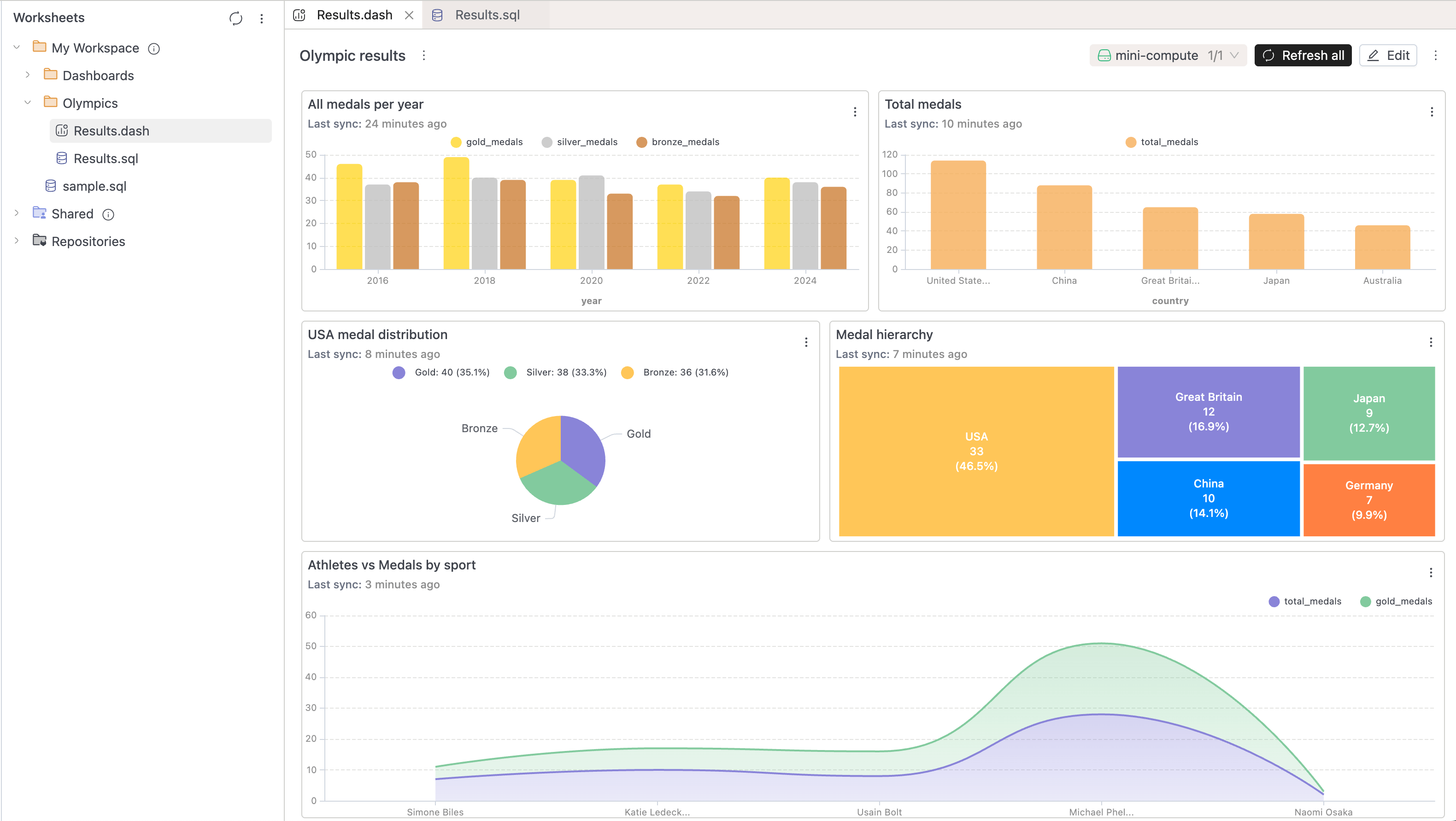
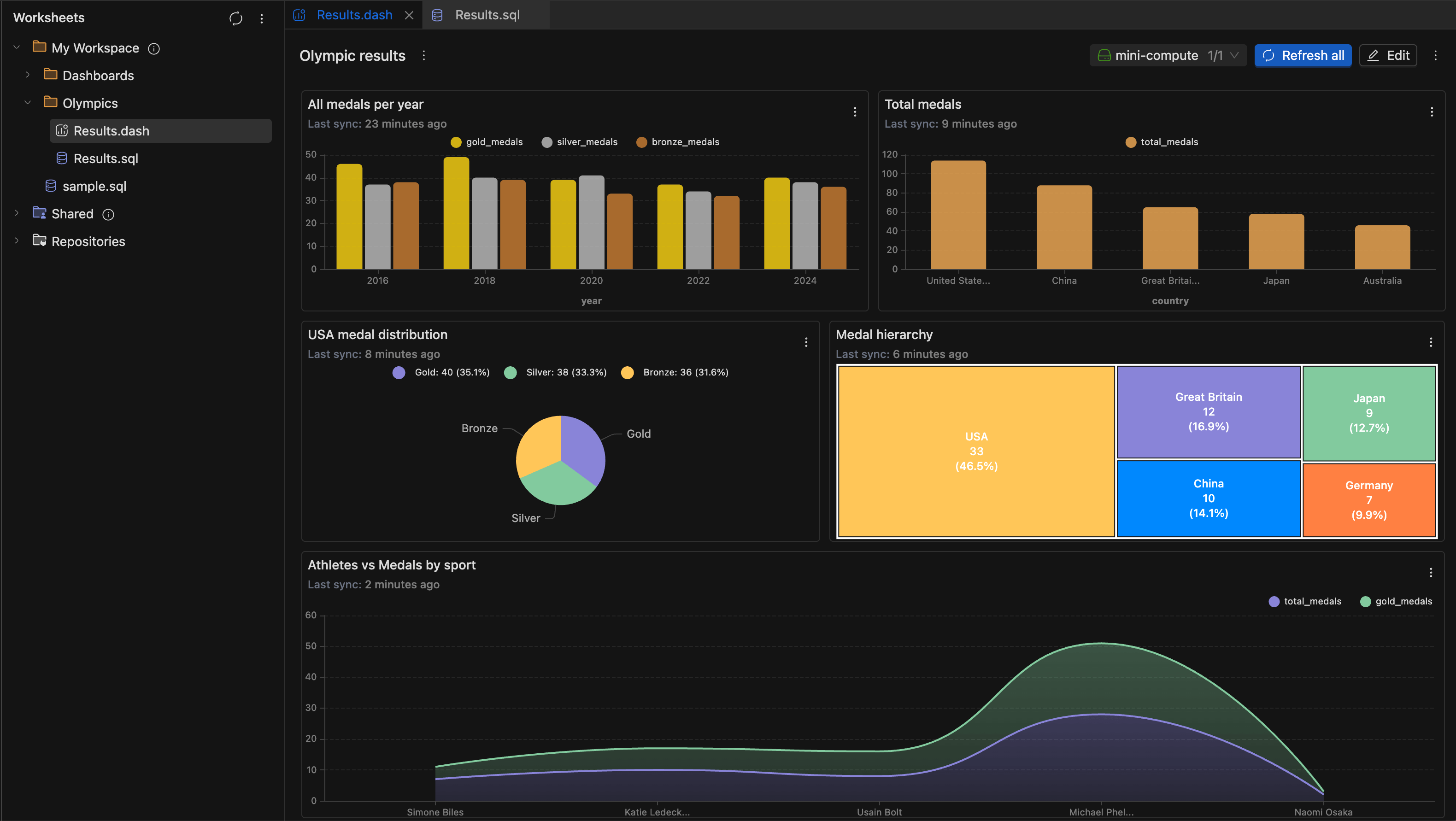
-
Create and manage Dashboards
- You can now organize your data visualizations into dashboards for better insights and reporting. Create new dashboards directly from the workspace sidebar by right-clicking on any folder and selecting New dashboard.
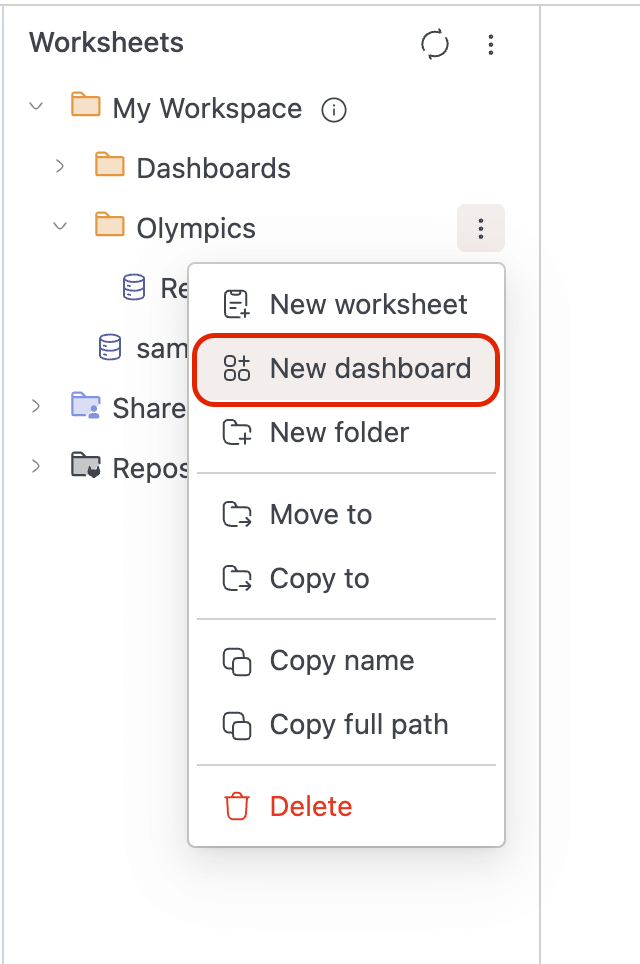
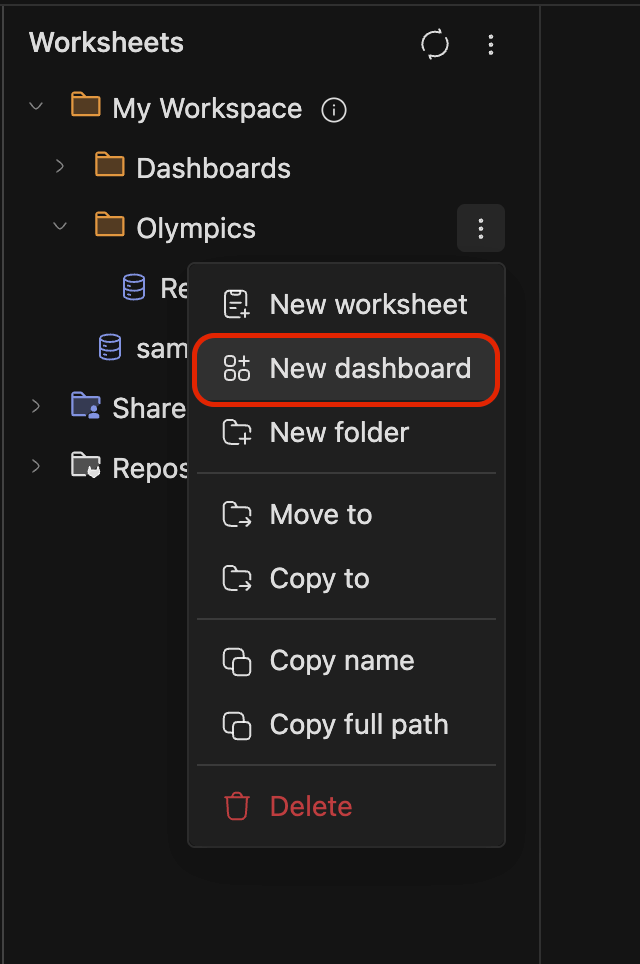
-
Add Charts to Dashboards
-
Transform your SQL query results into visual charts and add them to dashboards with just a few clicks:
-
Run your SQL query and switch to the Chart view
-
Configure your chart by selecting X and Y axis fields
-
Click Add to dashboard to save the visualization


-
-
-
Widget Configuration
- When adding a chart to a dashboard, you can customize:
- Widget name — Give your visualization a descriptive title
- Description — Add optional context about what the data represents
- Target dashboard — Browse and select from existing dashboards
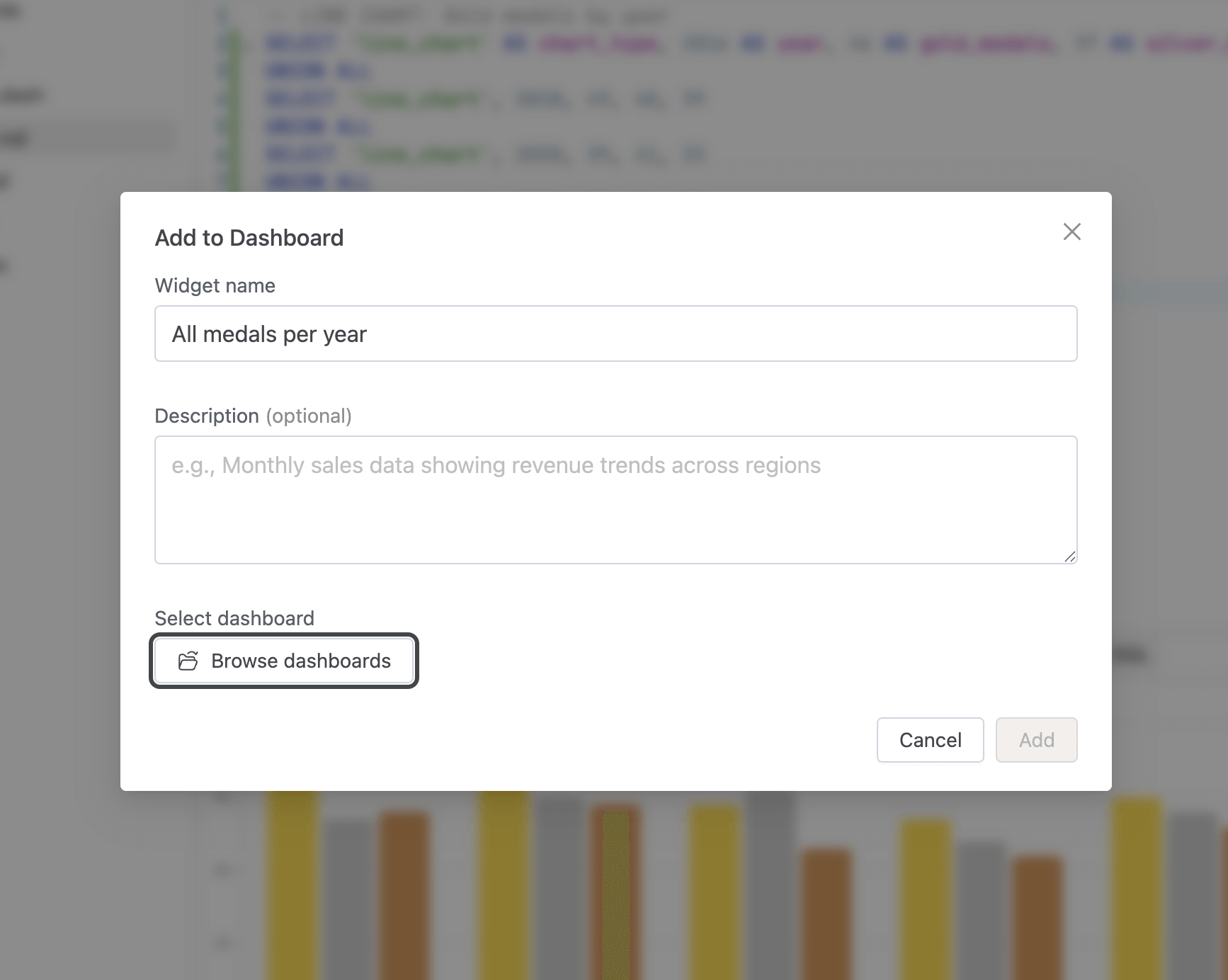
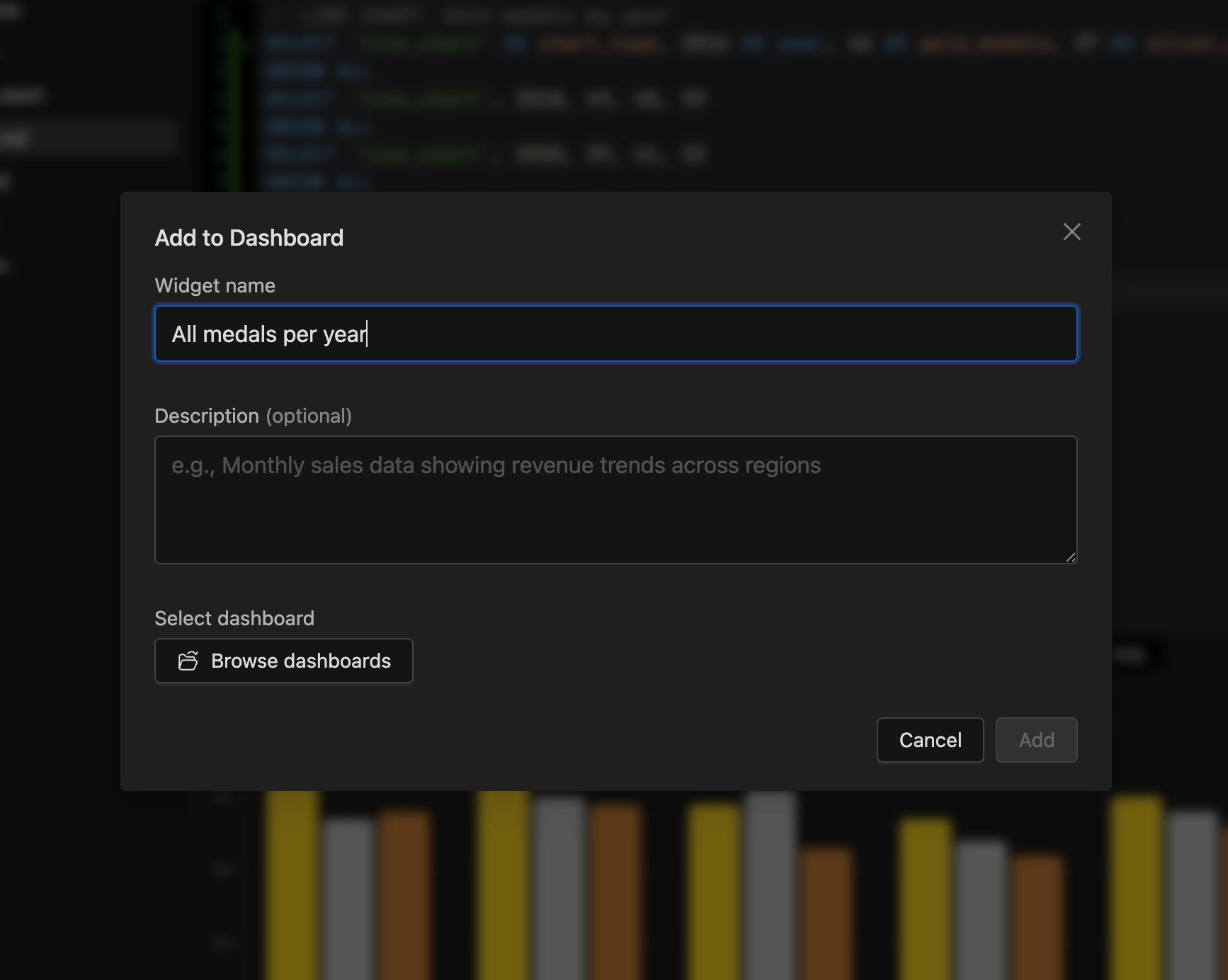
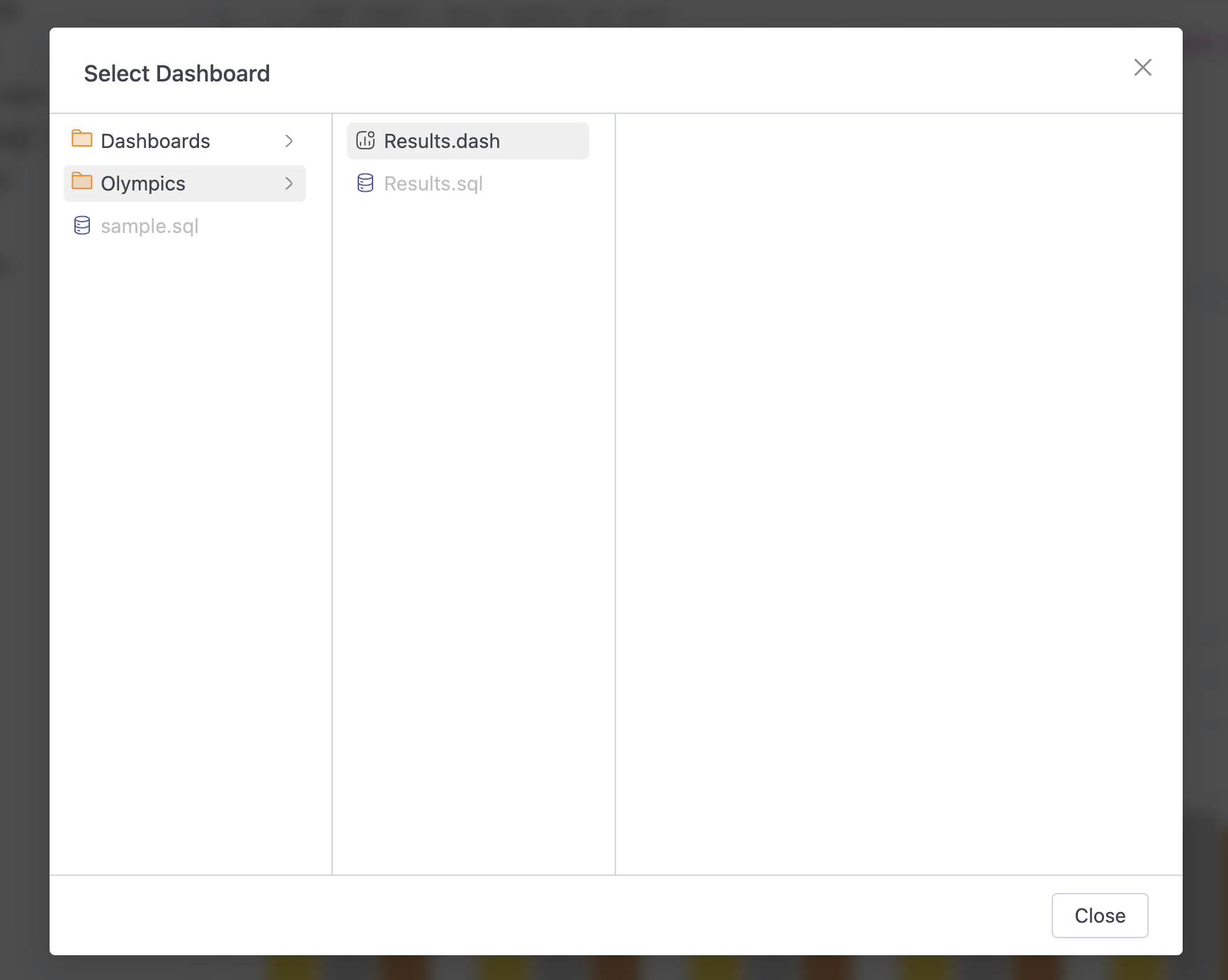
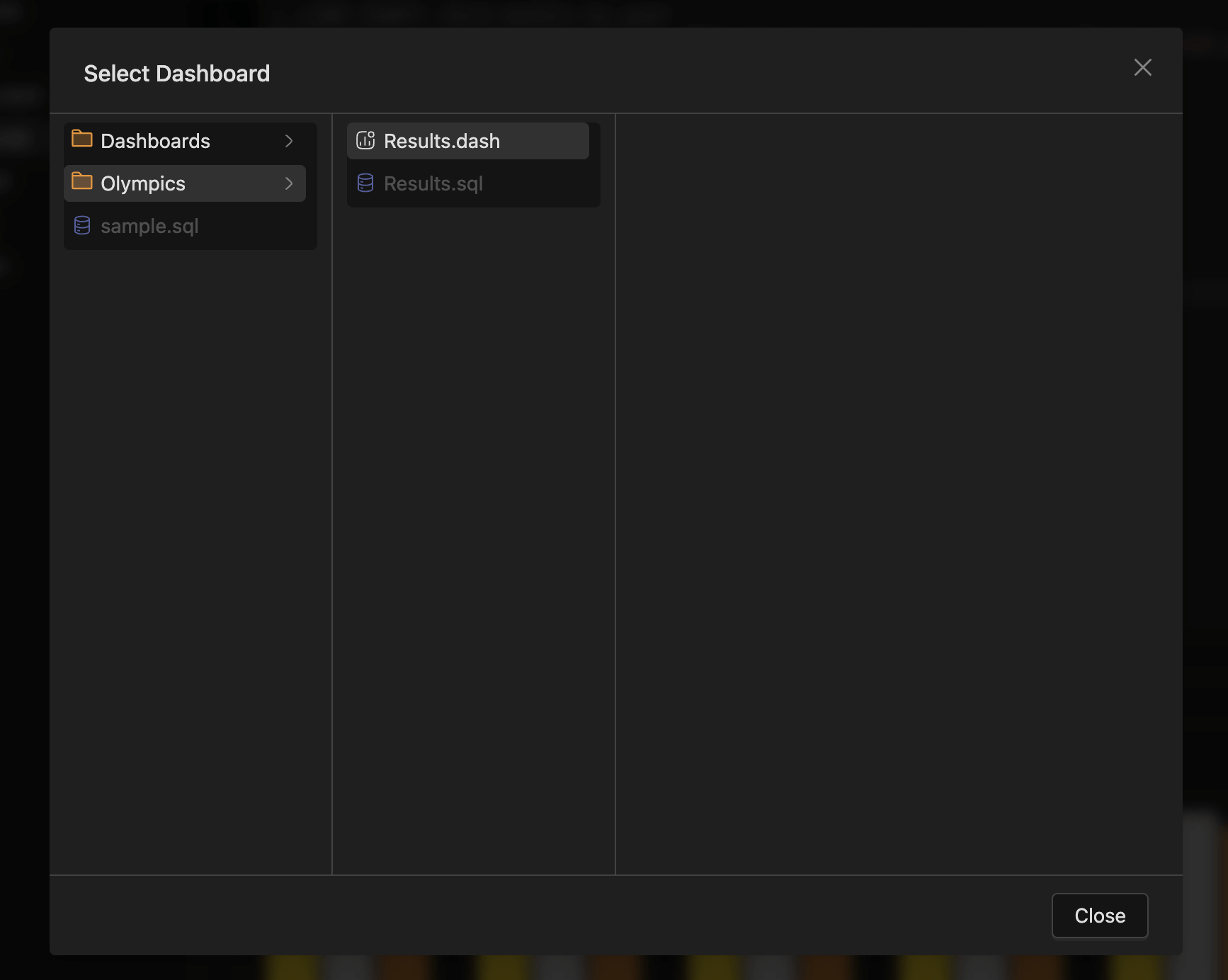
- When adding a chart to a dashboard, you can customize:
-
Your Widget, Live on the Dashboard 🎉


- Once you've selected a dashboard and clicked Add, your chart instantly appears on the dashboard — ready to deliver insights. View all your widgets together in a unified layout, with each visualization displaying real-time data from your SQL queries. Mix and match different chart types like bar charts, pie charts, treemaps, and other charts to build comprehensive reporting views.
-
-
Widget Actions
-
Each widget on a dashboard includes a context menu with the following options:
-
View as table — Switch between chart and tabular data views
-
Configure chart — Modify chart settings and appearance
-
Edit SQL — Jump back to the underlying query
-
Rename — Update the widget title
-
Remove — Delete the widget from the dashboard
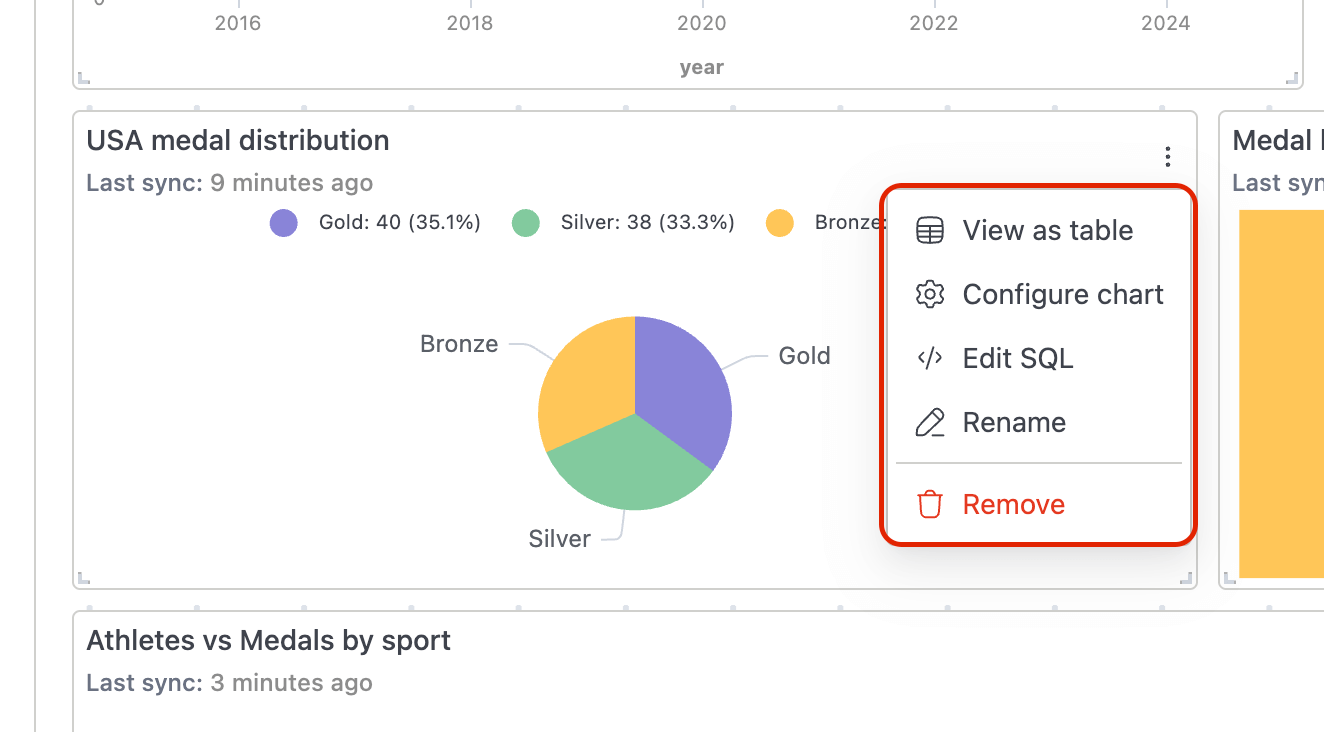
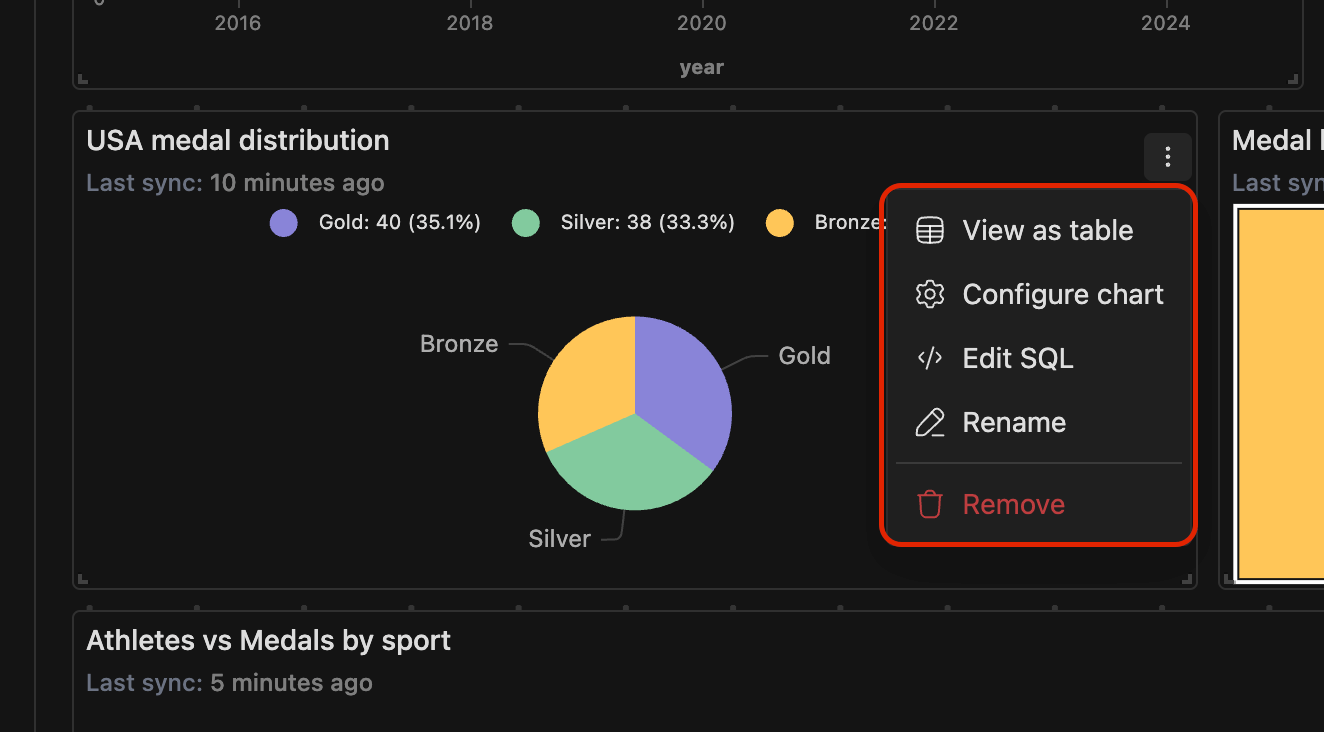
-
Auto-Sync Indicators
- Widgets display a "Last sync" timestamp showing when the data was last refreshed, helping you track data freshness across your dashboard.
-
-
⚡ Improvements
-
Spark Job Orchestration (Priority-Based Deployment Flow):
- Prevent Queue Head Blocking:
- Jobs blocked at queue head due to quota limits are now automatically retried or cancelled after configurable thresholds.
- Configurable via the following system properties:
job-orchestrator.queue.head-timeout-seconds(default: 3600) – wait time before timeoutjob-orchestrator.queue.head-retry-count(default: 0) – retry attempts before cancellation
- Batch Job Deployments:
- Jobs are now validated and deployed in batches, improving deployment speed during job bursts.
- Batch size is configurable via Helm chart:
jobOrchestrator.settings.batchSize.
- Job Queue Visibility:
- Job details now show the specific resource blocking deployment (CPU, memory, pods, or storage) when a job is waiting in the queue.
- Added visibility for queue timeout retries, cancellation reasons, and reschedule events.
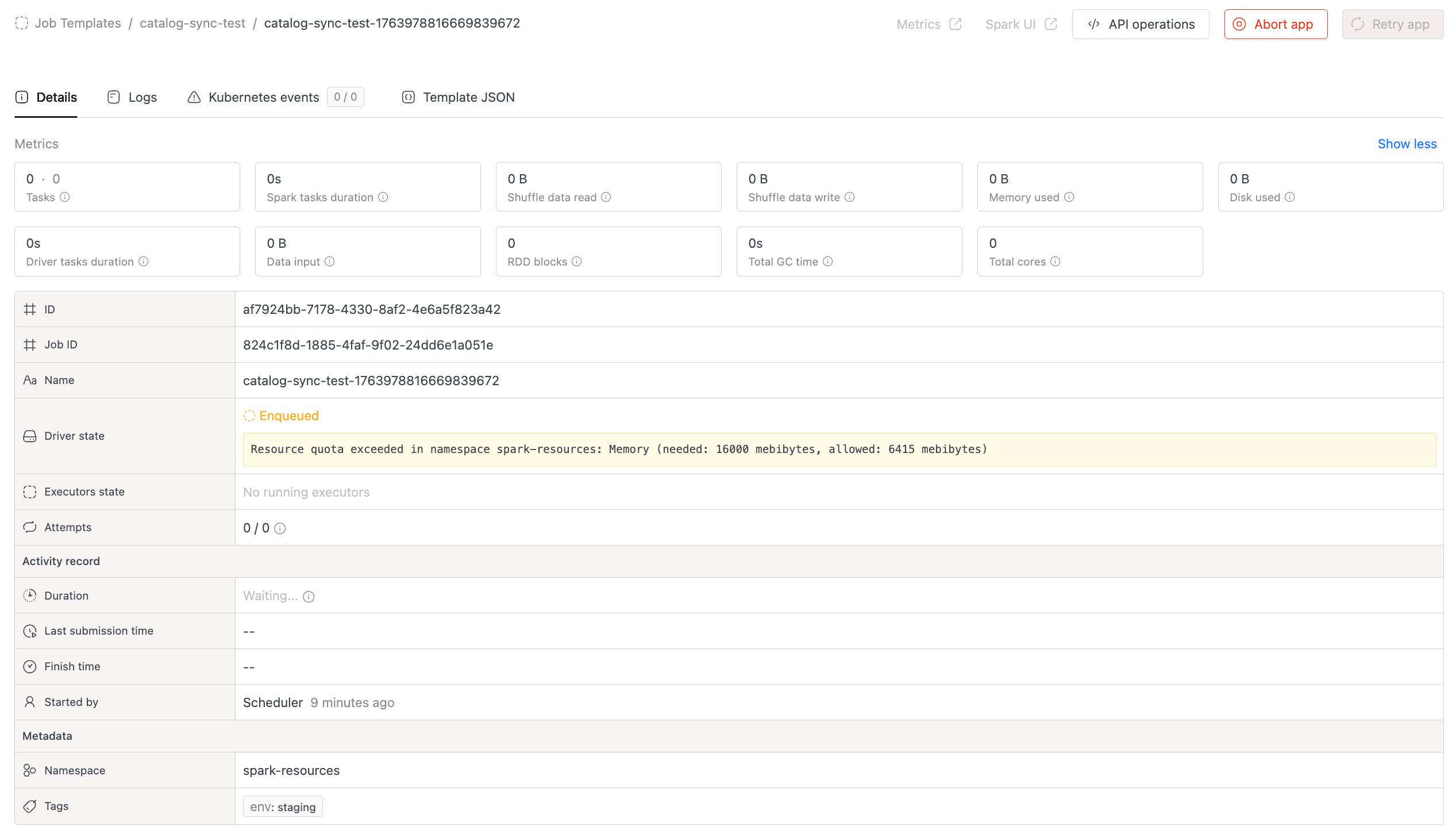
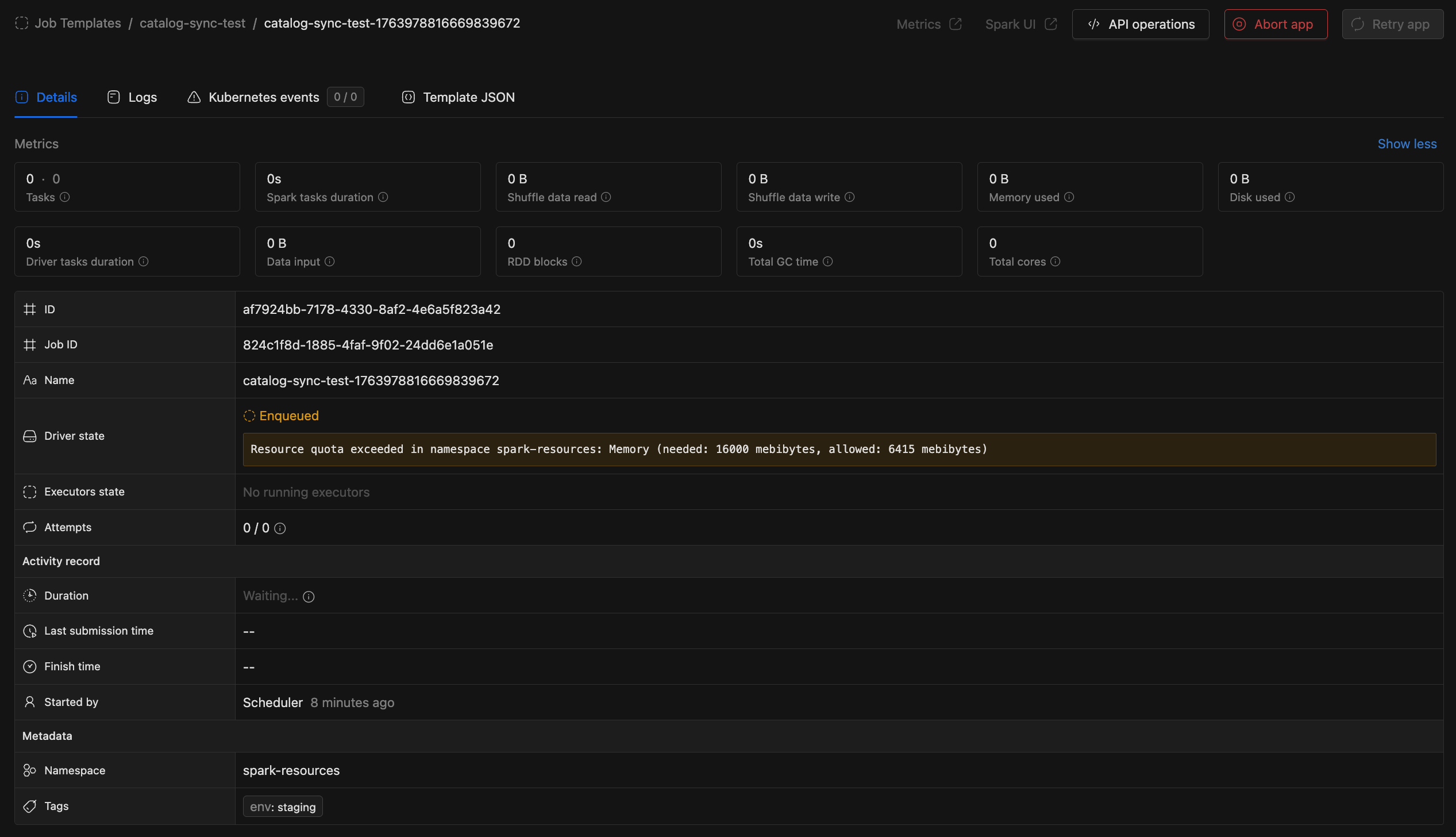
- Scheduling Reliability:
- Jobs incorrectly scheduled due to stale quota data are now automatically retried.
- Reduces failures from timing mismatches between quota checks and resource allocation.
- Cleanup & Maintenance:
- Added periodic cleanup for completed queue runs and logs to prevent unbounded data growth.
- Configurable via Helm chart:
jobOrchestrator.settings.jobRunCleanup.
- Splunk Integration:
- Added support for basic auth for log fetching when Executor log fetching is enabled
- Other Improvements:
- Consistent propagation of
Run as userand custom tags for scheduled Spark jobs. - Manual and retry runs now reuse existing deployments instead of creating duplicates.
- Consistent propagation of
Configuration Update RequiredJobs using
Priority-Baseddeployment flow without a configured cron schedule require a one-time configuration update to initialize the deployment. - Prevent Queue Head Blocking:
-
Access token manage permission: Access token management functionality is now role-based.


-
Database Explorer Improvements:
- We have added a feature flag
arrowFlightForDbExplorerto run Database Explorer on the Arrow Flight protocol. This improvement significantly enhances performance for large metadata sets.
arrowFlightForDbExplorer:
enabled: true- Data Security Policy Enforcement: This update also enables Data Security policy enforcement within the Database Explorer. Metadata listings are now filtered based on active policies, ensuring users only see resources they are authorized to access. The above flag needs to be enabled to have this functionality.
- We have added a feature flag
-
Data Explorer - Snapshot Storage Visibility
- Enhanced Storage Footprint with unified metric cards for size and file count.
- Added Live vs Historical snapshot ratio visualization.
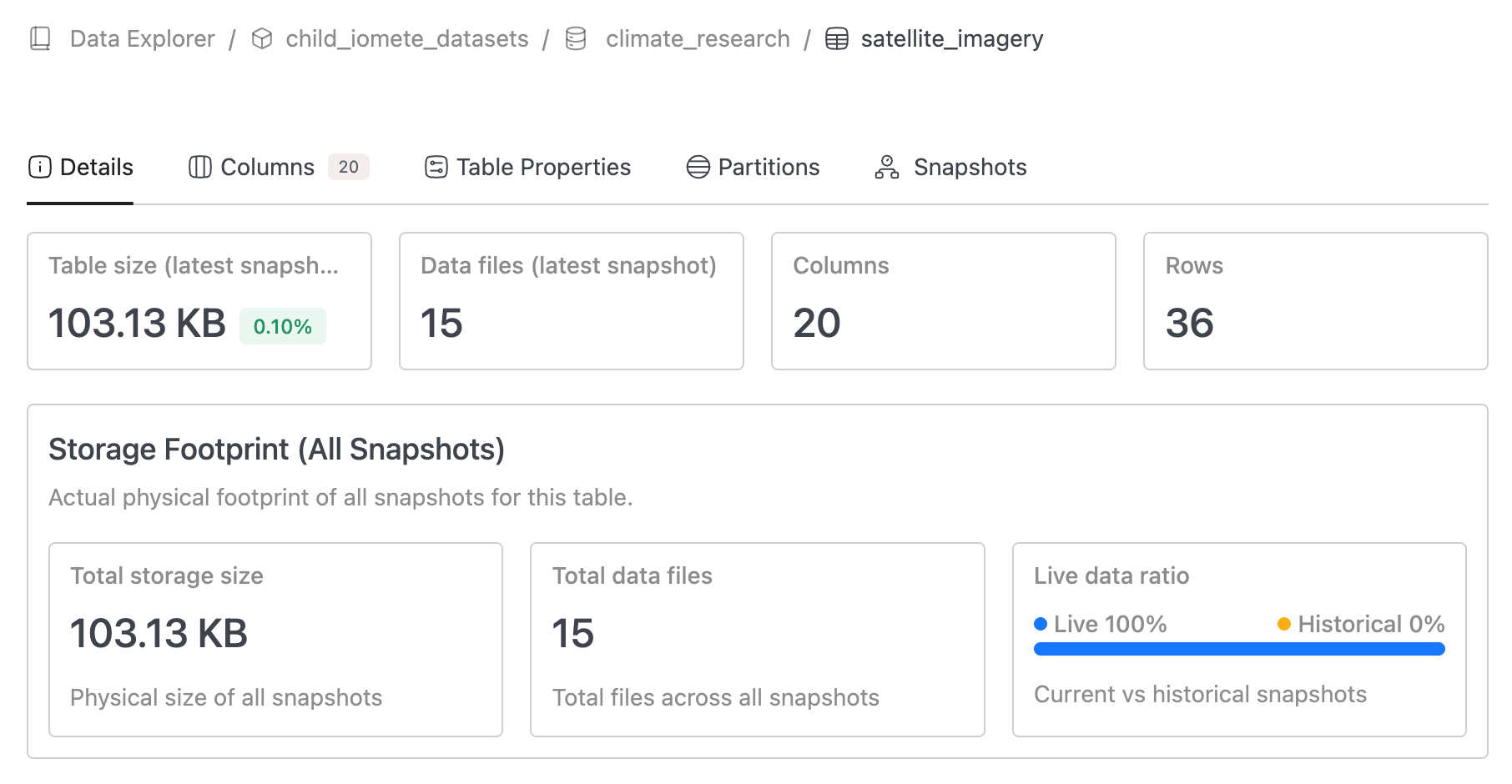
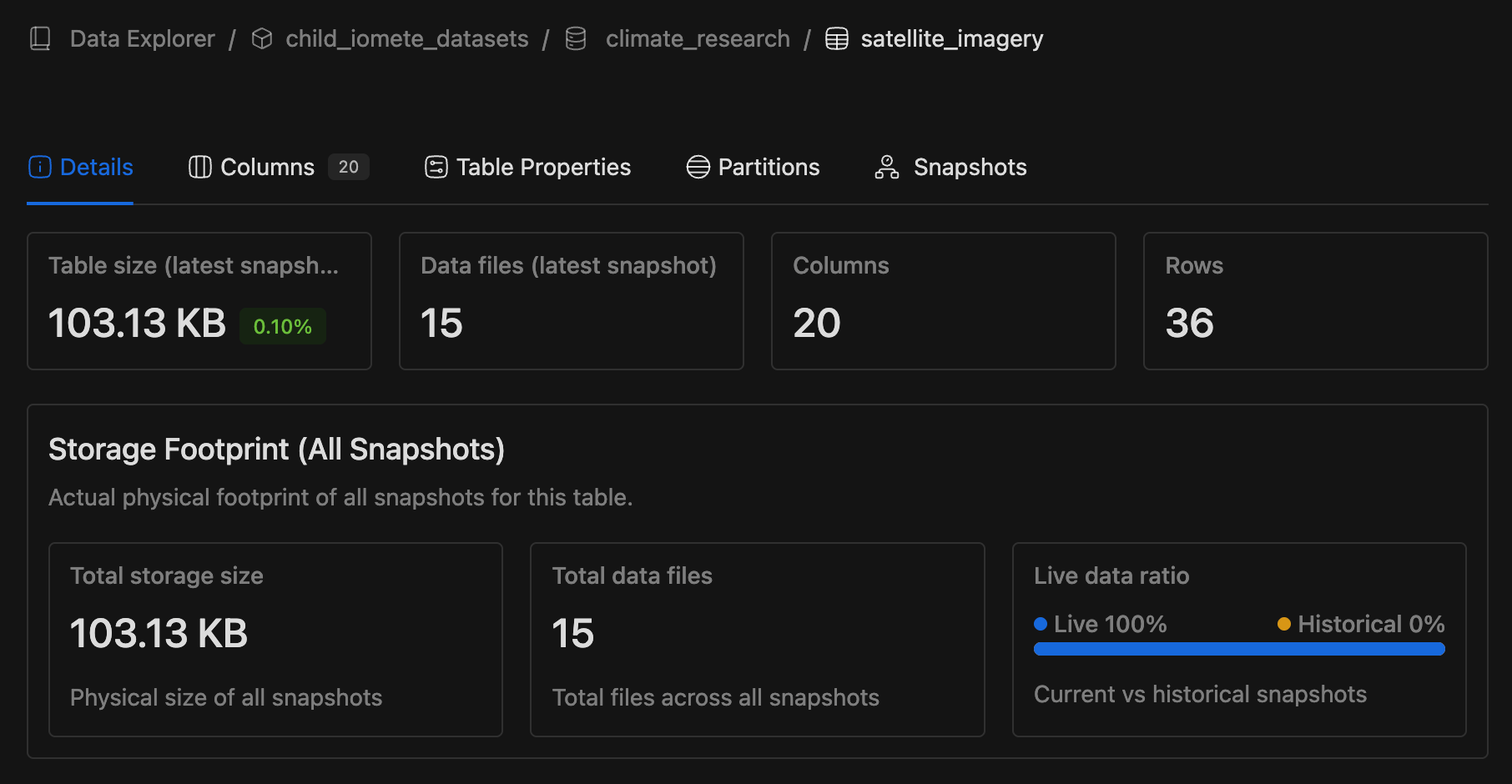
-
Data Explorer - Snapshot Storage Visibility - Backend Added new metrics to track Iceberg table and database sizes including all snapshots:
-
Number of files for an Iceberg table including all snapshots (so showing true number of files for a table if they look into their storage)
-
Total size of an Iceberg table including all snapshots
-
Total DB/schema size including all snapshots
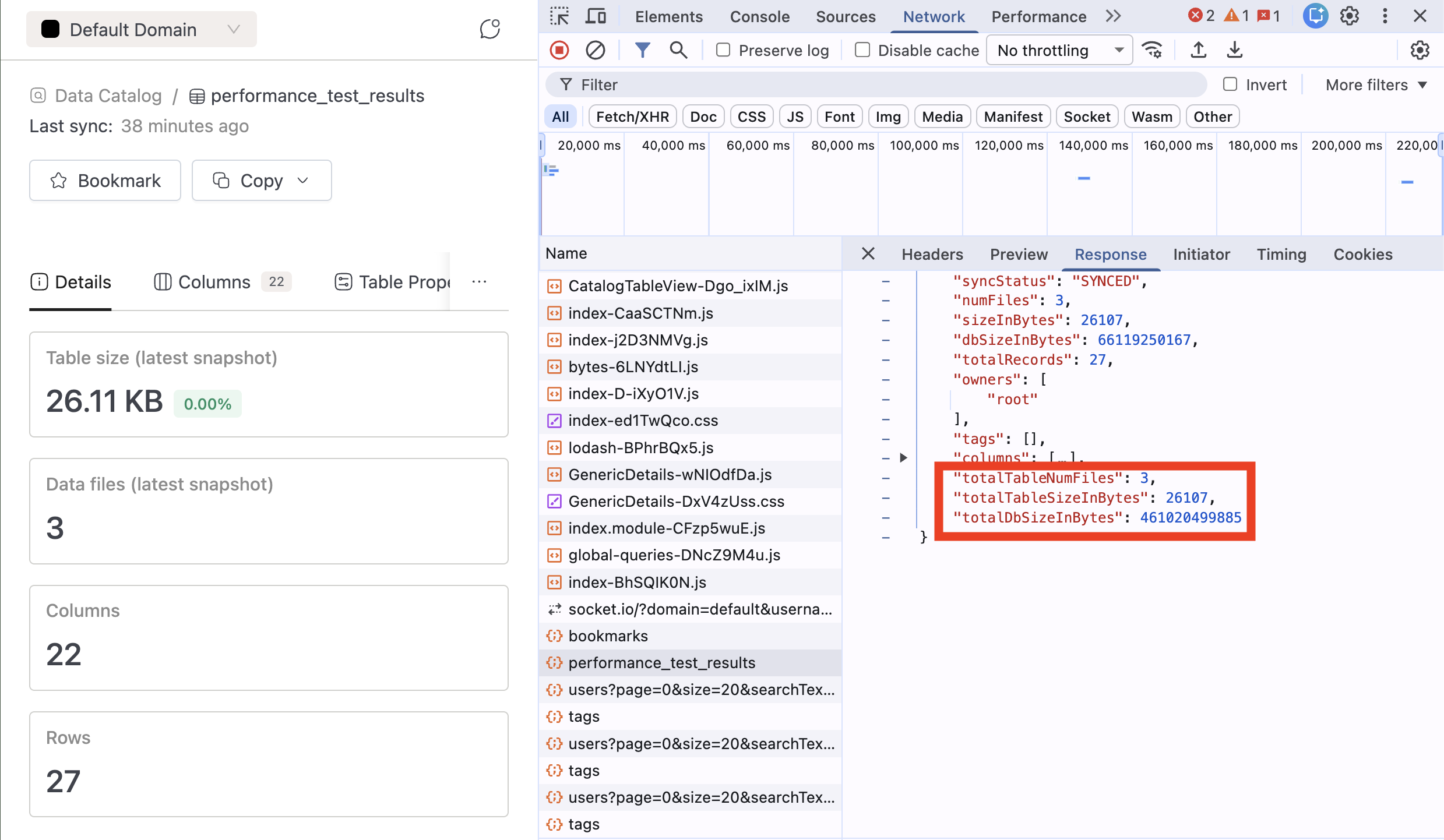
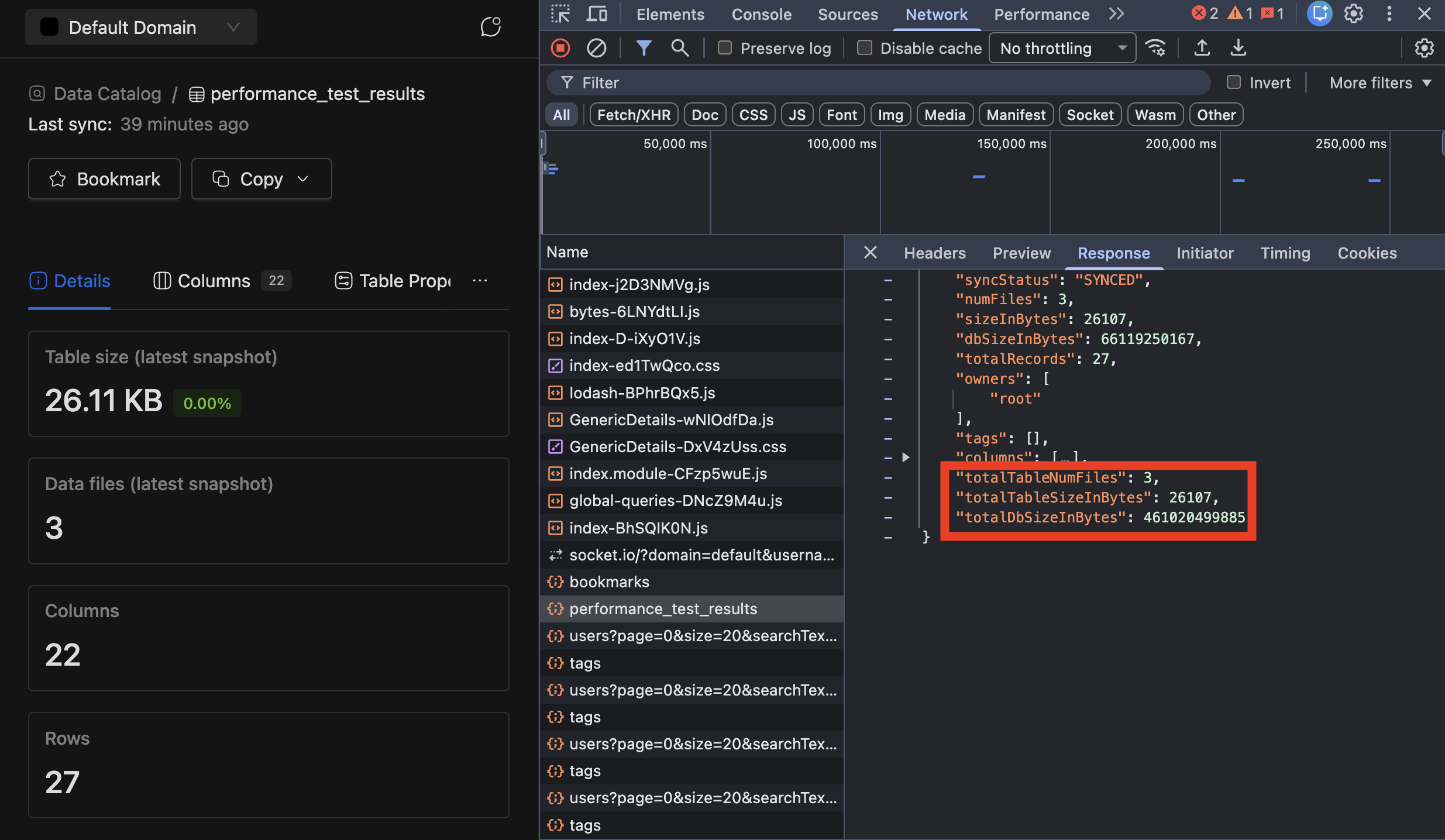
Catalog Sync Update RequiredThe Catalog Sync job needs to run with a newer version (4.3.5) for the new fields to be visible. Refer : Marketplace Release Notes for more information.
-
-
Spark History Update Interval:
- Changed Spark History Server update interval from 30 seconds to a very large value to prevent frequent filesystem scans while serving the Spark UI.
# Spark History Server - Services that stores Spark Job's History and Metrics
sparkHistory:
...
settings:
updateInterval: "2147000000s"
... - Updated Spark History Server configuration to replace the default history provider with the custom IOMETE filesystem-based history provider (org.apache.spark.deploy.history.IometeFsHistoryProvider) for reading and serving Spark application event logs.
- Changed Spark History Server update interval from 30 seconds to a very large value to prevent frequent filesystem scans while serving the Spark UI.
-
New Priority Class
-
Added new priority class
iomete-operational-supportto support extra pods running in data-planes for operational support tasks within IOMETE platform.- spark-proxy-server-namespace
- prefect-worker-namespace
...
priorityClassMappings:
iomete-compute: "iomete-compute"
iomete-spark-job: "iomete-spark-job"
iomete-notebook: "iomete-notebook"
iomete-operational-support: "iomete-operational-support"
...
-
-
Compute Secret Masking
- Compute secrets were previously not masked, while Spark job secrets were. Added the same masking capability to compute resources to enhance security.
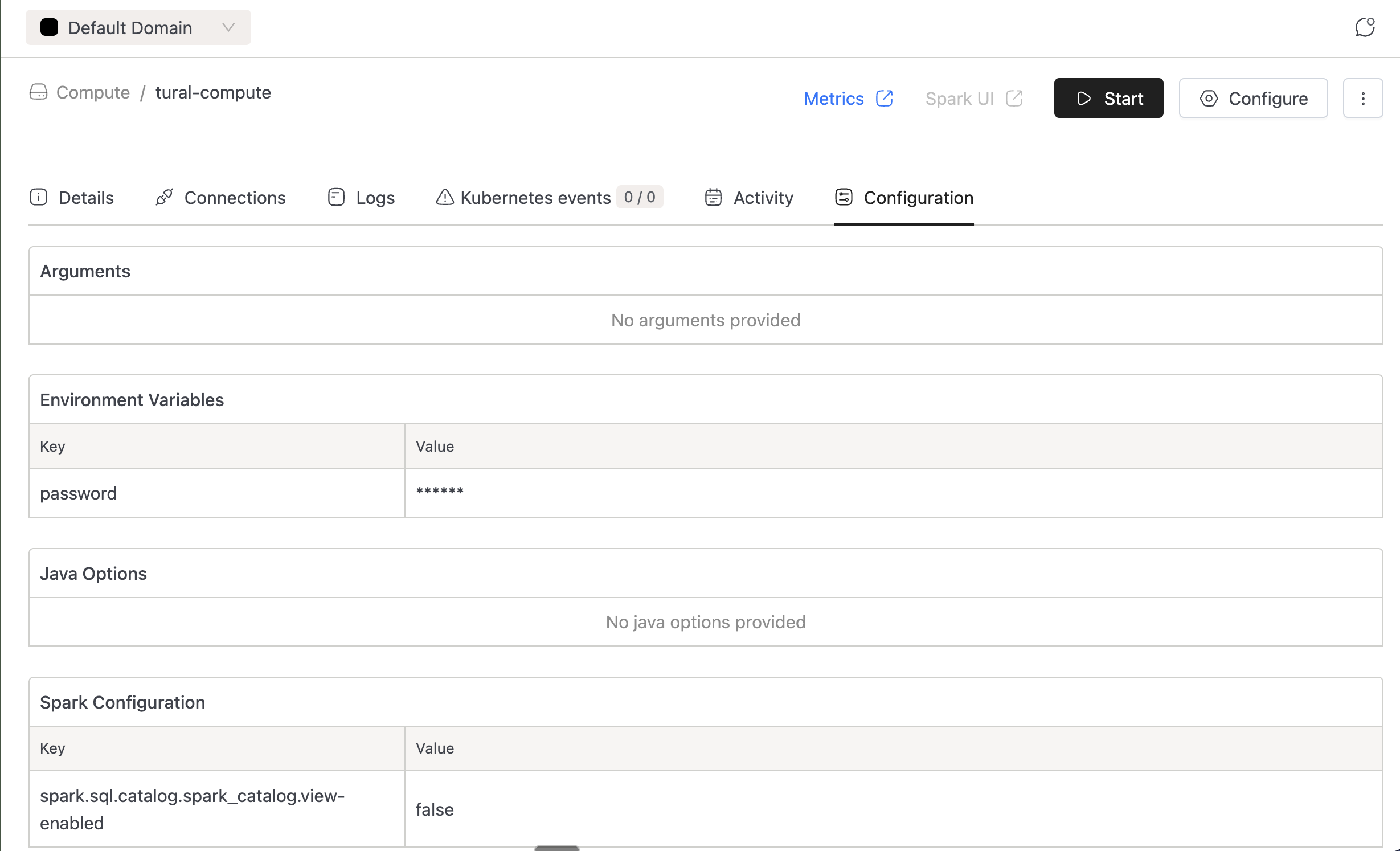
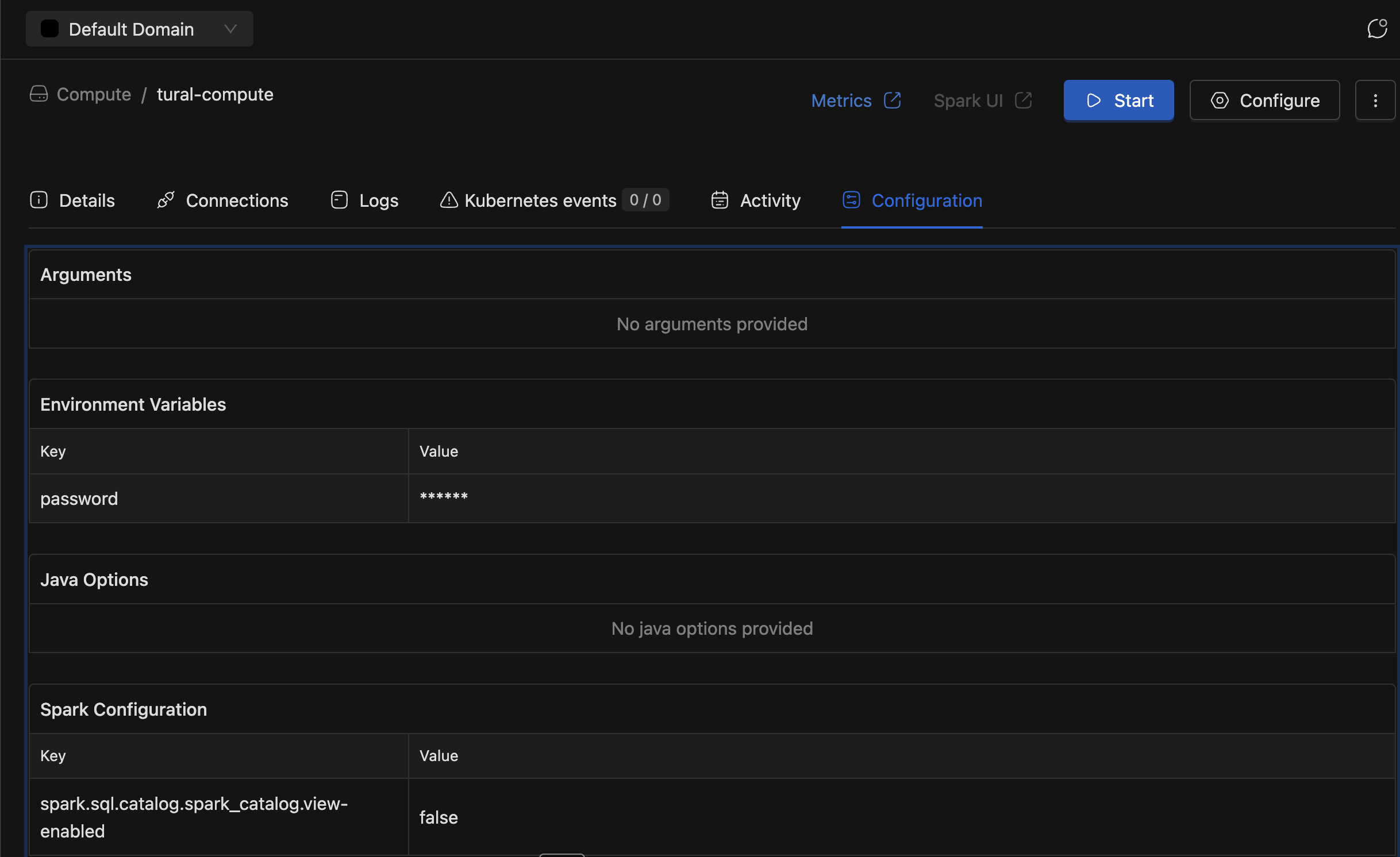
- Compute secrets were previously not masked, while Spark job secrets were. Added the same masking capability to compute resources to enhance security.
🐛 Bug Fixes
- Spark Applications:
- Fixed startup timeout logic to properly abort Spark applications when driver is running but executors stuck in
PENDINGstate due to resource quota violations or fragmentation.
- Fixed startup timeout logic to properly abort Spark applications when driver is running but executors stuck in
- Maintenance:
- Fixed ordering of Spark Extensions to enable zorder sorting in rewrite data files operation
- Token:
- Fixed expiration date of access tokens with
neverexpiration
- Fixed expiration date of access tokens with
- SQL Editor:
- Fixed failing database browser loading empty database
- Spark / Iceberg
- Fixed a regression introduced in Iceberg v1.8.0 that prevented creating views on file-based sources (CSV, Parquet, ORC). The previous behavior has been restored.
Spark version: 3.5.5-v9
Iceberg version: 1.9.3
- Fixed a regression introduced in Iceberg v1.8.0 that prevented creating views on file-based sources (CSV, Parquet, ORC). The previous behavior has been restored.
v3.14.3
🐛 Bug Fixes
- Fixed compatibility issue stemming from latest version bump of AWS S3 jars. AWS is now always doing checksums against request/response. This fails on Dell ECS as there is some compatibility issue.
v3.14.2
⚡ Improvements
- We have patched various outstanding security vulnerabilities in iom services.
- We switched over to Alpine Linux for our iom services as our base image to reduce memory footprint.
- Various libraries have been upgraded to a recent or the latest version.
- Added basic authentication that allows us to authenticate with splunk for log fetching. Now, pulling logs from splunk for executors and drivers in IOMETE UI is possible.
v3.14.1
⚡ Improvements
- Users can now add resources to resource bundles where they are the owner or listed as an actor.
v3.14.0
🚀 New Features
- Docker Tag Alias Management:
- Introduced UI-based management for Docker tag aliases in the Console, allowing domain users to create, edit, and delete aliases without modifying Helm configurations.
- Domain-level tag aliases are now stored in the database and can be updated dynamically without pod restarts, while global tag aliases continue to be managed via Helm chart configuration.
- Unique alias validation within each domain prevents conflicts and maintains consistency across Spark resources.
- Ranger Audit events:
- Added internal HTTP sender for Ranger Audit events
⚡ Improvements
-
Spark Job Filtering Enhancements:
- Added "Run as user" column to Job Template and Streaming Job listing pages.
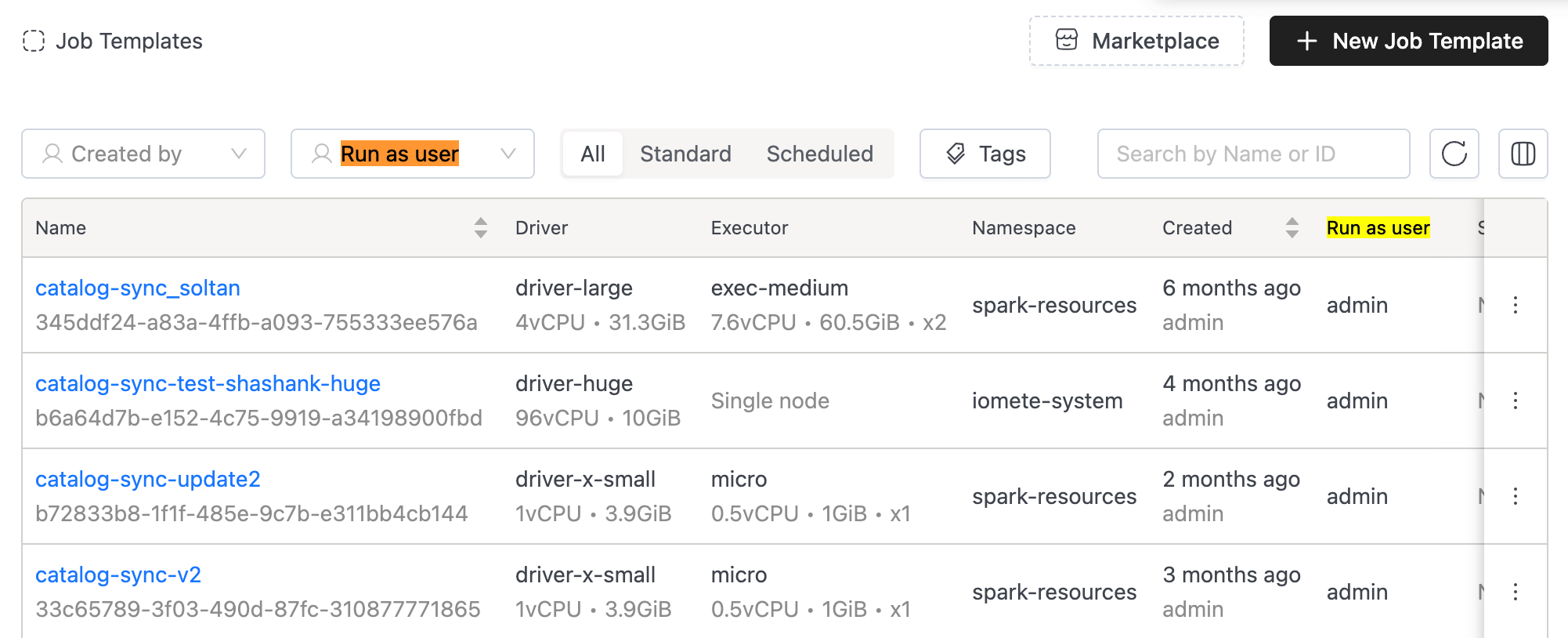
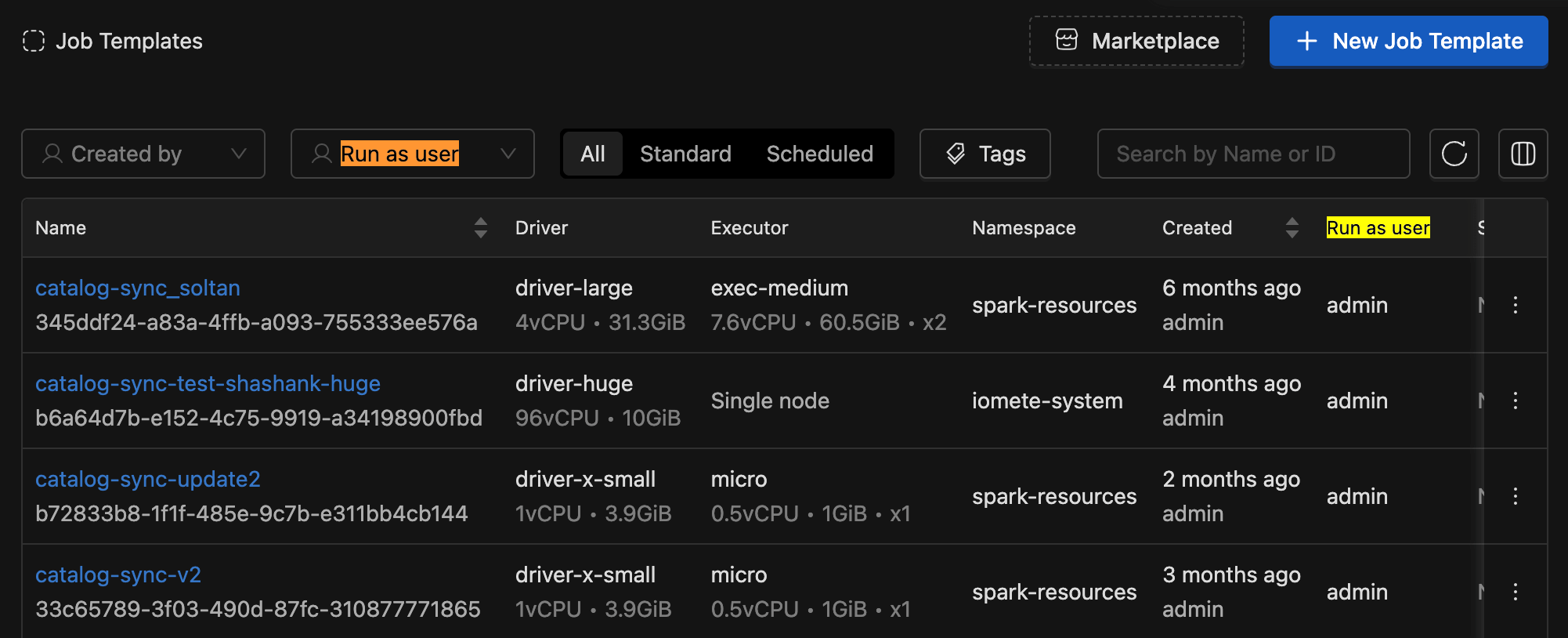
- Implemented filtering by "Job User" (Run as user) for both Job Template Applications and Spark applications.
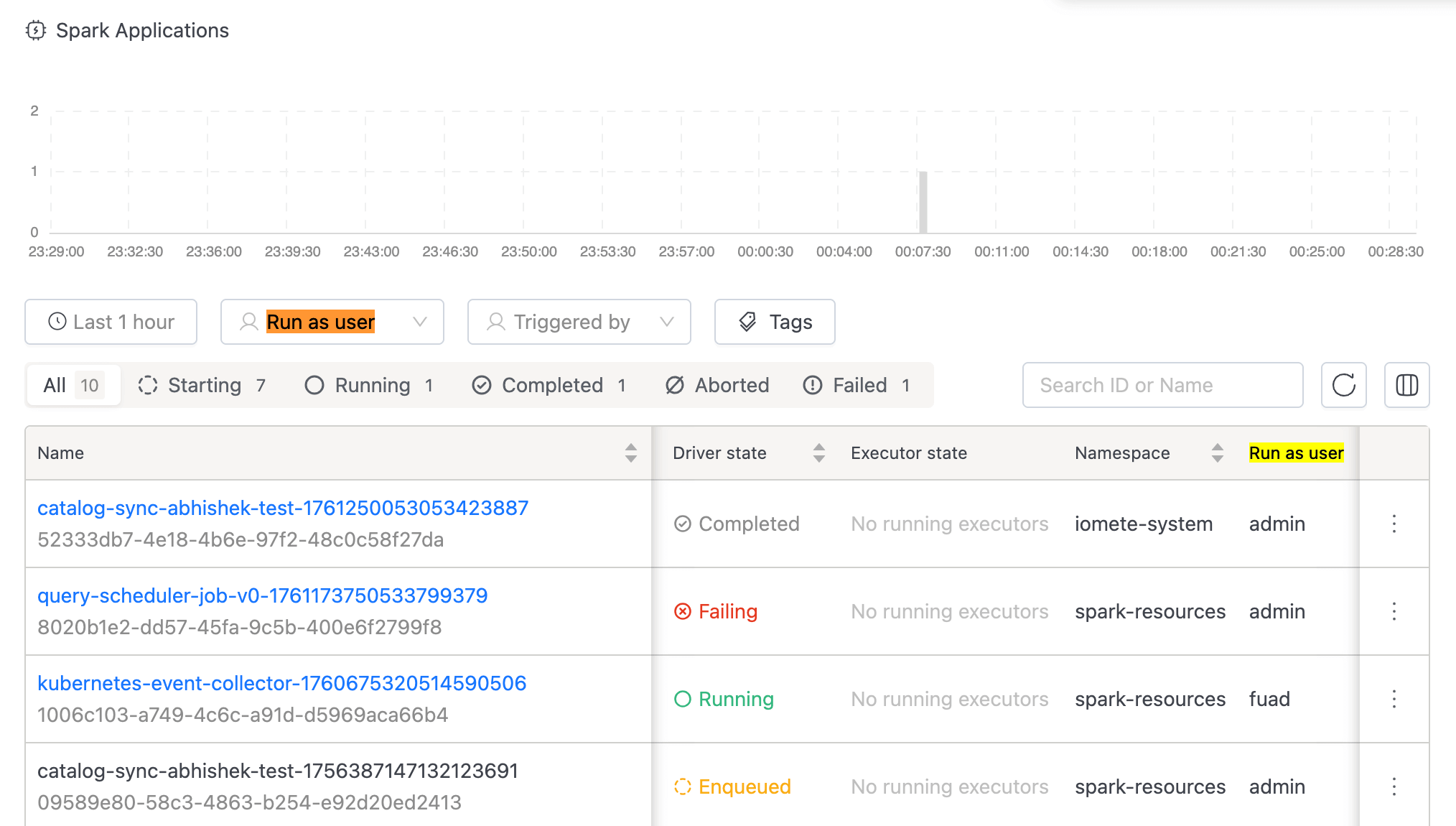
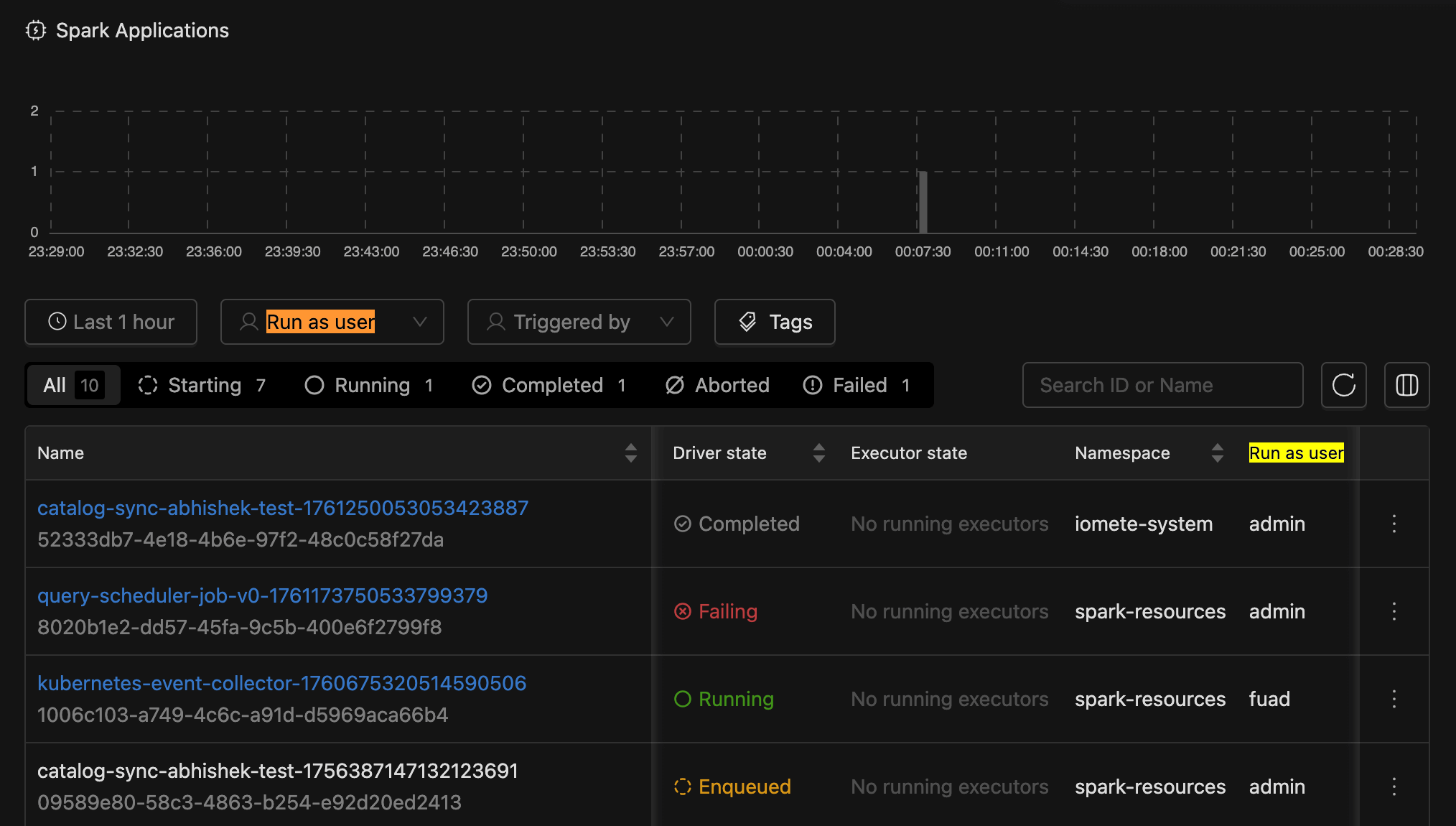
- Improved time-based filtering to include running jobs that started before the selected time window, ensuring active jobs remain visible regardless of when they were initiated.
- Added "Run as user" column to Job Template and Streaming Job listing pages.
-
SQL Workspace Improvements:
-
Added
Copy tofunctionality to copy worksheets and folders from one location to another -
Added
Copy nameandCopy full pathoptions for worksheets and folders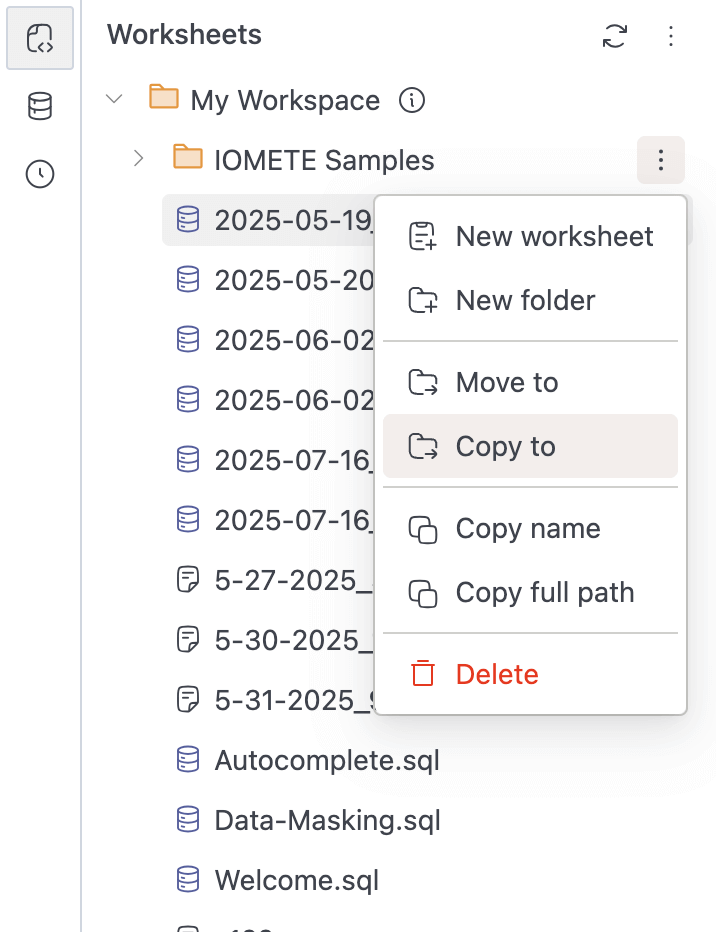
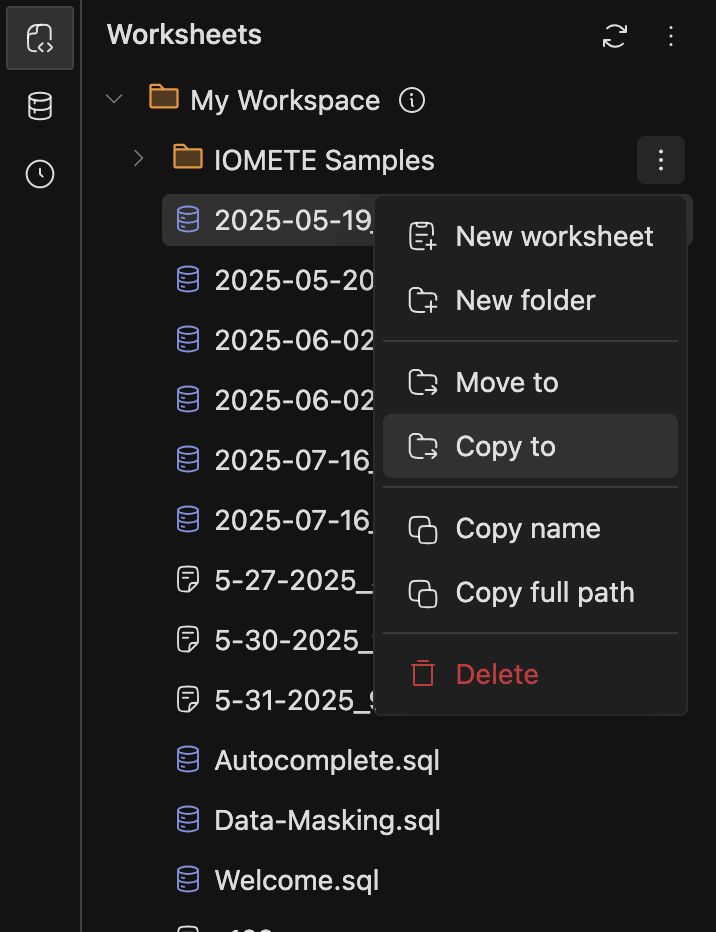
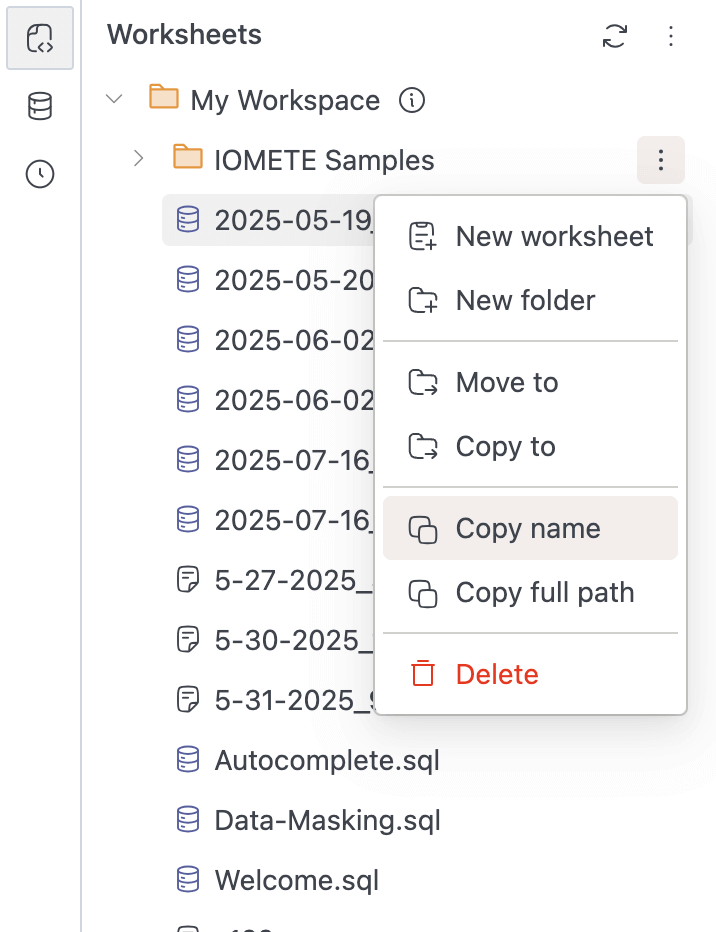
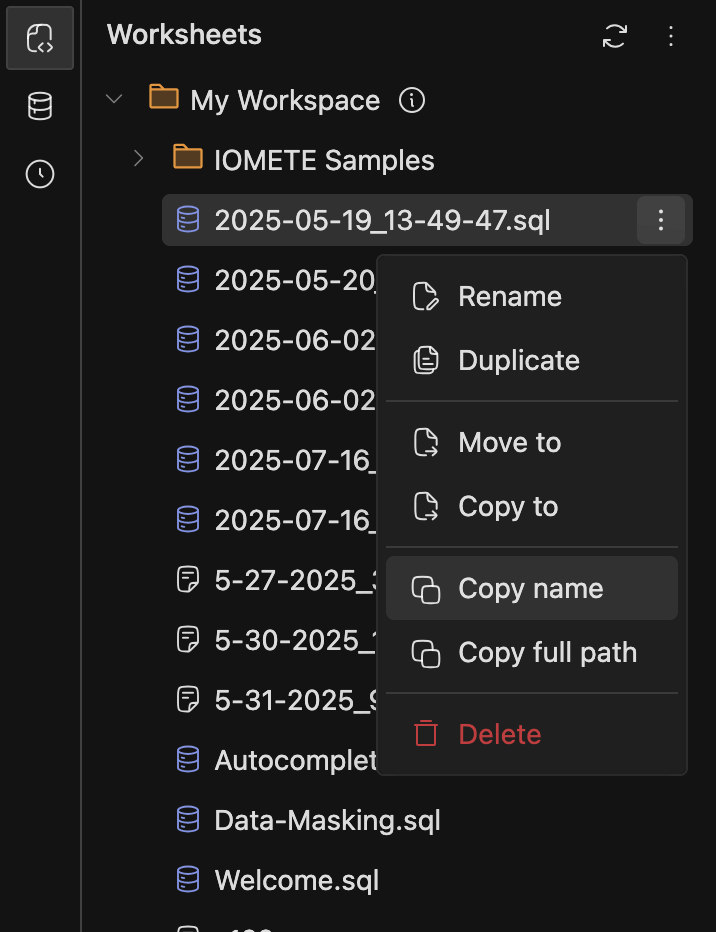
-
Currently supports opening the menu with both right-click and the three-dots button in Workspaces and Database Explorers.
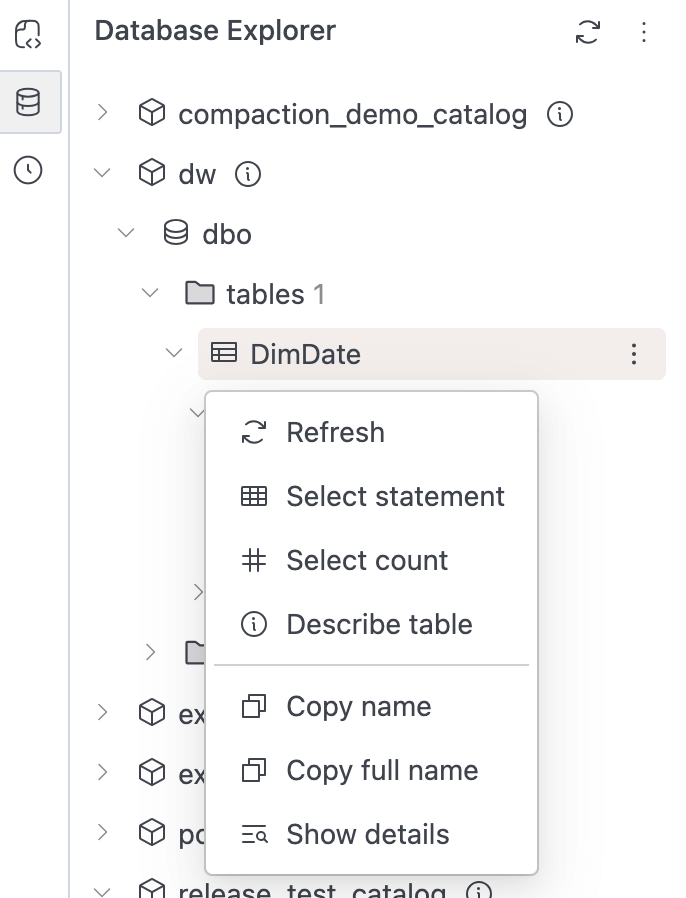
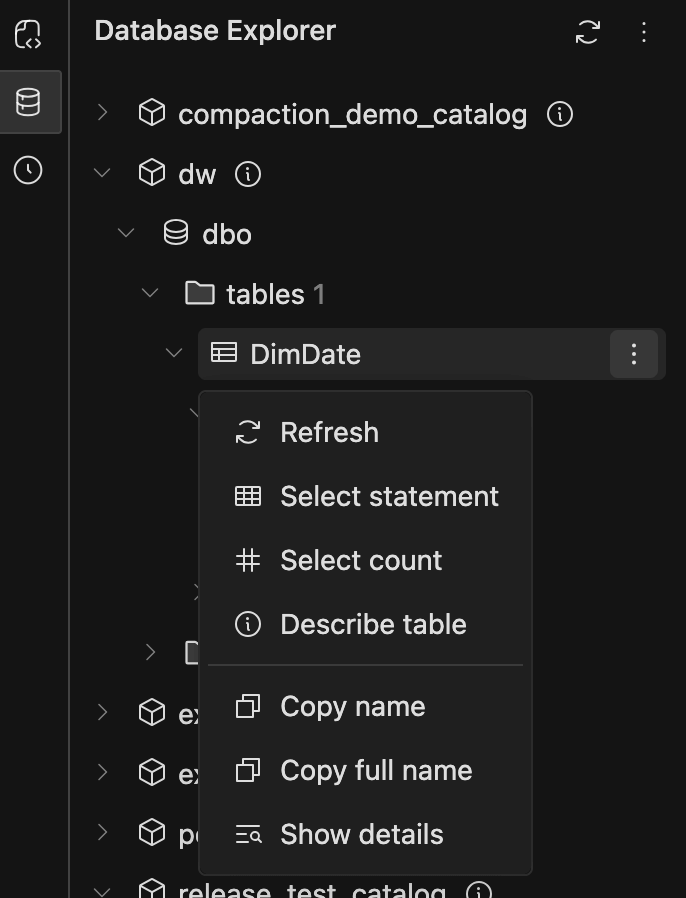
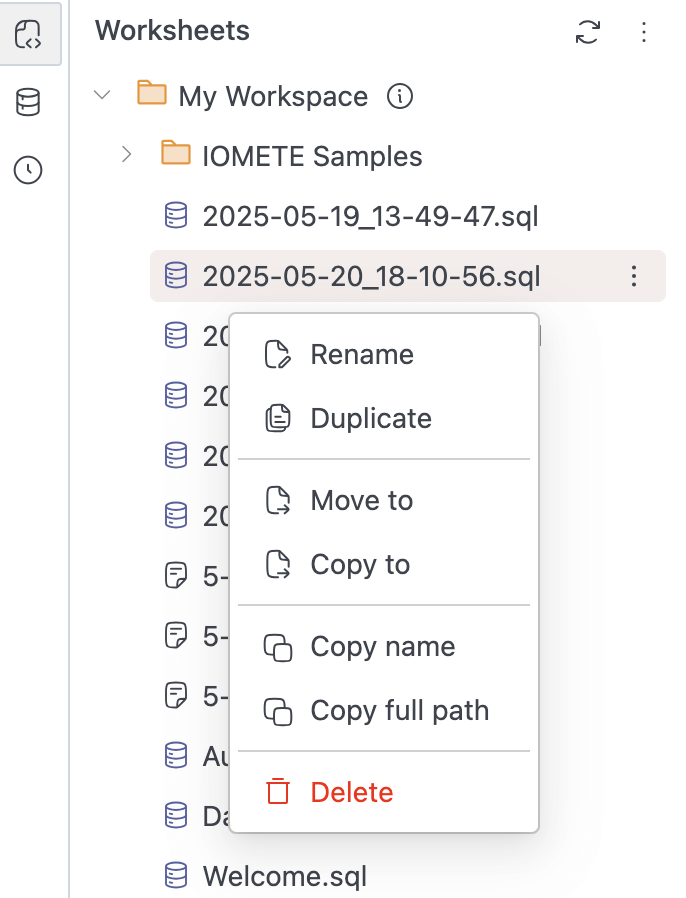
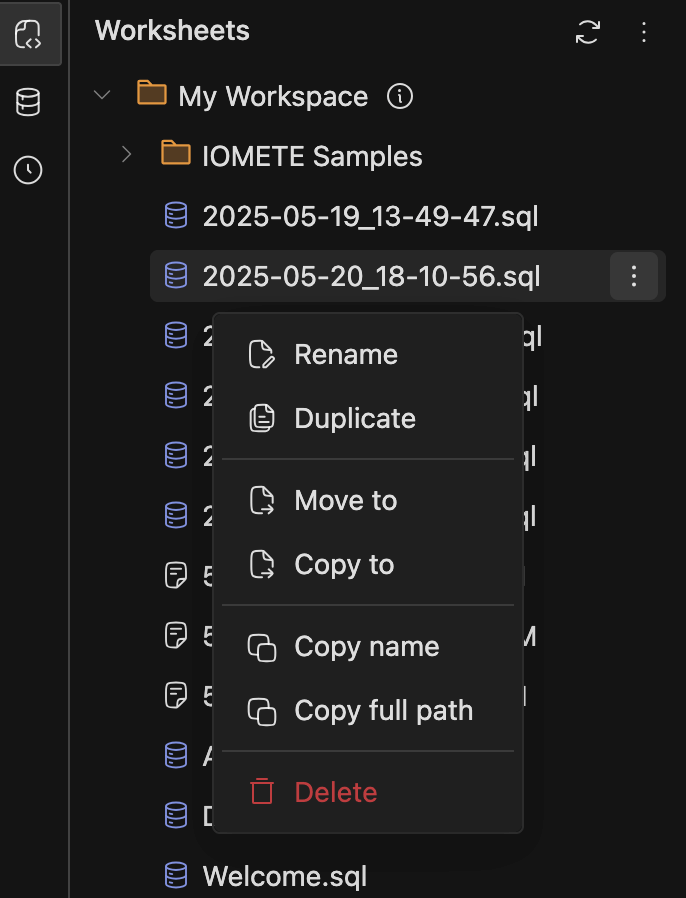
-
-
Spark driver and executor logs view:
-
Improved log download functionality by separating it into
Visible logsandAll logs.Visible logs downloads the logs currently shown based on applied filters. All logs downloads the complete log set without filters. (This may take a few minutes if the log size is large.)
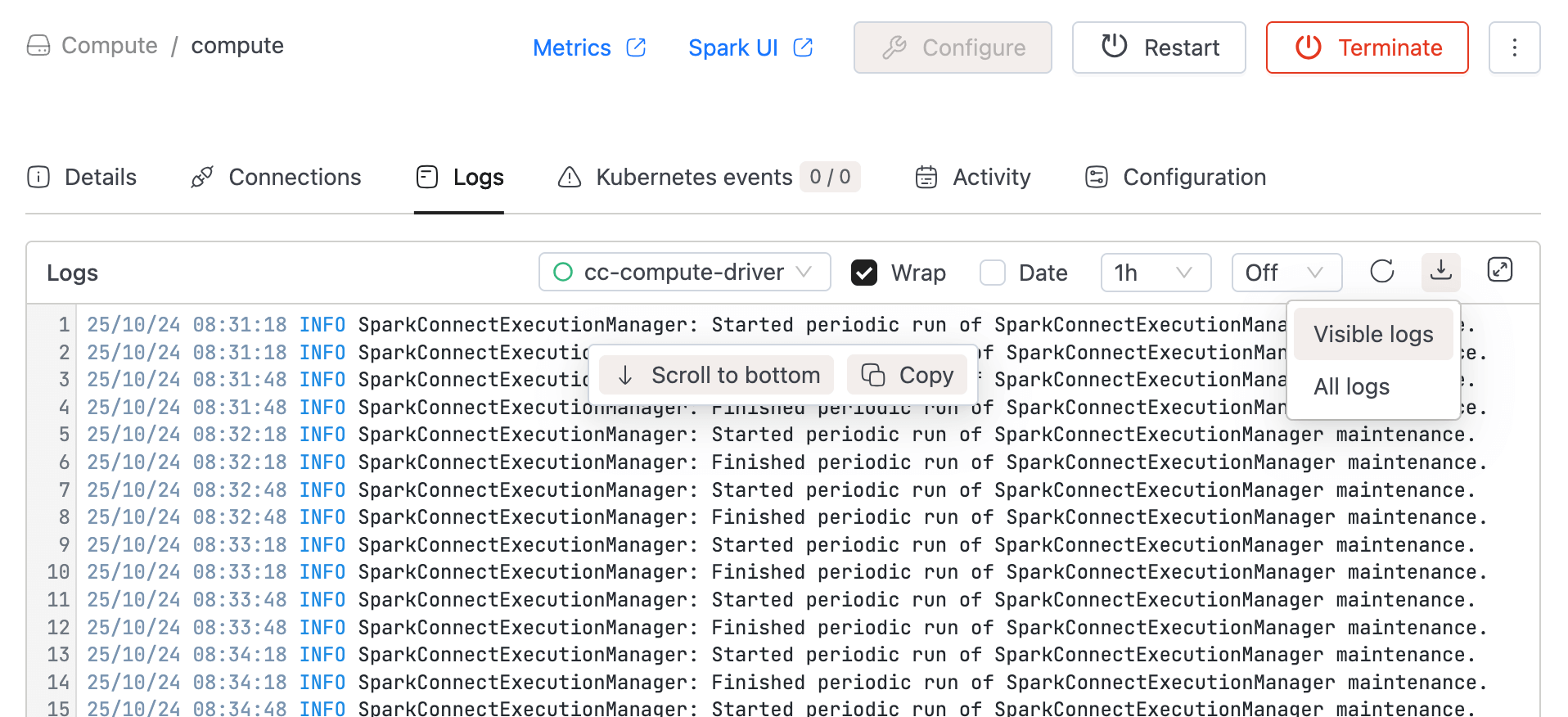
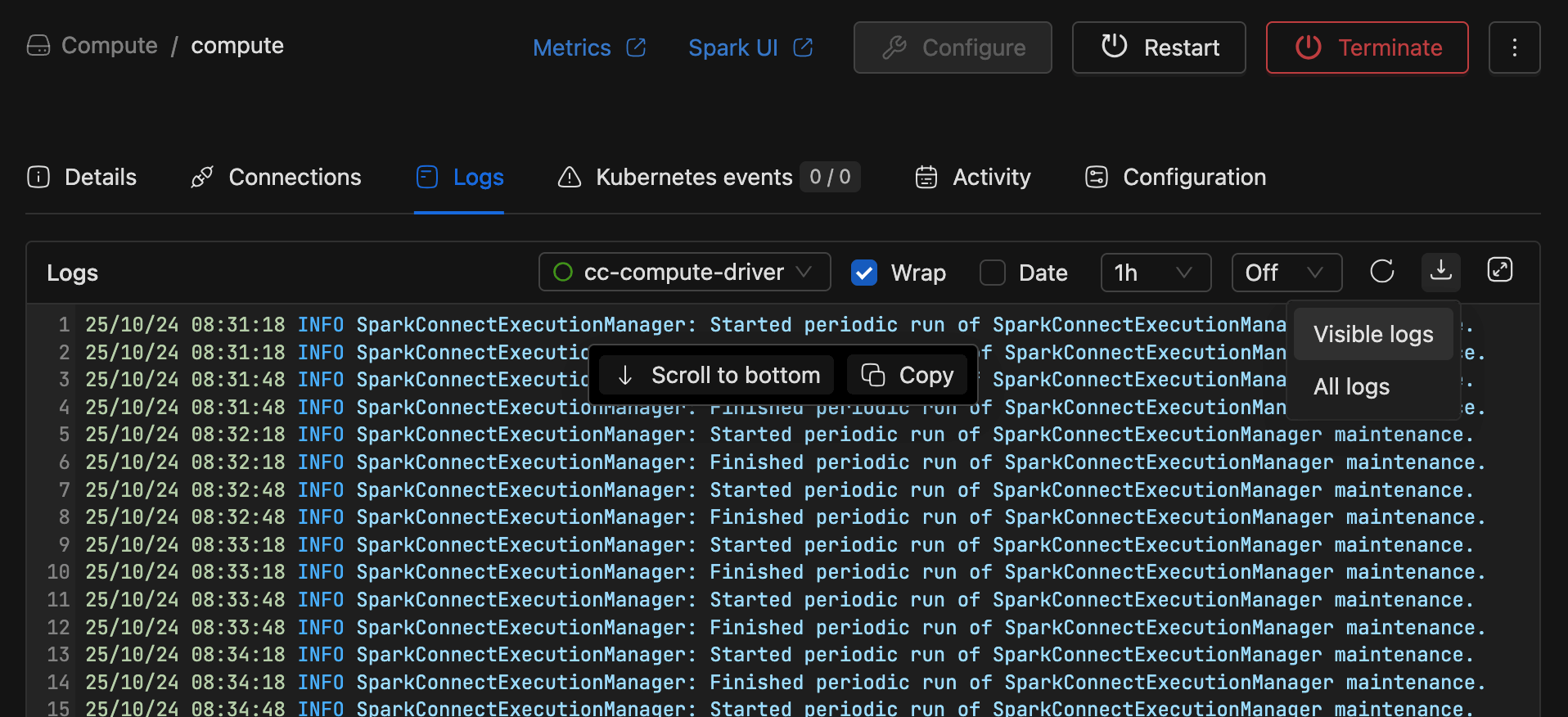
-
-
Docker tag alias improvement:
- Suggesting
tag aliaseson docker images in private registries.

- Suggesting
-
Data-Catalog Stale Data Cleanup:
- Added automatic stale data cleanup logic in the Data-Catalog (Data-Explorer) service.
- By default, all data not synced within 14 days will be automatically deleted.
- The retention period can be configured using the environment variable STALE_DATA_RETENTION_DAYS (applies to iom-catalog-service).
- Note: Data-Catalog Search will not be automatically cleaned — to refresh the indexed data, manually delete it using "Clean search" button and perform a full re-sync.
-
Storage Configuration Enhancements:
- Added storage provider options to Storage Config form for improved selection and display.
- Simplified StorageConfigForm and TestConnection components for better maintainability.
- Added back button to ErrorResult component in StorageConfigCreate for improved navigation.
-
Resource Management:
-
Combined namespace quota components into a unified tabbed interface for better organization.
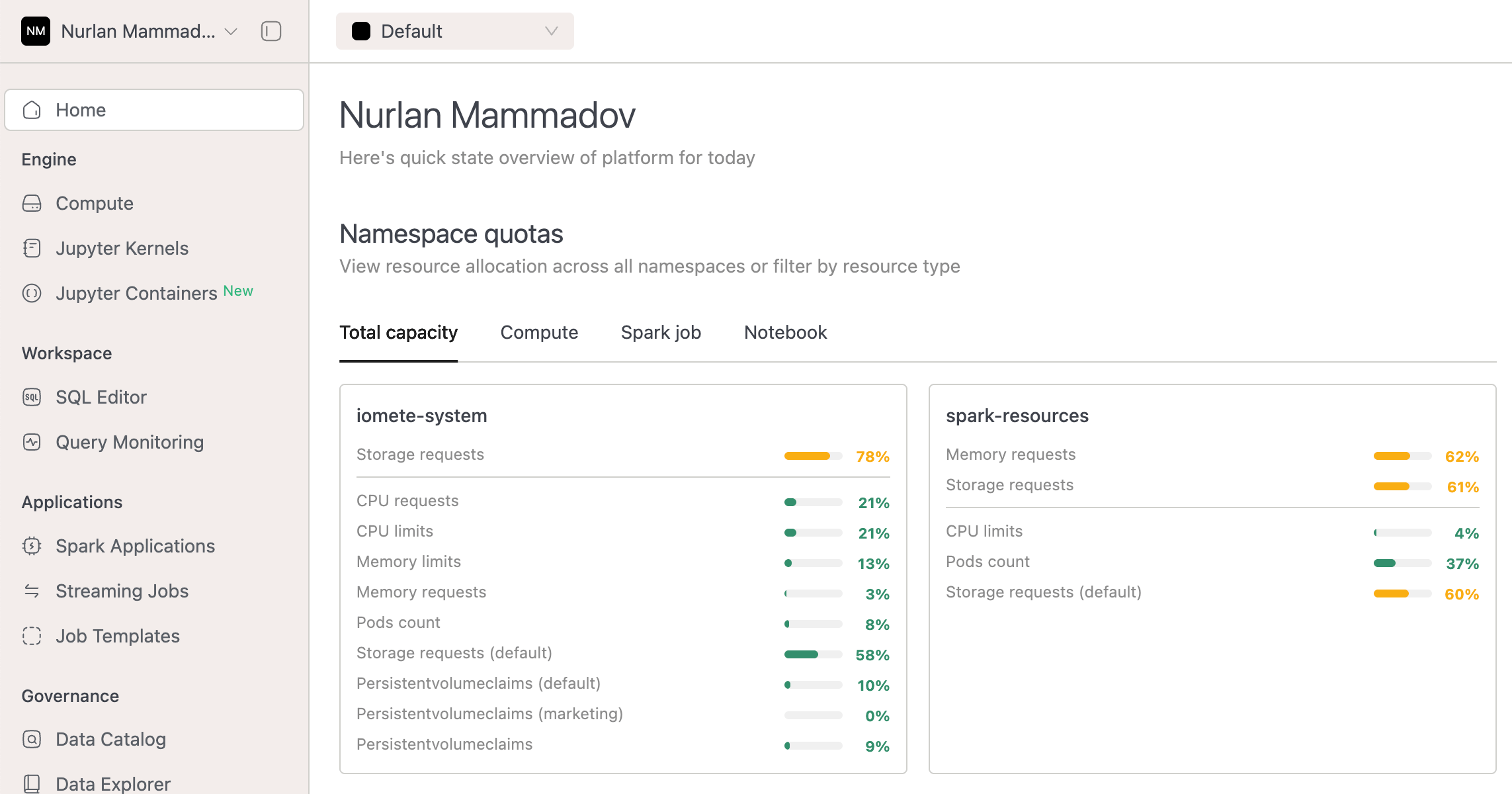
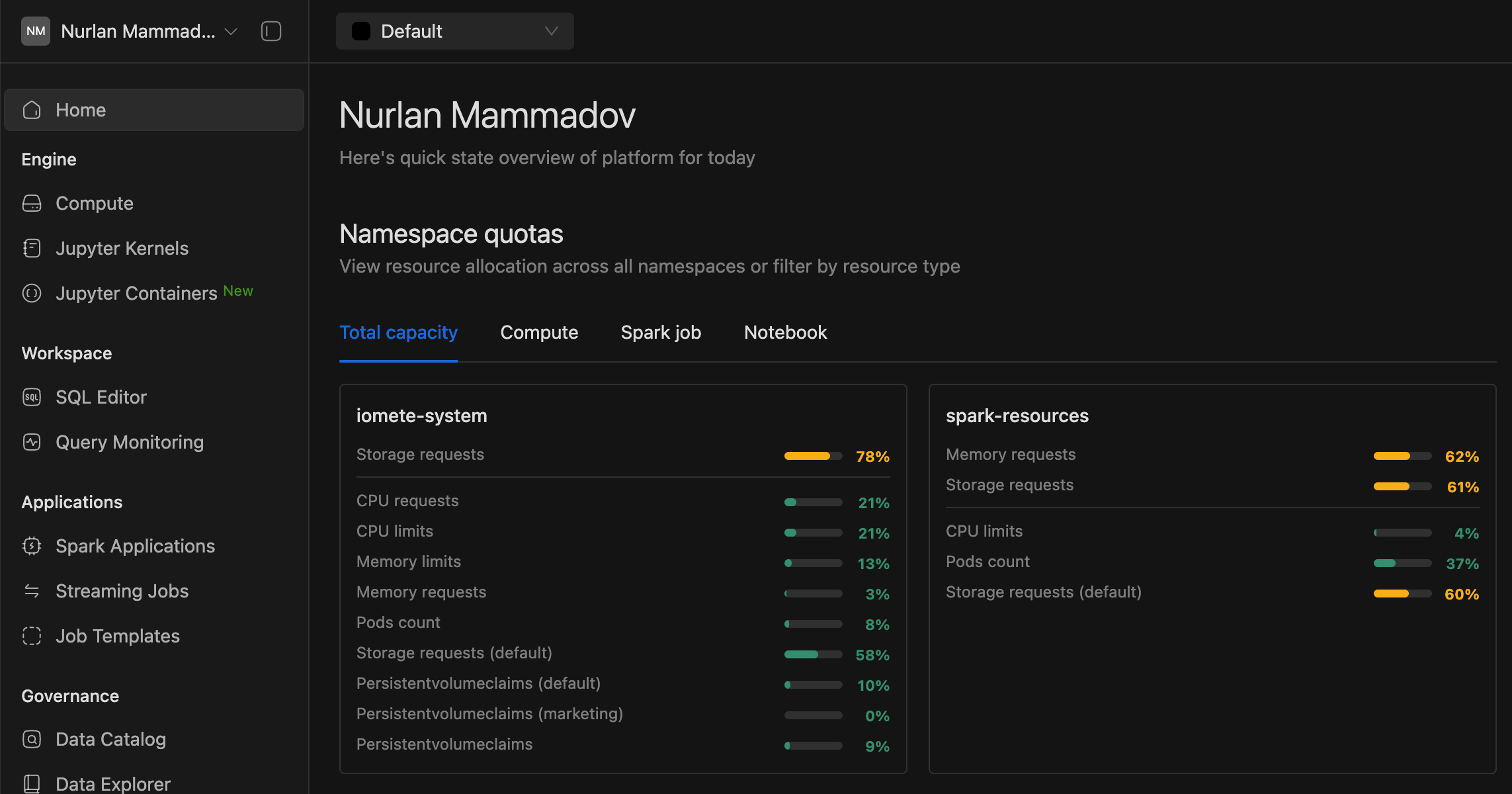
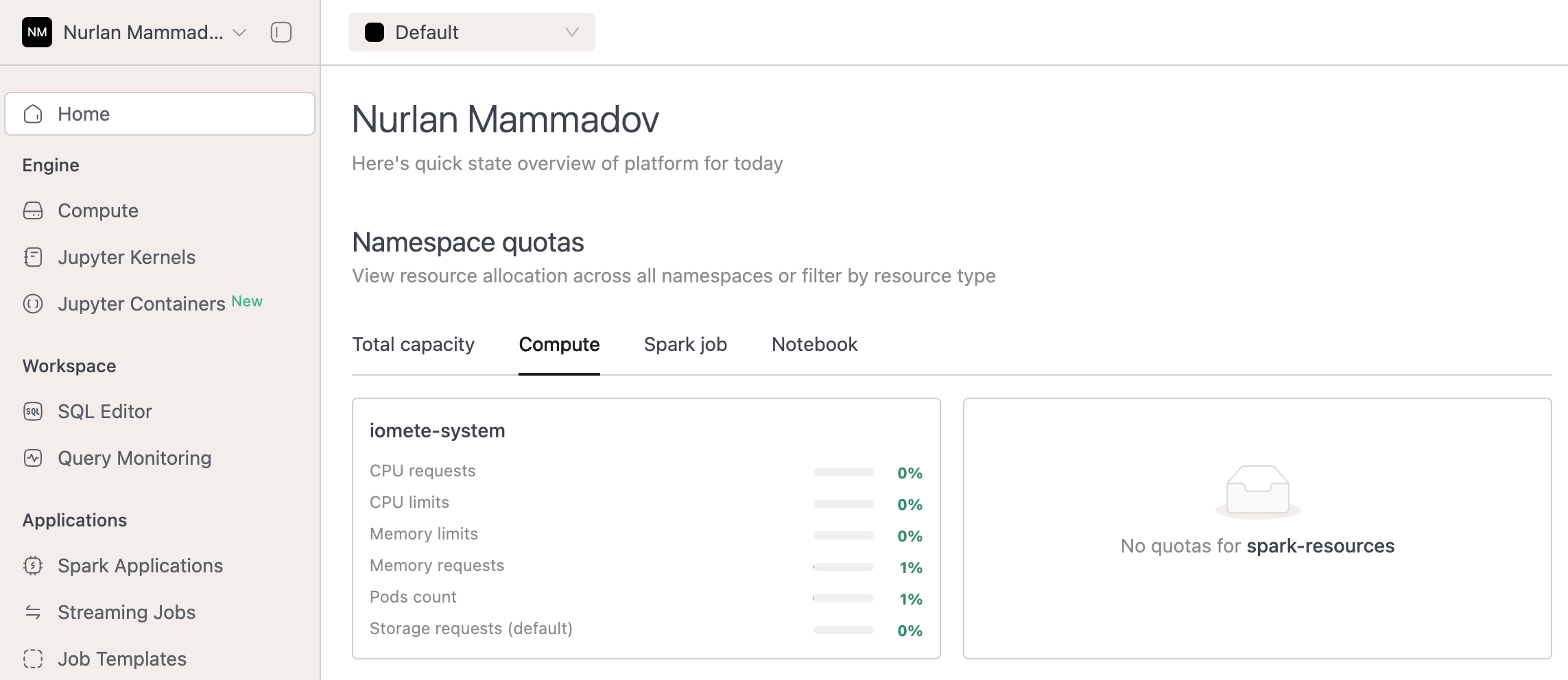
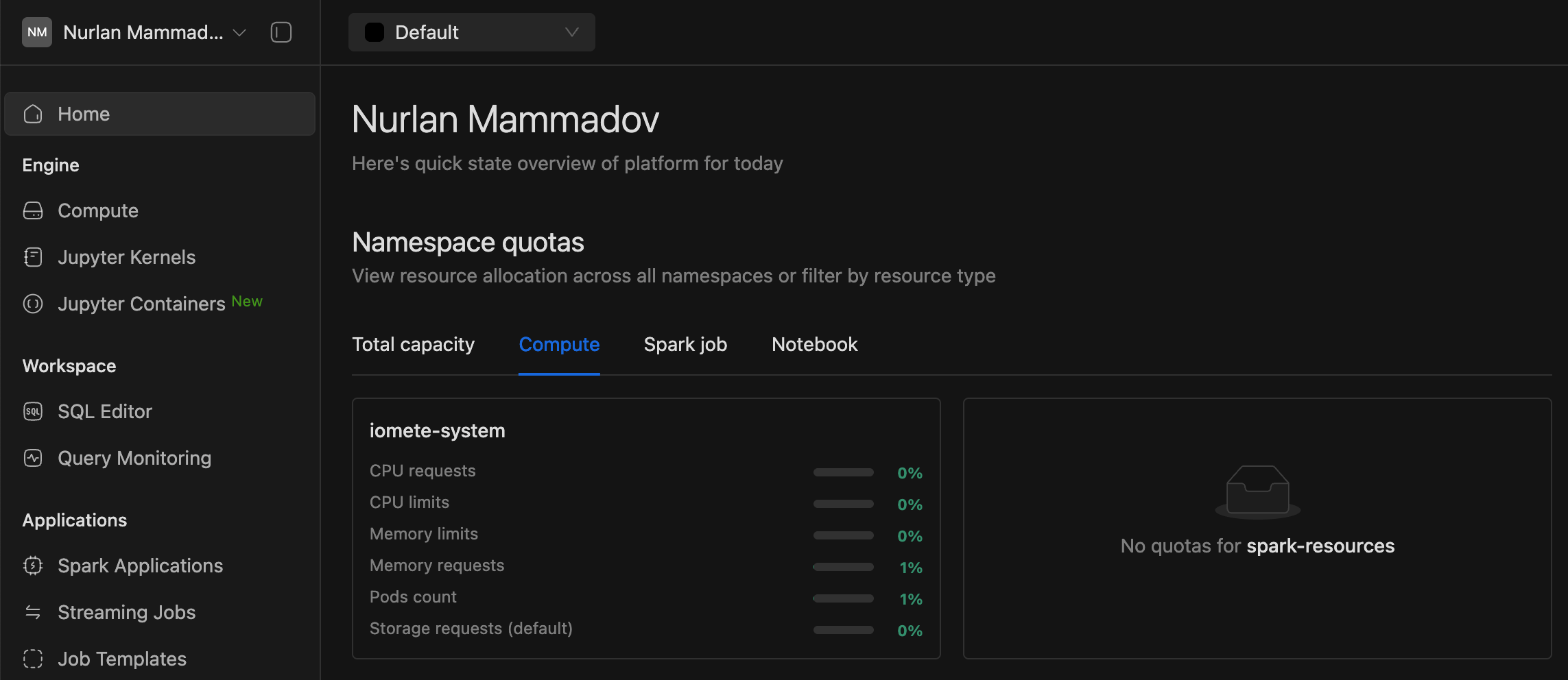
-
Added
Storage class nameto Volume details view for improved visibility.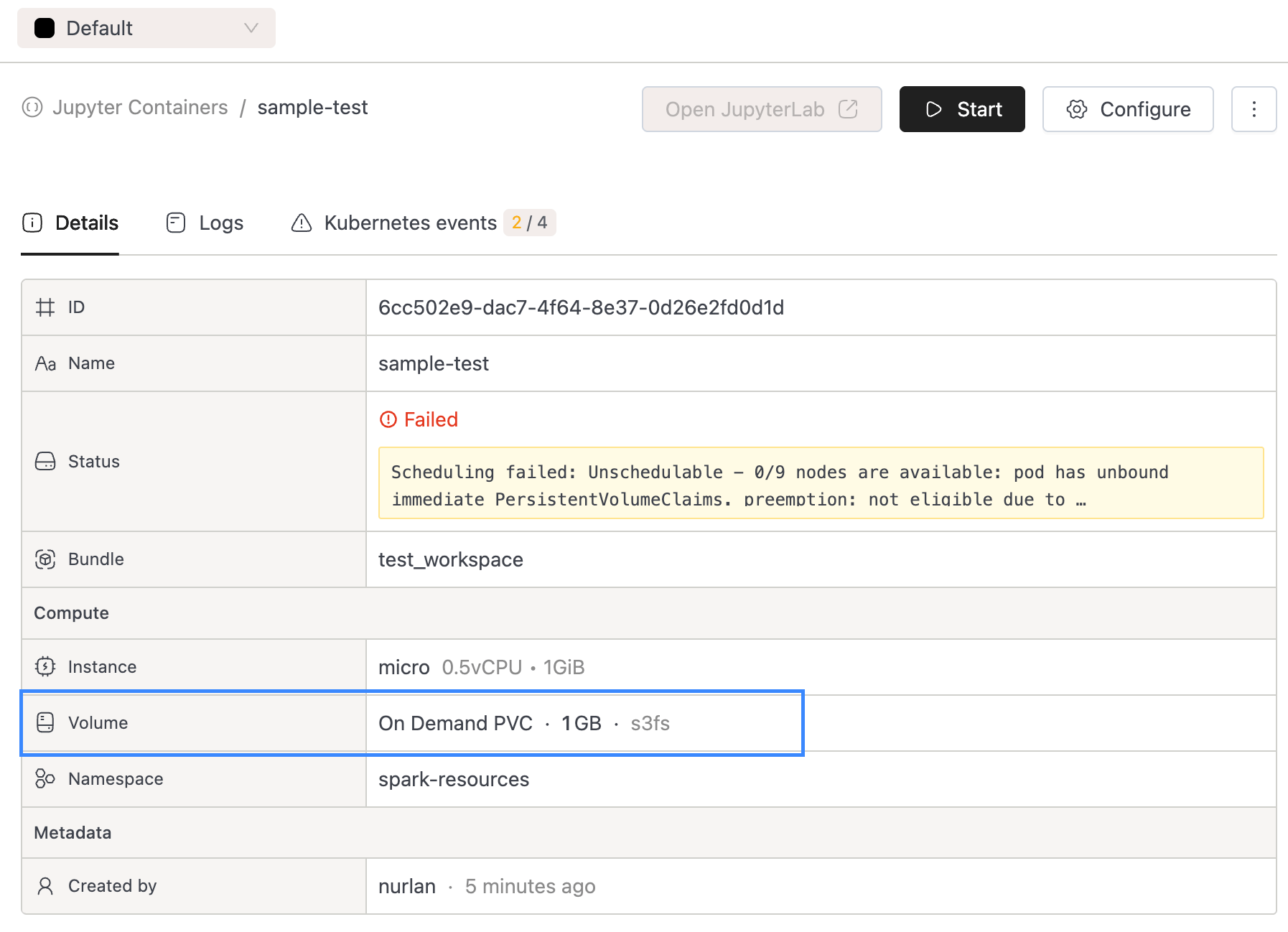
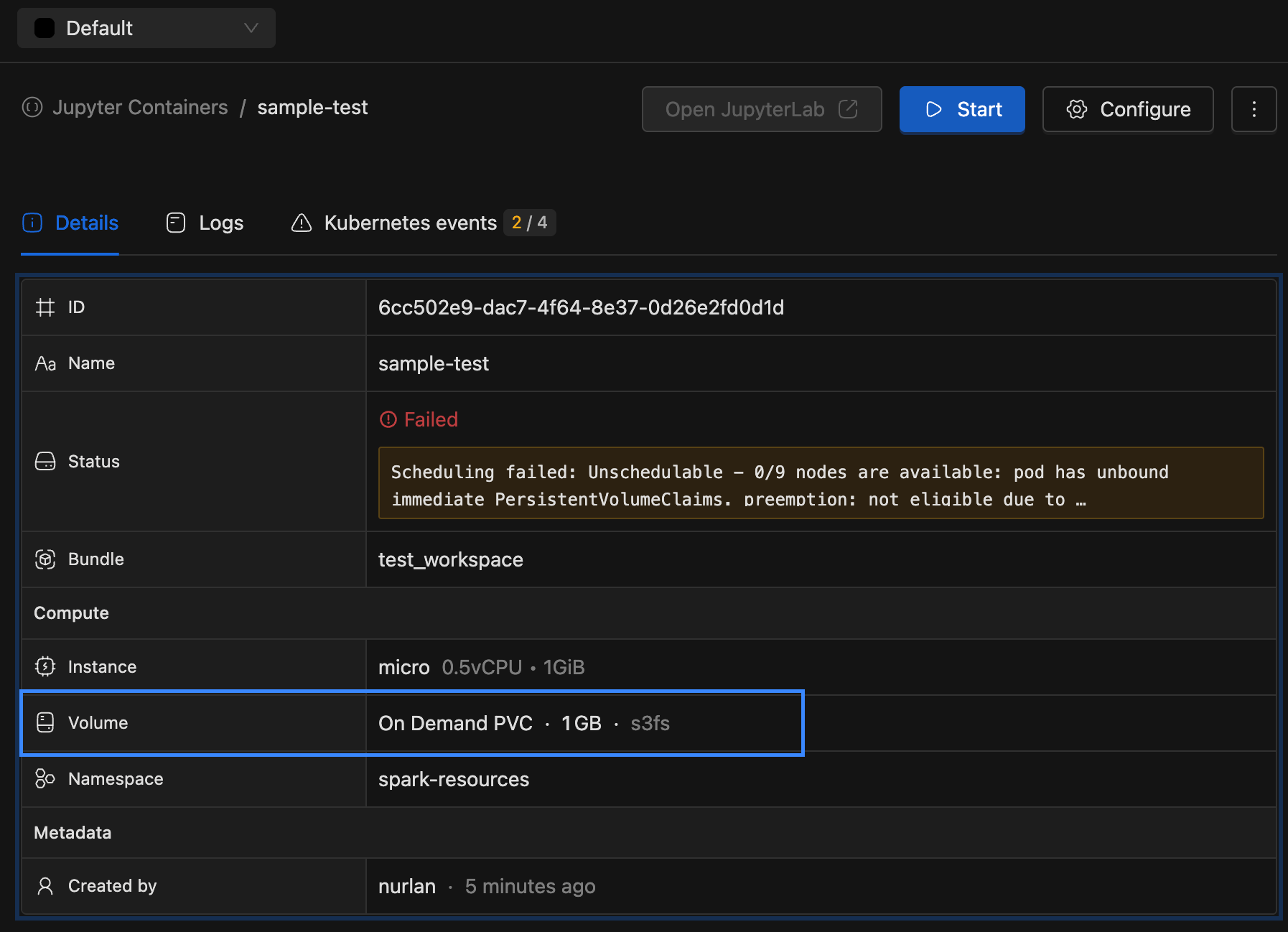
-
Improved handling of non-array data in namespace quotas by resource type.
-
-
Jupyter Container Improvements:
- Improved Jupyter Containers deployment to respect priority class threshold
🐛 Bug Fixes
- Fixed an issue where test connection in create/edit catalog and create/edit storage config was not working properly.
v3.13.2
⚡ Improvements
- Users can now add resources to resource bundles where they are the owner or listed as an actor.
v3.13.1
⚡ Improvements
- Added support for optional bundle in Spark Job creation via API call. Spark Job is added to default resource bundle if no bundle id is provided in request payload
🐛 Bug Fixes
- Fixed Spark Job logs permission issue
v3.13.0
⚡ Improvements
- Jupyter Containers:
- Implemented automatic sign-in when launching a new Jupyter Container instance, removing the need for manual authentication.
- Added persistent storage support for Jupyter Container instances using PVC and NFS. Volume attachment is now optional — users can choose to launch temporary Jupyter Containers without any volume attached.
- Onboarded Jupyter Containers to the RAS framework, enabling management through resource bundles. You can now streamline access control by granting permissions to users and groups at the resource bundle level.
- Spark Applications filtering optimizations in UI:
- Optimized SQL queries for filtering Spark applications by resource tags.
- Resource Bundles:
- Added search and sort functionality to the resource bundle listing dashboard to improve resource bundle user experience.
- Spark Job Metrics Link:
- Updated Grafana links on the Job Run page to include a 5-minute time buffer around job duration to account for ingestion delays.
- Added
var-app_idandvar-job_idquery parameters for precise filtering directly from the console.
- External Grafana Dashboard:
- Added support for configuring external Grafana dashboard URLs via system configuration with given properties
external-grafana.service-availability.dashboard-urlexternal-grafana.alerting-rules.dashboard-url
- This allows monitoring links to work seamlessly even when Grafana is hosted externally.
- Added support for configuring external Grafana dashboard URLs via system configuration with given properties
- Resource Quotas Visualization enhancements:
- Added resource quota visualization to both the Admin Portal → Namespaces page and the Domain Home Page, showing usage for Compute Clusters, Spark Jobs, and (if enabled) Jupyter Containers at the namespace level.
- These visualizations appear only when Priority Classes are enabled in helm chart.
- Moved the tooltip to the right side and aligned values inside the tooltip to the right for better readability.
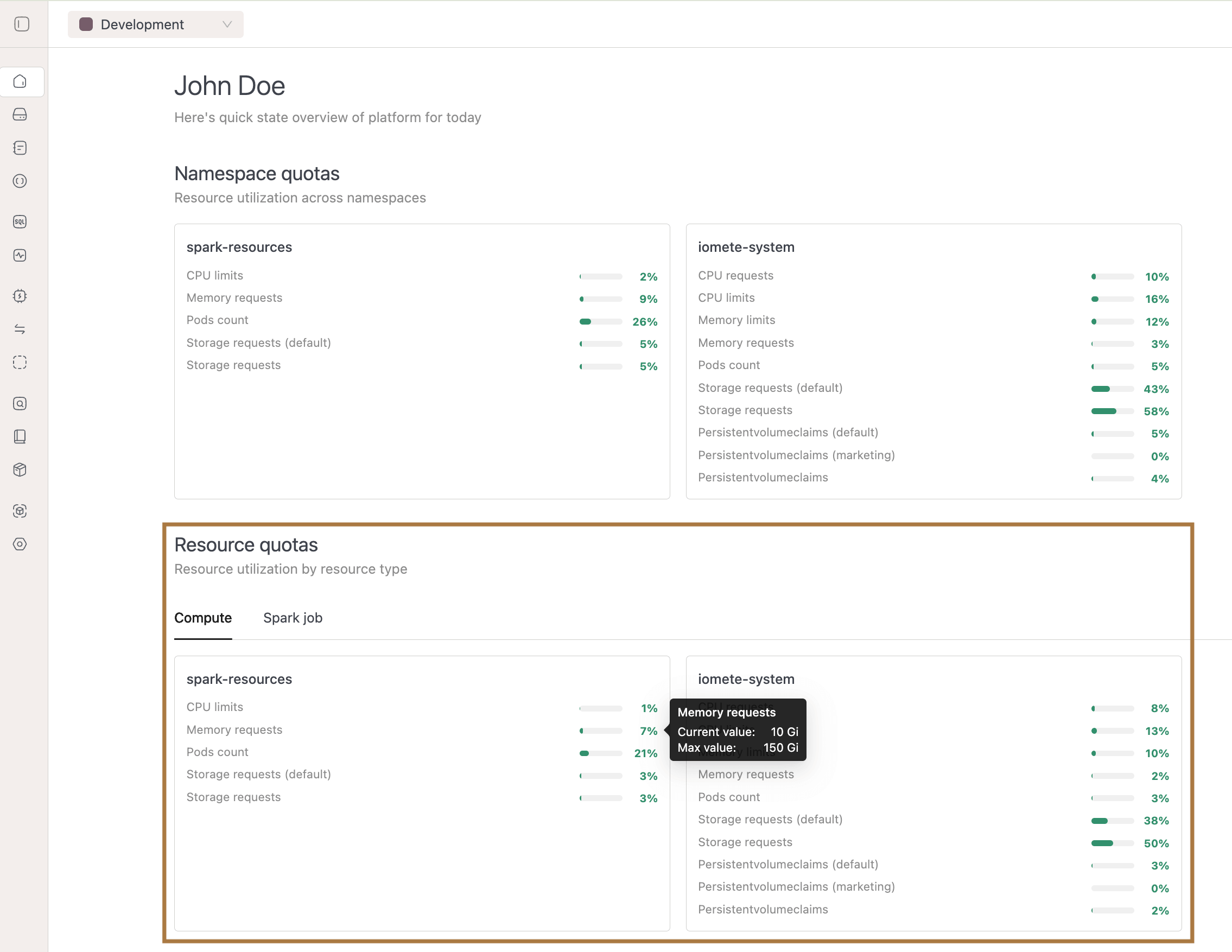
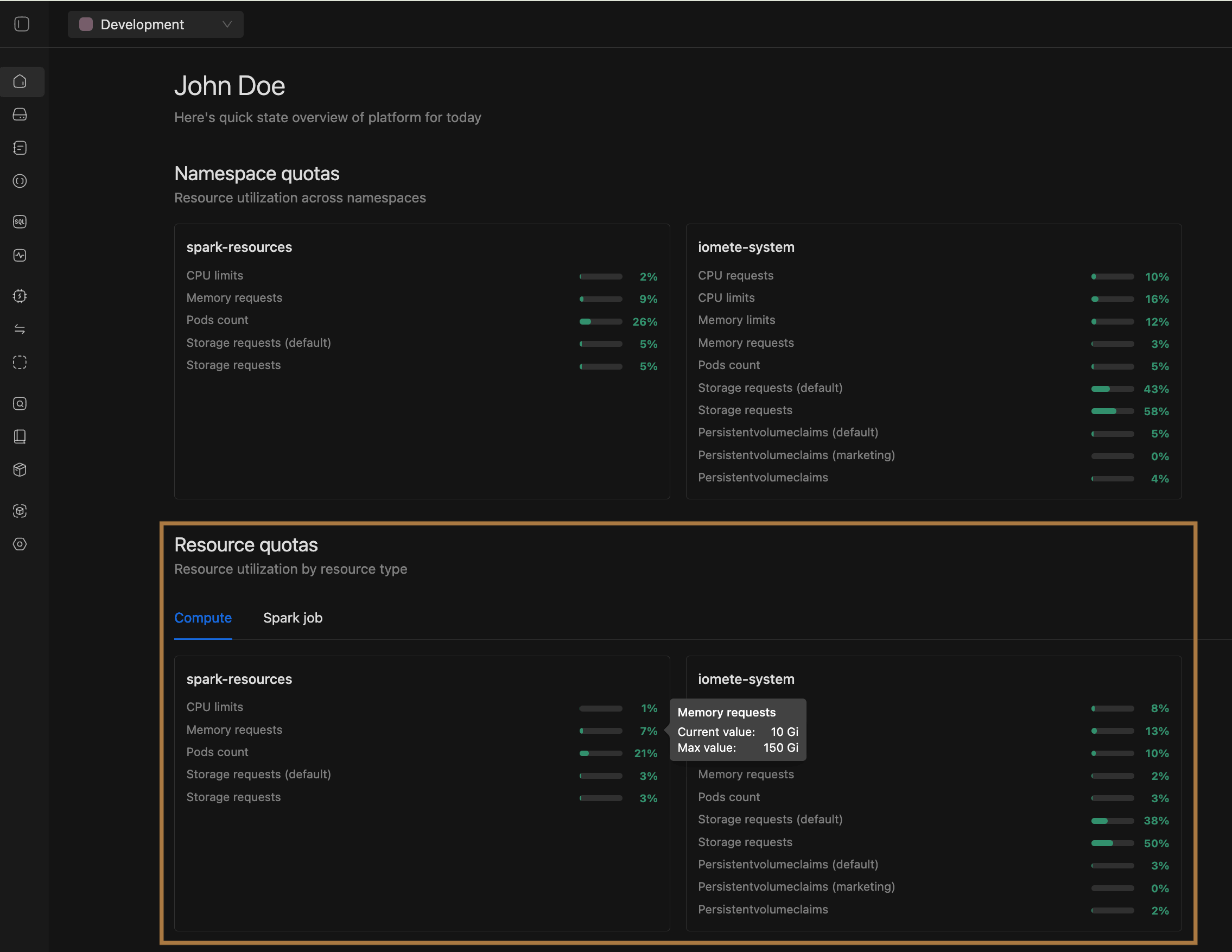
- Resource Quota Enforcement:
- All Resources:
- Introduced volume-based threshold checks in addition to existing quota checks for Compute Clusters, Spark Jobs, and Jupyter Containers.
- Added frontend validations so users can instantly see if their resource requests exceed quotas before submitting.
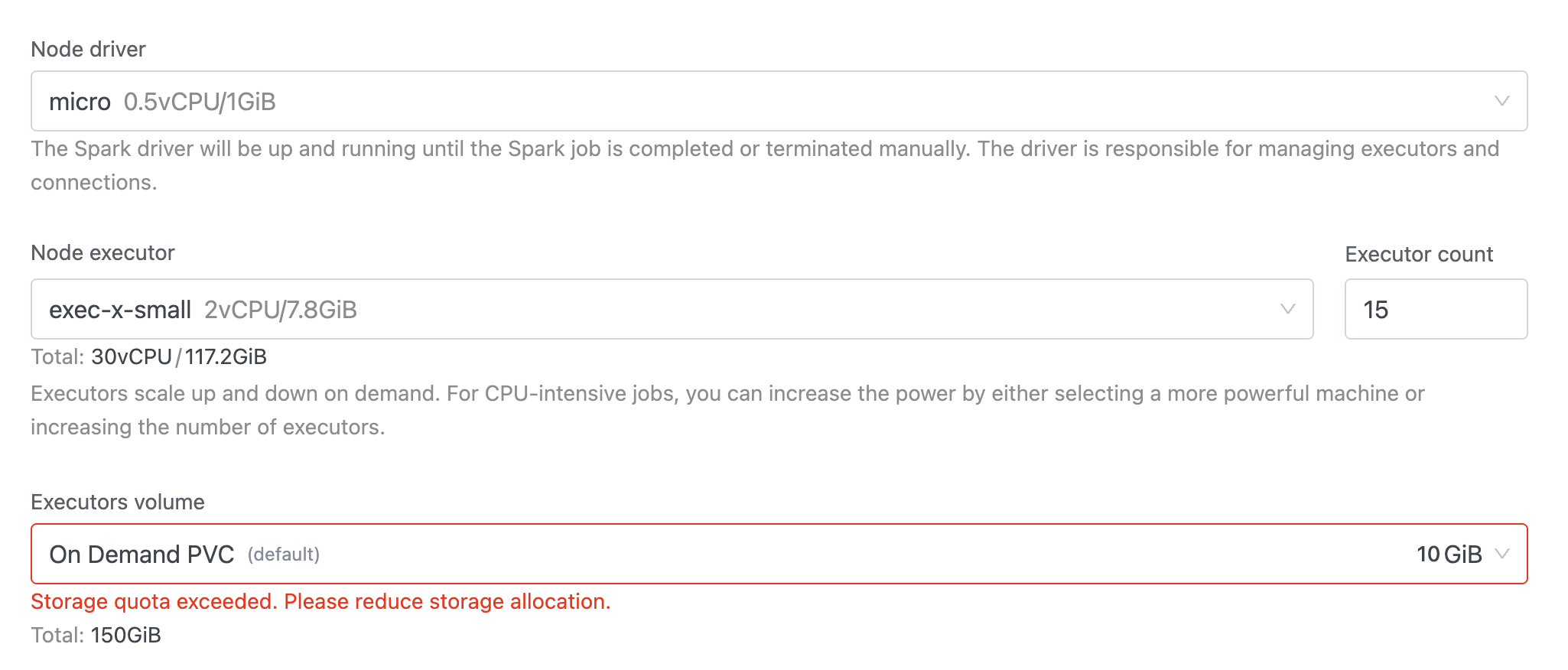
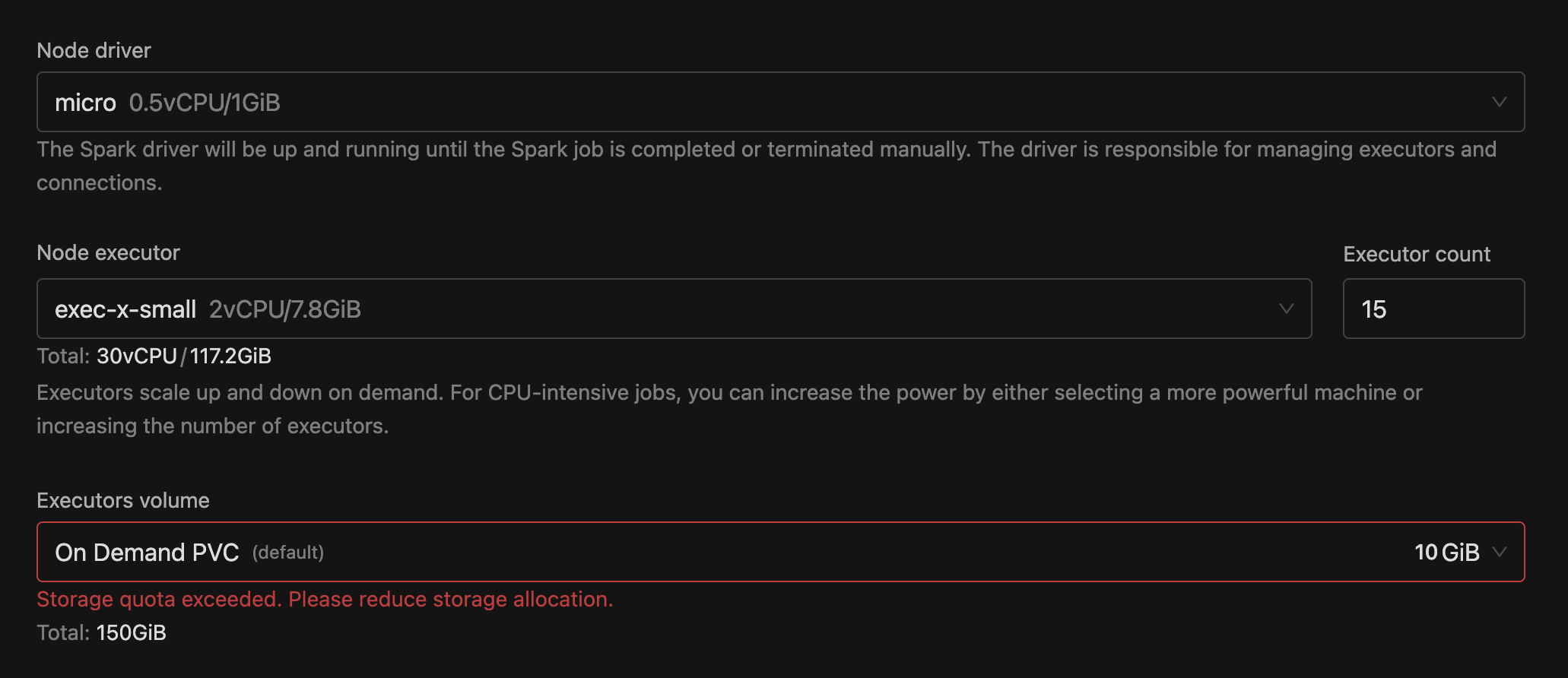
- Added a Resource Allocation Summary on create/edit pages to show how much of each resource will be used versus maximum limits.


- Quotas continue to be enforced at both the namespace and priority-class levels (when configured).
- Spark Job:
- For jobs using the new Job Orchestrator flow, additional quota checks have been added to further improve job queuing when limits are reached. This ensures consistent quota enforcement across both job creation/update and job scheduling.
- CPU (requests)
- Memory (requests)
- Storage (general & storage-class-specific)
- PersistentVolumeClaims (PVCs) (general & storage-class-specific)
- Grafana Dashboard Update: Job Orchestrator dashboards now display updated quota utilization insights.
- For jobs using the new Job Orchestrator flow, additional quota checks have been added to further improve job queuing when limits are reached. This ensures consistent quota enforcement across both job creation/update and job scheduling.
- All Resources:
- Resource Create/Edit Page: Displayed the storage class name for On-Demand PVC volumes, making it easier for users to identify which storage class will be used for each volume.
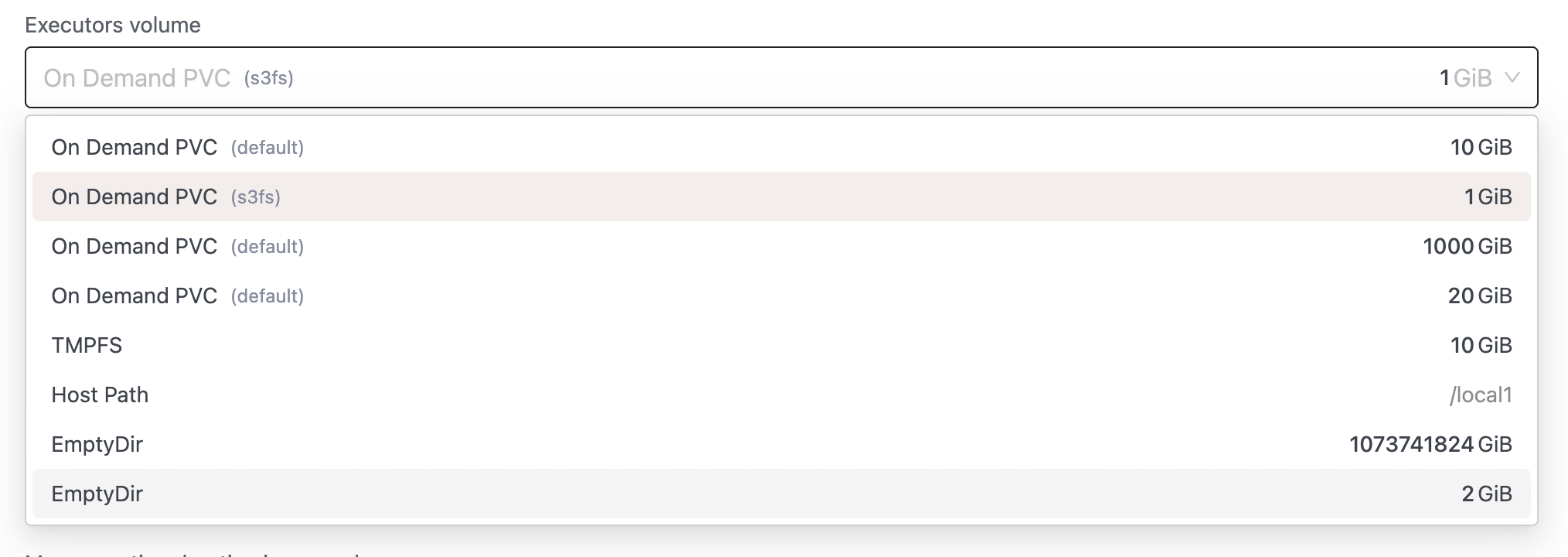
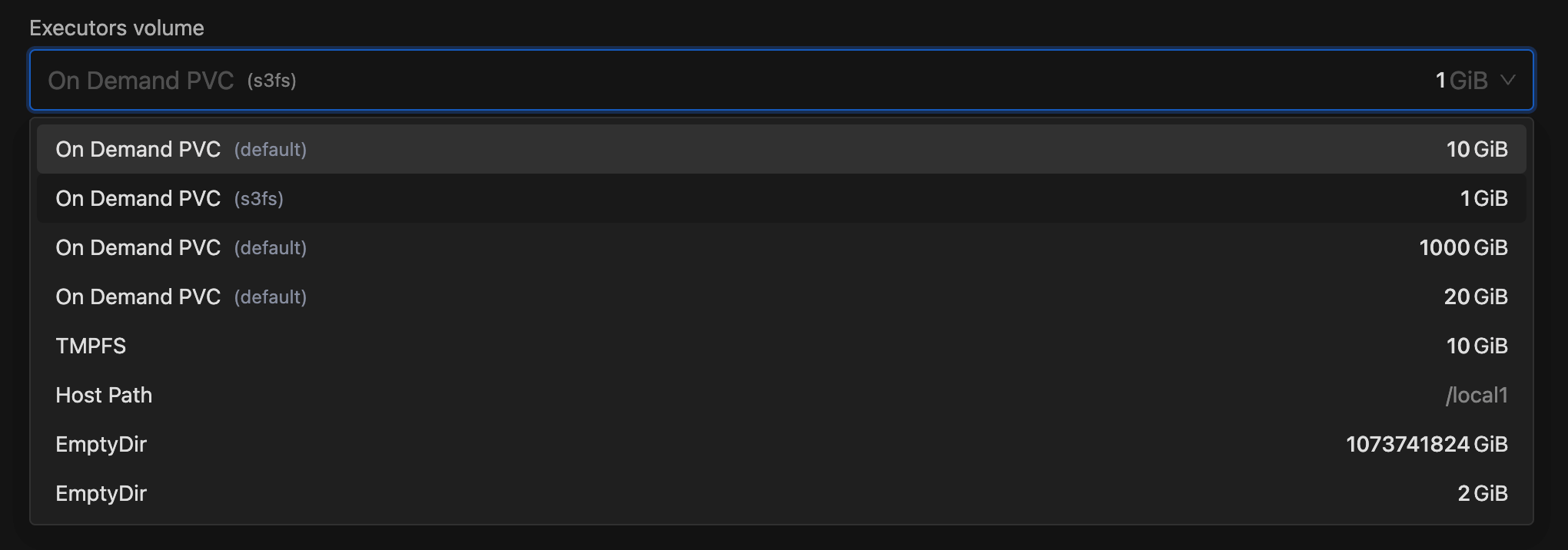
- Spark Images for Spark Jobs:
- Added support for selecting configurable IOMETE Spark images when creating Spark Jobs, with available versions defined via the
docker.defaultSparkVersionanddocker.additionalSparkVersionsfields in the Helm chart’svalues.yamlfile. - Image options are shown dynamically based on the chosen application type — Python displays Python based images, while JVM displays JVM based images.
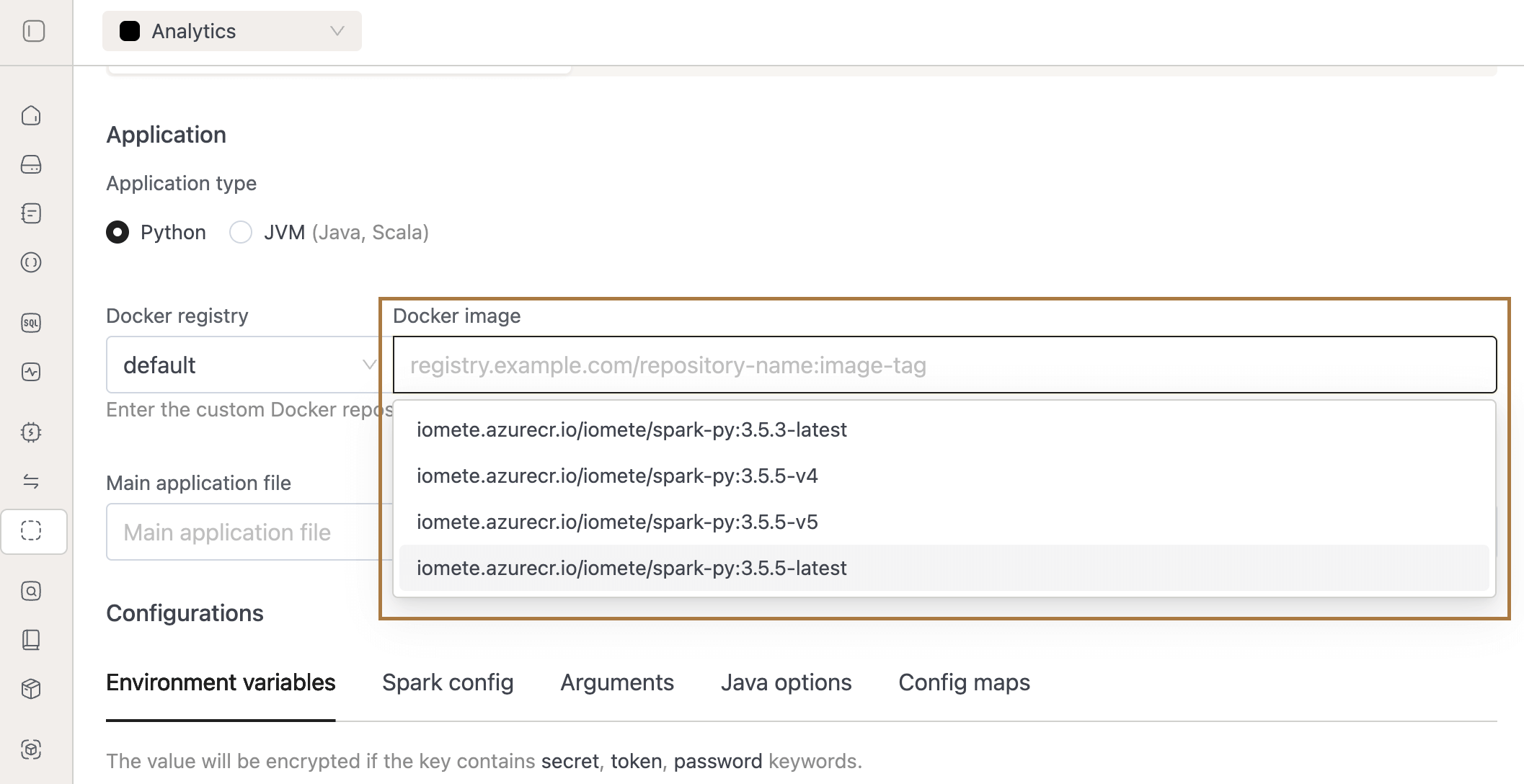
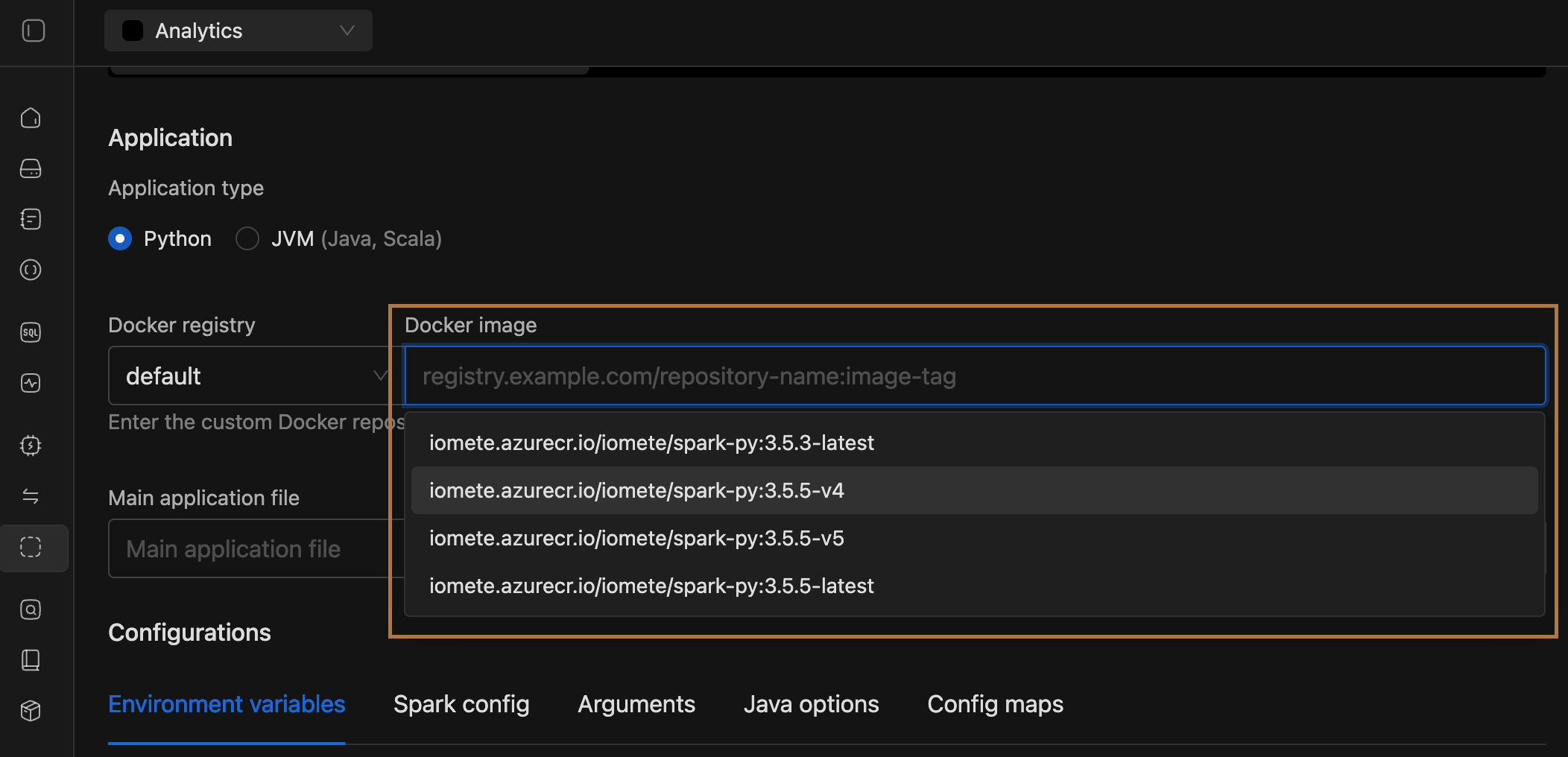
- Added support for selecting configurable IOMETE Spark images when creating Spark Jobs, with available versions defined via the
- Deployment Flow Renamed: Renamed the deployment flow from Prefect to Priority-Based.
- Spark Job Access Management: Onboarded Spark Jobs to the RAS framework, enabling management through resource bundles. You can now streamline access control by granting permissions to users and groups at the resource bundle level eliminating the need to manage role based permissions
- SQL Editor CSV Export permission: CSV export functionality in the SQL Editor is now role-based. A new permission has been added to roles to control access to exporting result sets as CSV files.


- Admins are now fully authorized users in RAS: Super Admin, Domain Manager Admins and Domain Owners have full authorization within the RAS framework.
- Spark/Arrowflight:
- Added possibility to override the content-type for the Arrow file format when uploading data to S3 (Offload mode enabled). For overriding you can set spark configuration per compute or on a global level
spark.iomete.arrow.flight.sql.arrowFetch.storage.s3.contentTypeOverride. - Onboarded Spark to new RAS Authorization. Now external clients using JDBC/ODBC or Spark Connect will have to have a
consumerights on RAS in order to utilize Spark.
- Added possibility to override the content-type for the Arrow file format when uploading data to S3 (Offload mode enabled). For overriding you can set spark configuration per compute or on a global level
🐛 Bug Fixes
- Spark Jobs:
- Job Validation Fix:
- Fixed an issue where jobs could be created or updated with type SCHEDULED without providing a schedule, causing broken entries in the Jobs UI.
- Cause: Missing validation allowed
SCHEDULEDjobs to be created without a schedule. - Fix: Added validation requiring a schedule when creating or updating
SCHEDULEDjobs.- Note/Important: If missing, the API now throws an error.
- Migration: Existing invalid jobs are automatically corrected by changing their type to MANUAL.
- Restart Policy Fix:
- Fixed an issue where Spark jobs configured with the Restart Policy = Always failed to restart and got stuck in the Failing state.
- Streaming Job Status Fix: Fixed an issue where streaming job status remained outdated during startup or execution timeouts because only the Spark application status was being updated.
- Removed validation which required connection tests to pass while creating storage configs
- Job Validation Fix:
- SQL Editor:
- Fixed an issue where selected database was not being propagated when connecting via Arrow Flight.
- Fixed an issue where appending a query tag to the end of the SQL statement caused a syntax error.
- Access Token Expiry Notifications:
- Fixed an issue where system-managed tokens were being incorrectly included in expiry notifications.
- Spark History:
- Fixed the issue where clicking "Spark UI" to access Spark History sometimes resulted in "Application not found" error. To enable this optimization, set the following values:
- spark.history.provider=org.apache.spark.deploy.history.IometeFsHistoryProvider
- spark.history.fs.update.interval=2147000000 (large number, nearly Int.MAX_VALUE)
- Fixed the issue where clicking "Spark UI" to access Spark History sometimes resulted in "Application not found" error. To enable this optimization, set the following values:
v3.12.2
🐛 Bug Fixes
-
Improved NFS validation, to ensure multiple NFS storages can exists and be used for different workloads
-
Removed validation which required connection tests to pass while creating storage configs
-
Resource Bundle list
- Fixed issue where the Archive button did not work in the dropdown menu.
-
Resource Bundle Form
- Made the Description field optional.
- Set the default Owner type to Group.
-
Resource Bundle Detail – Permissions Form
- Set the default Actor type to Group.
- Removed the Permission Preview page.
-
Spark (ArrowFlight)
- Resolved an issue where queries with LIMIT over the ArrowFlight protocol still triggered a full table scan.
- Removed an unnecessary bucket-level permission check in ArrowFetch that was causing incorrect “access denied” errors.
-
SQL Editor - Fixed manual scrollbar dragging issue in Database Explorer.
v3.12.1
🐛 Bug Fixes
- Fixed compute cluster single-node cluster creation failure due to resource quota validation issue.
v3.12.0
Upgrade with caution. Core Authorization System has changed to RAS, in case you enable it (via helm feature flag) you will have to perform the migration Spark Job from IOMETE Marketplace
🚀 New Features
- Spark ArrowFlight S3 Offload (ArrowFetch mode)
- We’re introducing ArrowFetch, a powerful new way to export large datasets.
This feature leverages direct export from Spark executors to S3, eliminating the driver bottleneck and enabling faster, more scalable, and memory-safe exports.
With ArrowFetch, you can accelerate exports of big and huge datasets, making it especially valuable for external clients such as BI tools, QA tools, and enterprise data pipelines.
To enable this feature, set the configuration:
spark.iomete.arrow.flight.sql.arrowFetch=trueand provide the required S3 settings as shown in the documentation.
- We’re introducing ArrowFetch, a powerful new way to export large datasets.
This feature leverages direct export from Spark executors to S3, eliminating the driver bottleneck and enabling faster, more scalable, and memory-safe exports.
With ArrowFetch, you can accelerate exports of big and huge datasets, making it especially valuable for external clients such as BI tools, QA tools, and enterprise data pipelines.
To enable this feature, set the configuration:
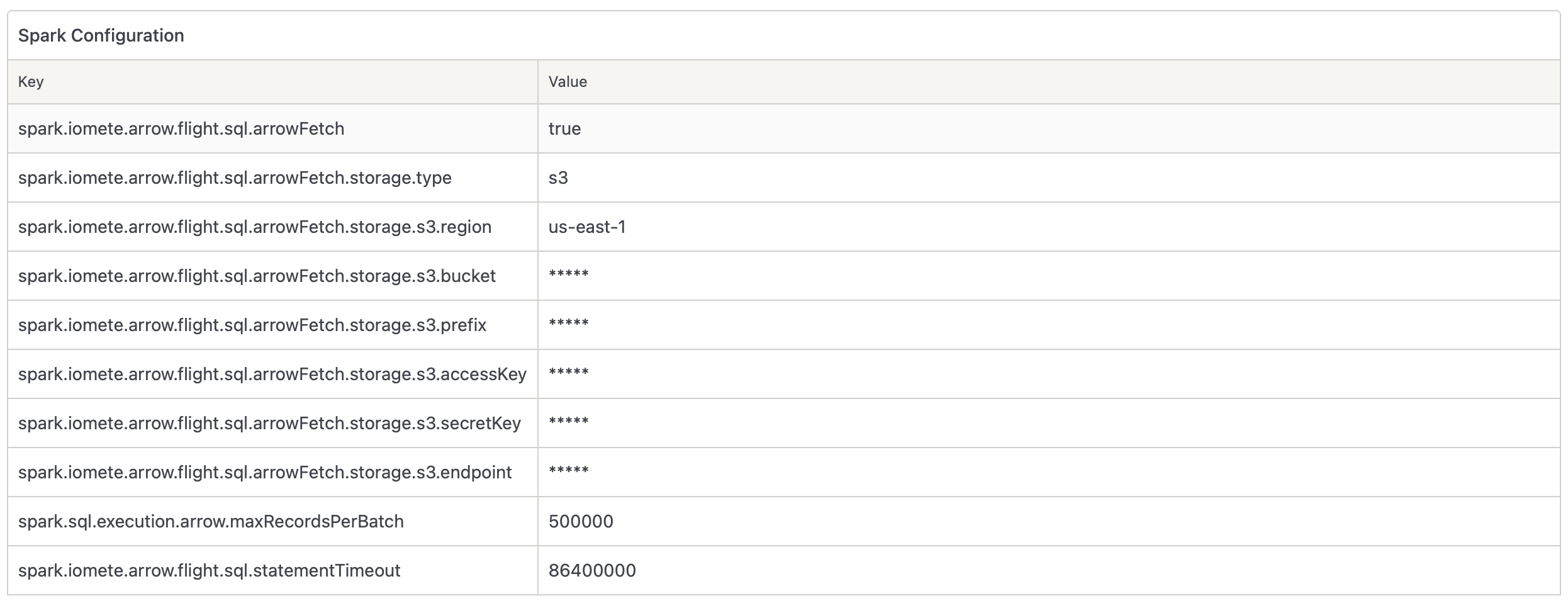
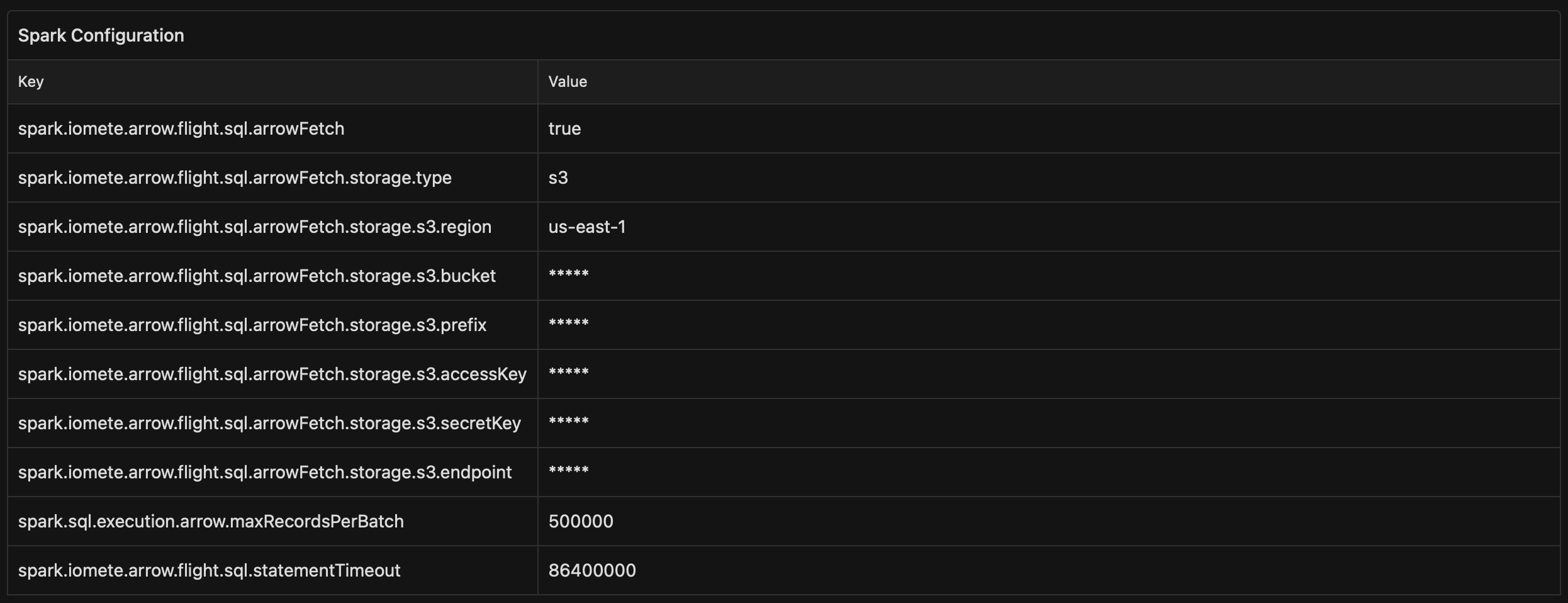
- Resource Authorization System (RAS) - Resource Bundles
- We're excited to introduce Resource Bundles, a powerful new feature that revolutionizes how you organize and manage access to your IOMETE resources. Resource Bundles allow you to group related resources — such as compute clusters, storage configurations, and workspaces — into logical collections with centralized permission management.
- With Resource Bundles, you can now streamline access control by granting permissions to users and groups at the resource bundle level eliminating the need to manage role based permissions. The system supports flexible ownership models, allowing resource bundles to be owned by individual users or groups, with automatic inheritance through group hierarchies. You can easily transfer assets between resource bundles, set granular permissions for different resource types, and maintain organized, secure access to your platform resources.
- See here for detailed information: Resource Authorization System Documentation


-
Storage Configurations:
- Configure external storage backends with secure authentication.
- Onboard resources to these storages and manage access through resource bundles.
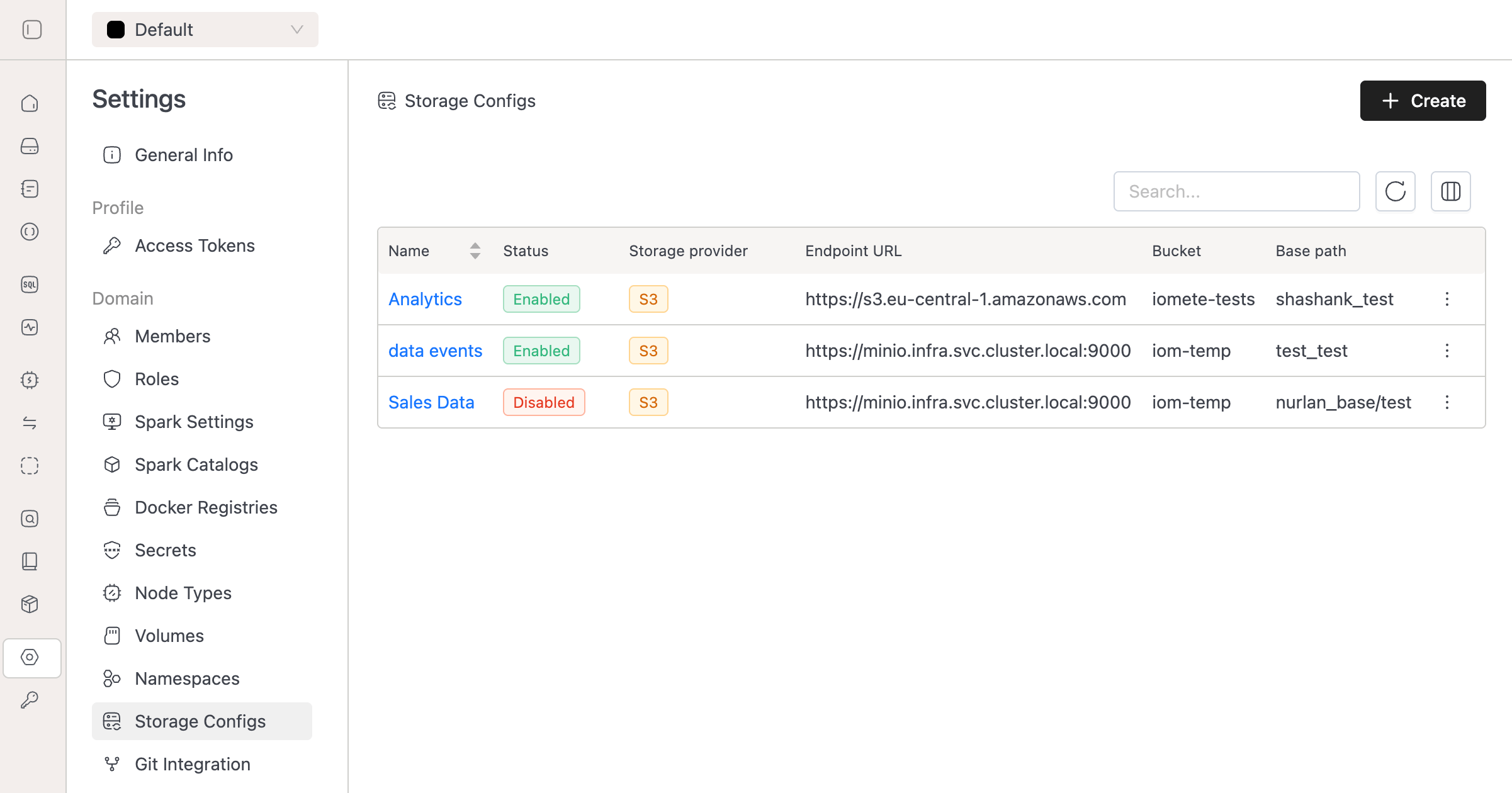
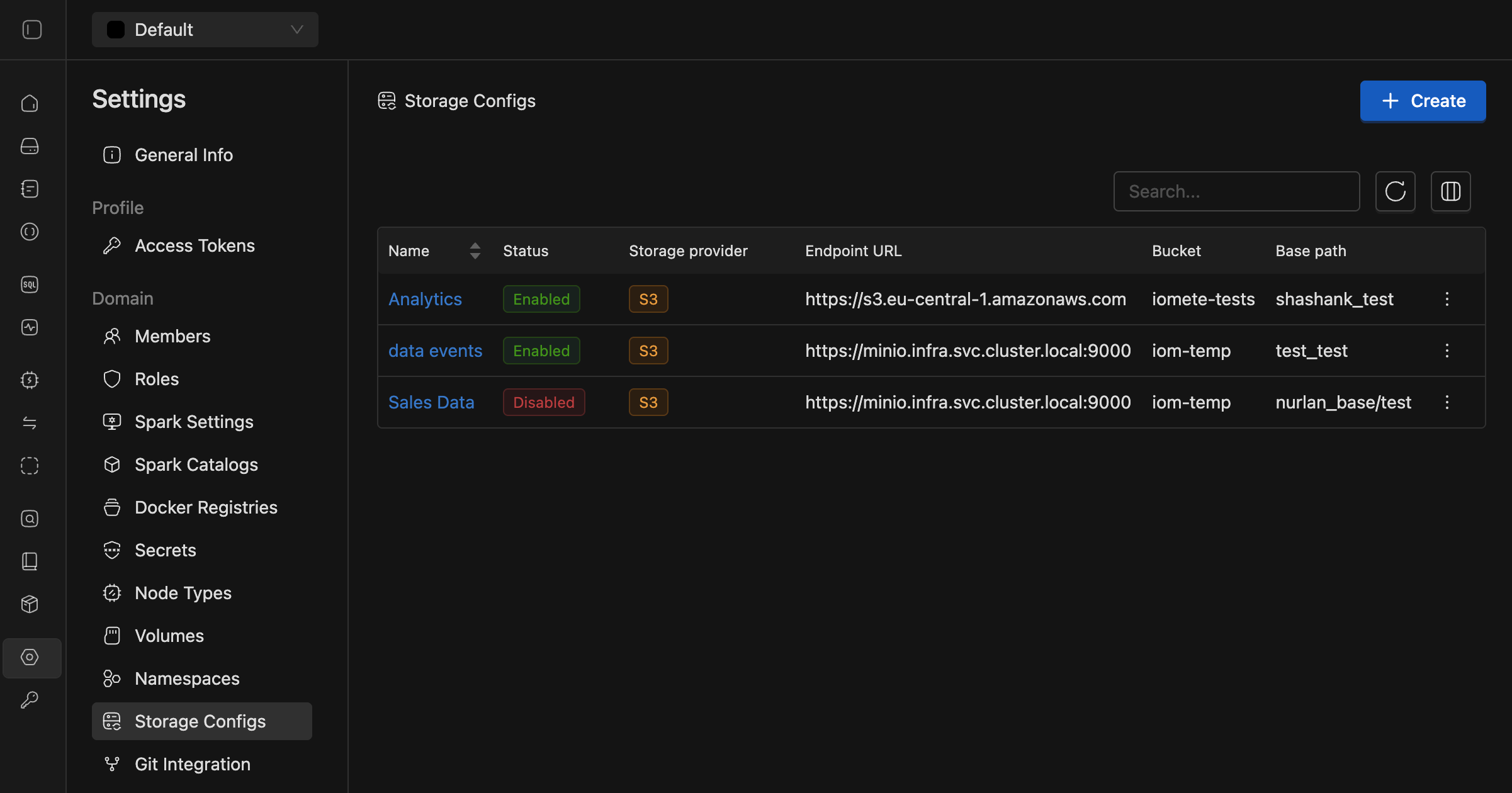
See the Storage Configs documentation for details.
-
Workspaces:
- Organize SQL worksheets into custom workspaces with folder hierarchies.
- Assign dedicated storages to workspaces via storage configs for data isolation & compliance.
- Control access through resource bundles, restricting view/write permissions for specific users or groups.
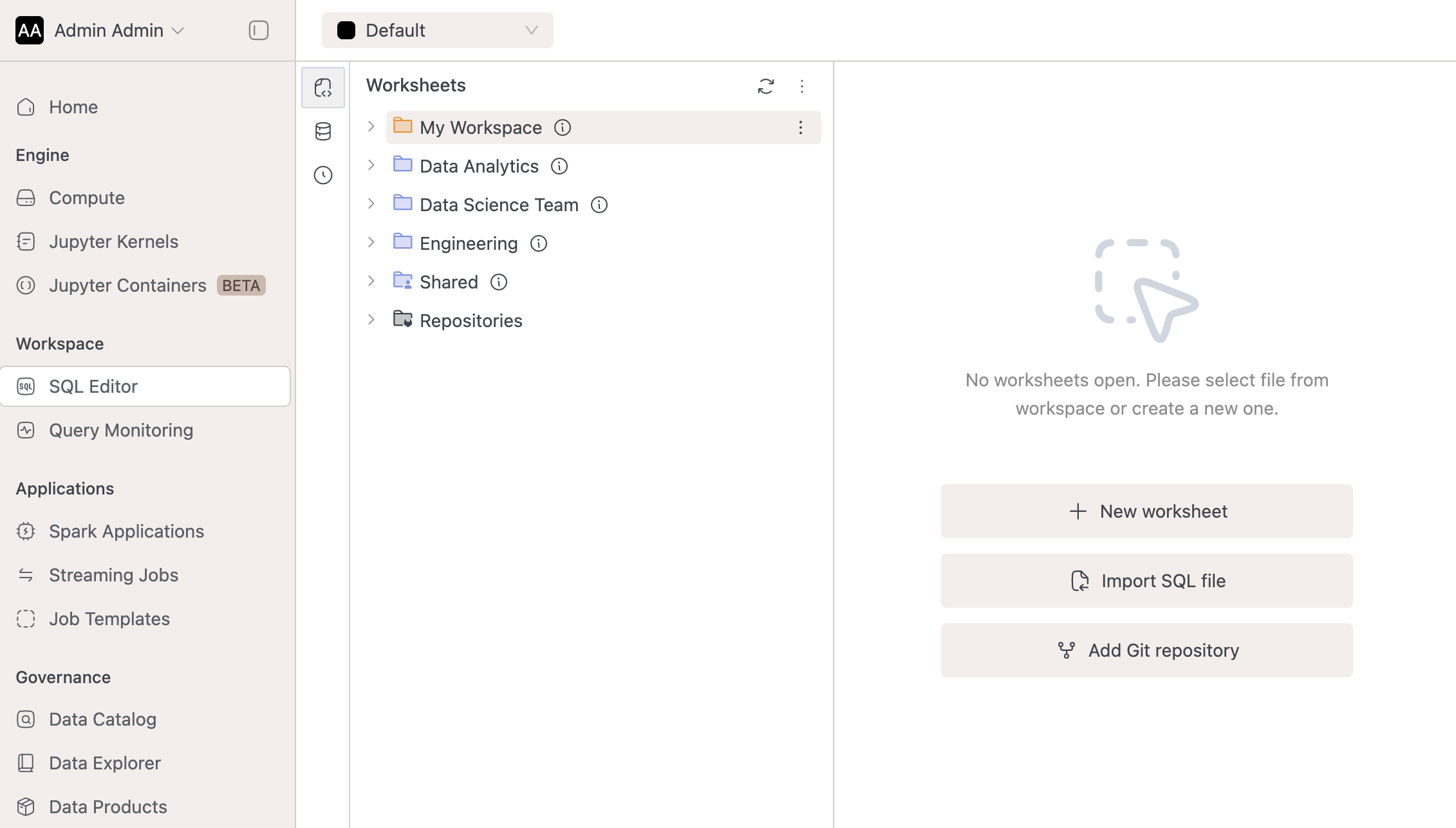
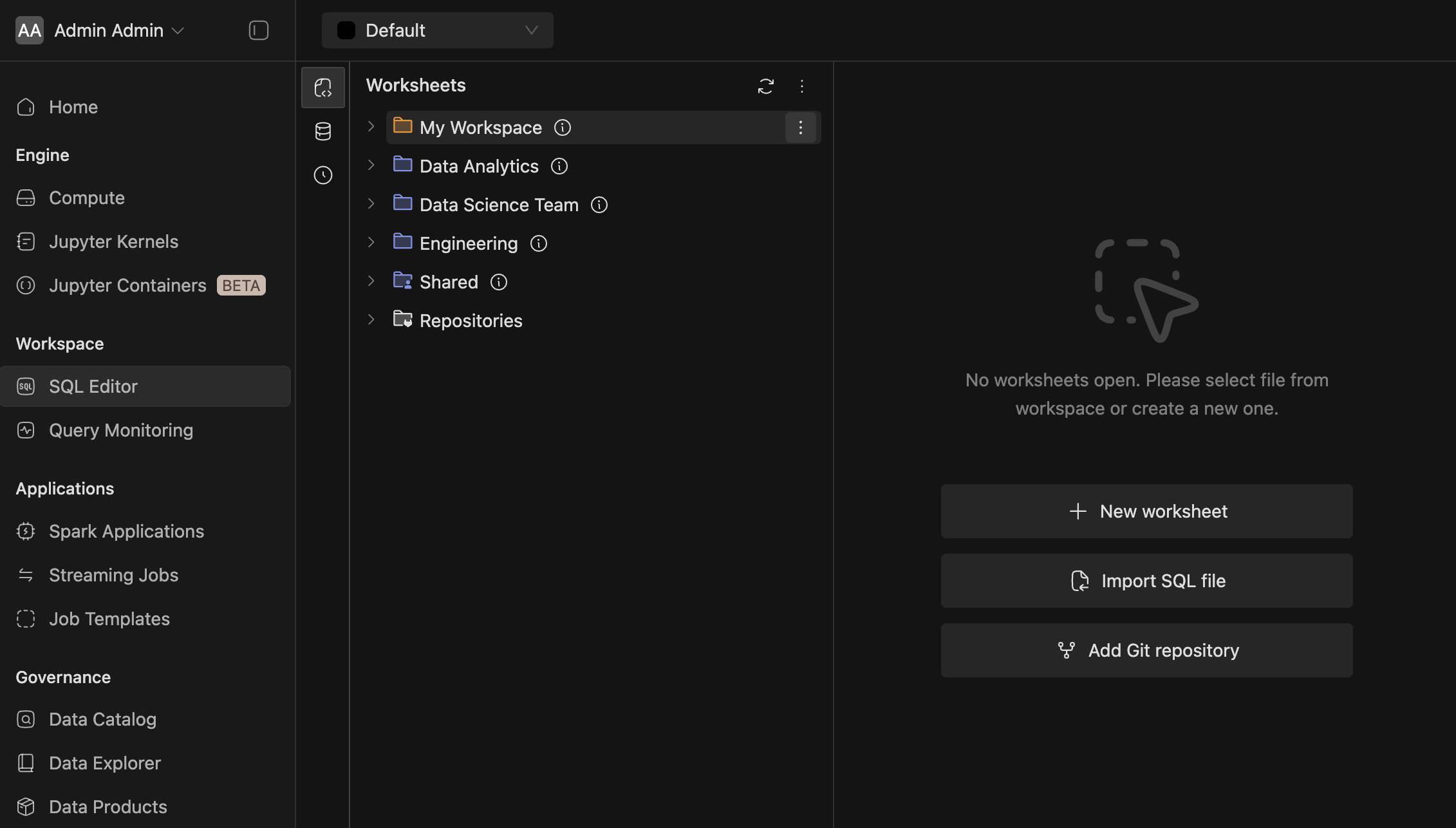
Learn more in the Workspaces documentation.
-
EmptyDir Volume Support
We've added support for EmptyDir as a new volume type. With EmptyDir it will be possible to isolate different workloads, automatic post-cleanup, defining usage limits while using node local disk which is not possible with Host Path volume type.
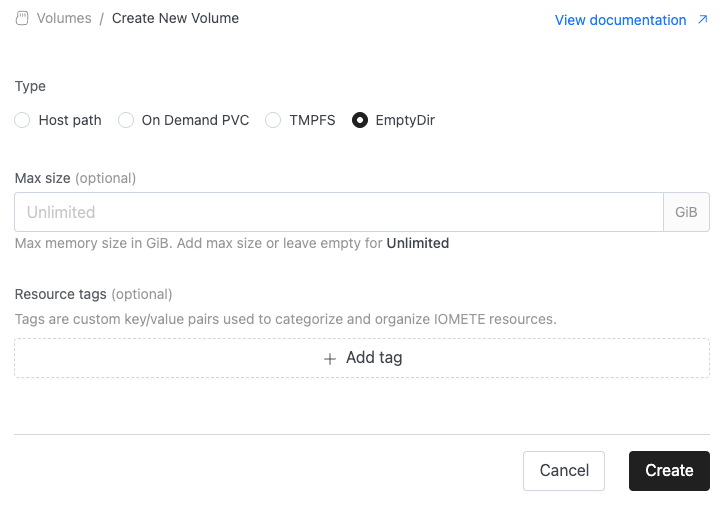
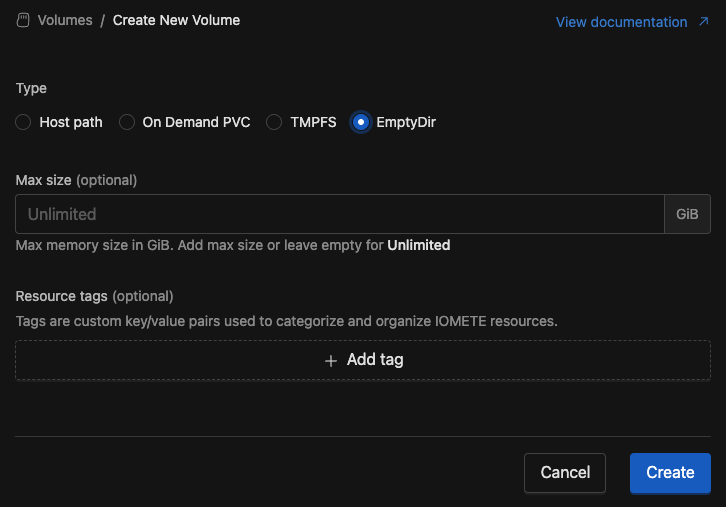
Check documentation
-
NFS Volume Support:
We’ve added support for NFS (Network File System) as a new volume type. With this update, users can now mount external NFS shares directly into their workloads. When creating a new volume, simply select NFS, provide the server address and exported path, and the system will handle the rest.
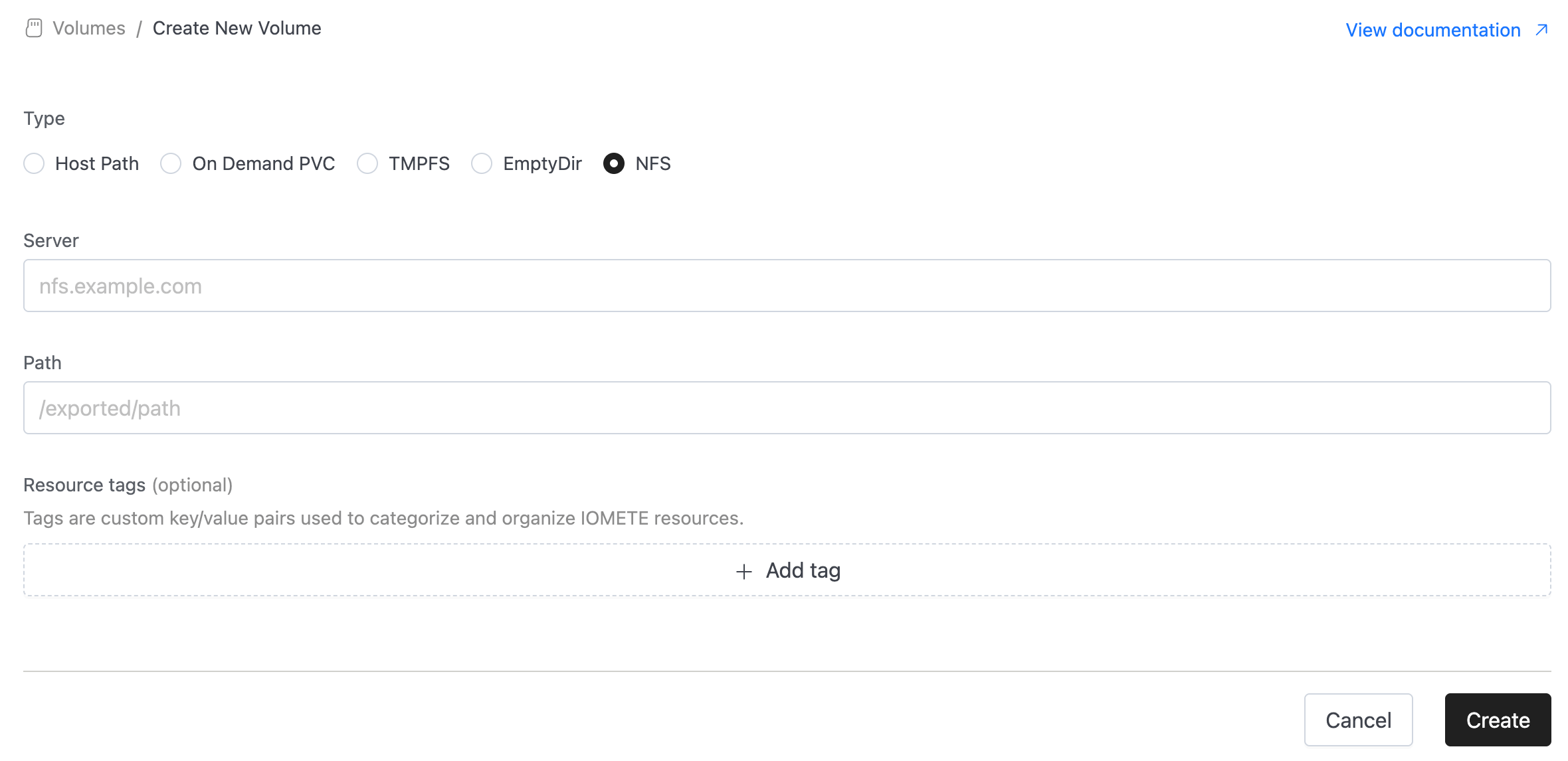
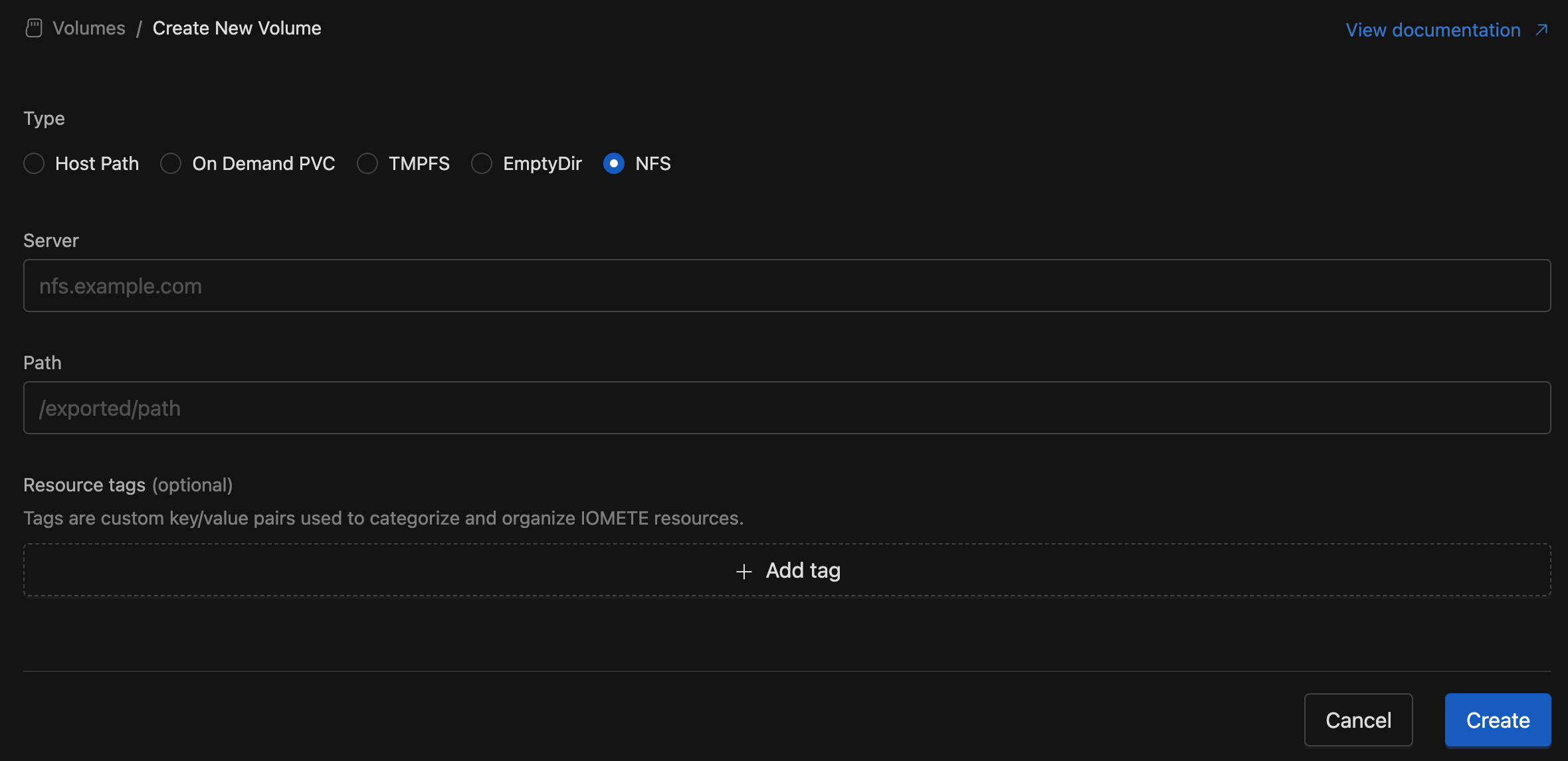
⚡ Improvements
- Access Token Expiry Notifications: Added support for configurable notifications when access tokens are nearing expiry. Two notification levels are available: WARNING and CRITICAL. Administrators can define how many days in advance of a token’s expiry the notification should be sent to its owner(s). These settings are configurable in the System Config screen using the properties:
access-tokens.notifications.warningandaccess-tokens.notifications.critical. - Domain Creation Enhancements:
- Users no longer need to provide a Display Name when creating a domain.
- The system now automatically uses the Domain ID as the display name.
- Users can still update the display name if they prefer a different name.
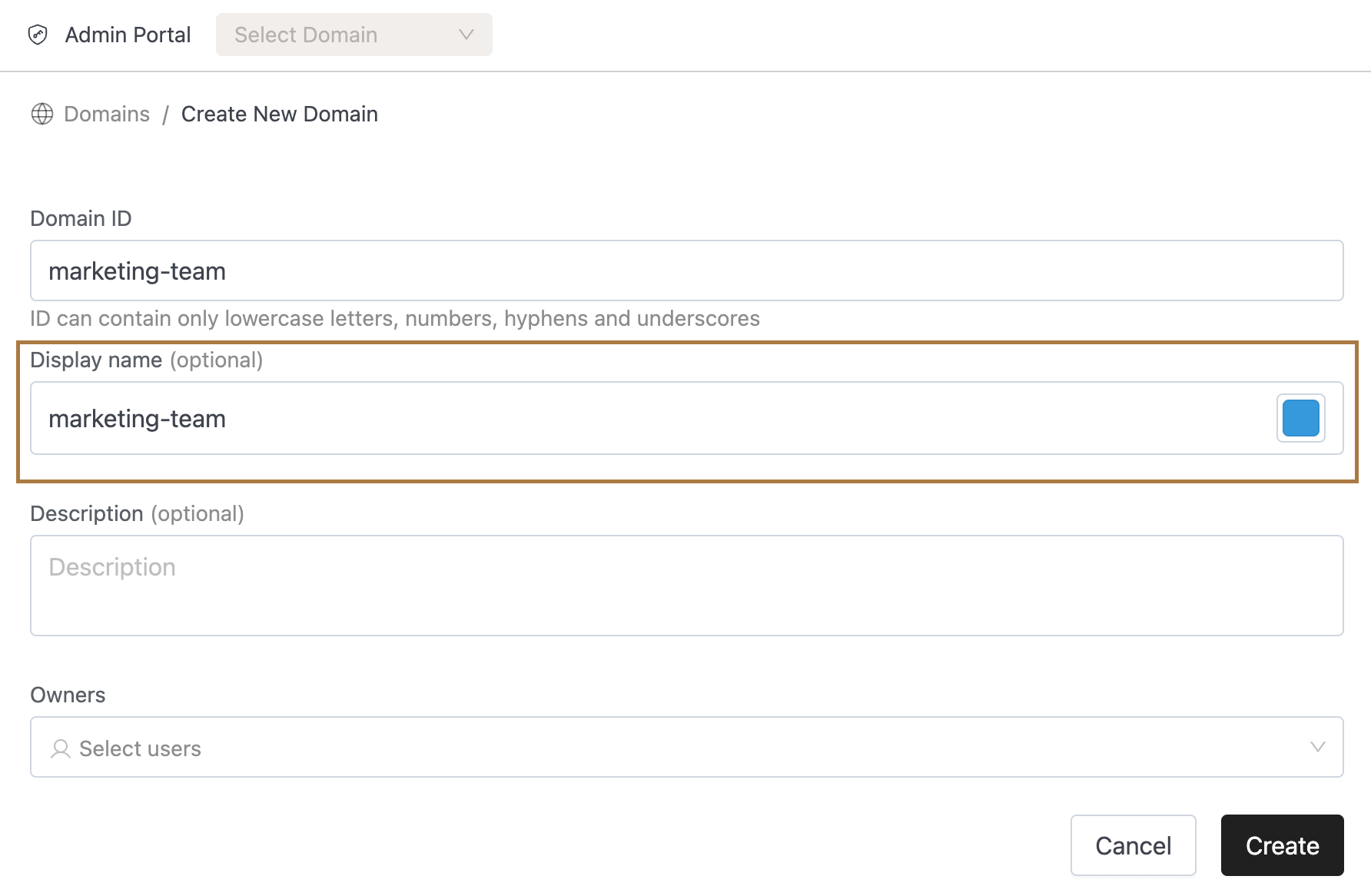
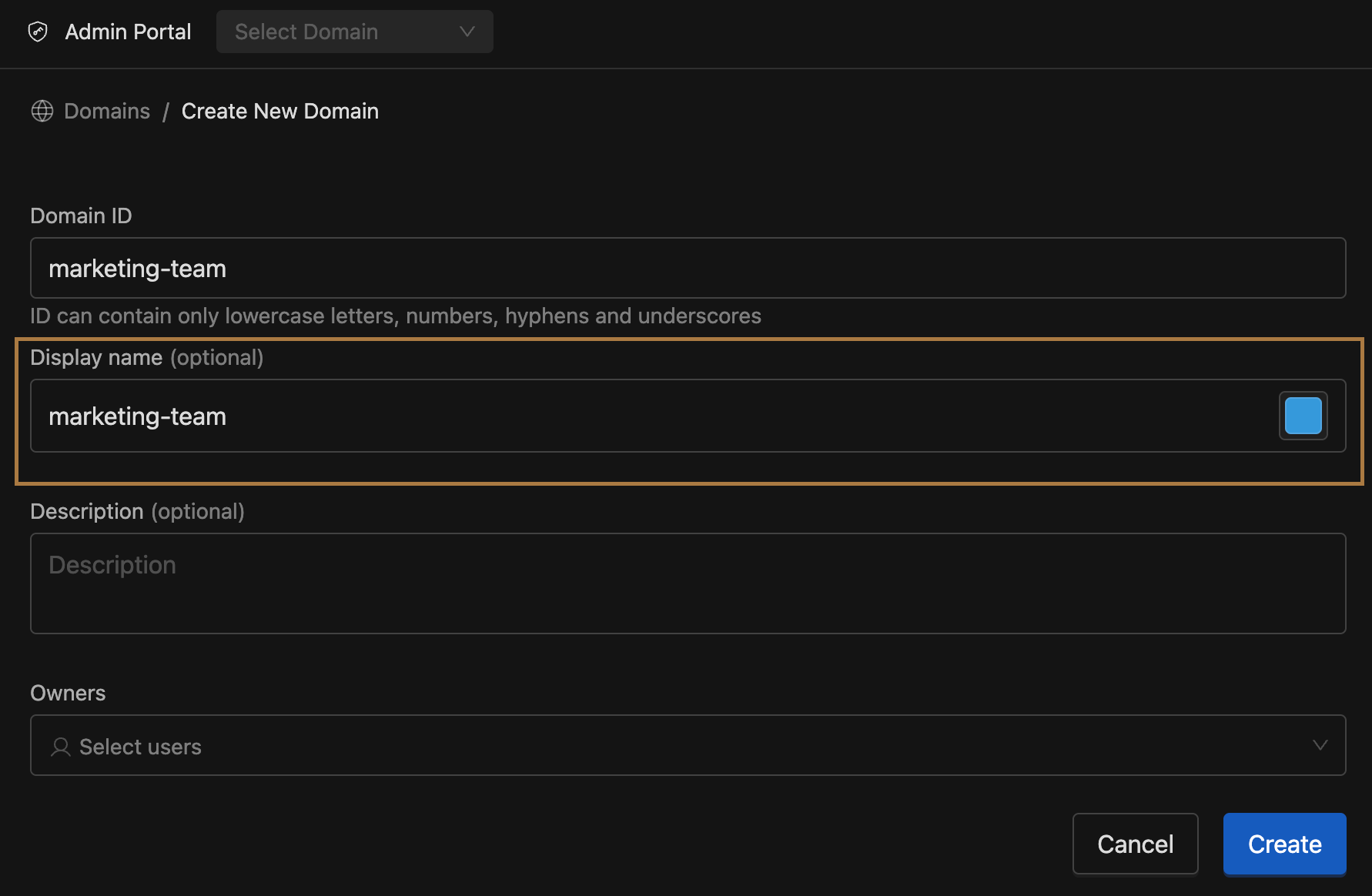
- Domain IDs now support hyphens (
-), aligning with conventions already used elsewhere in the platform. - Benefit: Makes domain creation easier and more consistent, reducing friction during setup.
- Users no longer need to provide a Display Name when creating a domain.
- Spark Applications
- We added the namespace column to the Spark Applications page inline with the Job Templates and Streaming Jobs pages
- Resource Quota Enforcement:
- Added threshold checks for Compute Clusters, Spark Jobs, and Jupyter Containers.
- Users can no longer create or update these resources if doing so would exceed:
- Namespace-level resource quotas
- Or quota limits defined for the priority class of the resource (if configured)
- Benefit: Prevents creation of resources that cannot actually run due to quota breaches, ensuring more predictable behavior.
- Job Orchestrator (New Spark Deployment Flow):
- Prevent Job Starvation:
- Introduced Weighted Round Robin (WRR) scheduling between high- and normal-priority jobs, configurable via
job-orchestrator.queue.high.scheduling-share-percentagesystem config. - With this configuration, instead of scheduling only high-priority jobs until the high-priority queue is empty, the system allocates 90% of slots to high-priority jobs and 10% to normal-priority jobs by default. This ensures normal-priority jobs still progress and prevents starvation, while high-priority jobs continue to receive preference.
- Config updates are applied automatically every minute, and admins can adjust the config at any time to match their requirements.
- Introduced Weighted Round Robin (WRR) scheduling between high- and normal-priority jobs, configurable via
- Queued Jobs Visibility:
- Queued jobs are now visible in the IOMETE console on both the Spark Applications listing page and within individual job runs page.
- Users can also abort queued jobs when needed, providing better control over job management.
- Prevent Job Starvation:
- JVM Memory Management: Optimized JVM memory management for the control plane service to maximise the utilisation of allocated memory.
- Spark Connect RestClient: Added liveness and readiness probes to the Spark Connect RestClient to ensure it is healthy and responsive.
- Spark Operator Submit Service: Implemented metrics endpoint for tracking job submission and JVM metrics.
- Spark Overhead Memory Customization: Spark overhead memory is now customizable within the pod memory limits.
🐛 Bug Fixes
- Global Spark Settings: Fixed an issue where settings marked as secret were incorrectly saved as masked values (
*******) instead of preserving the original value. - IOM-Catalog Service: Fixed an OOM issue in the catalog service that occurred during export of tags-related metadata.
- Cause: Entire tags metadata was being loaded into memory leading to crashes.
- Solution: Optimized export to filter metadata at the database level and process only what’s required, preventing excessive memory usage.
- Spark Operator Submit Service: Fixed a memory leak issue in the spark operator submit service that occurred when submitting large numbers of Spark jobs.
- Cause: The spark operator submit service was not properly cleaning up in memory error tracking logs after job submission.
- Solution: Implemented proper cleanup of error tracking logs in memory after job submission.
- SQL Editor Worksheets: Fix disappeared words in the worksheet that occurred when navigating to another worksheet and back.
- Cause: The S3 upload was causing truncation when UTF-8 characters required multiple bytes (e.g., accented characters, emojis).
- Solution: Fixed by calculating actual UTF-8 byte length instead of character count to ensure complete file uploads.
v3.11.2
🐛 Bug Fixes
- Fixed users not being able to turn off sending events to Spark History in their Spark jobs. We corrected that we always overwrote setting
spark.eventLog.enabledtotrue
v3.11.1
🚀 New Features
- Hybrid Log Retrieval with Kubernetes Hot Storage:
- We have added hot storage support, allowing recent logs to be served directly from Kubernetes whenever pod logs are available, and the system automatically falls back to external storage like Splunk, Loki, or Elasticsearch if pod logs are not found.
- This configuration is only valid when using external log sources (Splunk, Loki, or Elasticsearch). Kubernetes cannot be used as a log source together with hot storage.
- Helm configuration example for Splunk (
values.yaml):logging:
source: "splunk" # splunk | loki | elasticsearch
splunkSettings:
endpoint: "https://splunk.example.com"
token: "bearer-token" # bearer token created in Splunk Settings -> Tokens
indexName: "main"
hotStorage:
enabled: true
source: "kubernetes" # currently only kubernetes is supported - Notes:
- Ensure Kubernetes log retention is configured to cover the time ranges you care about; once pods are gone, logs will only be available in external storage.
- If
hotStorage.enabled: false, all requests use the external integration if configured.
🐛 Bug Fixes
- Fixed missing YAML document separator (
---) that caused bothspark-log-masking-regexesandpriority-class-mappingsConfigMaps to be invalid and not created during Helm upgrades. - Fixed an issue where the
useSparkConnectForDbExplorerfeature flag was not respected in the frontend, causing DB Explorer to use v2 APIs (using compute cluster for metadata retrieval) instead of the intended Spark Connect service.
v3.11.0
🚀 New Features
-
IOMETE Spark: Spark version spark-3.5.5 is a default version set.
-
PriorityClass Mappings: Implemented Priority Class Mappings, which enables to configure priority classes mappings in helm charts.
-
Log Management:
- Built Executor Logs feature enabling real-time viewing of compute and Spark job executor logs in the UI.
- Added support for downloading logs from external logging systems including Splunk, Loki, and EFK.
-
Tag Filtering on Spark/Streaming Job List: You can search and filter the Spark/Streaming job list by resource tags.
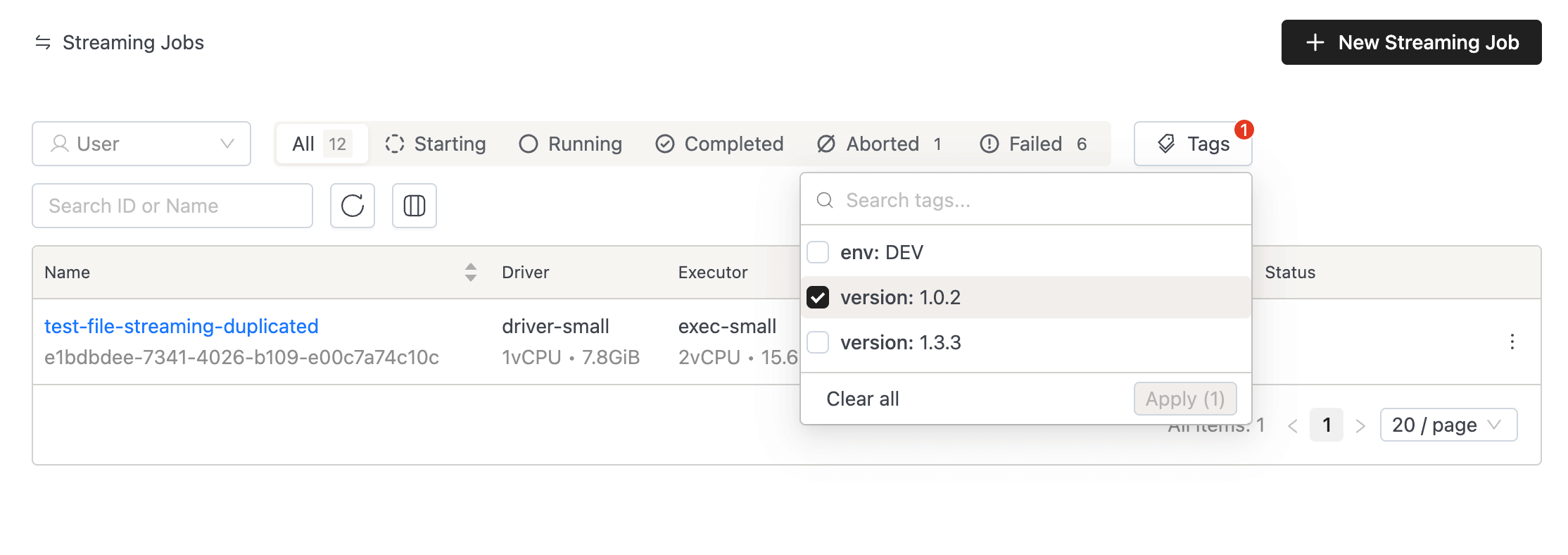
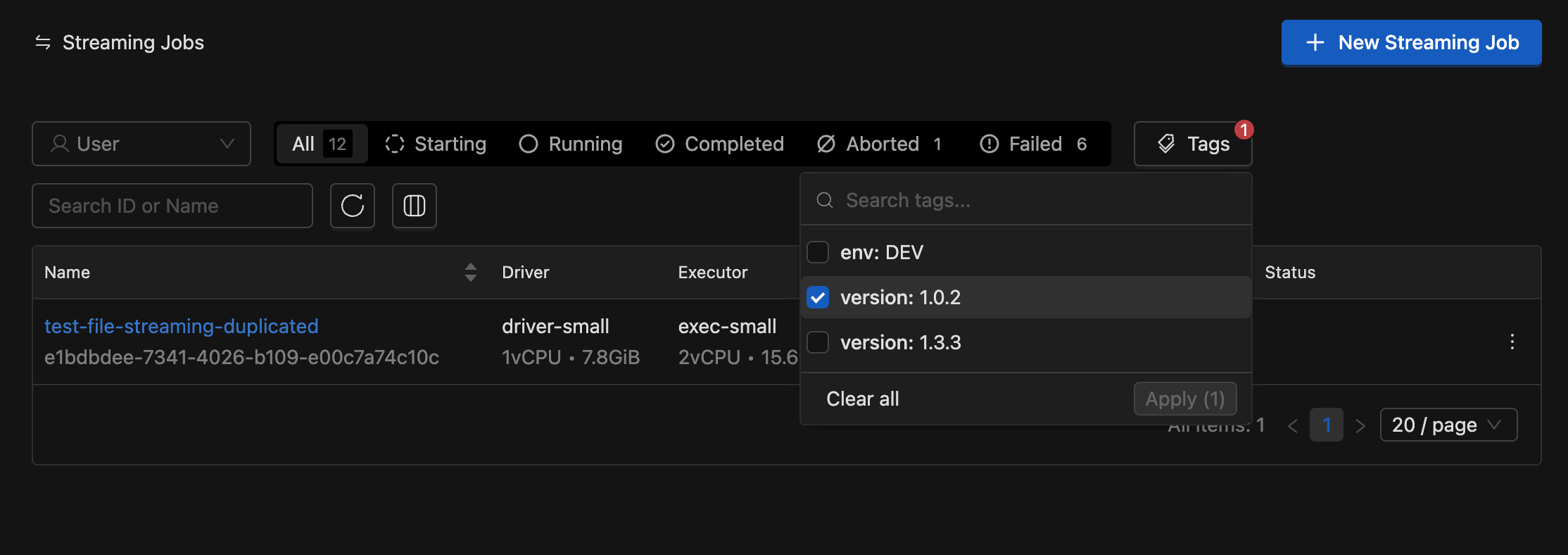
-
New SQL Chart Types: You can now visualize SQL query results with Pie Charts, Scatter Plots, Treemaps, and Composed Charts.
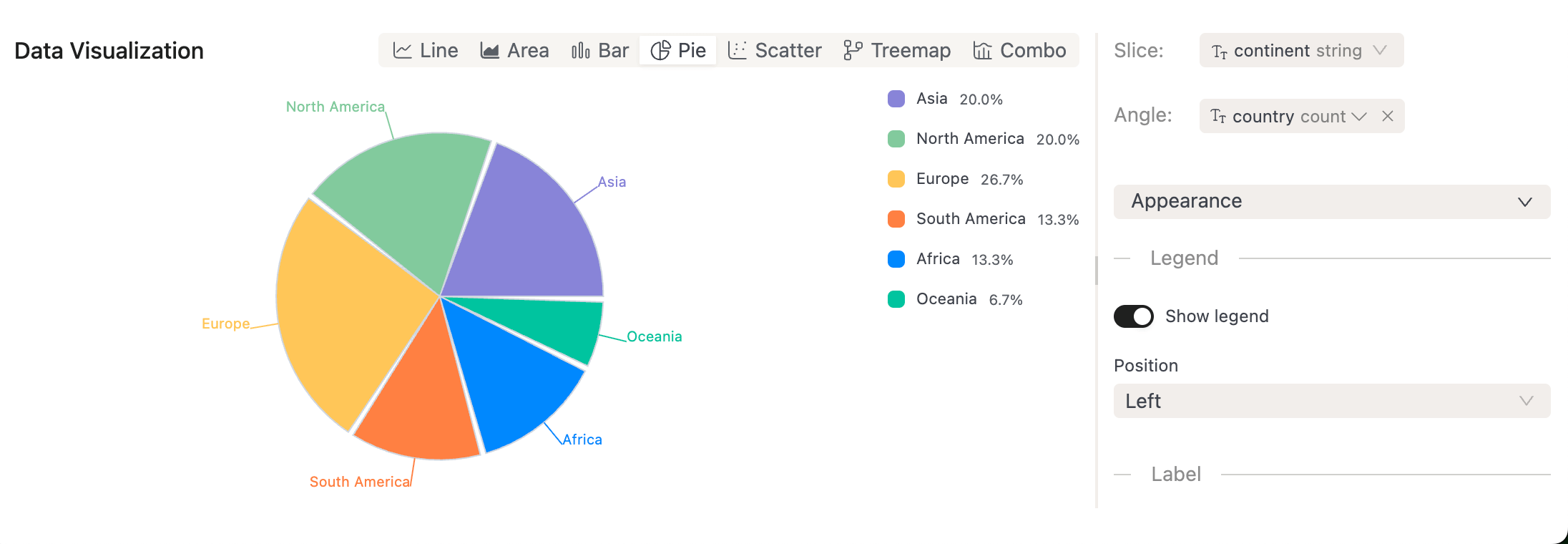
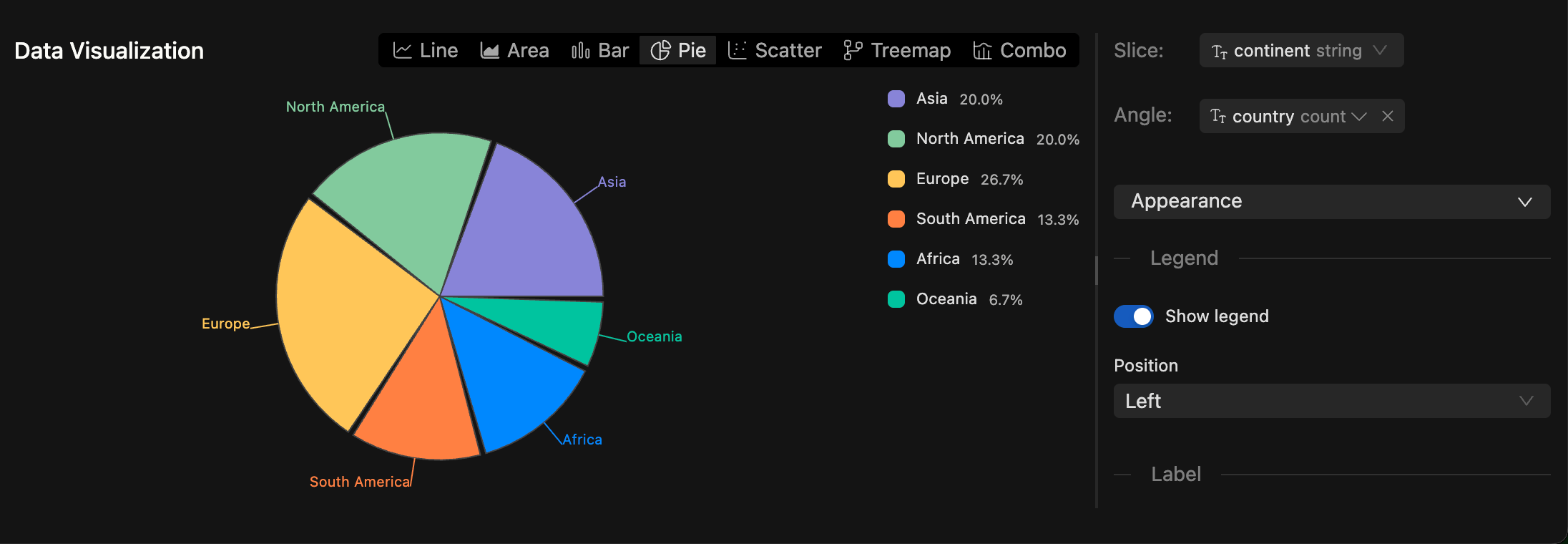
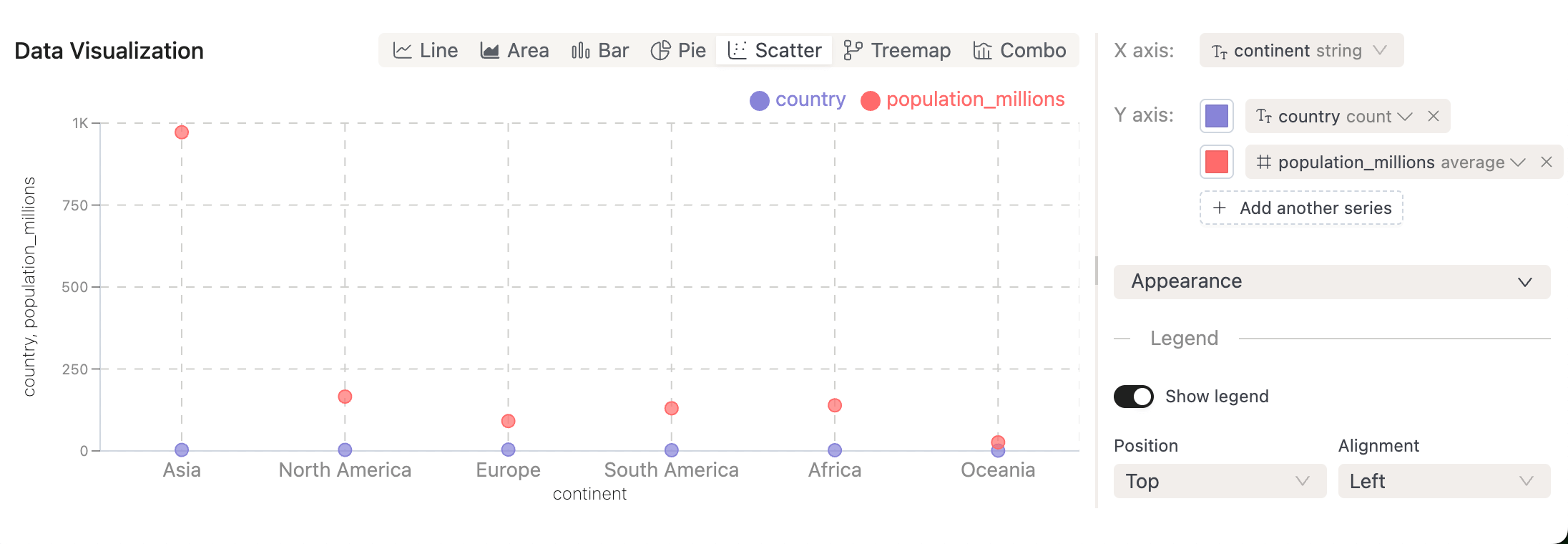
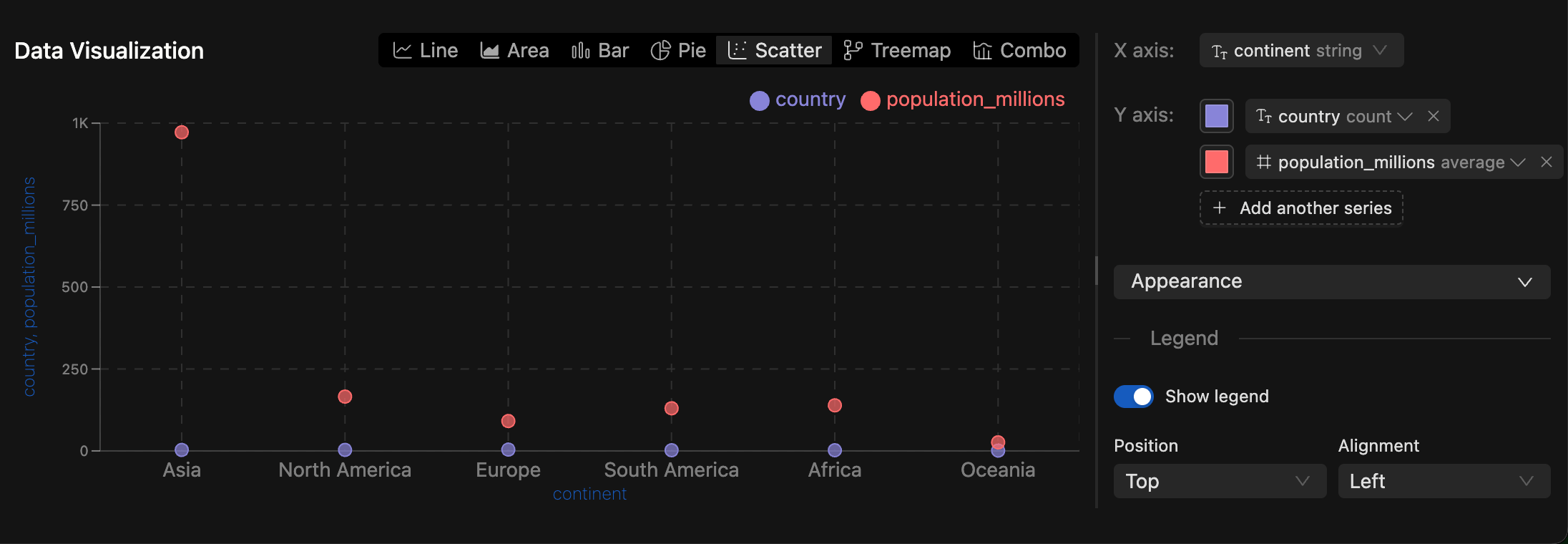
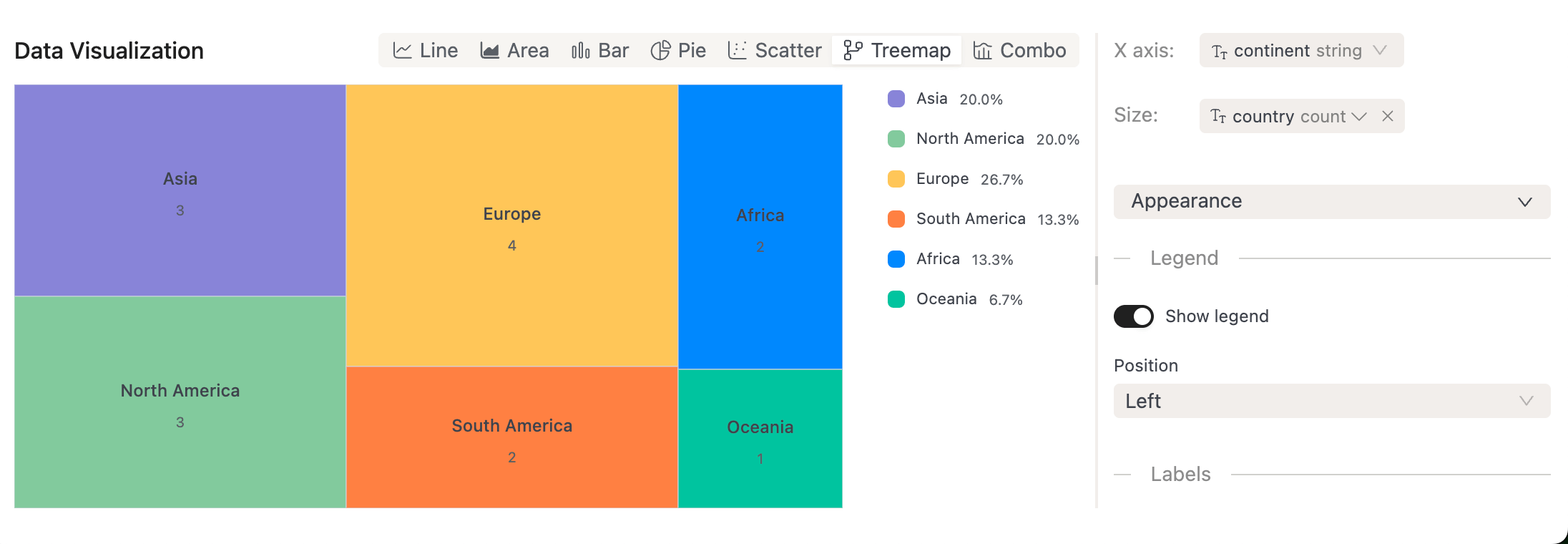
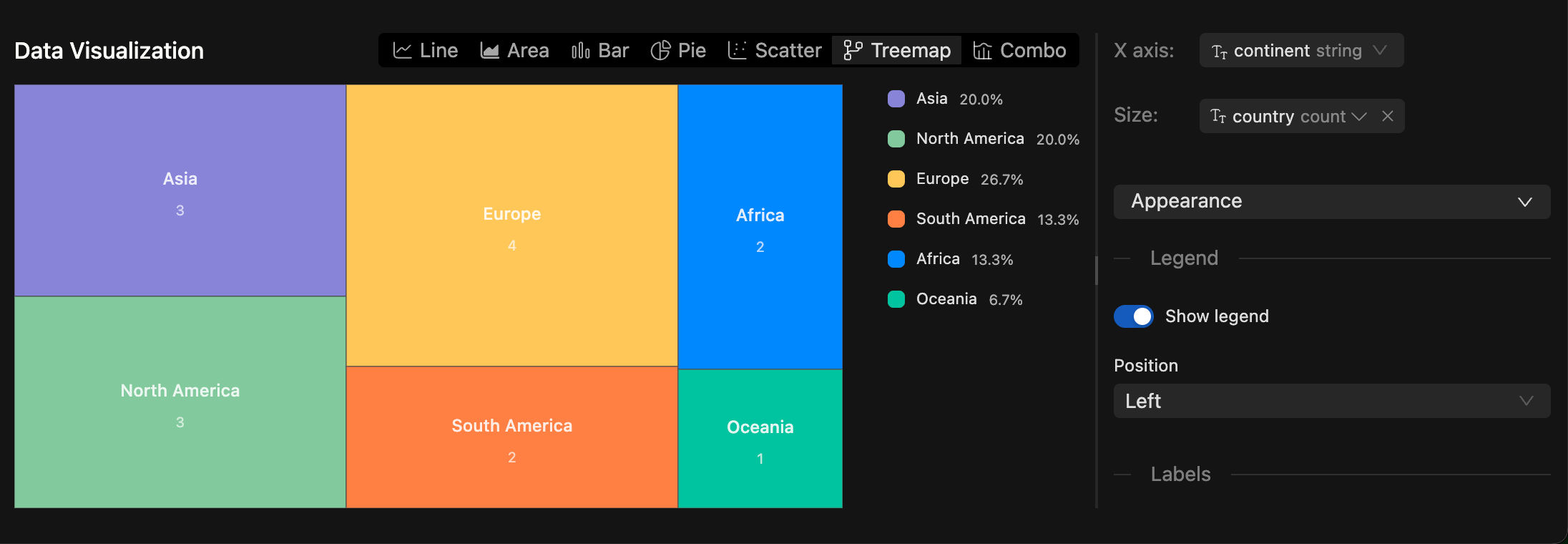
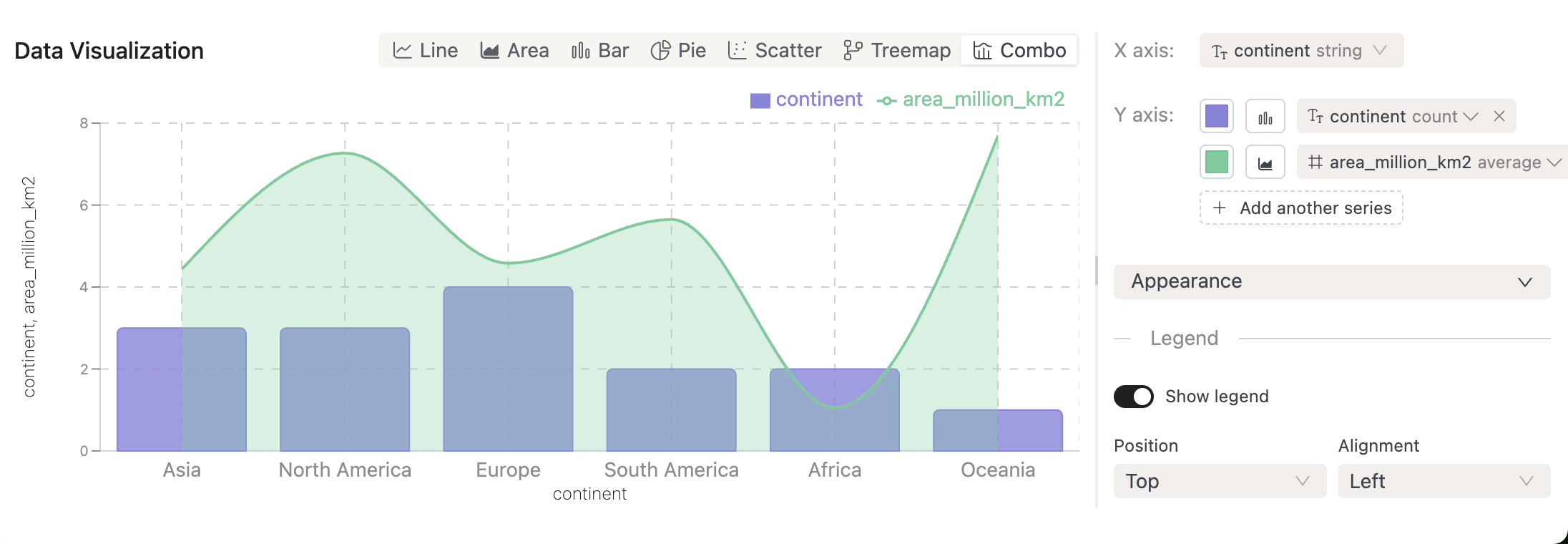
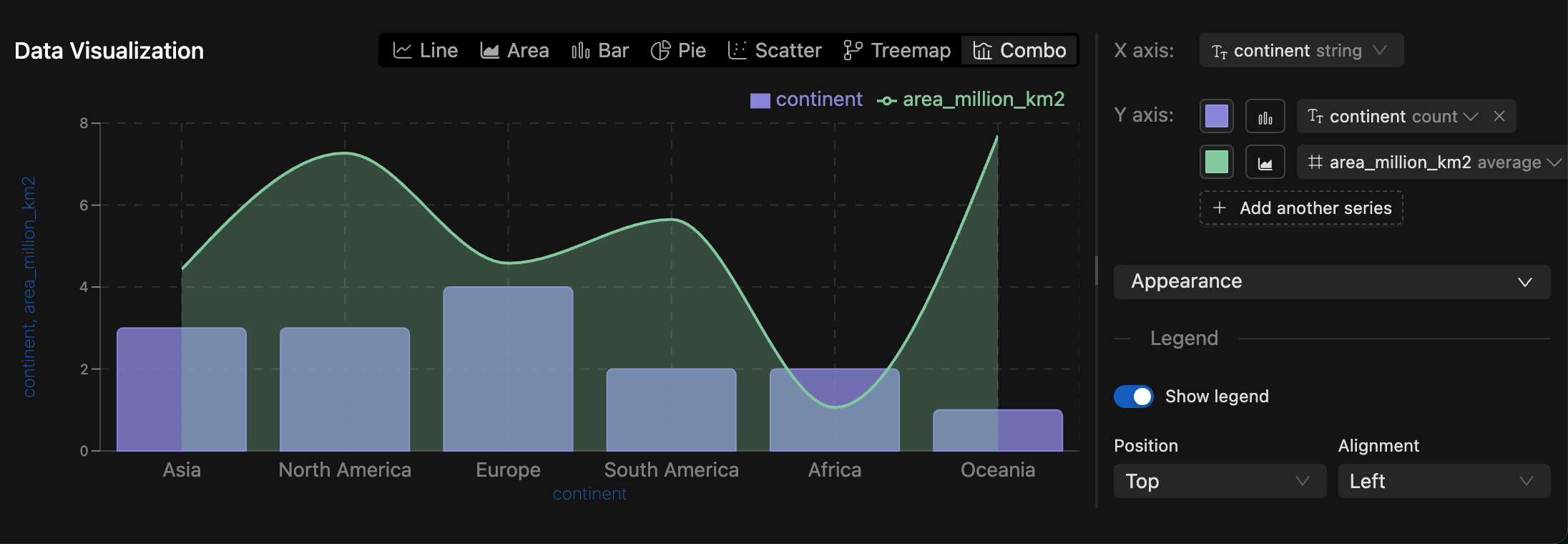
-
Parent-Child Relationship for Groups:
- On the Group Details page, users can now see both their directly assigned and parent groups.
- Added two tabs:
- Sub groups (Inheriting to)
- Parent groups (Inherited from)
- Same updates applied to Domain Group Members.
- Note: Currently, group relationships apply only to LDAP members.
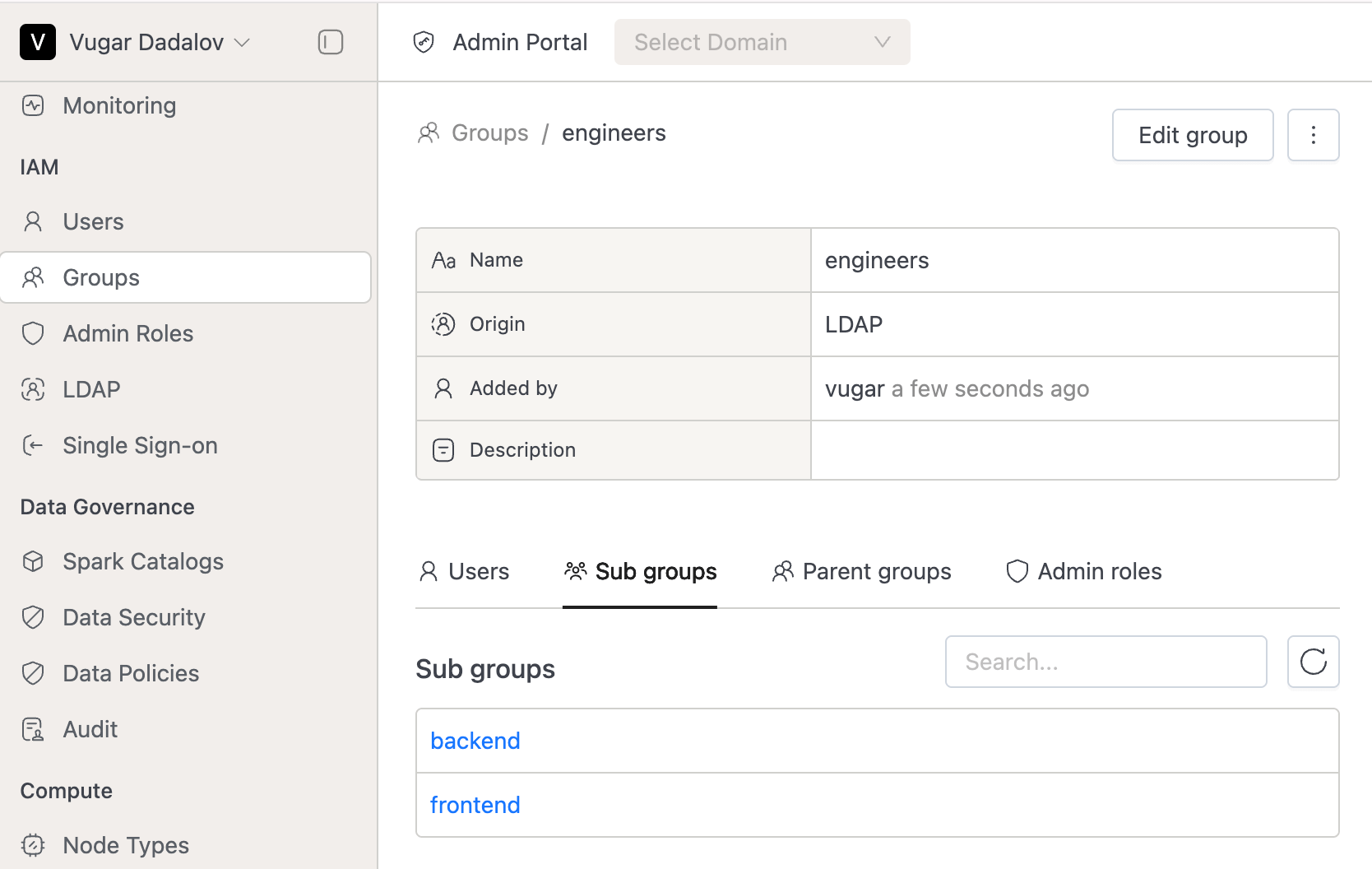
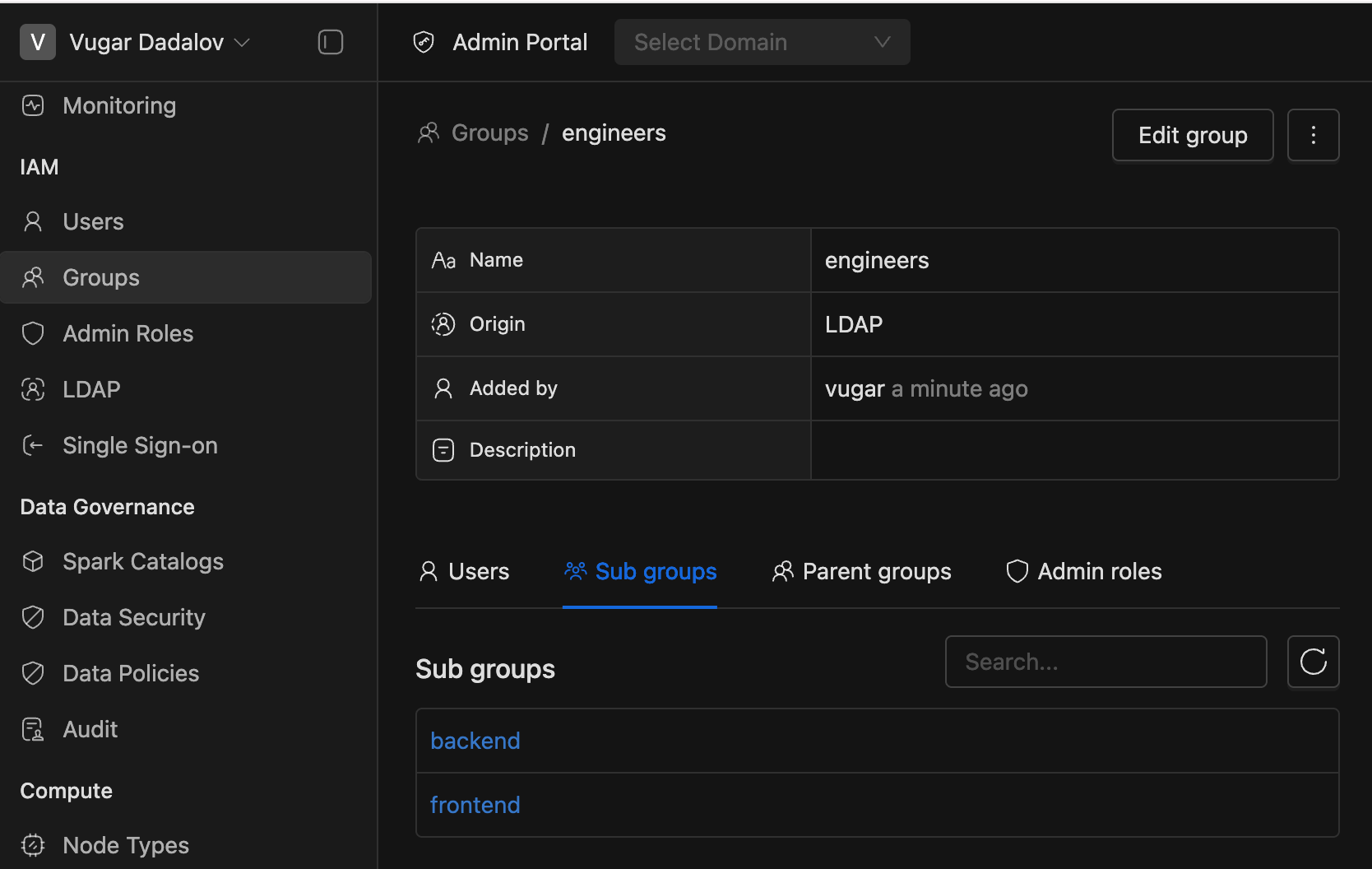
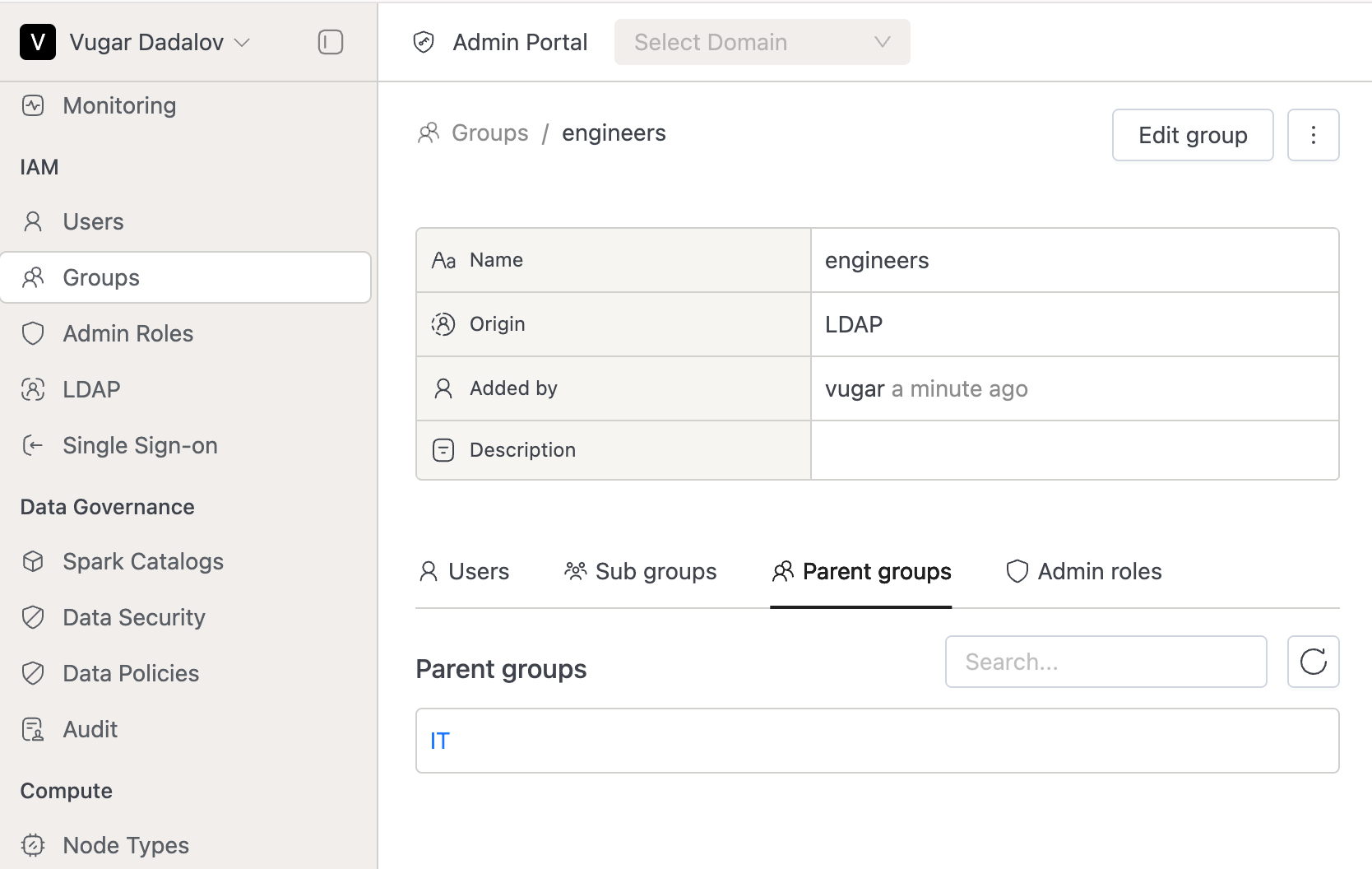
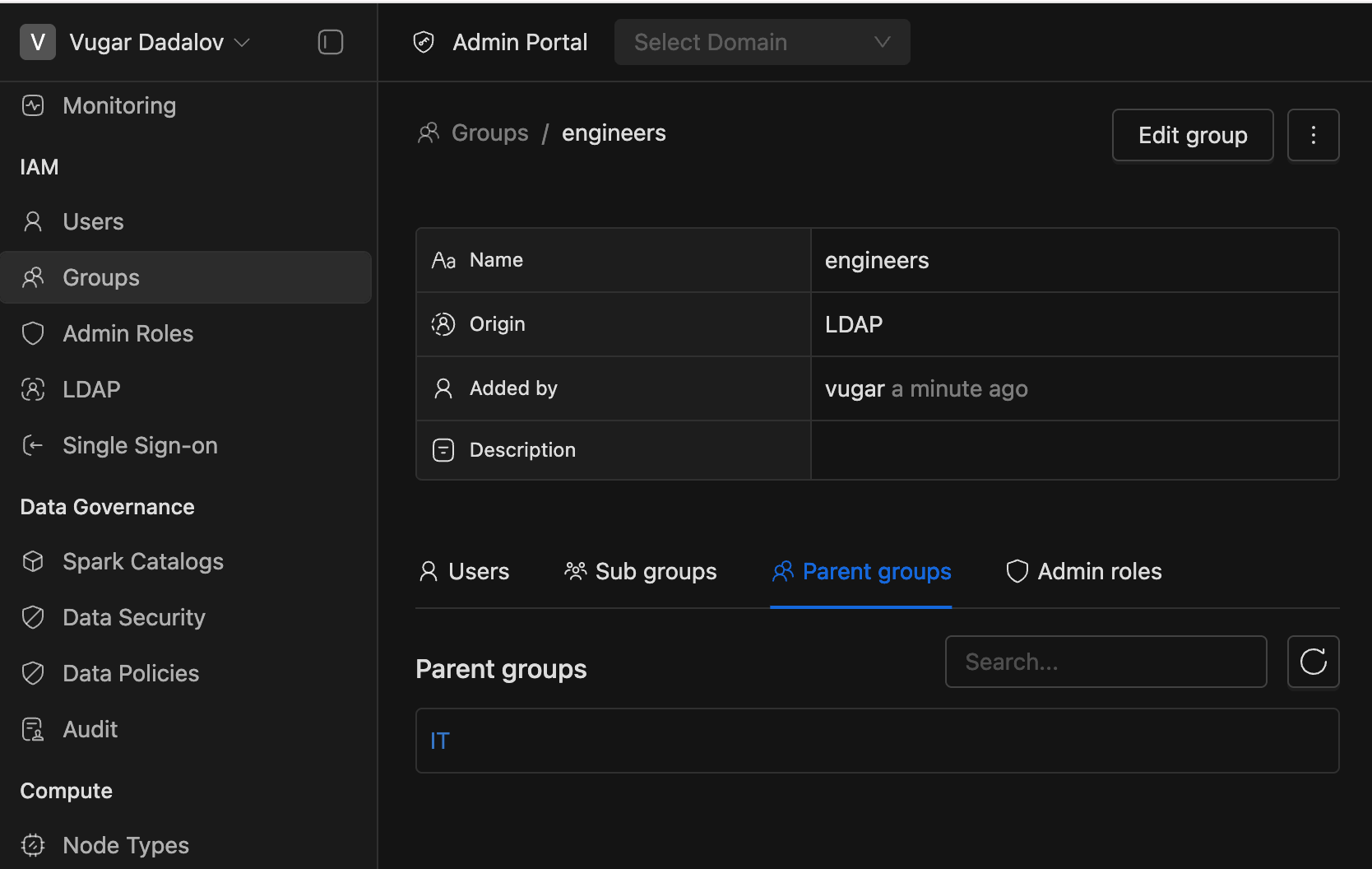
⚡ Improvements
- Job Orchestrator:
- Job Priority Restrictions:
- Only Domain Admins can upgrade jobs to HIGH priority.
- Regular users can manage NORMAL jobs, edit HIGH, and downgrade to NORMAL.
- Existing jobs and normal operations remain unaffected.
- Worker Deployment Changes: Workers moved to respective data planes, reduced resource usage, and added per-namespace configurations.
- Spark Job Quota Enhancements: Added PriorityClass quota support; system now applies the most restrictive limit across namespace and job-specific quotas for CPU, Memory, and Pods.
- Job Priority Restrictions:
- API Improvements: Implemented exposing the token management operations in the API / swagger.
🐛 Bug Fixes
- Fixed an issue where resources quotas in the homepage picked up the priority class quota instead of the namespace quota.
- Fixed an issue where the USE command on a catalog failed with access_denied when the user had access to only specific databases, by adding proper catalog-level USE privilege support.
v3.10.2
🐛 Bug Fixes
- Fixed an issue where the
spark.dynamicAllocation.enabledflag was always set to false. - Fixed an issue where the
spark.executor.instanceswas set to 1 even when dynamic allocation was disabled. - Fixed an issue where the user failed to query the view when they lack the permission to the underlying table, even if the user has a permission to the view.
- Disabled
delete tablebutton in database explorer within SQL Editor sidebar.
v3.9.3
🐛 Bug Fixes
- Patched
antiAffinityrules, customers can now configure soft affinity rules for Spark driver pods to help distribute them across nodes and reduce the probability of most drivers ending up on the same node. This can be enabled by setting the flagiometeSparkDriverAntiAffinity.enabledto true in values.yaml during installation. - The iom-core pod now dynamically reloads any
docker.tagAliasesdefined invalues.yaml, removing the need to restart the pod.
v3.10.1
🐛 Bug Fixes
- Fixed an issue where column descriptions and tags were being unintentionally overridden by the catalog-sync job.
- Descriptions will now be preserved if already present.
- Tags from the sync job will be merged with existing tags instead of replacing them.
- Added validations of tags and label names based on the rules mentioned here.
- It has been implemented in API level, so that integrated tools to be validated as well.
- It has been implemented in UI level as well, so the users to be informed about valid syntax formats.
v3.10.0
🚀 New Features
-
Job Orchestrator [Beta]: This is the beta release of our broader initiative to bring orchestration to IOMETE. To enable it, set the flag
jobOrchestrator.enabledinvalues.yaml.- Priority-based Scheduling: Users can now prioritize the scheduling of business-critical jobs over regular-priority jobs.
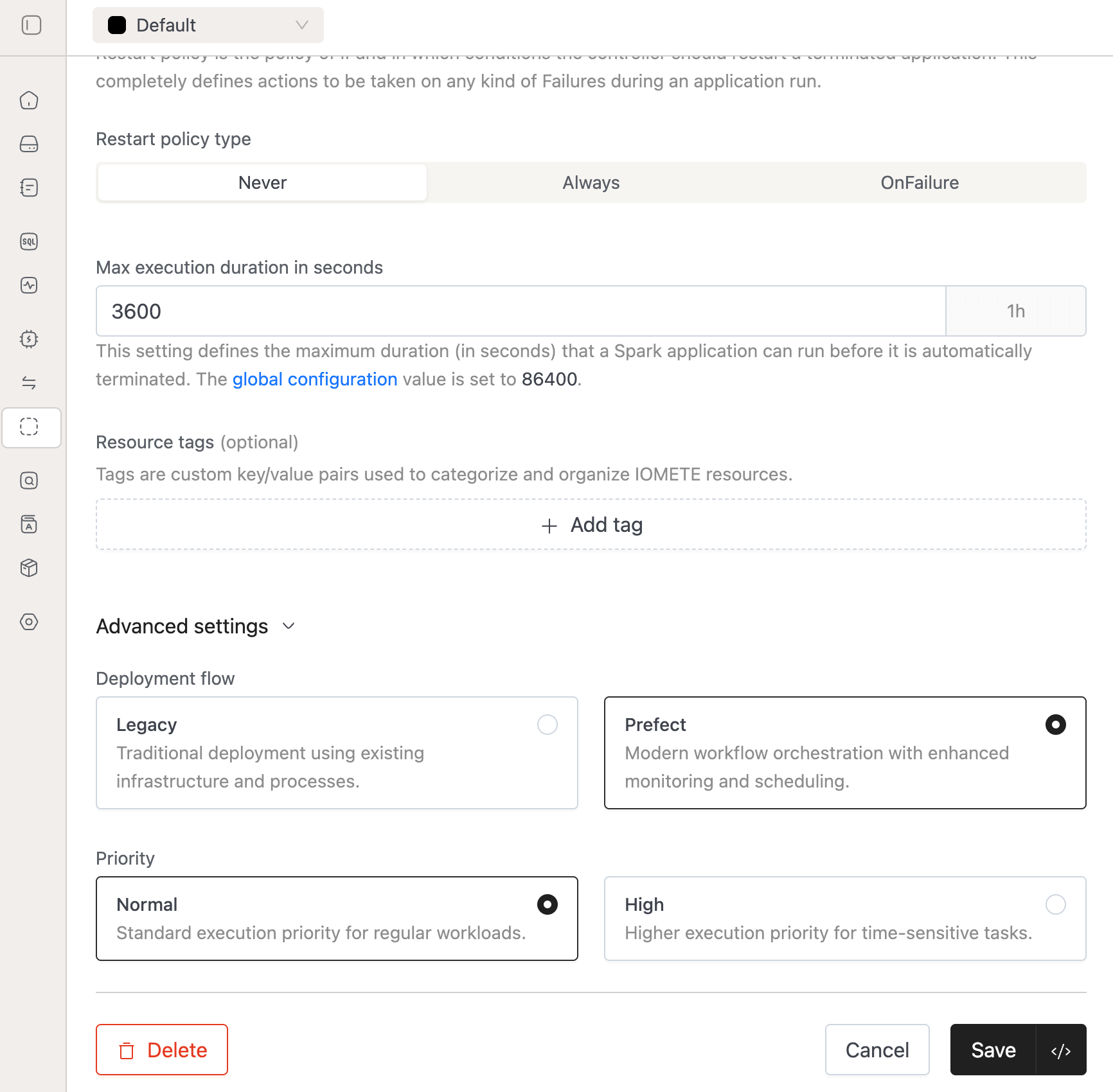
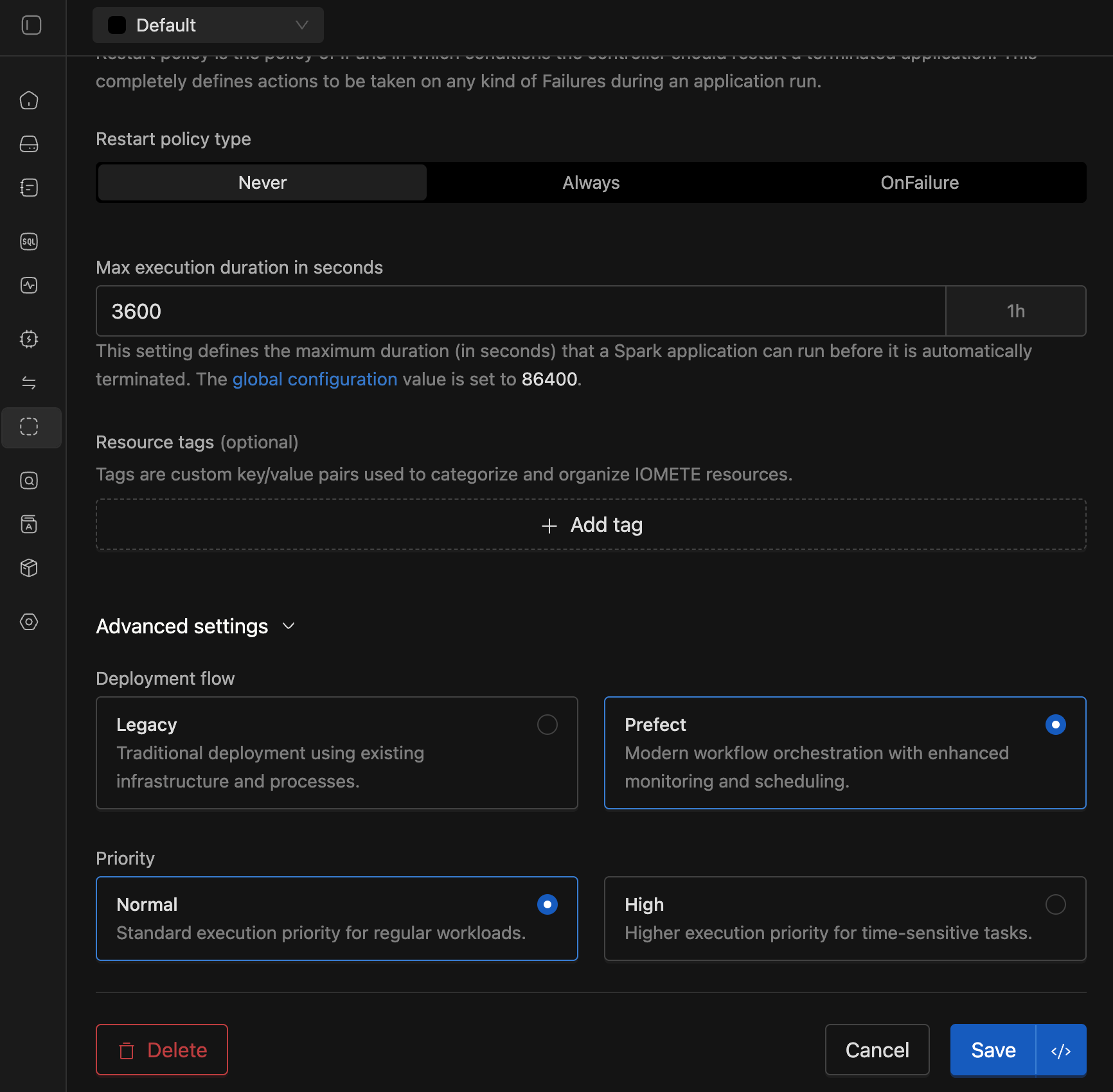
- Resource-aware Execution: Jobs are only submitted when there is sufficient cluster capacity, helping prevent failed or stuck jobs.
- Built-in observability: We've added rich metrics to monitor queue state, job wait times, and scheduling patterns in real time.
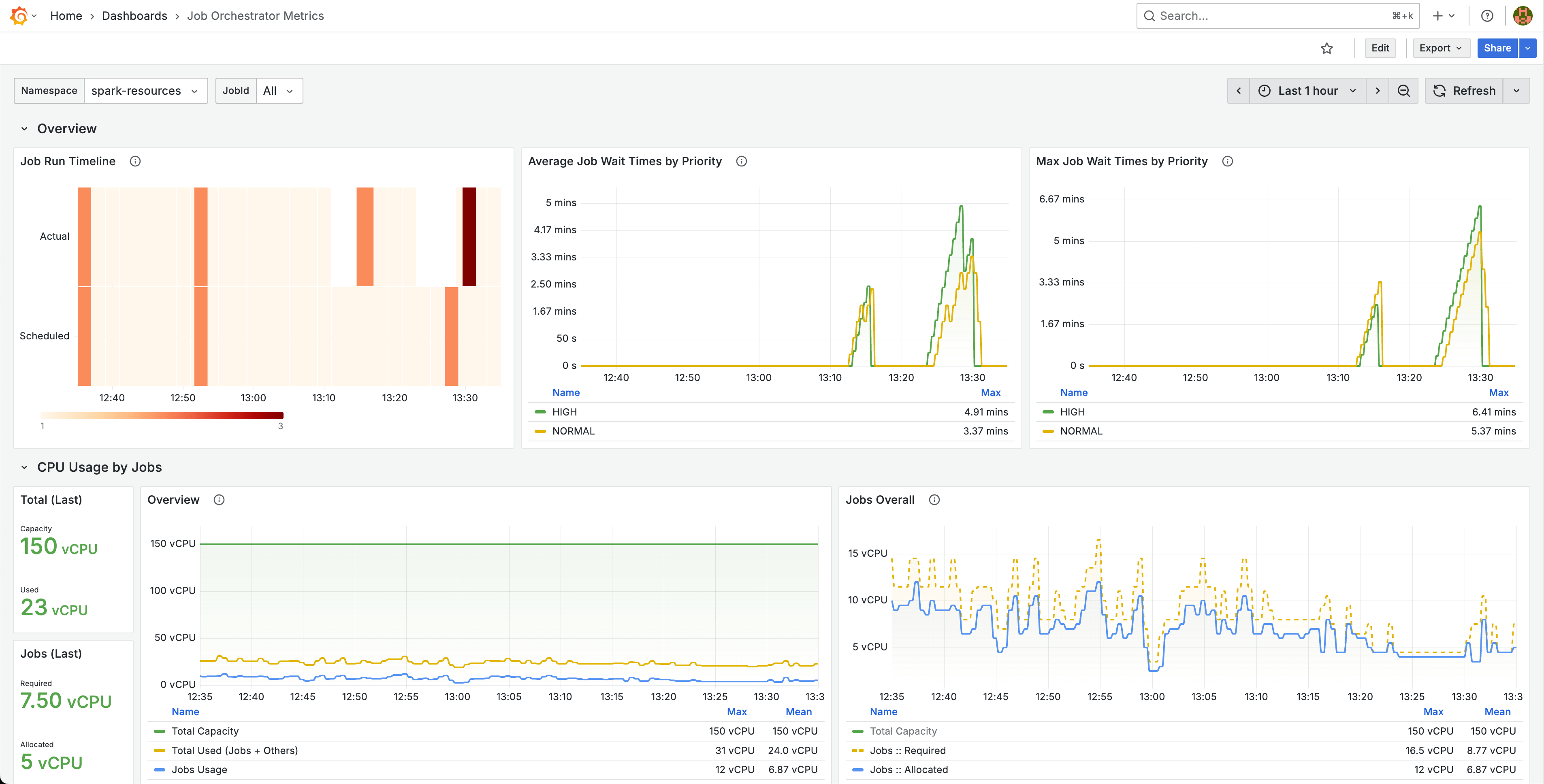
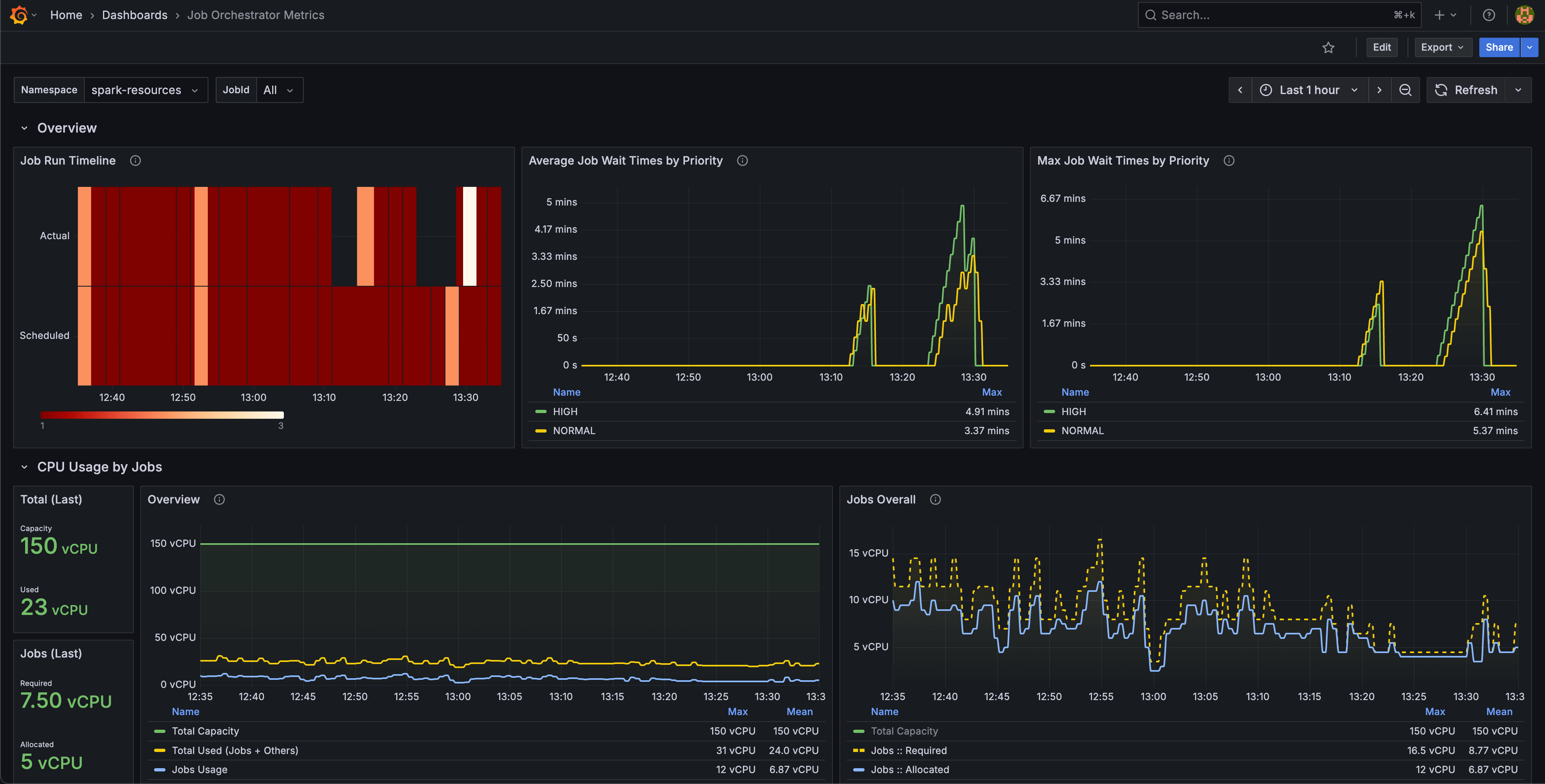
For an in-depth overview, check out the official press release.
- Priority-based Scheduling: Users can now prioritize the scheduling of business-critical jobs over regular-priority jobs.
-
Jupyter Containers [Beta]: Jupyter Containers is a powerful new feature that brings familiar Jupyter development environments directly into your IOMETE Platform. This enhancement enables data engineers and analysts to spin up dedicated, pre-configured Jupyter environments with just a few clicks. Key highlights:
- Create isolated Jupyter containers with customizable resource allocation.
- Each container comes with JupyterLab pre-installed and ready to use. Click "Open JupyterLab" to directly access Jupyter environment from IOMETE UI.
- Pre-installed Spark libraries for immediate access to distributed computing.
- Direct connectivity to IOMETE Compute clusters via Spark Connect.
- Essential developer tools pre-installed: git, aws cli, sparksql-magic, pandas, other libraries and extensions.
- Authentication: Use your IOMETE username as the default token. Optionally, setup a password to protect sensitive files within container.
Platform admins can enable it during installation by setting
jupyterContainers.enabledinvalues.yaml. For more details please refer to Jupyter Container's user guide: Jupyter Containers - Developer Guide. -
LDAP Group Inheritance: Group hierarchies synced from LDAP are now taken into account when evaluating Data Security policies. Groups inherit data policies from parent groups in the same way users inherit them.
- For example, in the diagram below, any data policies applied to the "Data Science Team" will also apply to the "ML Engineers" and "Data Analysts" groups — in addition to any policies directly assigned to those child groups.
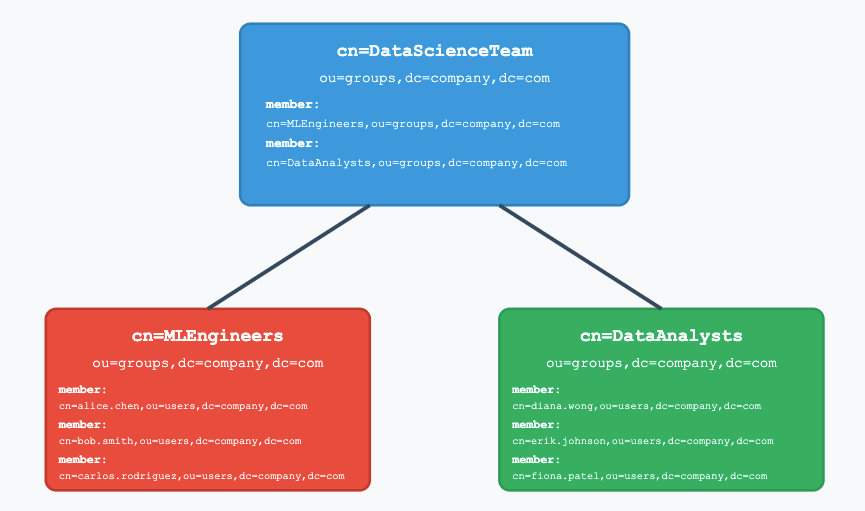
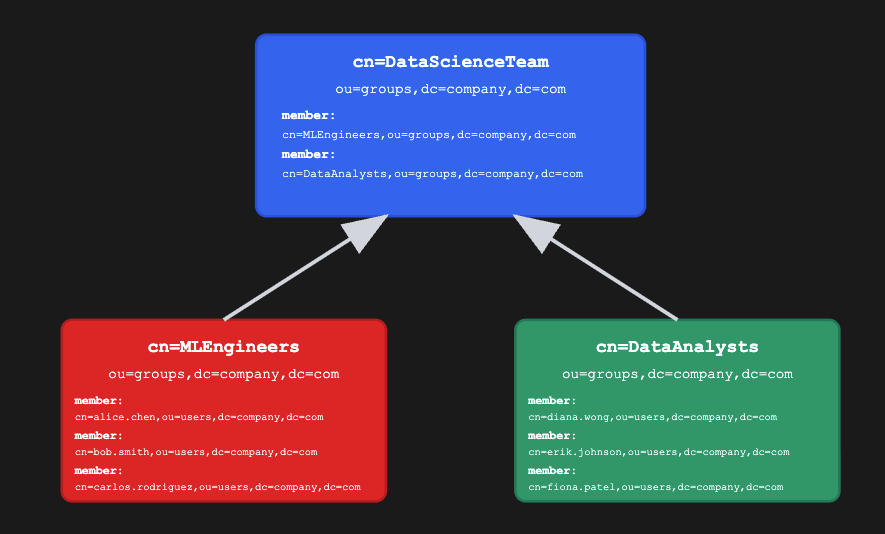
- This behavior is enabled by default in IOMETE. It can be disabled by setting the feature flag
ldapGroupInheritance.enabledtofalseinvalues.yamlduring Helm installation.
- For example, in the diagram below, any data policies applied to the "Data Science Team" will also apply to the "ML Engineers" and "Data Analysts" groups — in addition to any policies directly assigned to those child groups.
-
Activity Monitoring: We are releasing the beta of our own Spark Query Plan viewer. You no longer need to access the UI to view query plans! Enable this feature via
activityMonitoringQueryPlans.enabledinvalues.yamlduring installation.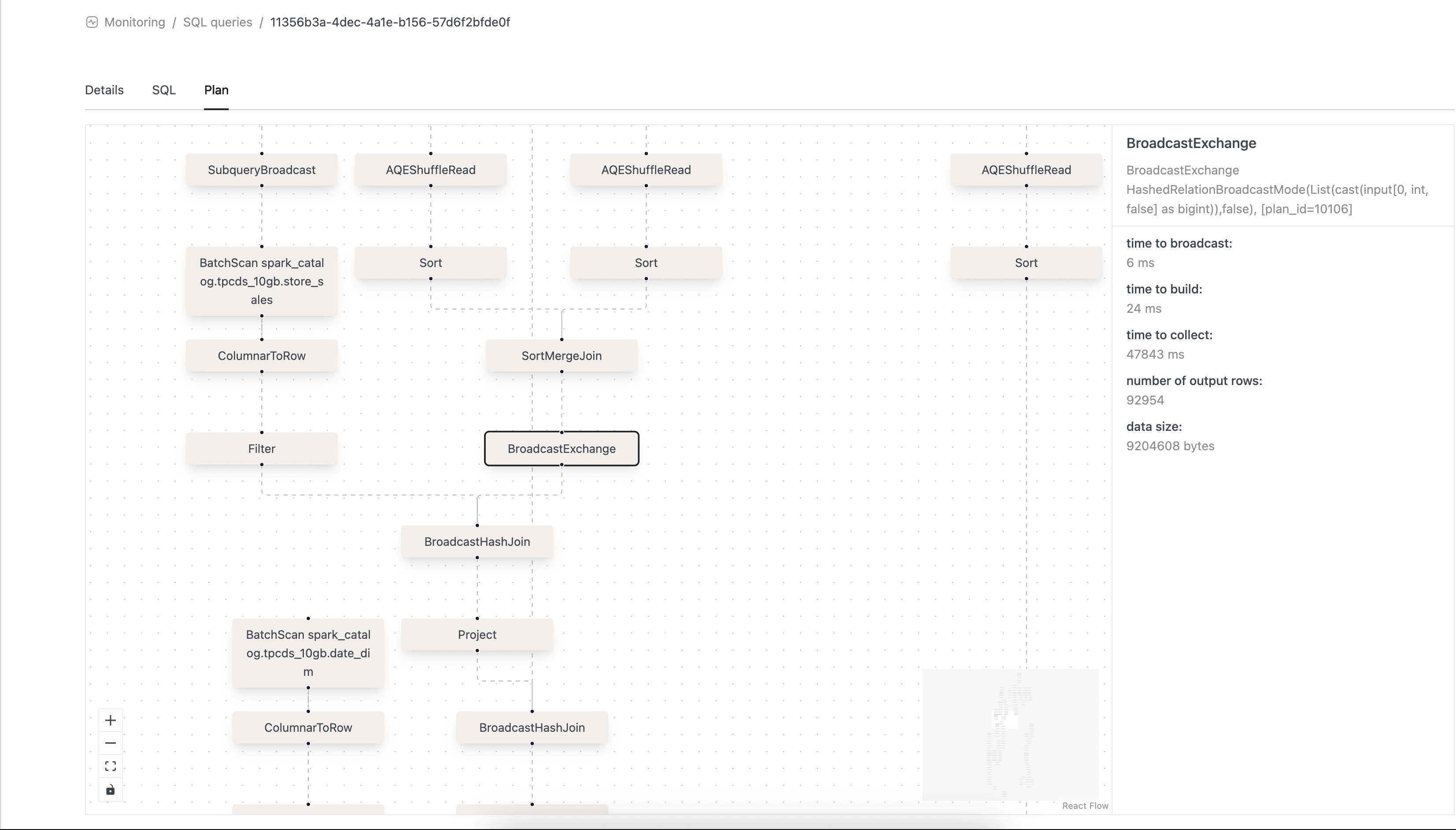
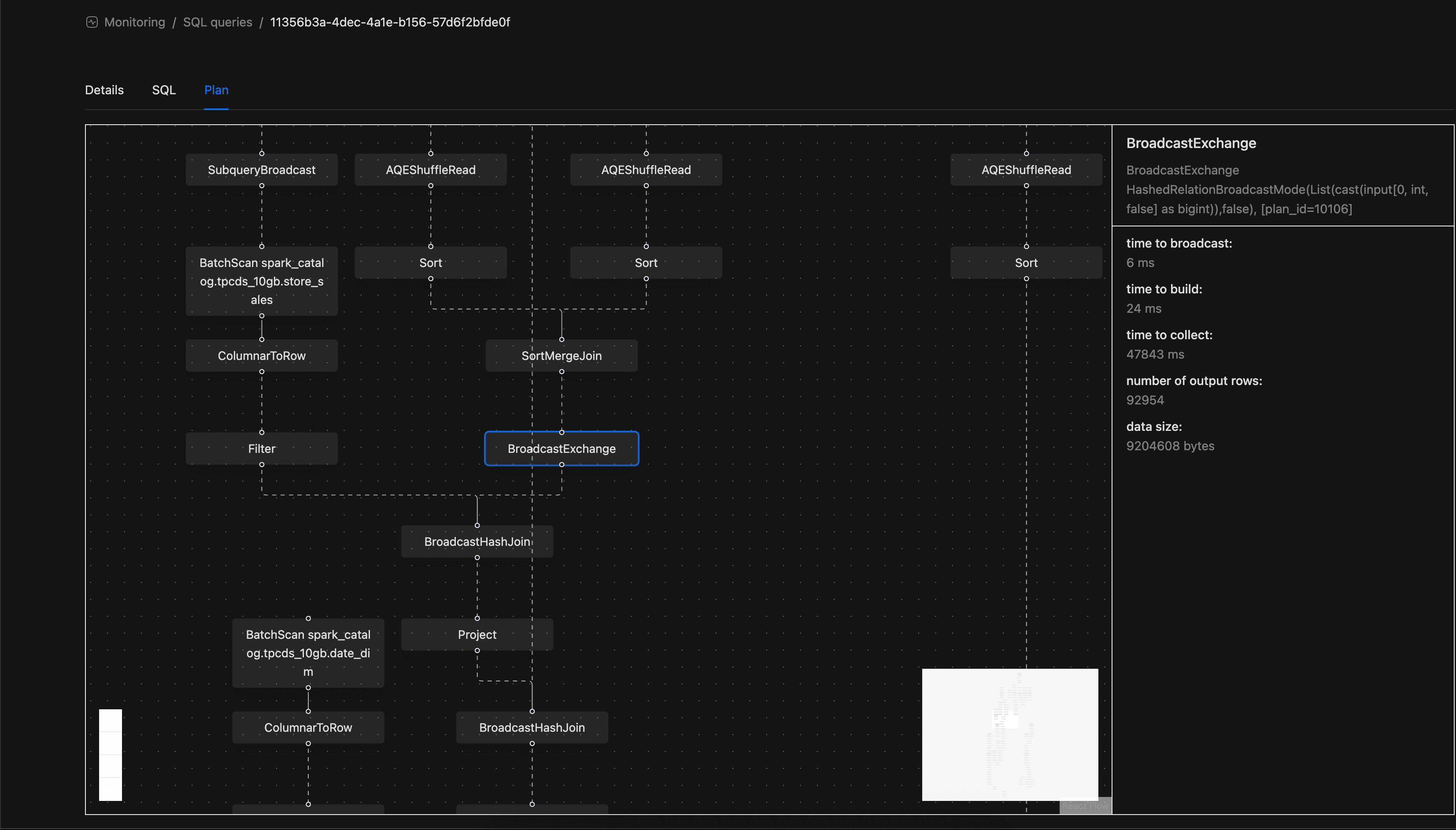
- Improved visualization of shuffle metrics on the Query Monitoring Details page.
- Domain owners can now view and cancel all queries within their domain, while regular users can only see and cancel their own queries.
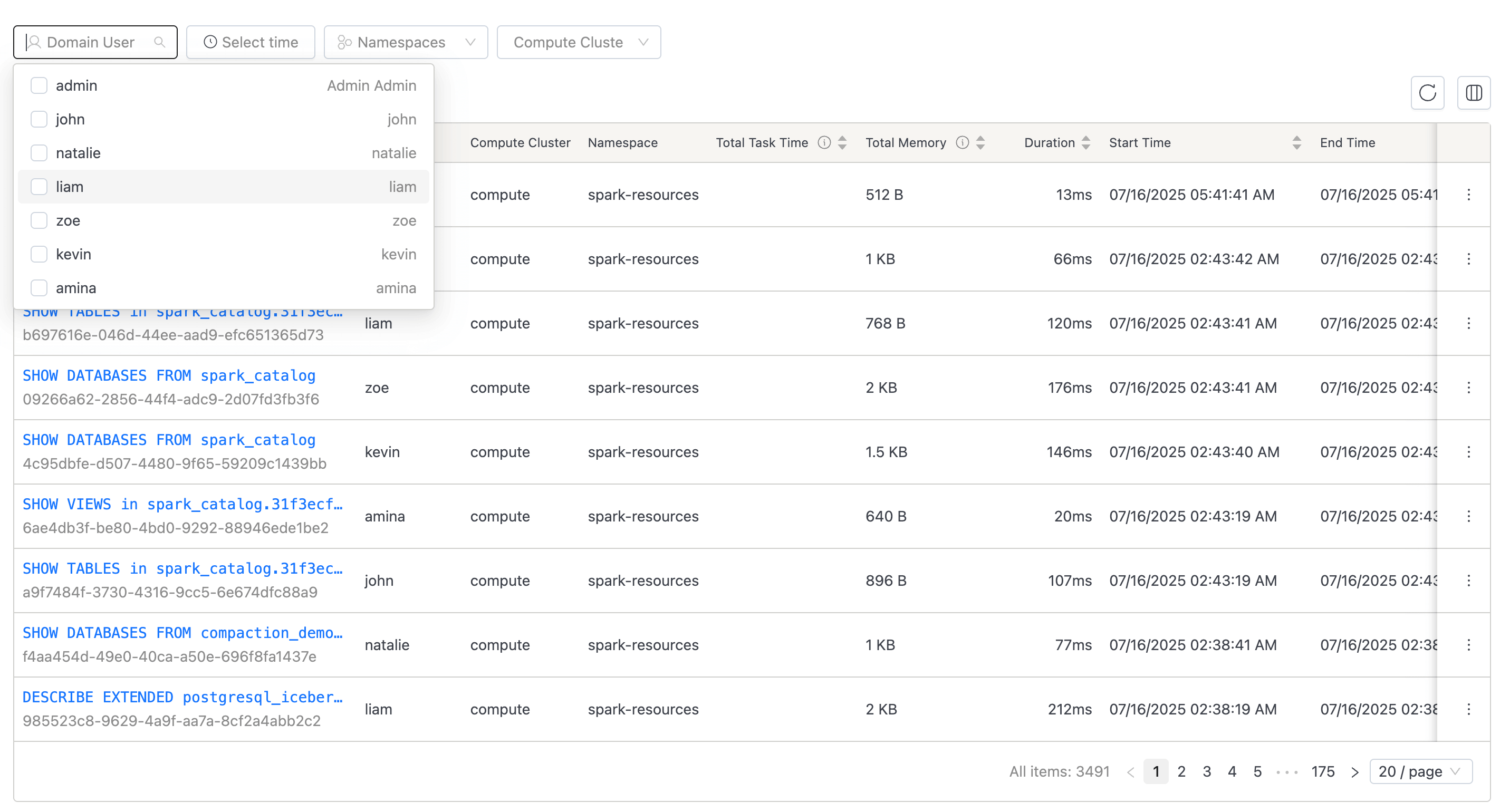
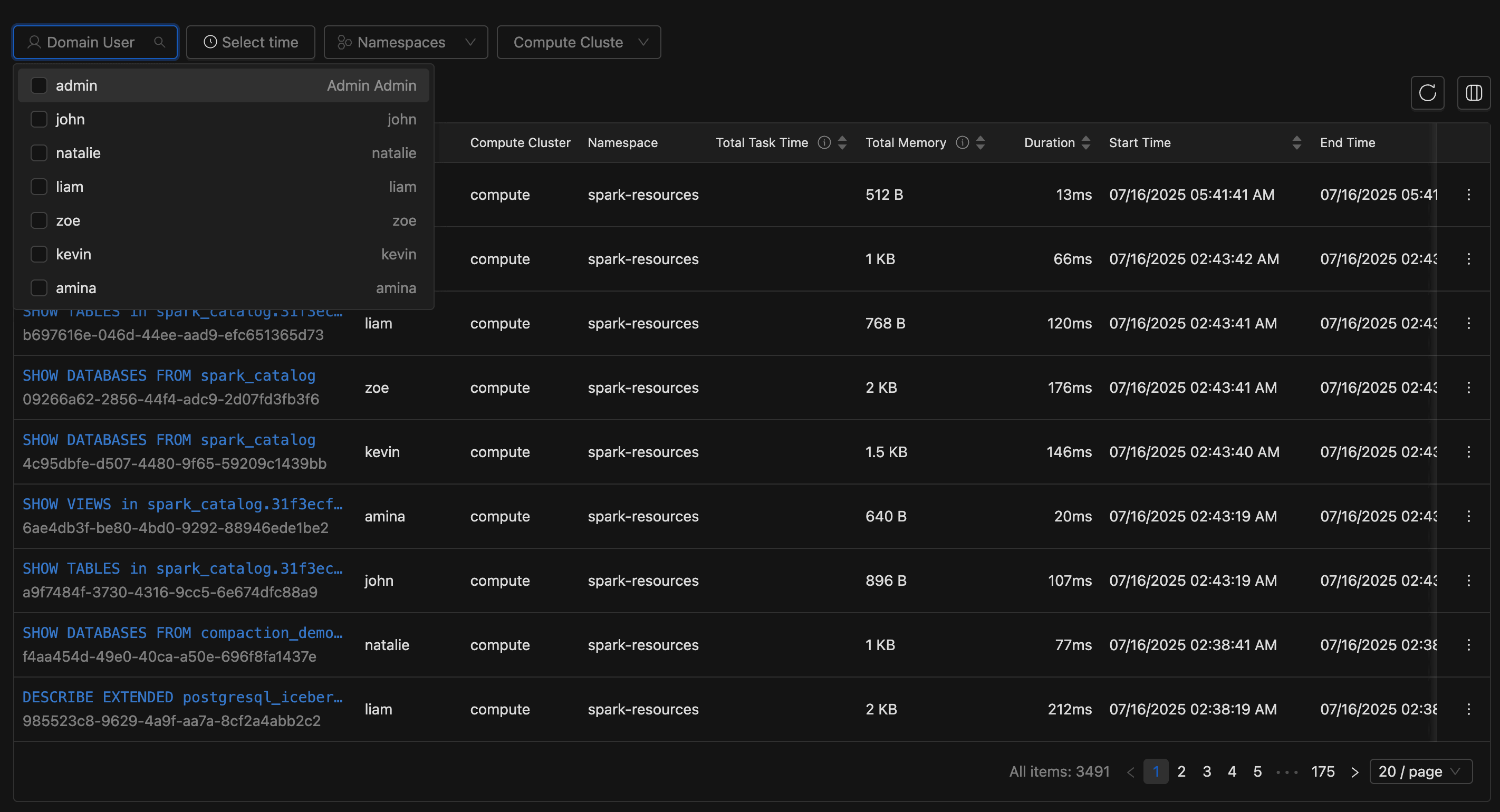
⚡ Improvements
- IOMETE Spark: Customers can now configure soft affinity rules for Spark driver pods to help distribute them across nodes and reduce the probability of most drivers ending up on the same node. This can be enabled by setting the flag
iometeSparkDriverAntiAffinity.enabledtotrueinvalues.yamlduring installation. - Moved hardcoded
iom-openapipod resource settings intovalues.yamlin the Helm chart for easier customization. - The number of applications shown on the Spark History summary page is now configurable. Set this in
values.yamlunderservices.sparkHistory.settings.maxApplications.
See the Spark propertyspark.history.ui.maxApplicationsfor more information. - Added a new option in the SQL Editor's Database Explorer to delete tables directly from the Iceberg REST Catalog. This is useful when a table is corrupted and Spark cannot delete it. The user must have
DROP TABLEprivileges to perform this operation.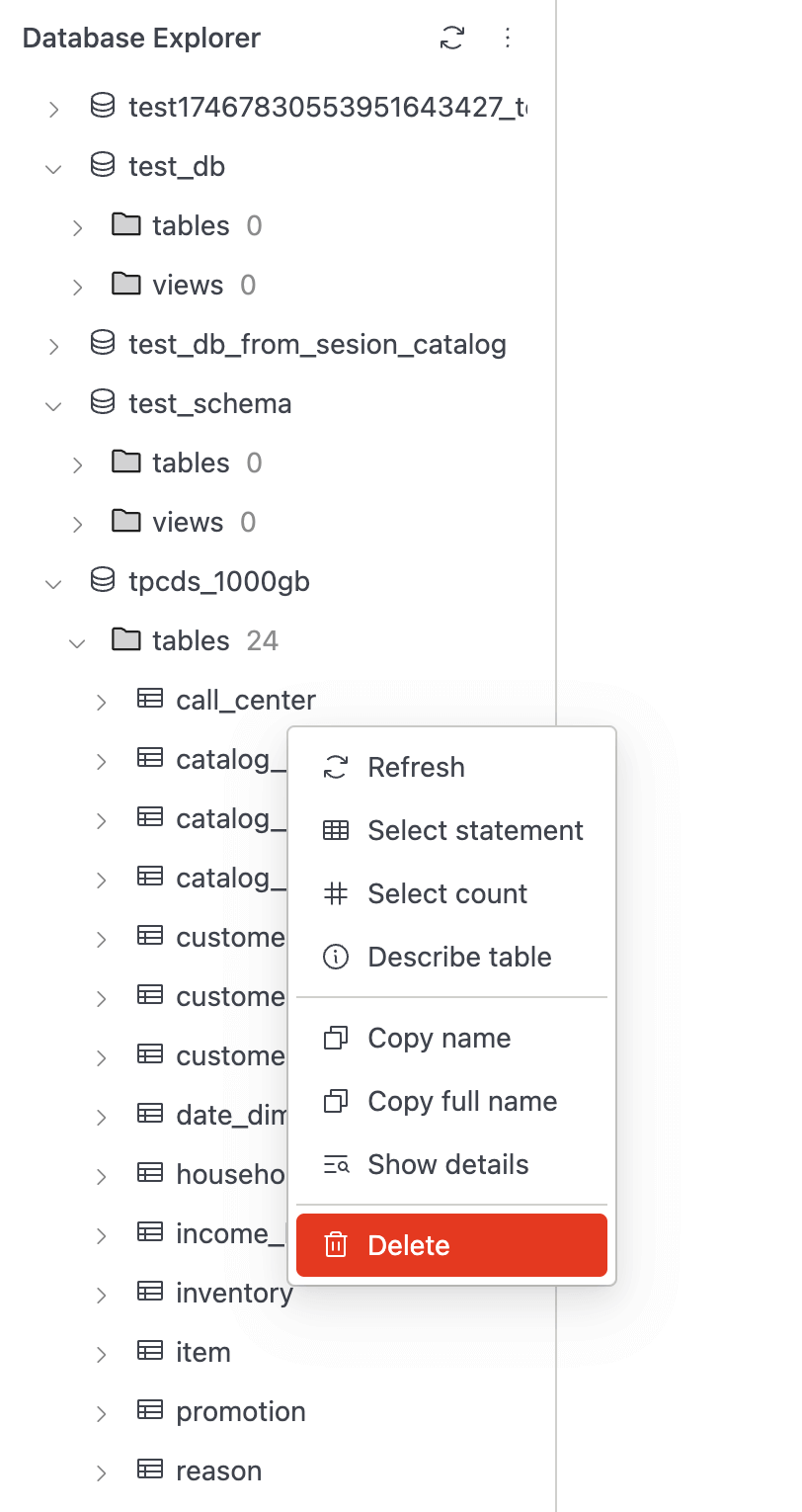
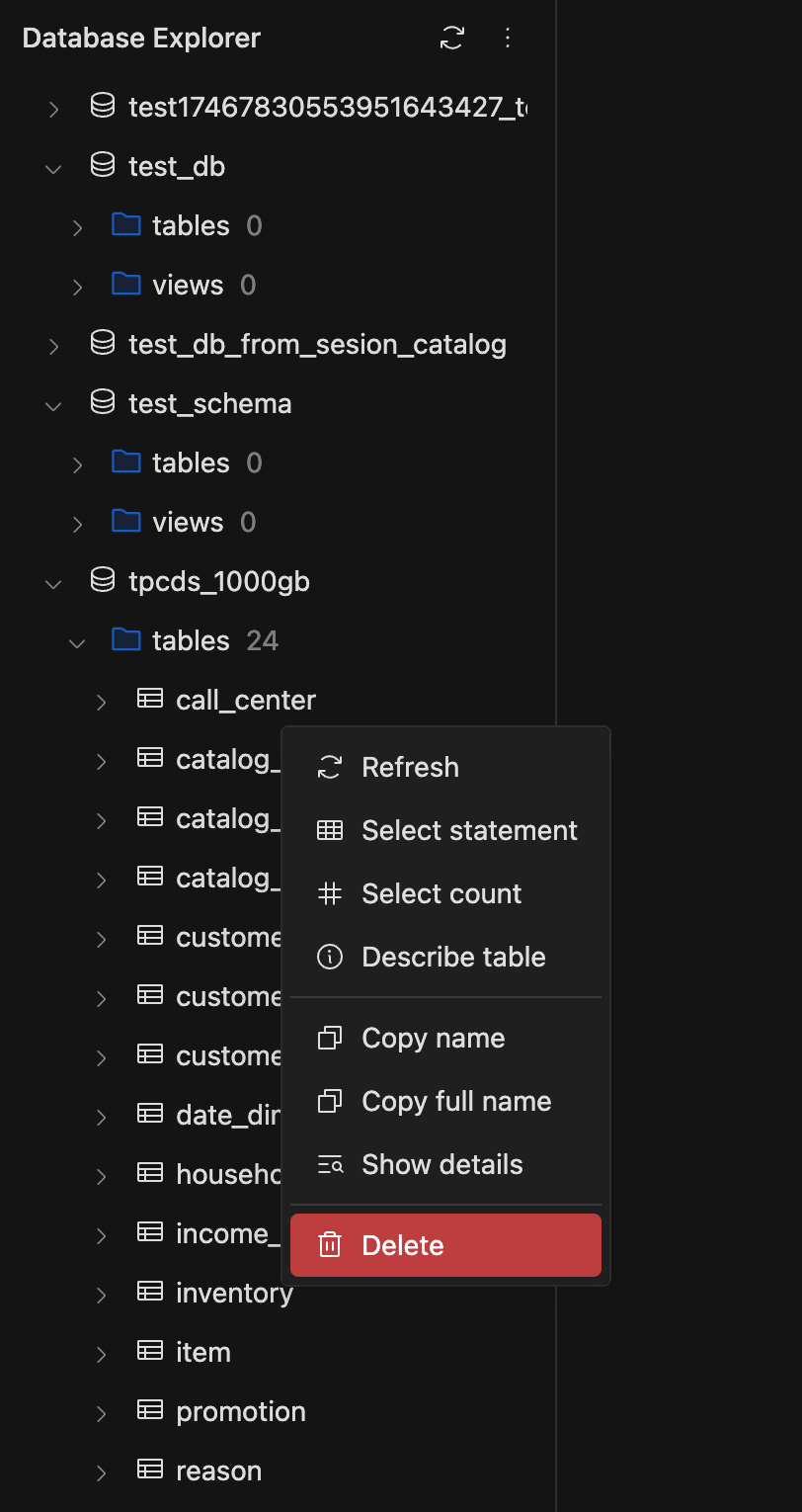
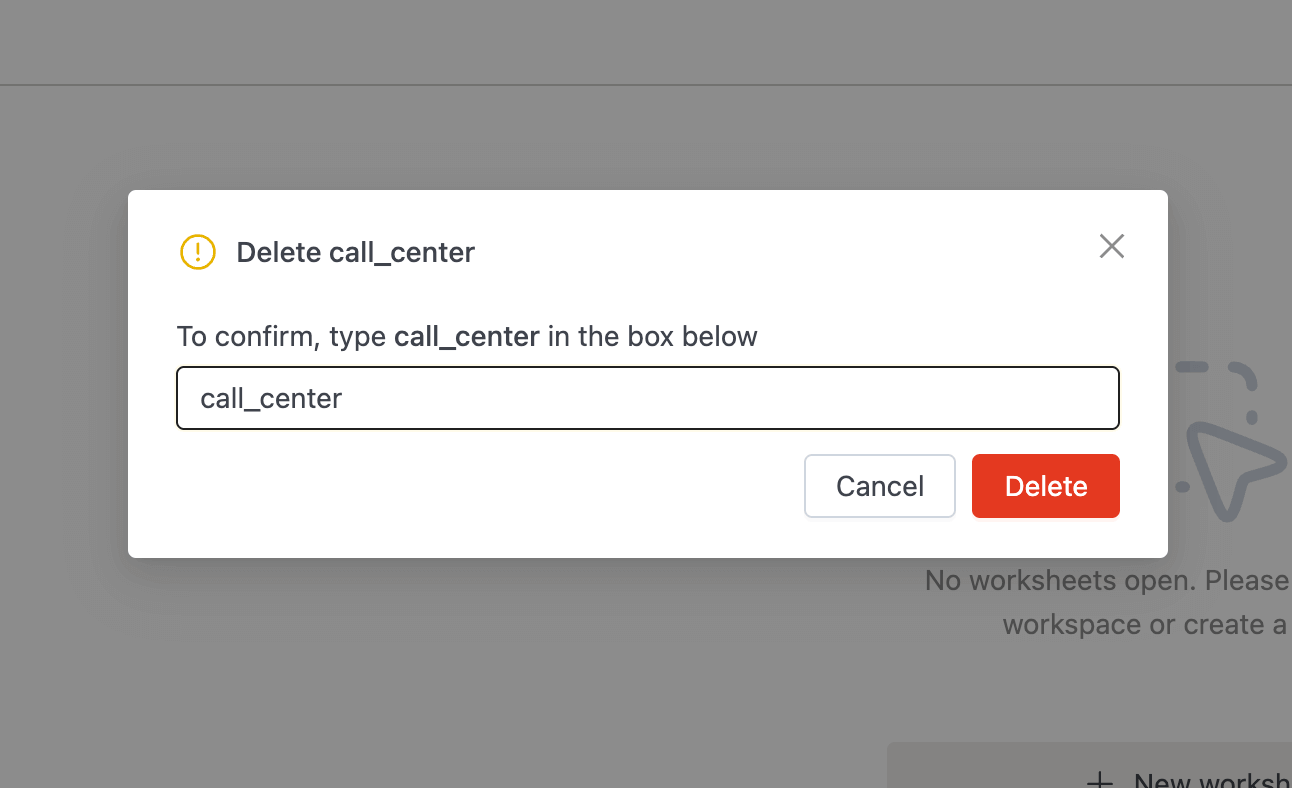
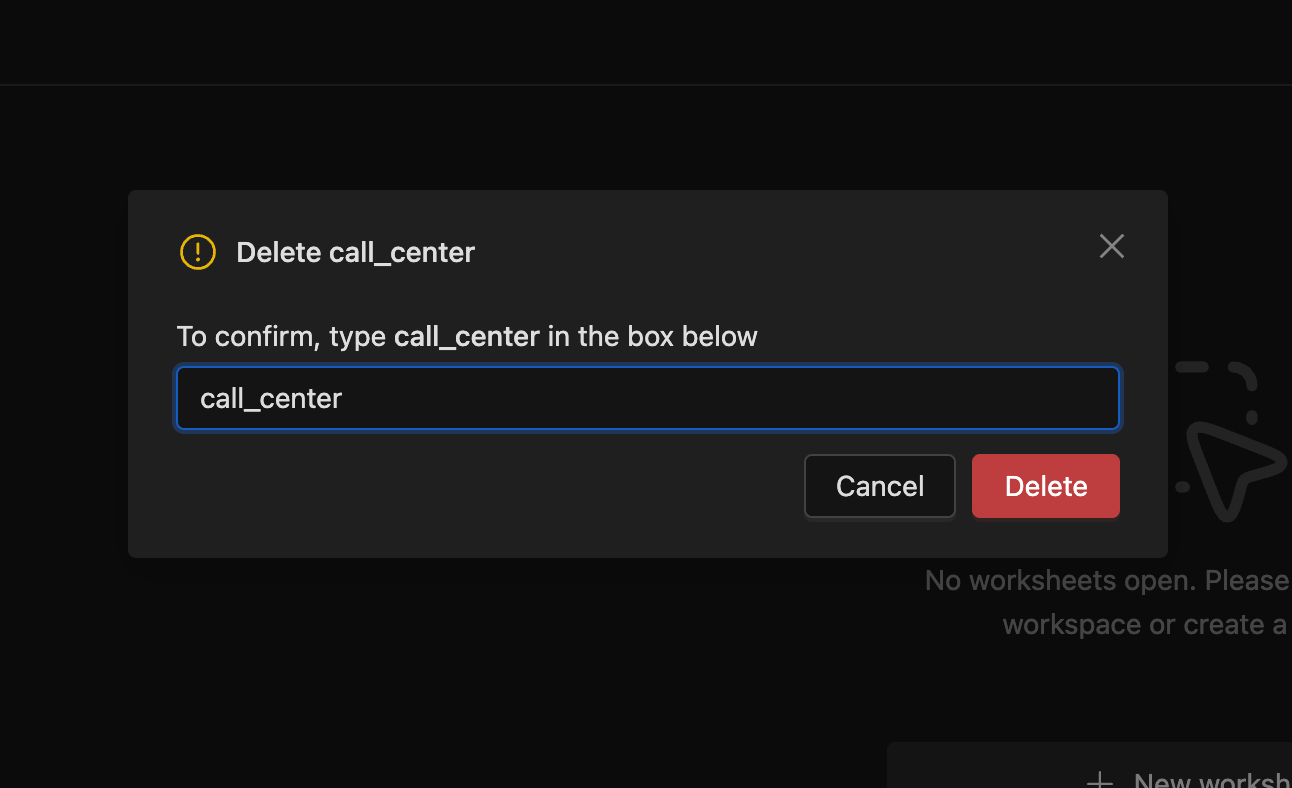
- Added a context menu with
CloseandClose Alloptions to SQL Editor worksheet tabs for quickly closing the current or all tabs.

- Tags attached to Spark jobs are now propagated to the corresponding Kubernetes pods as labels.This enables resource management or categorization based on job-specific tags.
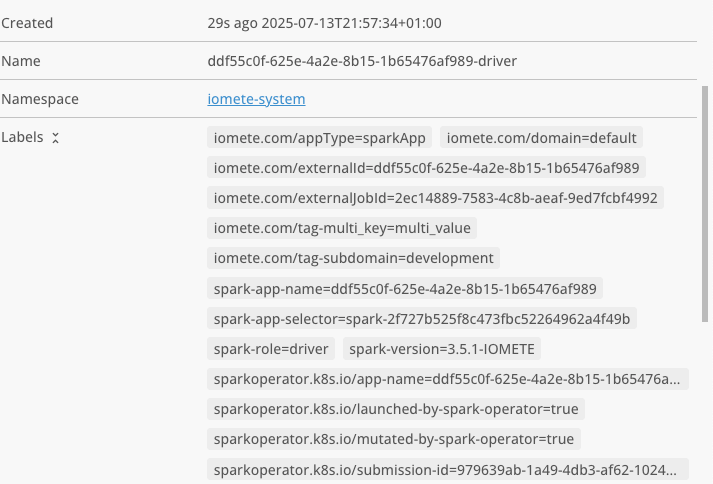
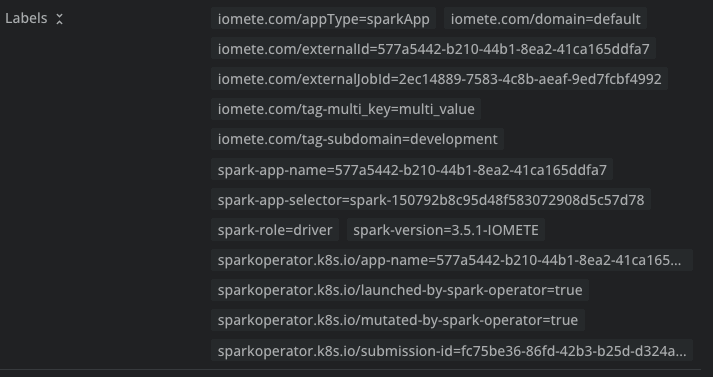
🐛 Bug Fixes
- Added support to configure the maximum allowed cookie size for HTTP requests. This is useful for customers encountering issues with large cookies. Set the value via
services.gateway.settings.maxCookieSizeinvalues.yaml(default:128k). - Fixed an issue with access token renewal when executing SQL queries.
- Patched the data-plane init job to ensure the metastore starts correctly post-install when special characters are used in the PostgreSQL password.
- Fixed a bug where updates to LDAP settings were not reflected in periodic LDAP syncs.
- Minor fix to ensure the
iom-catalogservice consistently appears on the health check page. - Git Repositories in sql editor now has support for subgroups in gitlab.
- Allow trailing semicolon in Iceberg CALL statements for better Spark SQL compatibility
v3.9.2
⚡ Improvements
- Job resource accounting using tags: Tags that are attached to the spark jobs will be propagated to the pod as labels, which could be used for resource management of jobs categorized by specific tags.


🐛 Bug Fixes
- Move hard coded iom-openapi pod resources to values.yaml in chart.
- Access token renewal issue while executing SQL queries is fixed.
- Fixed bug where LDAP settings updates were not reflected in periodic LDAP sync.
v3.9.1
🐛 Bug Fixes
- Fixed an issue where queries run from the SQL Editor were missing automatic
LIMITclauses. This was resolved by updatingdefaultSparkVersionin the default HELM chart (v17), as older Spark image versions did not enforce limits correctly. - Removed unintended debug logging from the
iom-socketpod to reduce log noise.
v3.9.0
🚀 New Features
- Sensitive data improvements on UI: Users can now mark variables in the global spark settings as 'sensitive', which shows them redacted on the UI going forward
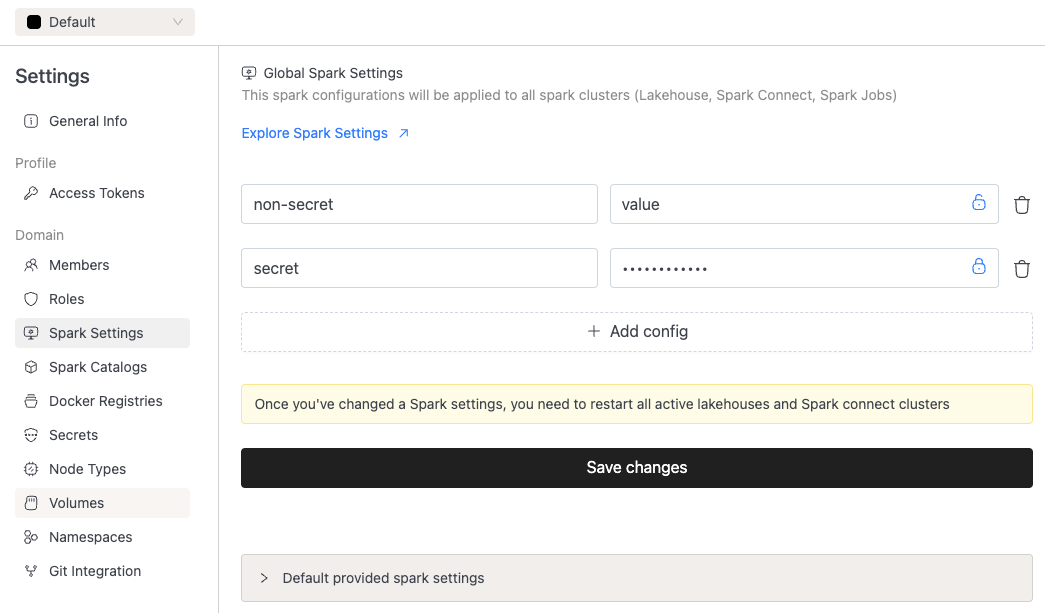
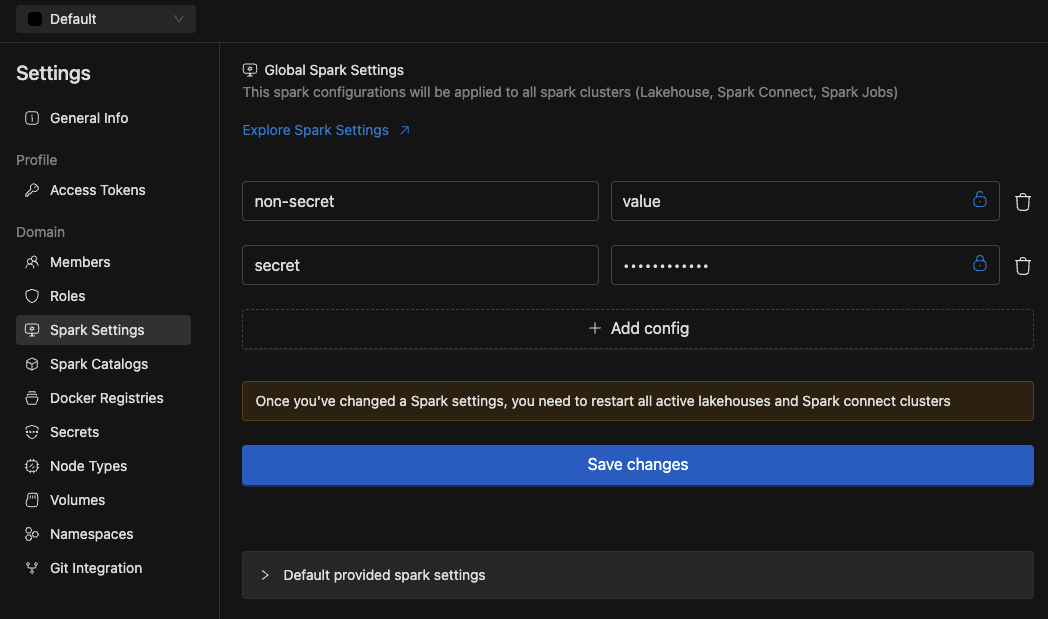
- On installation, admins can specify
docker.sparkLogMaskingRegexesin thevalues.yamlwhich will help mask sensitive data shown on the compute logs. This should be specified as named key-value pairs, in the example below we mask passwords, vault tokens and ports:docker:
sparkLogMaskingRegexes:
password_mask: "(?i)(password\\s*=\\s*)[^&\\s]+"
vault_token_mask: "(?i)(vault\\\\s*token\\\\s*[:=]\\\\s*)(s\\.[a-zA-Z0-9]{20,})"
port_mask: "(?i)(on\s+port\s+)(\d{2,5})"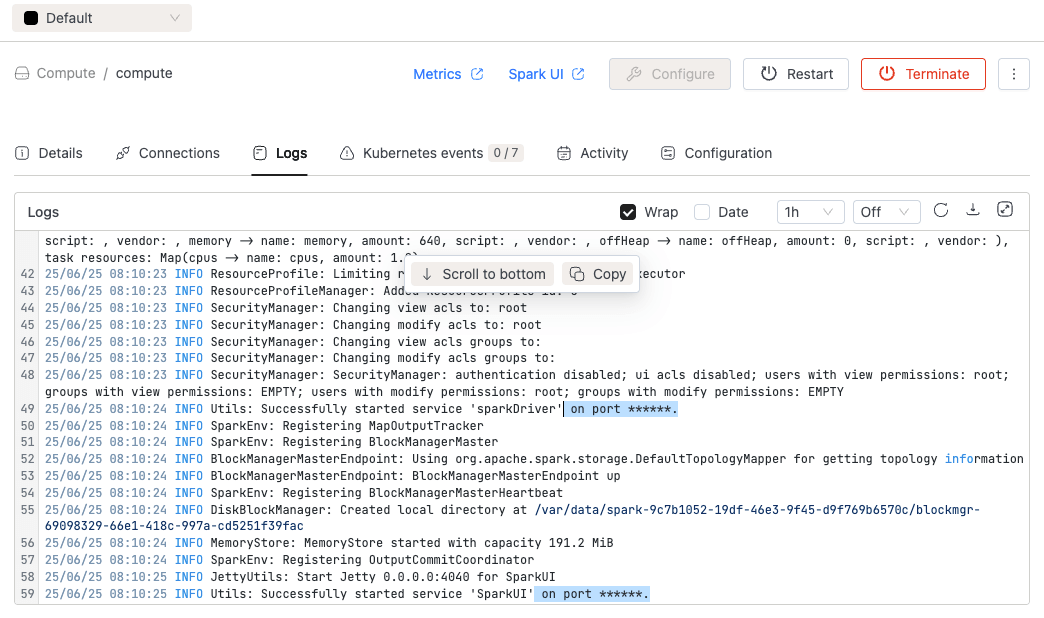
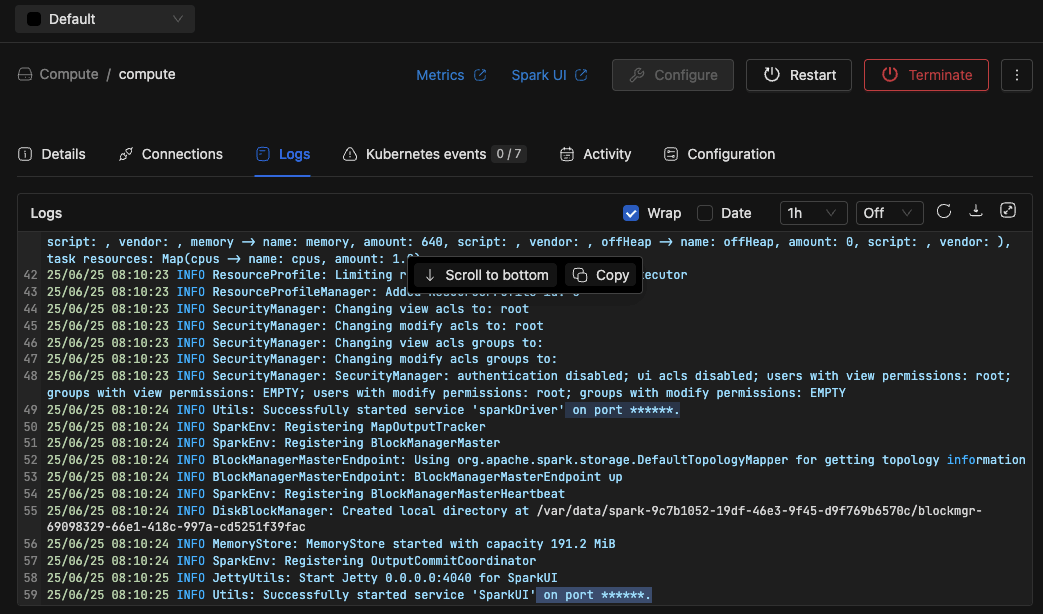
⚡ Improvements
- UI Improvements: The SQL editor in the IOMETE console now supports multiple tabs. Each tab can be configured with a different compute/catalog/database combination.
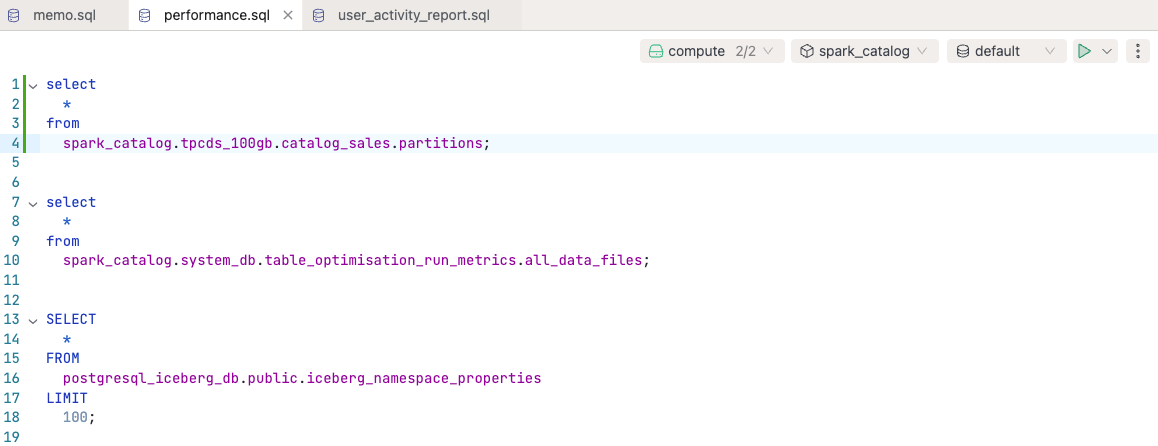
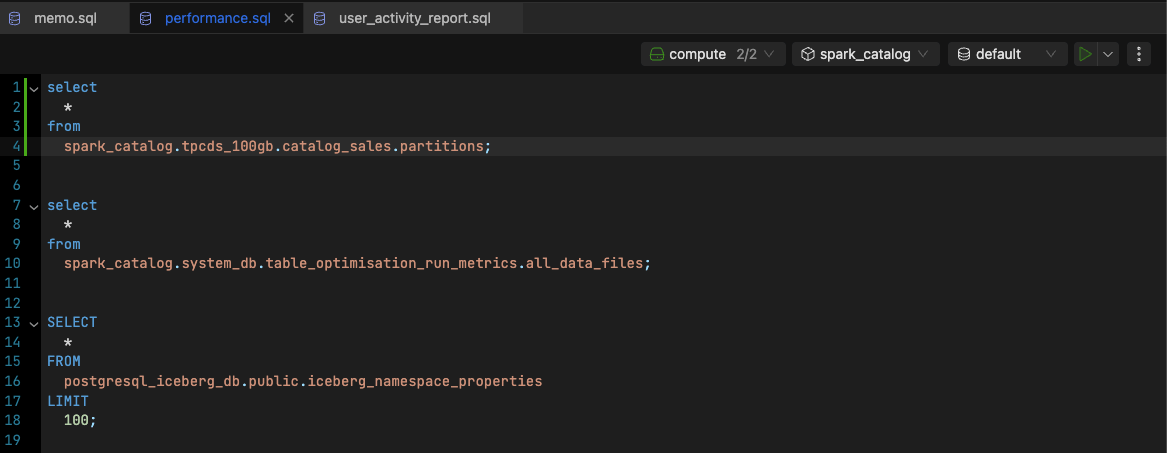
🐛 Bug Fixes
- Fixed a bug in the IOMETE Console that prevented Jupyter kernel configurations from displaying.
- Patched the logic behind the "Cancel" action in the SQL Editor to prevent it from hanging.
- The
iom-corepod now dynamically reloads anydocker.tagAliasesdefined invalues.yaml, removing the need to restart the pod. - Fixed issues that could prevent scheduled Spark applications from sending failure notifications.
v3.8.2
🐛 Bug Fixes
- Minor bug fix on the IOMETE console that prevented Jupyter kernel configuration from showing
v3.7.3
🐛 Bug Fixes
- Patched the logic behind the "Cancel" action in the SQL Editor to prevent it from hanging.
- The
iom-corepod now dynamically reloads anydocker.tagAliasesdefined invalues.yaml, removing the need to restart the pod. - Fixed issues that could prevent scheduled Spark applications from sending failure.
v3.8.1
🚀 New Features
- Notifications: We added the ability for users to select the type of security to use when connecting to their SMTP
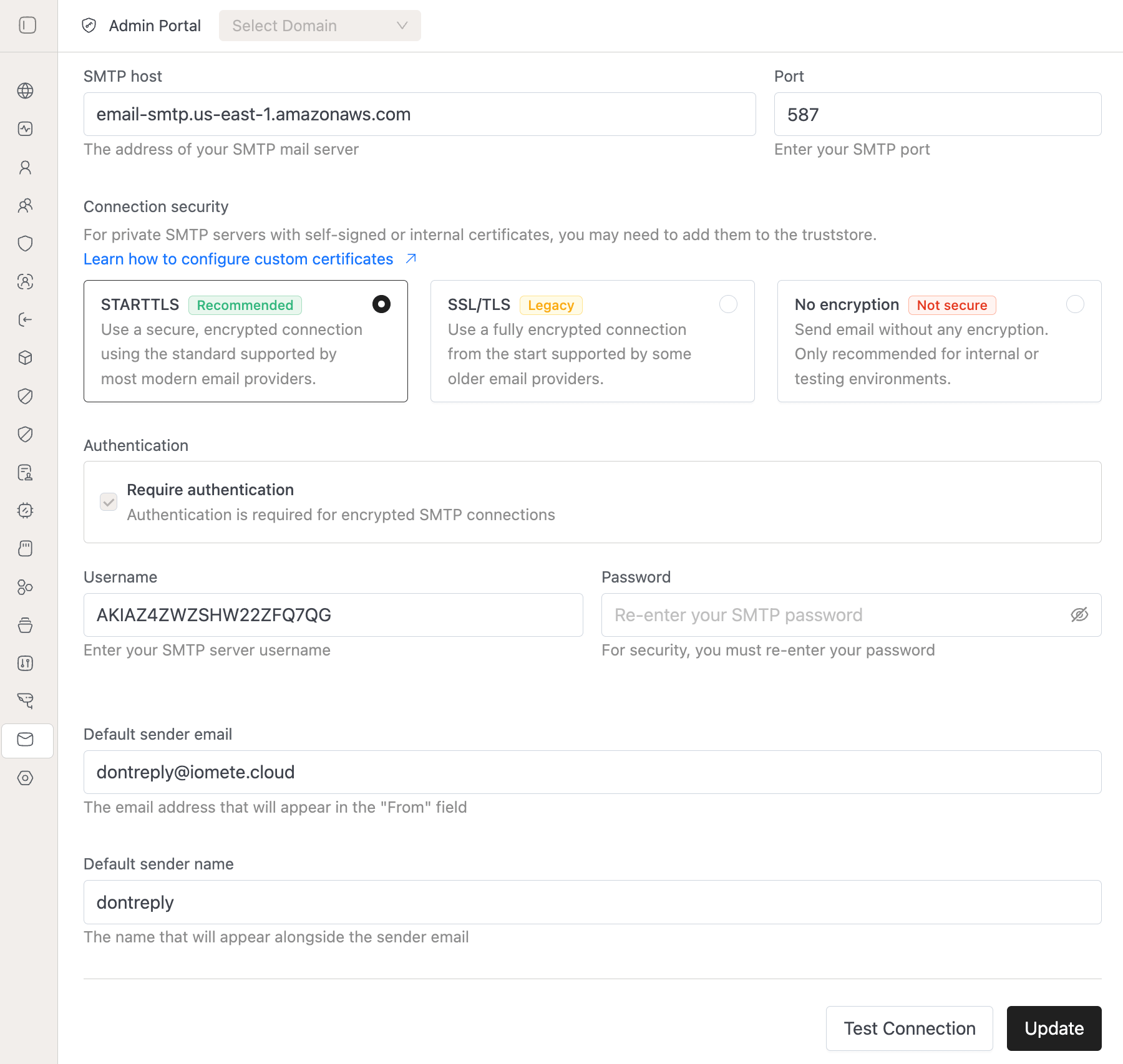
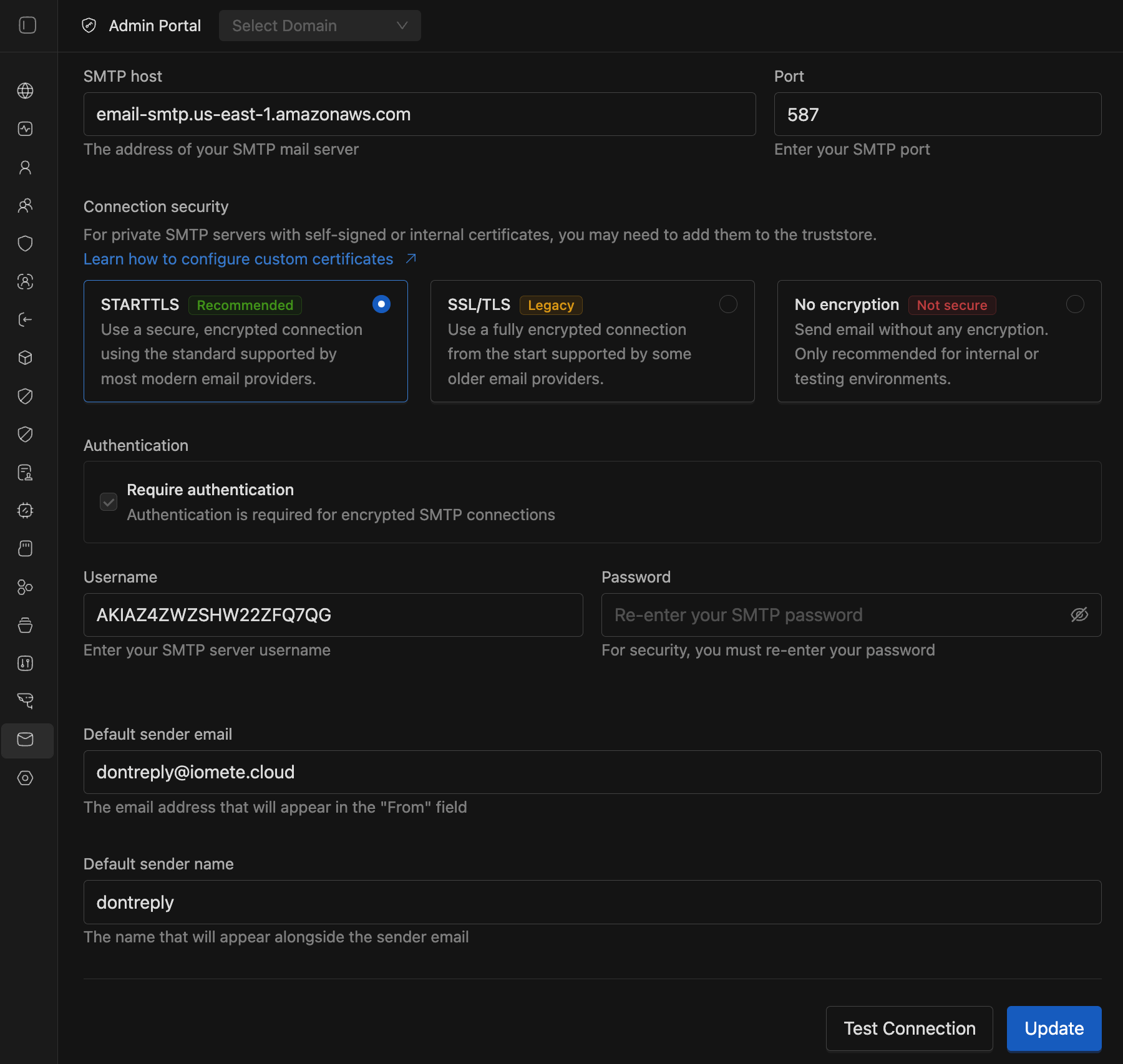
🐛 Bug Fixes
- Fixed a bug that users were not able to use the "restart" button for Compute clusters
- We added pagination to tables in the data explorer and data catalog
v3.8.0
🚀 New Features
- IOMETE Spark: IOMETE Spark version
3.5.5-v1is now available for testing! We recommend configuring it in thedocker.additionalSparkVersionssection ofvalues.yamlduring installation. This enables users to select this version as a custom image when setting up a lakehouse. You can also use it as the base image for your Spark jobs. - We released a patch for IOMETE Spark
3.5.3-v14that fixes an issue preventing it from starting correctly when feature flags for Activity Monitoring were not enabled.
🐛 Bug Fixes
- Fixed a bug introduced in version
3.7.0that prevented IOMETE from being installed from scratch ifdocker.tagAliaseswas not explicitly set invalues.yaml. - When users are not allowed to view certain columns in a table, the error message now correctly lists the columns they do have access to, instead of the generic "access denied" message previously shown in the SQL Editor.
- Improved the IOMETE REST Catalog to better handle high load and avoid out-of-memory errors.
- Added pagination to the LDAP sync job to prevent oversized requests and ensure all users and groups can be synchronized to IOMETE in manageable chunks.
- Made a small update to worksheet duplication to avoid naming conflicts when a duplicate already exists.
- Proper support has been added for
-and.characters in secret names. - Restored the
Runs as userfield in the Spark Applications section to indicate the privileges under which a job was executed.
v3.7.0
🚀 New Features
-
Activity Monitoring:
- Users can now only view their own queries within a domain, enhancing data privacy and security.
- A new Shuffle Metrics section has been added to the Query Monitoring Details page, providing deeper insights into query performance.
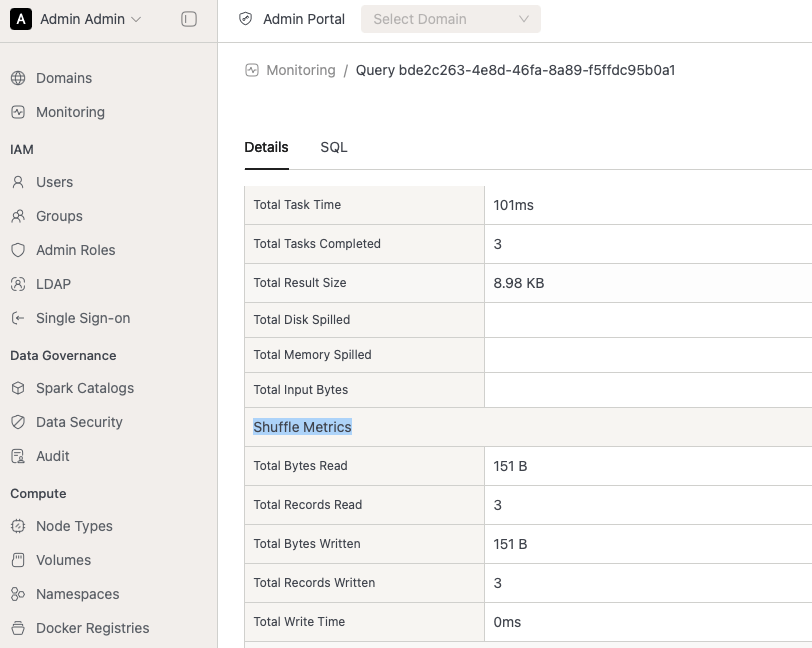

- We've also introduced Total Memory Spilled to the Performance Metrics section, helping users better diagnose memory-intensive queries.
-
IOMETE Spark:
- Administrators can now define Docker image tag aliases using the
docker.tagAliasesfield in thevalues.yamlfile of the Helm chart used during installation. These aliases simplify image version management for Spark jobs configured in the IOMETE console—allowing teams to reference a friendly name (likestableorexperimental) instead of specific tags. A dedicated UI for managing these aliases is planned for a future release.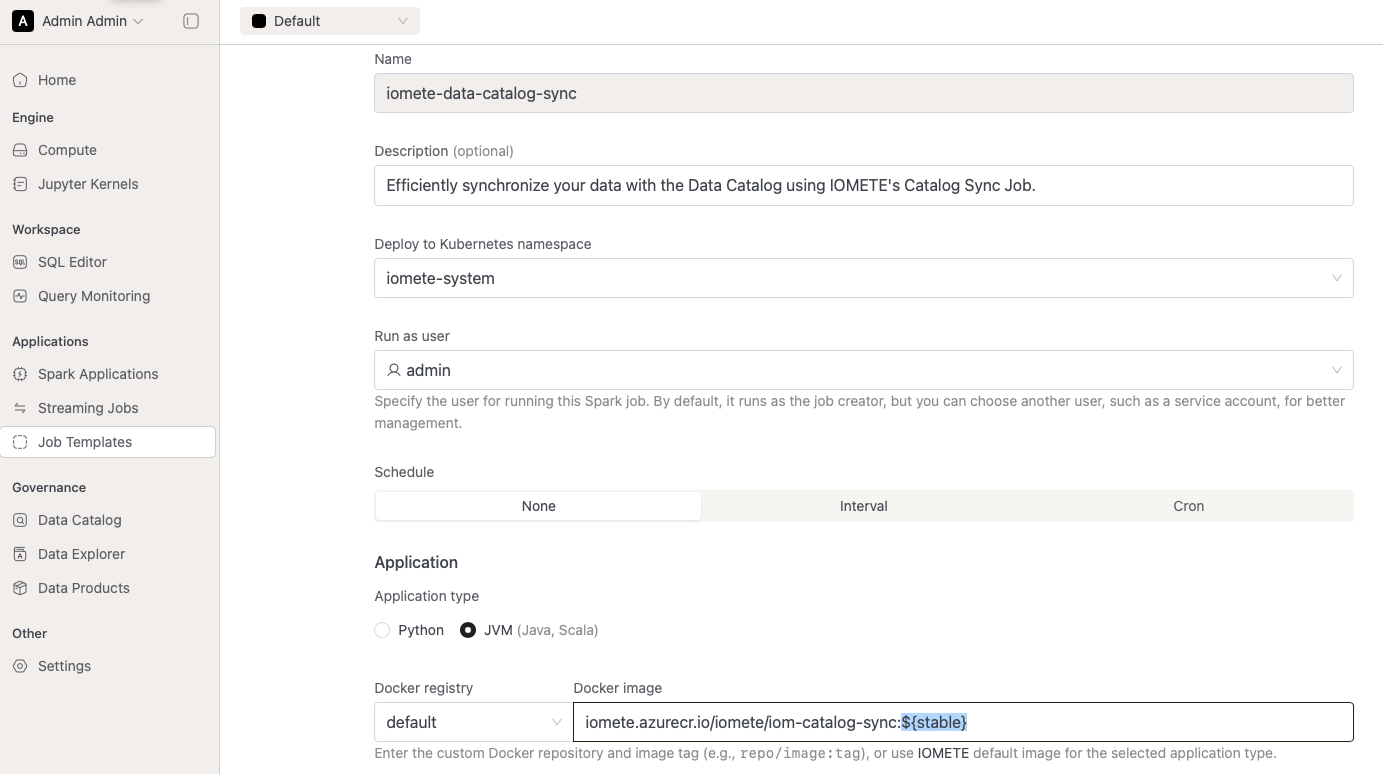

- Users can now select specific IOMETE Spark Images when running jobs on compute clusters.
The list of selectable images is configurable via the
docker.additionalSparkVersionsfield in the samevalues.yamlfile.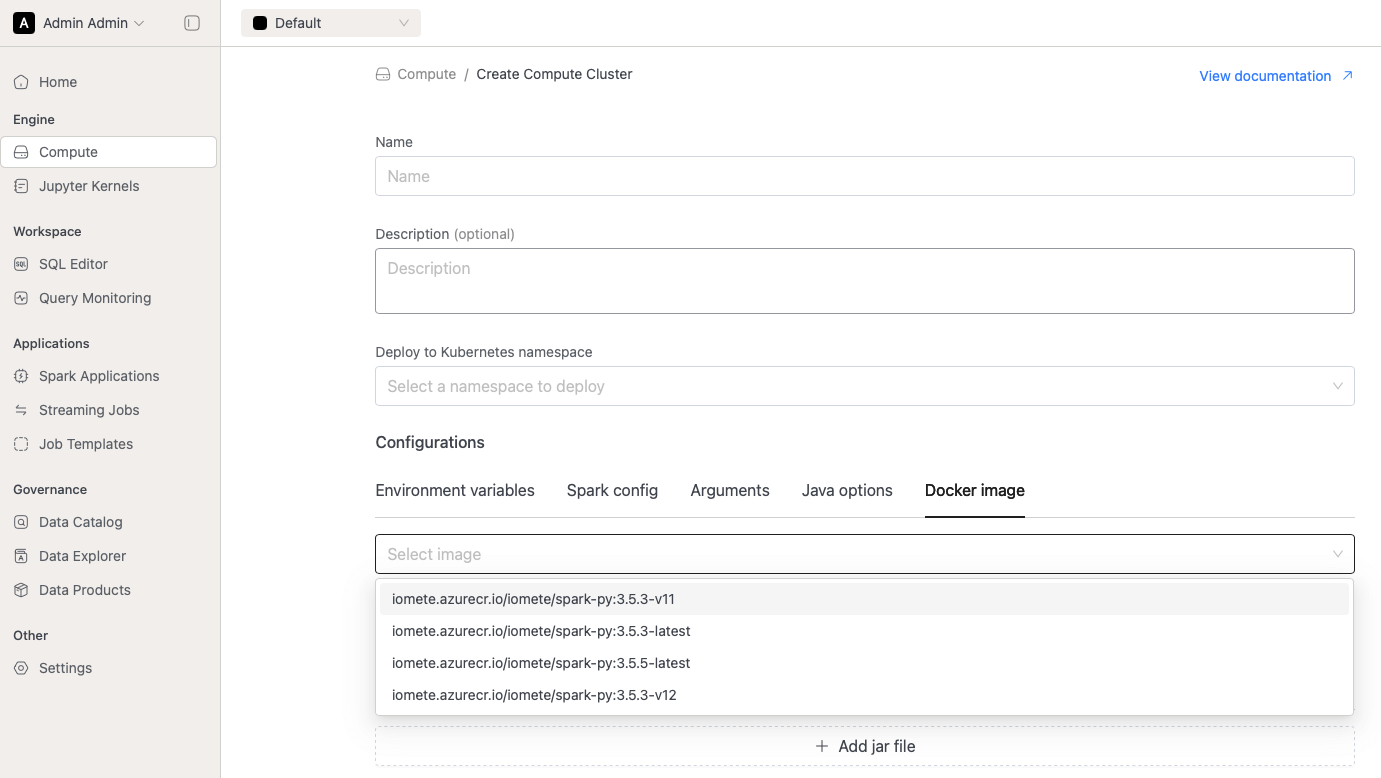

- During installation, administrators can configure Docker image tag aliases in the
docker.tagAliasessection of thevalues.yamlfile. These aliases can be referenced when setting up Spark jobs in the IOMETE console. For example, aliases likestableandexperimentalcan point to specific versions:We intend to move the configuration of these aliases from the Helm chart to the IOMETE console in a future release.docker:
tagAliases:
stable: 4.2.0
experimental: latest - In addition to tag aliases, administrators can control which IOMETE Spark images are available for compute clusters.
The
docker.defaultSparkVersionfield defines the default image used at startup, whiledocker.additionalSparkVersionsallows users to choose from a list of alternative versions. This enables testing of new Spark versions or fallback to older ones if issues arise. For example:docker:
defaultSparkVersion: 3.5.3-v12
additionalSparkVersions: [3.5.3-v11, 3.5.3-v13, 3.5.5-v1]
- Administrators can now define Docker image tag aliases using the
⚡ Improvements
- Spark jobs now explicitly set the
SPARK_USERenvironment variable on their Kubernetes pods to ensure jobs run under the intended user to avoid Spark falling back on the OS default under specific circumstances. - We've improved the retry logic for Spark Connect authentication to reduce failures caused by temporary issues.
- UI Improvements: We moved job notifications to a separate tab in the Job Details page
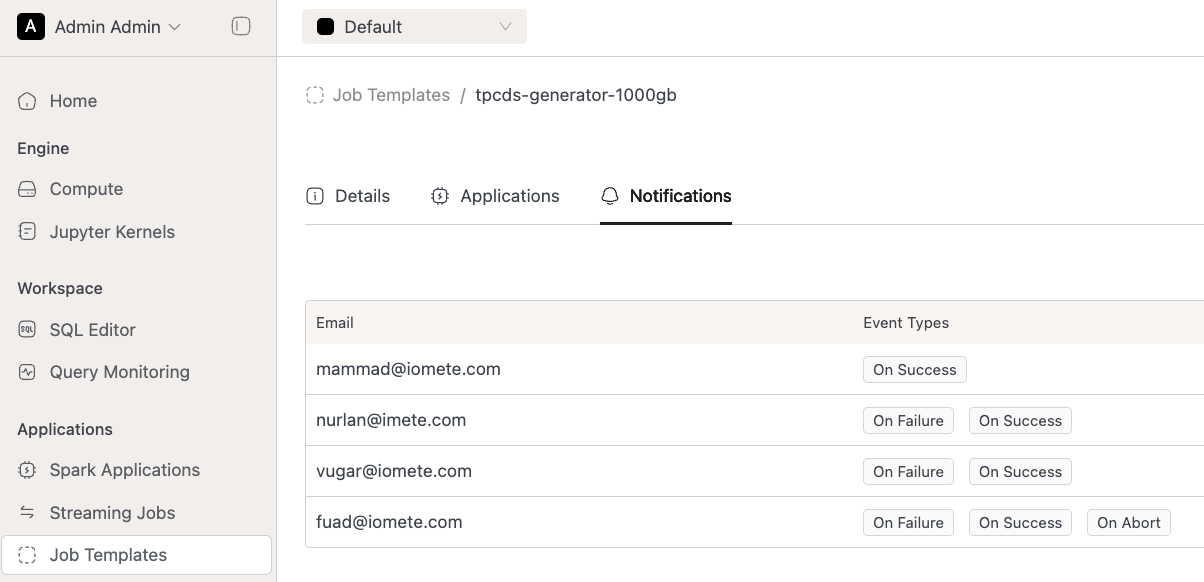

🐛 Bug Fixes
- In the Query Monitoring section, users within a domain can now only view their own queries for security reasons. Administrators retain the ability to view all queries across users via the Query Monitoring page in the Admin Portal.
- When Registering an Iceberg Table via the SQL Editor, we now select the metadata file with the latest timestamp, rather than the one with the highest lexicographical name. This ensures that the most recent schema and snapshot information is used, addressing issues where compactions could cause the lexicographical order to be out of sync with the actual modification time.
- Fixed an issue where adding or removing notifications from a job would cause the schedules of scheduled jobs to be unintentionally reset.
v3.6.0
🚀 New Features
- Activity Monitoring: Spark job metrics can now be automatically archived to the IOMETE system table
activity_monitoring_spark_jobsin Iceberg when feature flagsparkJobArchivalis enabled. - Spark Job Archival: Added new feature flags to archive spark job statistics. If set, spark job statistics will be periodically archived to IOMETE system table
activity_monitoring_spark_jobsin Iceberg
⚡ Improvements
- UI Improvements:
- Removed the option to set the number of executors when running in single-node mode, as it is not applicable in driver-only configurations
- Fix bug that can prevent worksheet creation in SQL editor
- IOMETE Spark now treats all catalogs used in queries as case-insensitive. This behavior can be disabled by setting the Spark configuration
spark.iomete.lowercaseCatalogNames.enabledto false at the cluster or global level.
🐛 Bug Fixes
- Patch to automatically detect whether SSL/TLS should be used based on the SMTP port
- Fixed issue where some pods did not initiate leader election after losing leadership, causing IOMETE internal maintenance jobs to stop running
- Fixed issue where Spark status events were intermittently not sent to the frontend due to leader election instability
- Fixed issue where the iom-identity pod intermittently returned incorrect permissions for tag-mask policies
- Fixed permission enforcement issue in Spark Connect where queries using
spark.sql(...).explain(...)did not correctly validate the permissions of the user issuing the request. This did not affect queries of the formspark.sql("EXPLAIN ...") - Restored logging functionality for pod iom-socket
v3.4.2
🐛 Bug Fixes
- Fixed iom-identity pod intermittently returning incorrect permissions on tag-mask policies
- Restored logging functionality for pod iom-socket
v3.5.1
🐛 Bug Fixes
- Scheduled Data Compaction jobs now support namespaces other than the default
v3.5.0
🚀 New Features
- Activity Monitoring: Administrators can now cancel running queries directly from the IOMETE console
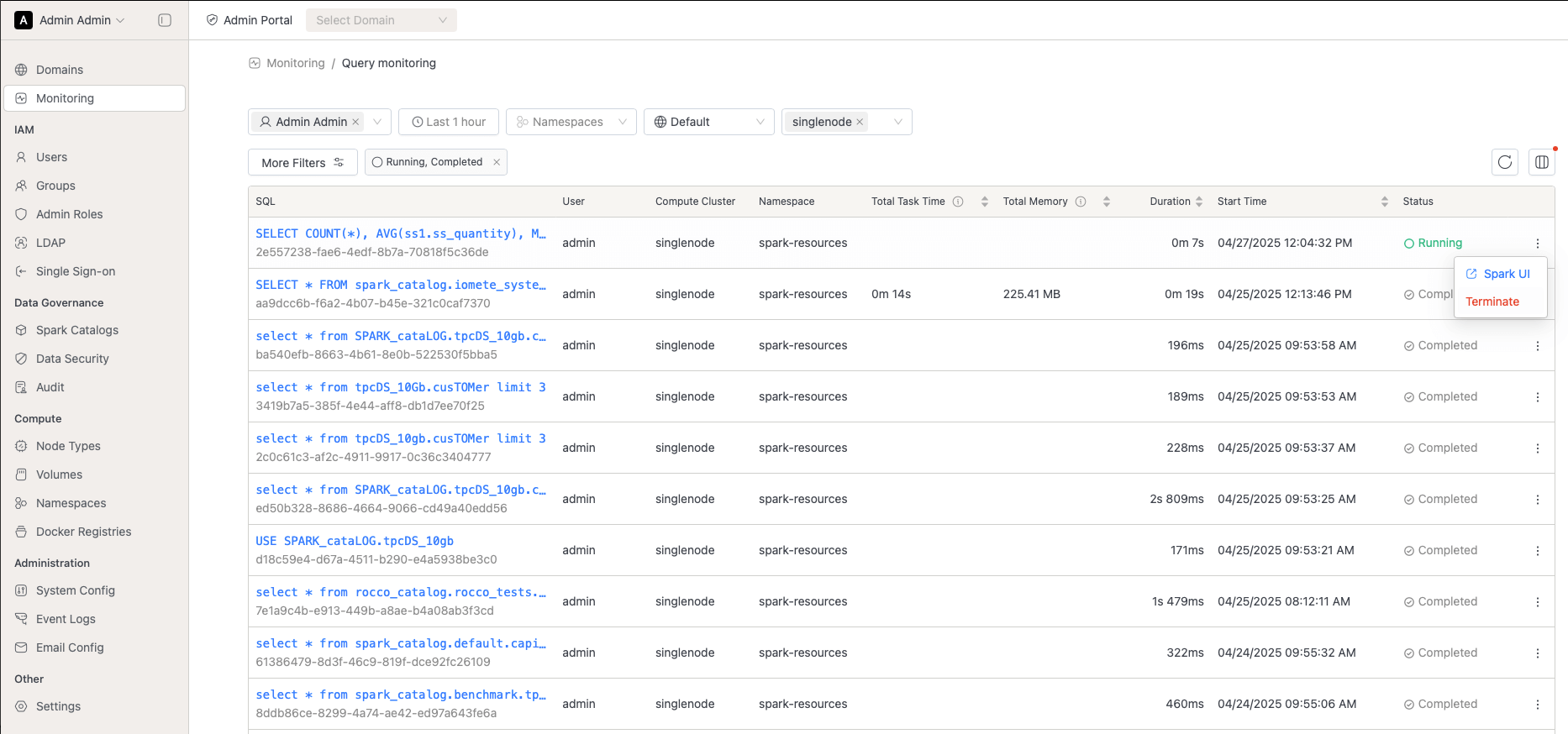

- Notifications:
- Administrators can now add an SMTP server integration on the IOMETE console to allow IOMETE to send e-mail notifications
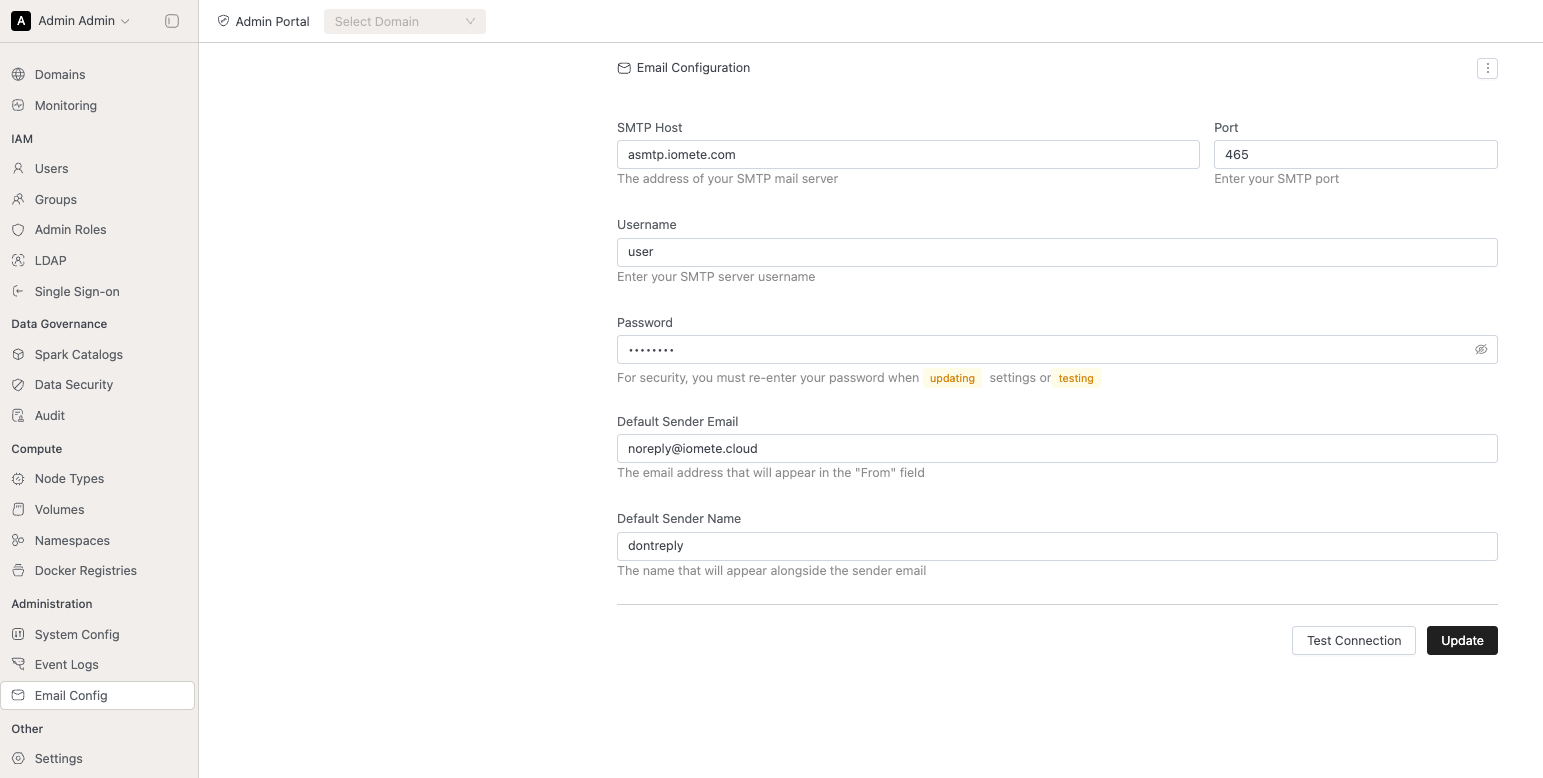

- Users can add e-mail addresses to the configuration of a Spark job and select on which job events they wish to trigger an e-mail
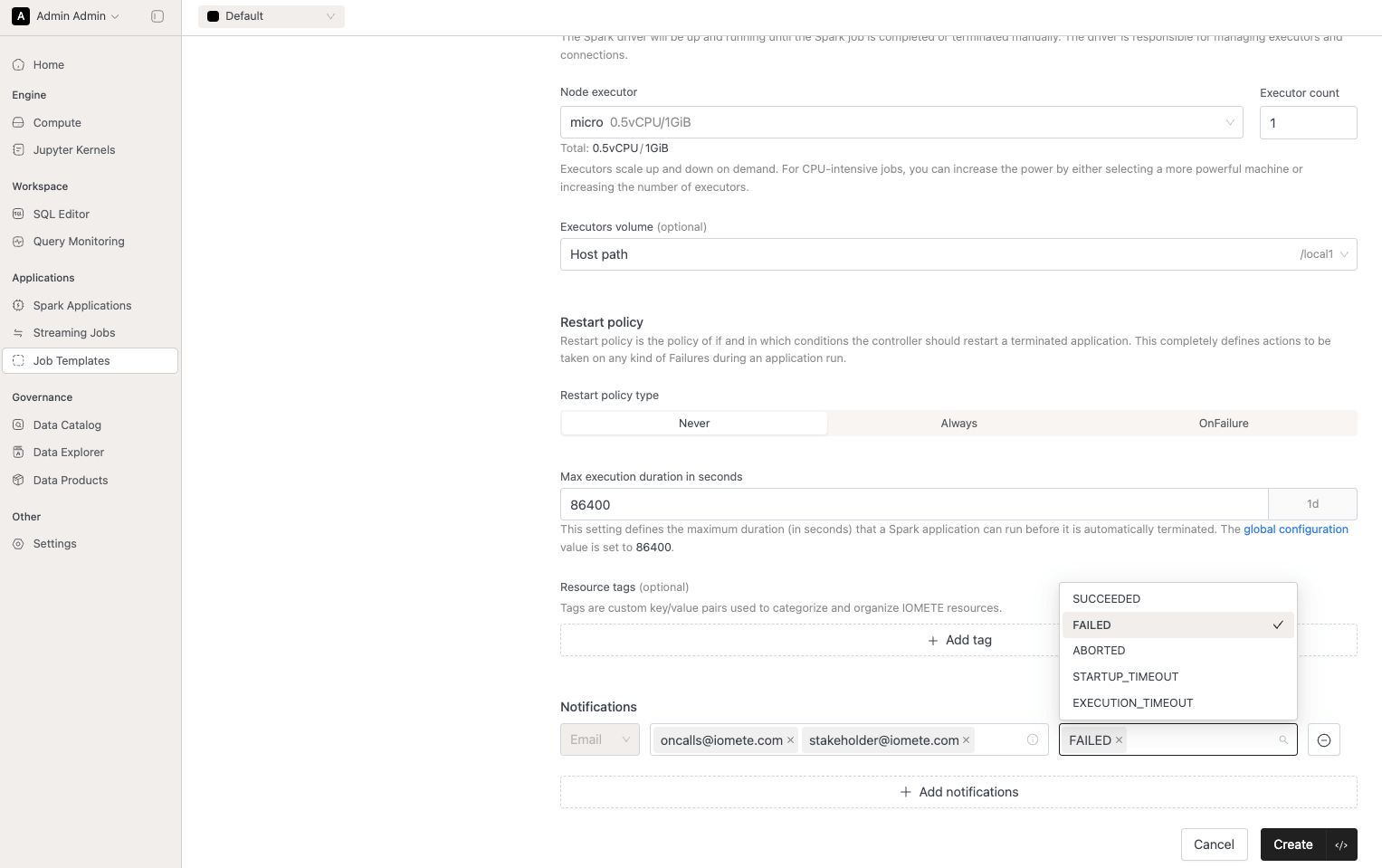

- Administrators can now add an SMTP server integration on the IOMETE console to allow IOMETE to send e-mail notifications
- Custom masking expressions: Next to our predefined masking rules, users can now configure custom masking expressions. In addition, we also support configuring under which conditions this custom masking expression should be applied.
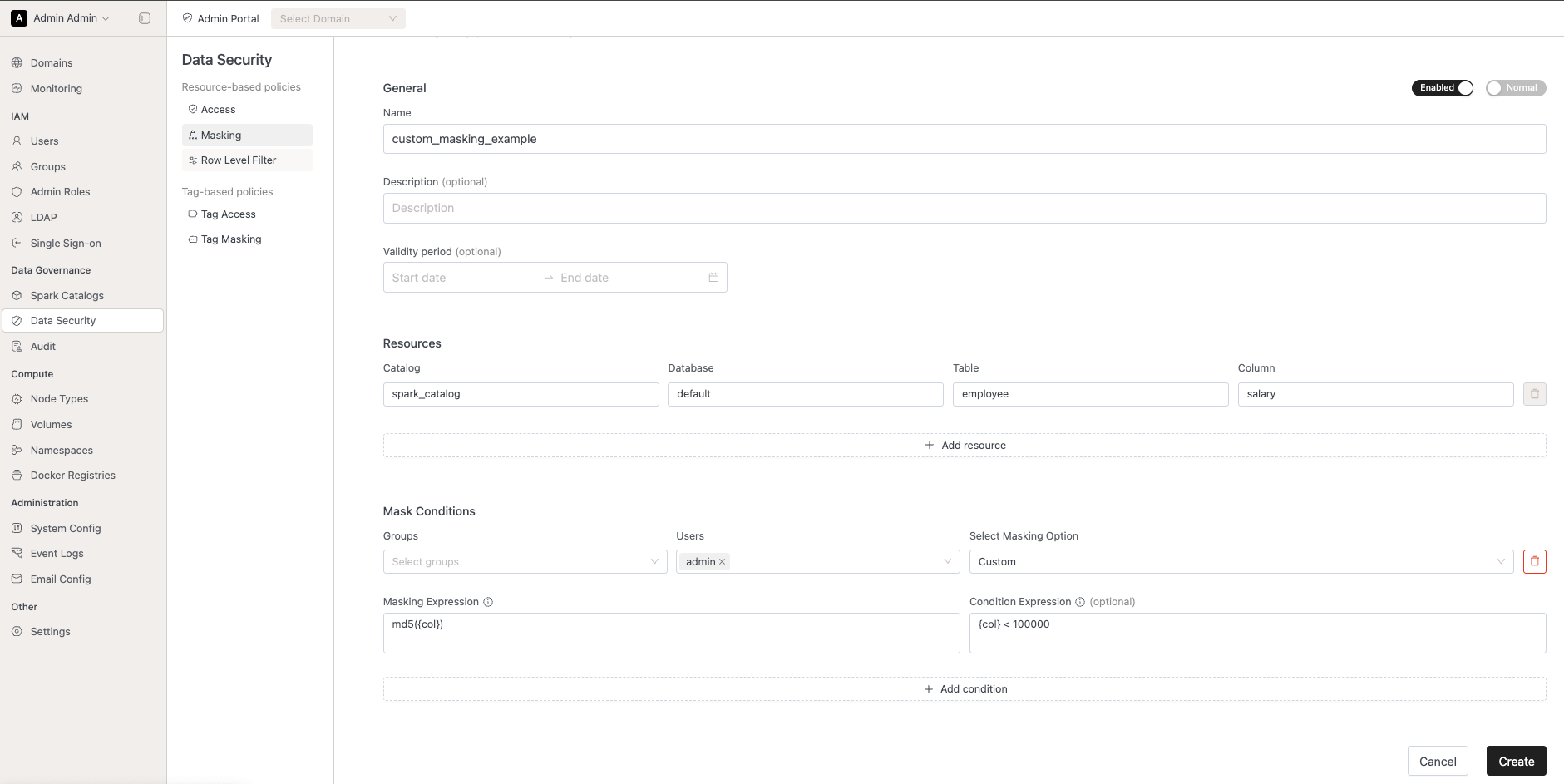

- Kubernetes workload isolations:
- Kubernetes administrators can configure dataplantolerations during IOMETE installation, allowing Spark workloads to be assigned to specific nodes.
- Priority Classes can also be configured during installation.
⚡ Improvements
- API Improvements:
- Data security APIs verifies validity date windows are in correct format
- Catalog creation endpoint enforces that catalog names have lowercase alphanumeric characters an underscores only to match UI validation
- Catalog lookup and deletion APIs are now case-insensitive
- Technical Details:
- Added new feature flags:
priorityClasses: enabling administrators to limit node allocation for workloads like compute, spark-job, and notebook, and manage resources more effectively across namespaces.iometeSparkLivenessProbe: adds a liveness probe as part of the default spark template to monitor if Compute Clusters and jobs are healthy and not in a zombie state. Requires all jobs and compute clusters to run3.5.3-v10or newer.
- When launching a compute cluster with AutoScale enabled, the system will now start with a single executor. Additional executors will automatically scale up based on demand, up to the defined maximum limit.
- Added new feature flags:
🐛 Bug Fixes
- Fixed Catalog sync Job breaking on Iceberg nested namespaces
- IOMETE Iceberg REST Catalog returning HTTP 500 instead of HTTP 503 if connection pool is saturated, preventing Iceberg clients from doing retries
v3.4.0
🚀 New Features
- Query Monitoring: Added new query monitoring feature where users can view all running queries and their resource utilization. Active running queries are prioritized at the top for better visibility, with the rest sorted by time. Available in both Admin Panel and Domain page.
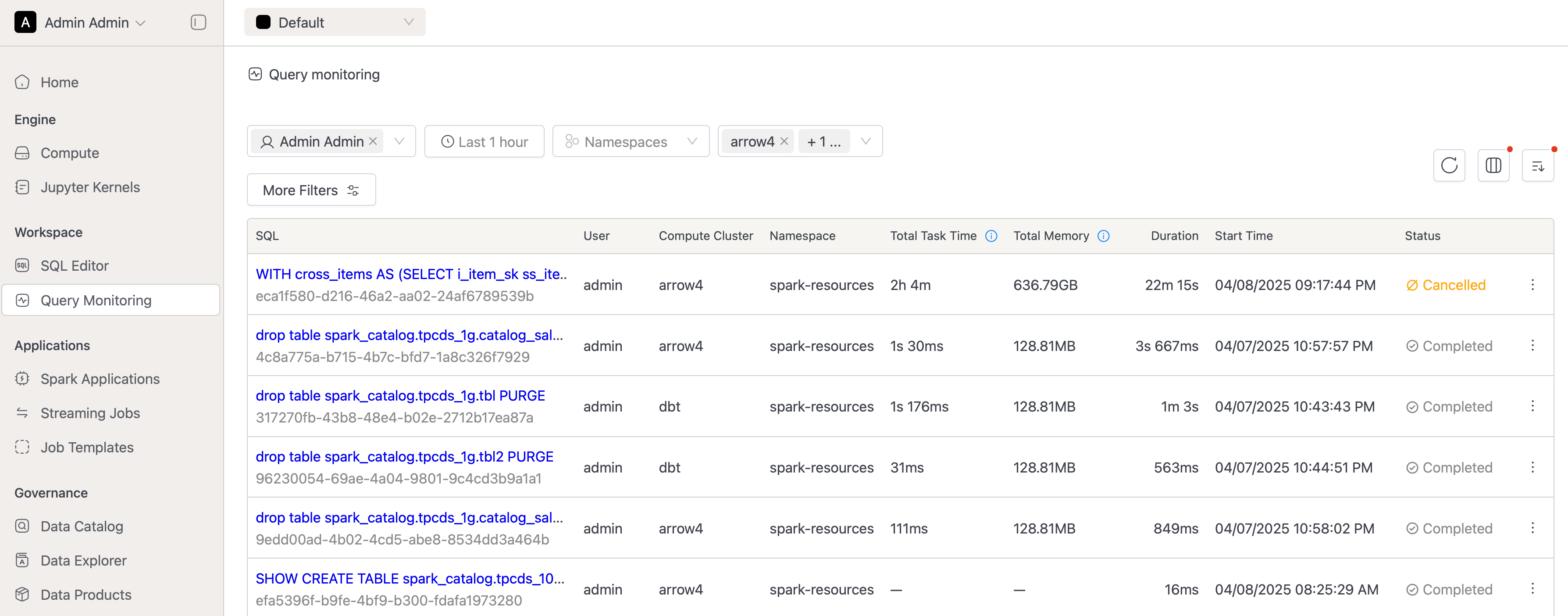

⚡ Improvements
- API Improvements:
- Upgraded IOMETE API Reference tool to support V3 OpenAPI Specifications
- Data Catalog v2 APIs implemented with extended fields:
- New APIs for retrieving catalogs with metrics:
totalSchemaCount,totalTableCount,totalSizeInBytes,totalFiles - New APIs to list databases with metrics:
totalTableCount,totalViewCount,totalSizeInBytes,totalFiles,failedTableCount - New APIs for getting table details and metadata, making it easier to retrieve tables by name instead of ID
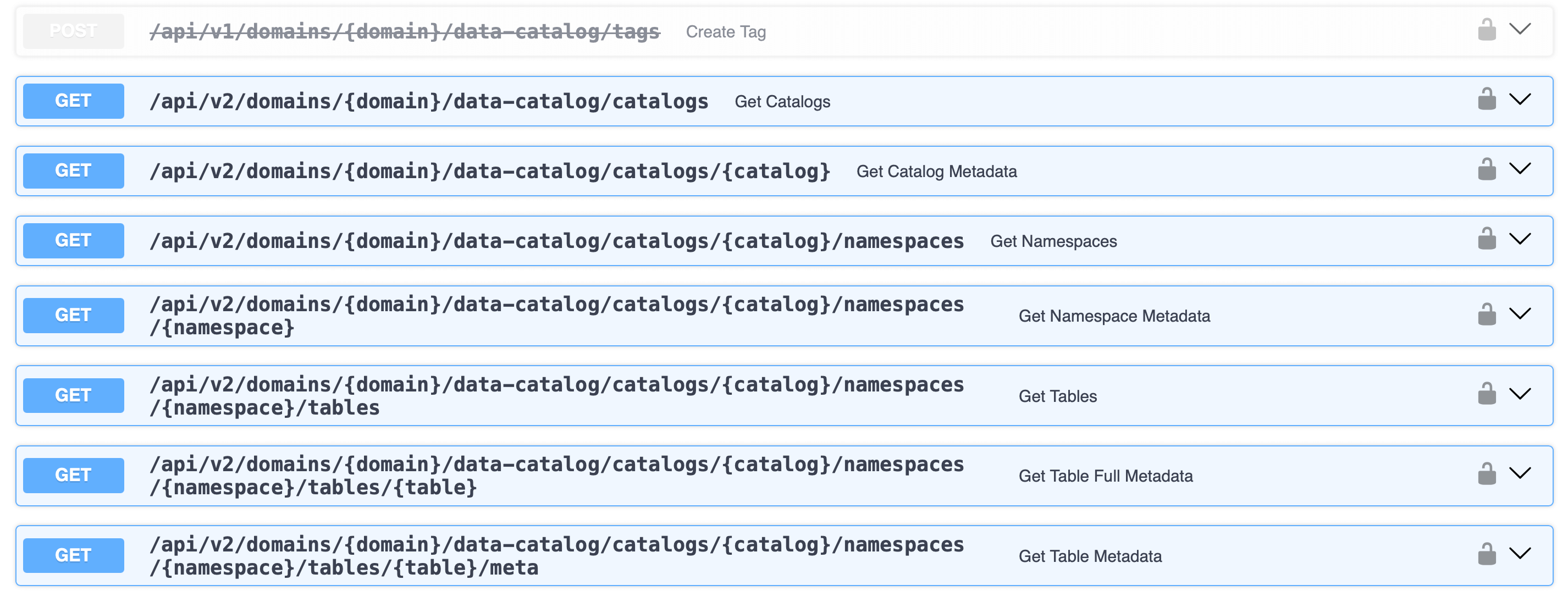

- New APIs for retrieving catalogs with metrics:
- Added new APIs under IAM Service for checking if user or group exists and retrieving group members
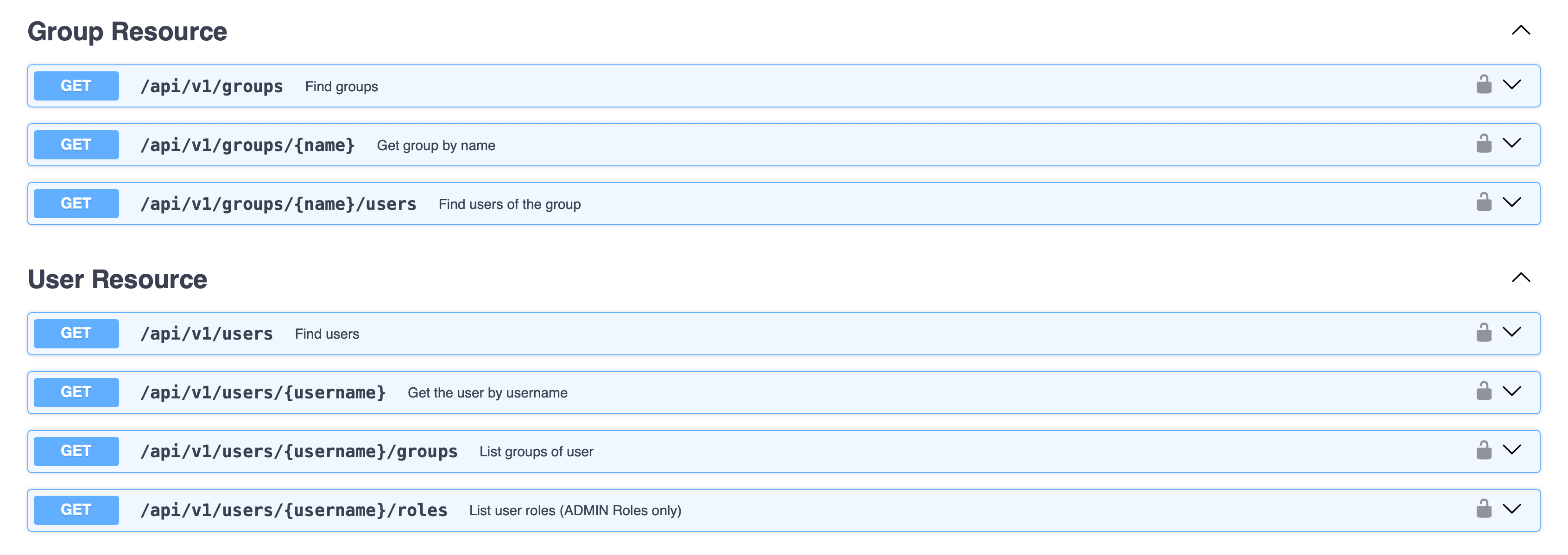

- UI Improvements:
- Improved input formats on UI and API, now supporting spaces, uppercase characters, and increased length limits
- Special validation rules remain in place for:
- Spark catalogs (underscores only)
- Lakehouses (hyphens, max 53 length)
- Usernames
- Special validation rules remain in place for:
- Standardized UI titles for create actions across all pages
- Added warning on Data Security page to clarify access permissions when using predefined
{USER}orpublicgroup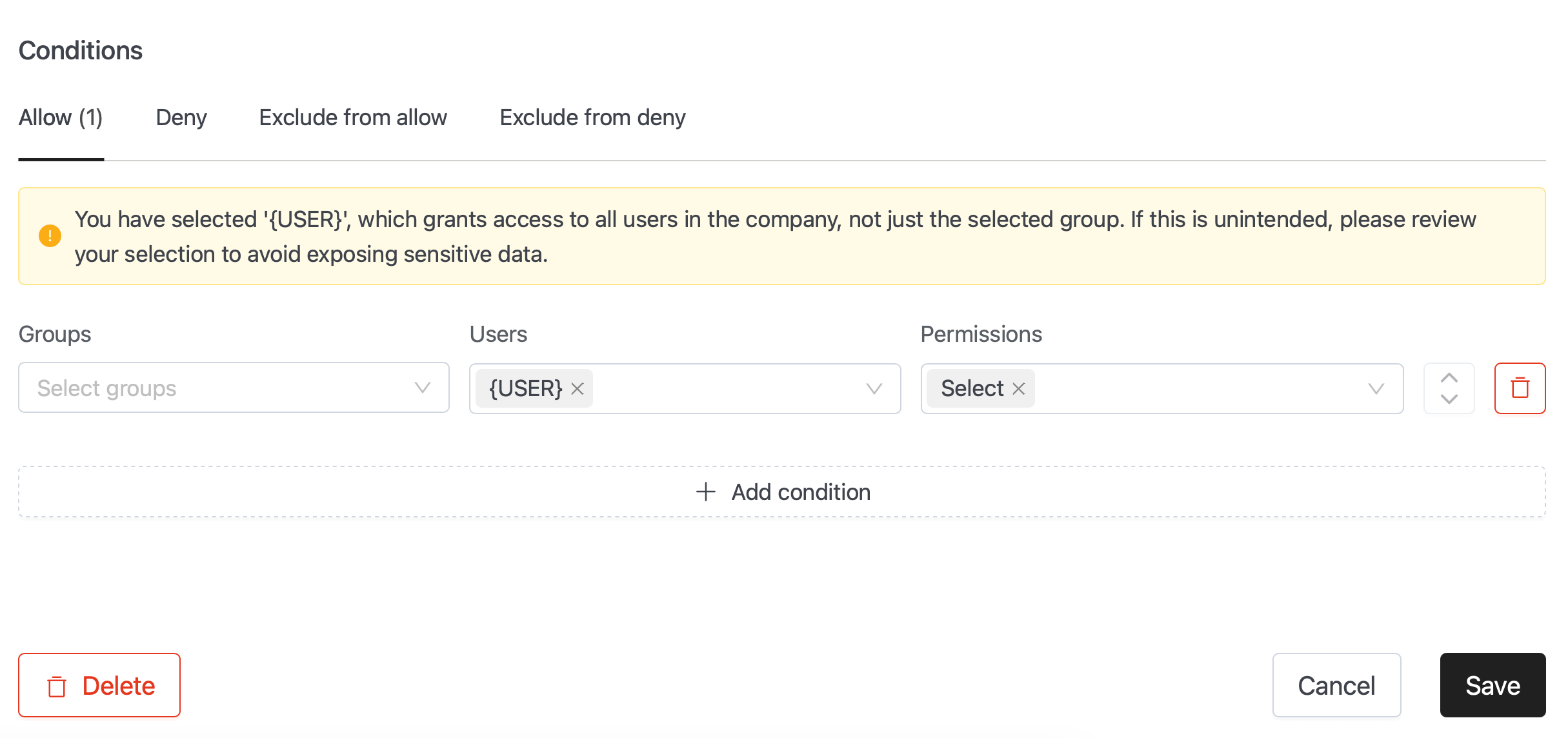

- Improved input formats on UI and API, now supporting spaces, uppercase characters, and increased length limits
- Technical Details:
- Spark now launches with new listeners for monitoring and collecting metrics for running queries (requires restart)
- SQL Limit enforcer moved to Spark with fallback to previously used
iom-spark-connectservice, removing a potential bottleneck - Removed default
autoBroadcastJoinThresholdconfig (Spark default is 10mb) - Moved spark-config configmap generation process from Helm to init-job for easier deployment process
- Added new metric to underlying database to track users' last login time
- Added new feature flags:
caseInsensitiveIcebergIdentifiers: Makes all table and database names case insensitive in Iceberg REST CatalogicebergRestCatalogStrictMode: Enforces users to create database before creating tables
🐛 Bug Fixes
- Fixed security issue where expiration on policies was not working
- Restored Manage Catalog permission
- Fixed issue when creating multi-level database where the separator was replaced by non-UTF(01xf) character, causing problems on storage layer
- Fixed issue with pagination on Gitlab Repositories
- Fixed issue where job Resume was triggering jobs even if scheduling time passed
- Fixed issue with Helm where curly braces on
adminCredentials: {}caused deployment failure - Fixed access issue to systems underlying
default_cache_icebergvirtual catalog - Multiple additional bug fixes and improvements across the platform
🗑️ Deprecations
- Data Catalog v1 APIs and Connect Cluster Resource APIs are now deprecated and planned for removal in the next release
v3.2.0
🚀 New Features
- Branding:
- Color schemes adjusted to match our new Branding Identity
- New Login Page with brand colors and our New Logo
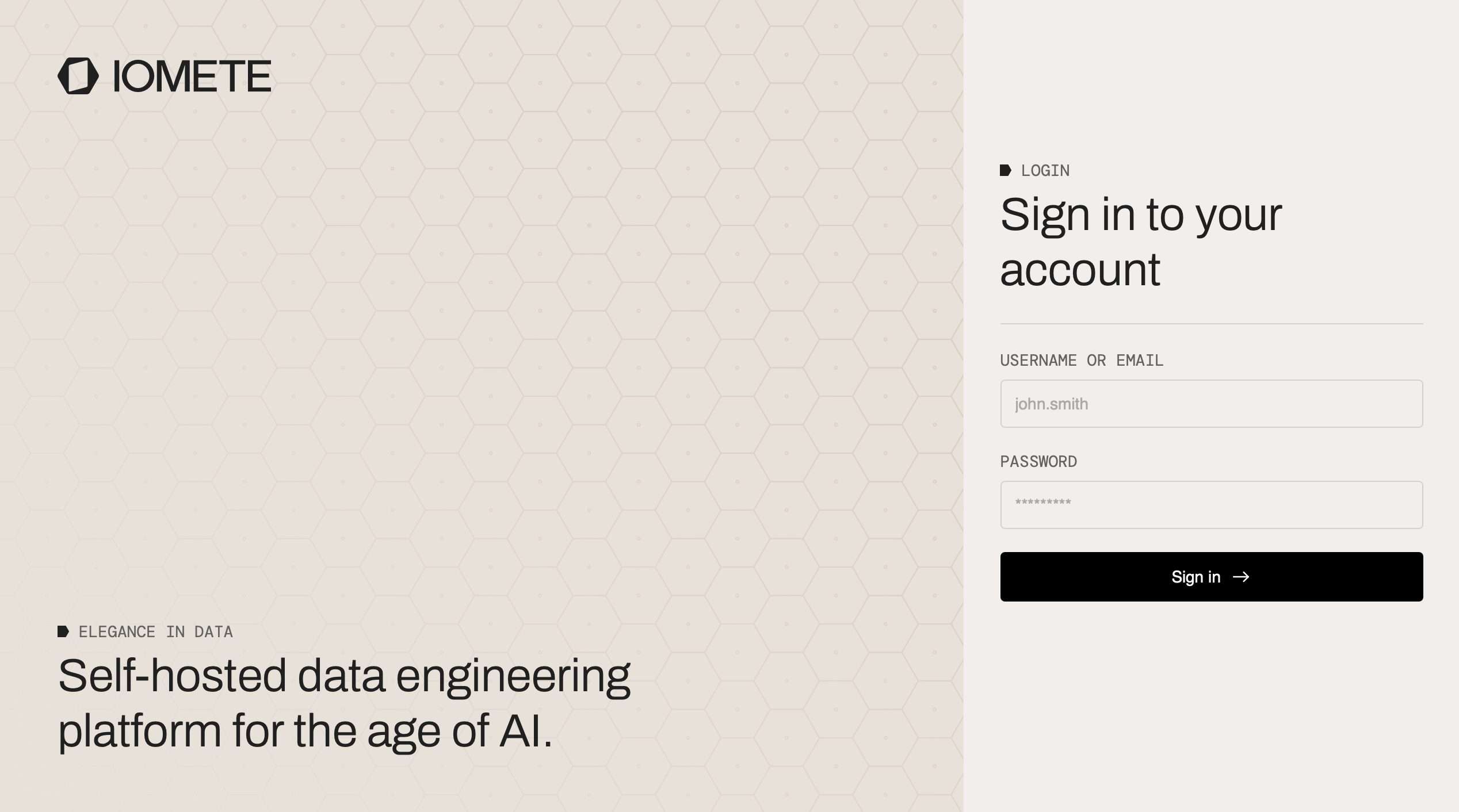

⚡ Improvements
- SQL Editor now has "View Logs" functionality to quickly access Compute logs without quitting the page and navigating to Compute / details / logs.
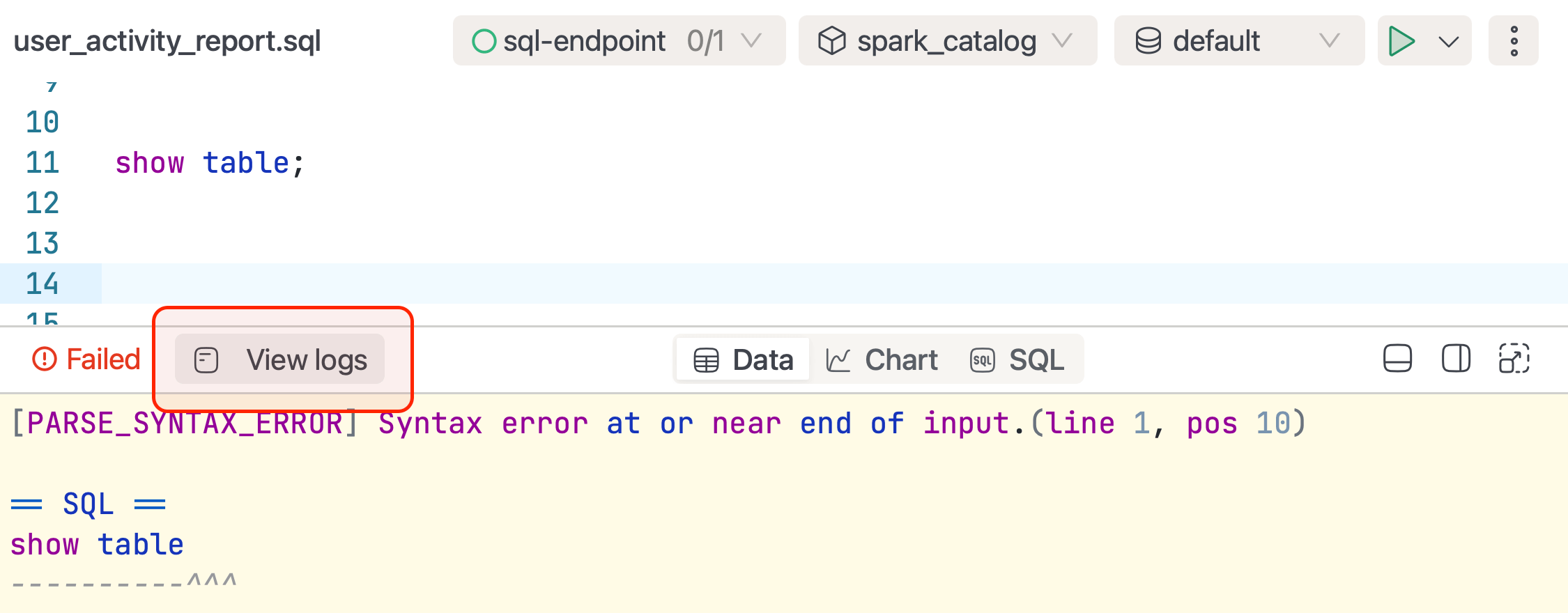

- Logs Panel is now redesigned, highlighting log levels and keywords like WARN, ERROR, etc. for visual prominence. Made buttons "Scroll to Bottom" and "Copy" more accessible and user-friendly.
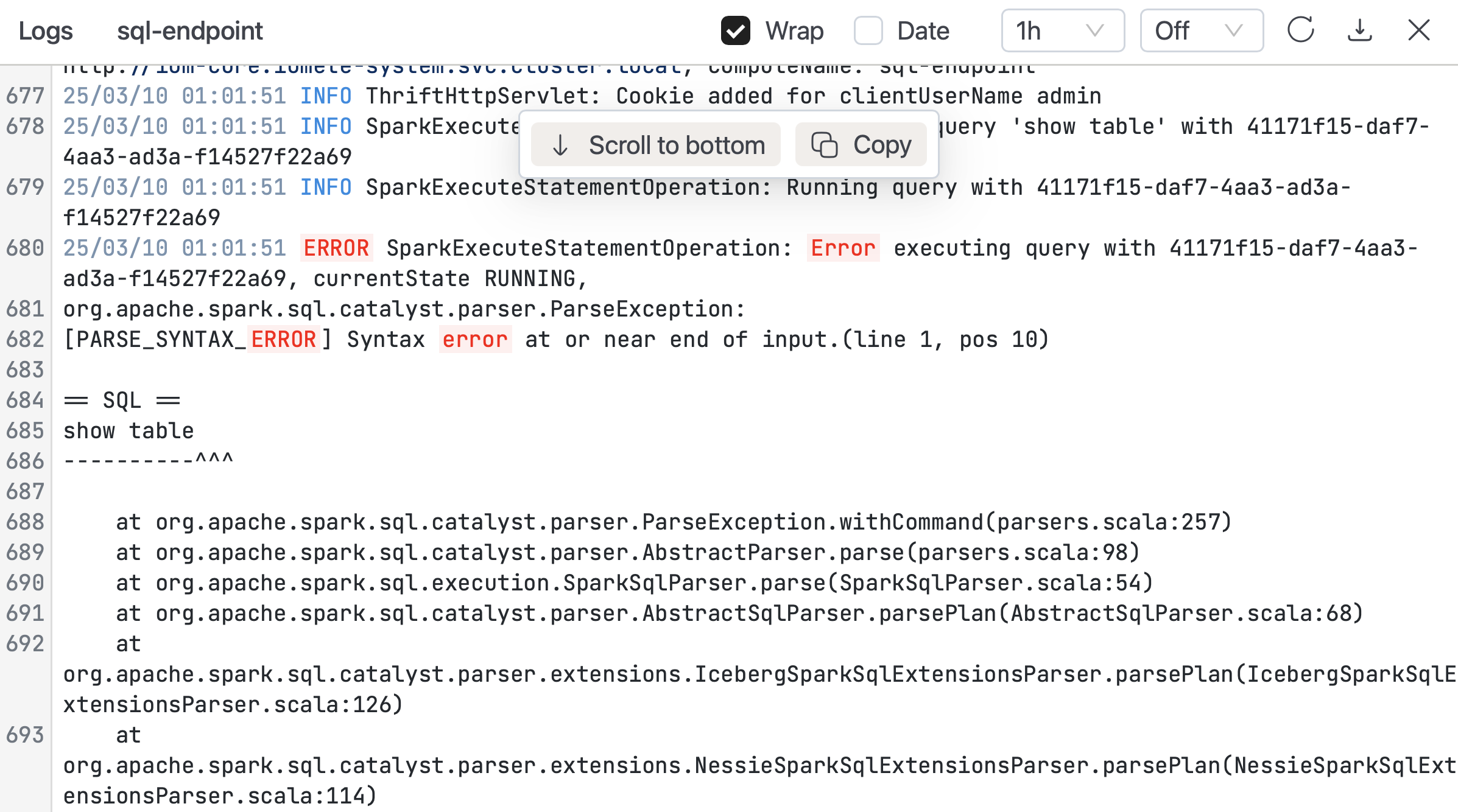

- Added special feature flag for controlling the export/download of SQL Query results into CSV. This enables Enterprise companies to implement enhanced security measures in preventing data breaches within their organizations.
- Added FeatureFlags into our Deployment Helm Values. Now features like Jupyter Notebooks, ArrowFlight, Data Products (Experimental), and Monitoring can be disabled individually.
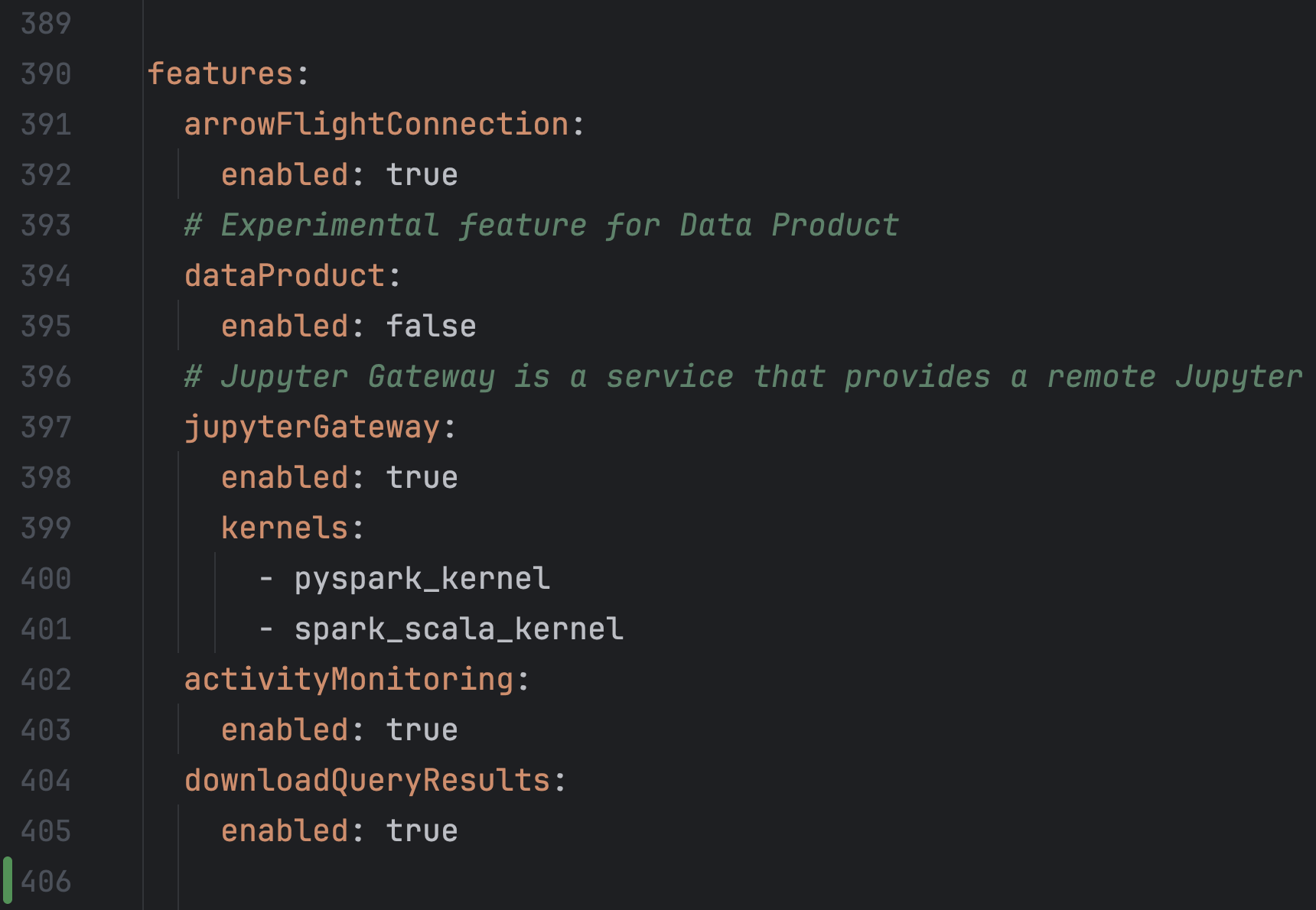

- Removed the custom right-click context menu from the SQL Editor section and restored the standard browser context menu.
- Hiding non-relevant information from Data Catalog for non-Iceberg tables. Statistics, Partitions, Snapshots, etc. are now only available for Managed Iceberg Tables.
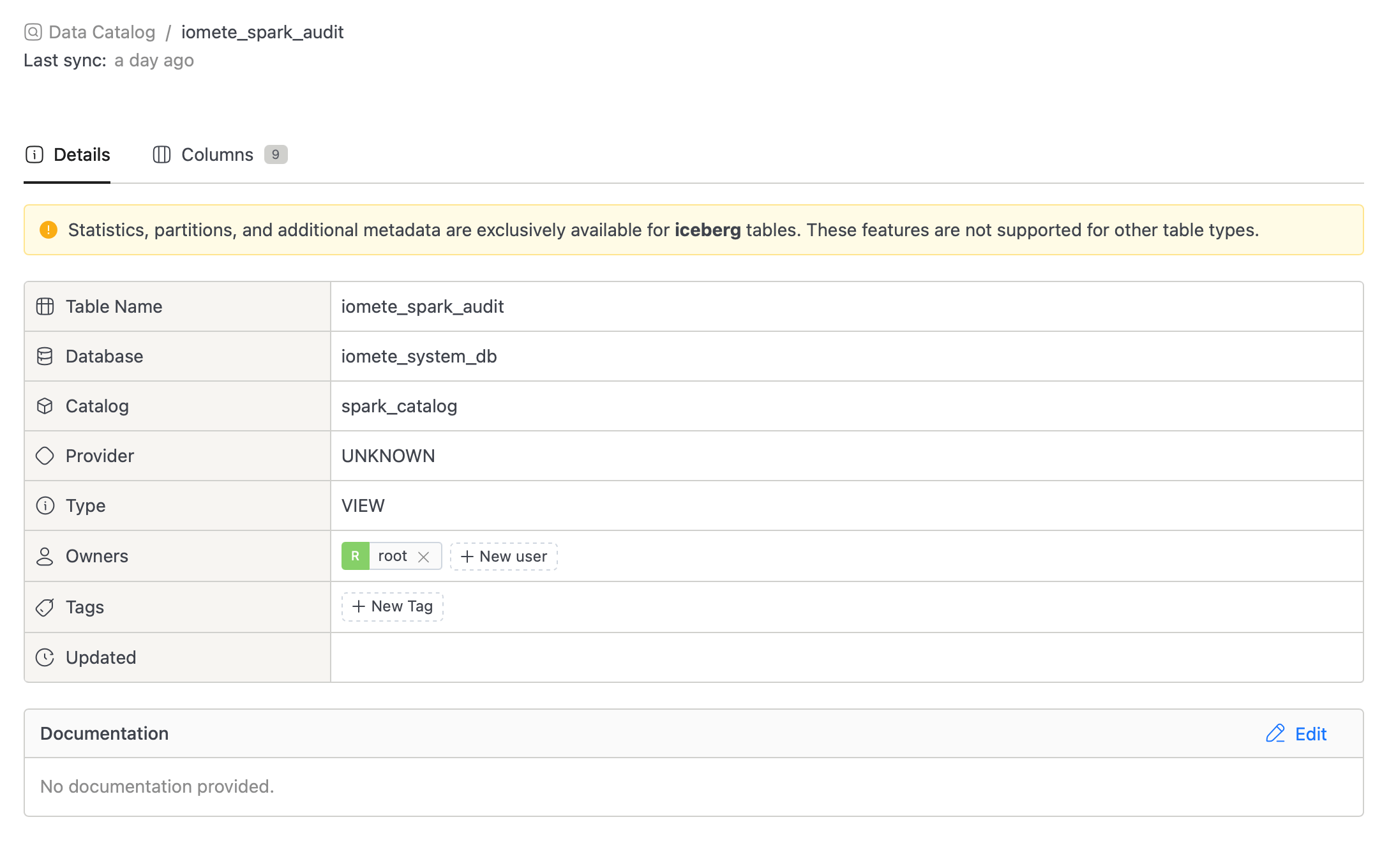

- Added Breadcrumbs and removed "Back" icons, for improving the navigation experience.
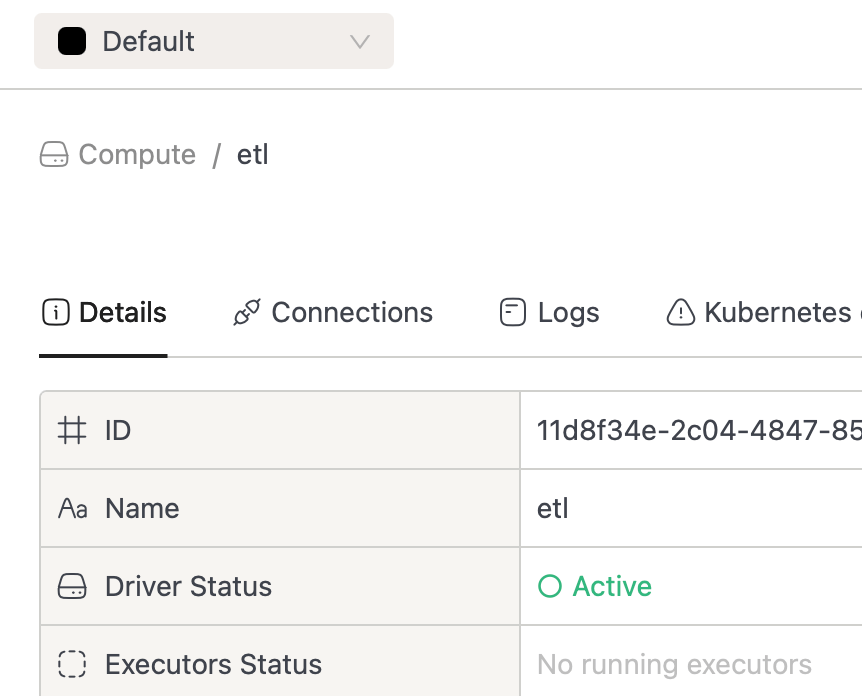

- Improved experience with Git integrations. Users can now add git integration from a single modal. Removed the project ID field for streamlined setup.
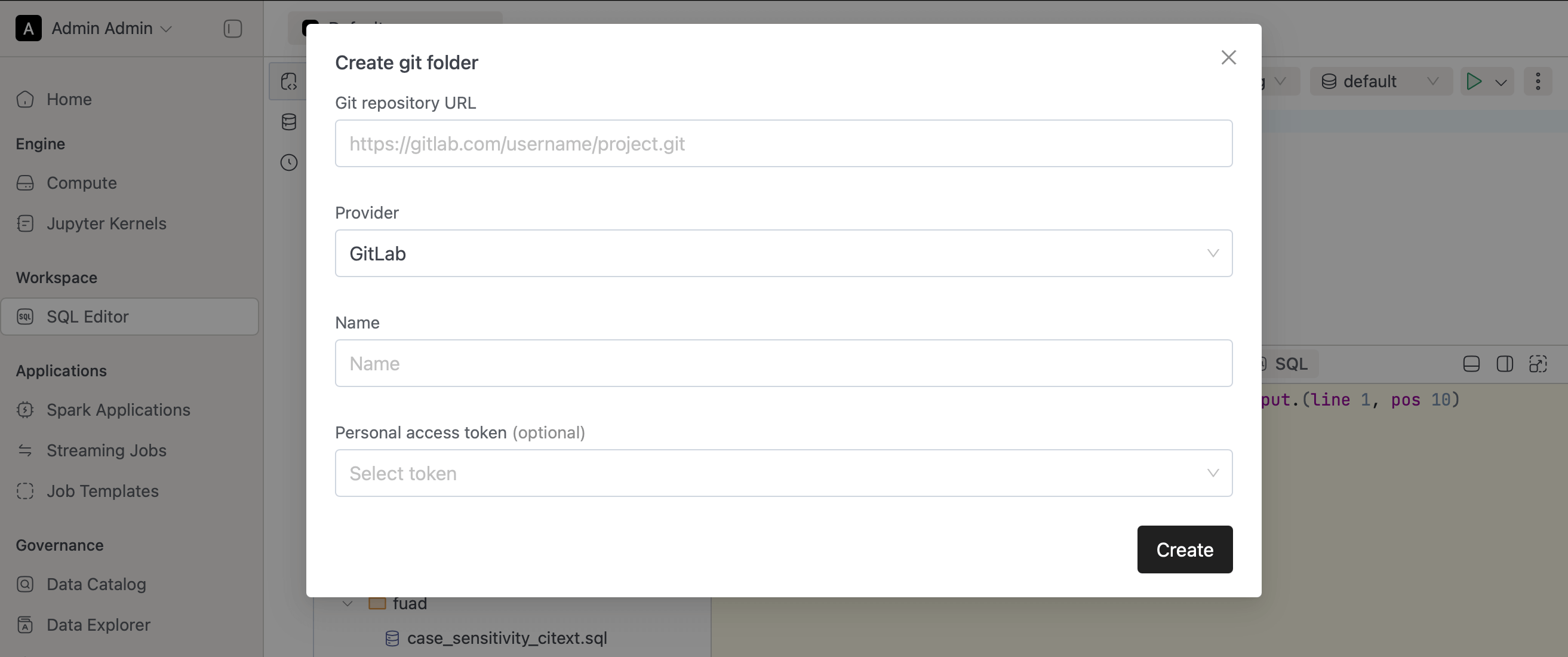

- Added "Reset Connection" to SQL Editor Menu. During Connection or network problems users can reset their existing connections and reconnect to Compute instance.


- Added Rename / Duplicate functionalities to SQL Worksheets


- Significant amount of vulnerabilities remediated across our systems for enhanced security.
- Upgraded Spark Version to 3.5.4 (prev 3.5.3).
- Upgraded Apache Iceberg version from 1.6.1 to 1.7.1 in our Spark images.
- IOMETE is now switching to Azure Container Registry
iomete.azurecr.io/iometeto enable image immutability and avoid limitations of docker hub. - Set default
spark.sql.thriftServer.incrementalCollect=trueSpark config. Can be overridden from Global Spark Settings per domain.
🐛 Bug Fixes
- Fixed hard-coded Kubernetes's Cluster DNS (cluster.local) in some internal network calls
- Ticket CS-194 - resolved - ServiceAccount page was throwing an internal error when end-users within the same group attempted to access its tokens.
- CS-166, CS-178 - To address cases where artifacts added using --jars or --packages are not being loaded in the executor, we introduced the property
spark.executor.iomete.loadInitialUserArtifactsForEachSession. Enabling this property for a compute cluster ensures that each session connecting to Spark will load these artifacts. Please note, this property is currently experimental. - Auto-Complete issue fixed in Data Security Policy management page.
v3.1.3
⚡ Improvements
- Implemented Granular Admin Roles. Admins can now assign specific roles to users for more precise control over platform management.
- Deleting files from SQL Workspace now does soft delete, allowing users to recover files if needed.
🐛 Bug Fixes
- Fixed migration issue with SQL Workspace.
- Added configuration property to NGINX Gateway, solving timeout issue with SQL Alchemy library when executing long-running queries.
v3.1.2
🐛 Bug Fixes
- Fixed an issue where users could not view access tokens for Service Accounts within the same LDAP group.
v3.0.2
🚀 New Features
-
Domain-Centric Platform: All resources, including Compute, Spark Jobs, Data Catalog, and SQL Workspace, are now organized by domains. Each domain can manage its own resources, members, and user roles independently.
-
New Admin Portal: A brand-new Admin Portal has been introduced to centralize management, including:
- Domains and their resources
- LDAP and SSO settings
- User groups and role management
- Compute configurations (node types, volumes, Docker registries)
- Spark catalogs and data security policies
- Audit and monitoring tools
-
Unified Compute Clusters: Lakehouse and Spark Connect have been merged into a single Compute Cluster for improved efficiency.
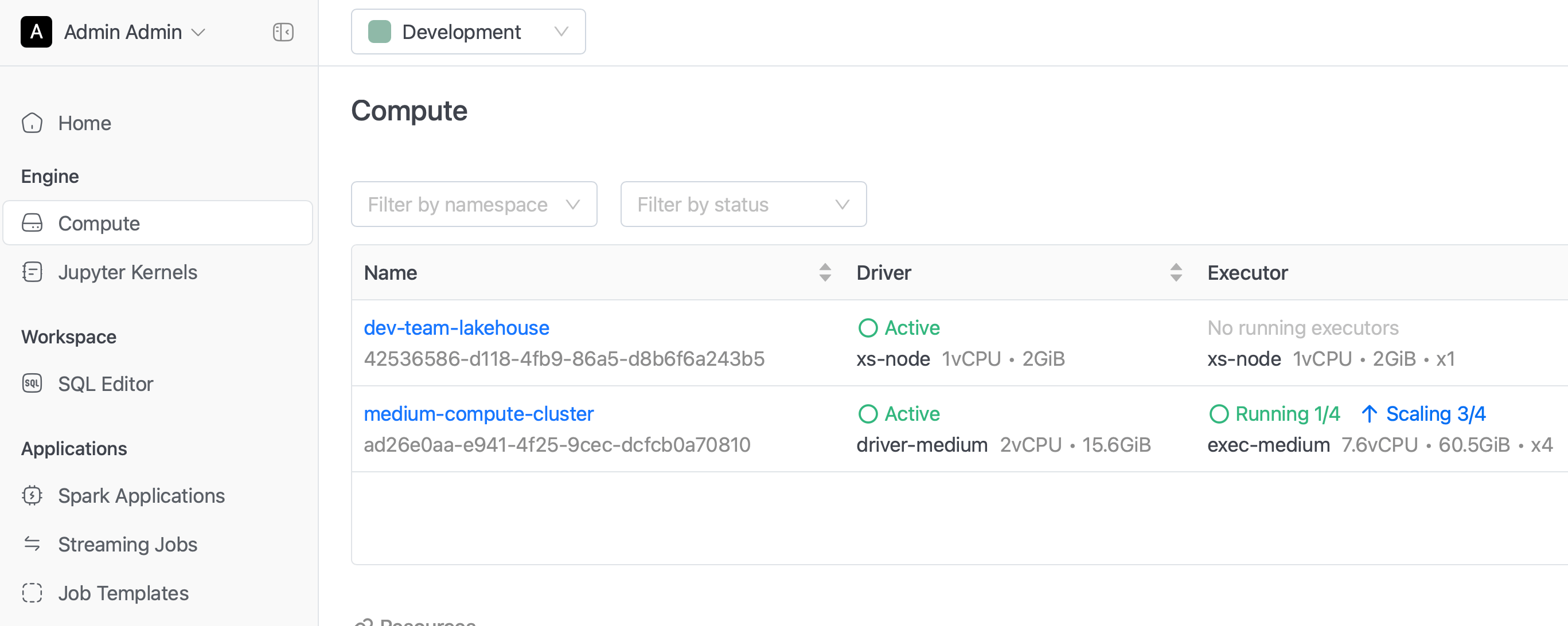

-
Arrow Flight JDBC/ODBC Support:
- Added support for Arrow Flight JDBC/ODBC connections for faster and more efficient data transfer.
- Introduced a custom IOMETE ODBC Driver over Arrow Flight protocol, enabling seamless integration with Power BI.
- The IOMETE ODBC Driver now supports multi-catalog access, allowing users to view and interact with multiple Spark catalogs through a single connection. Previously, each connection was limited to a single catalog.
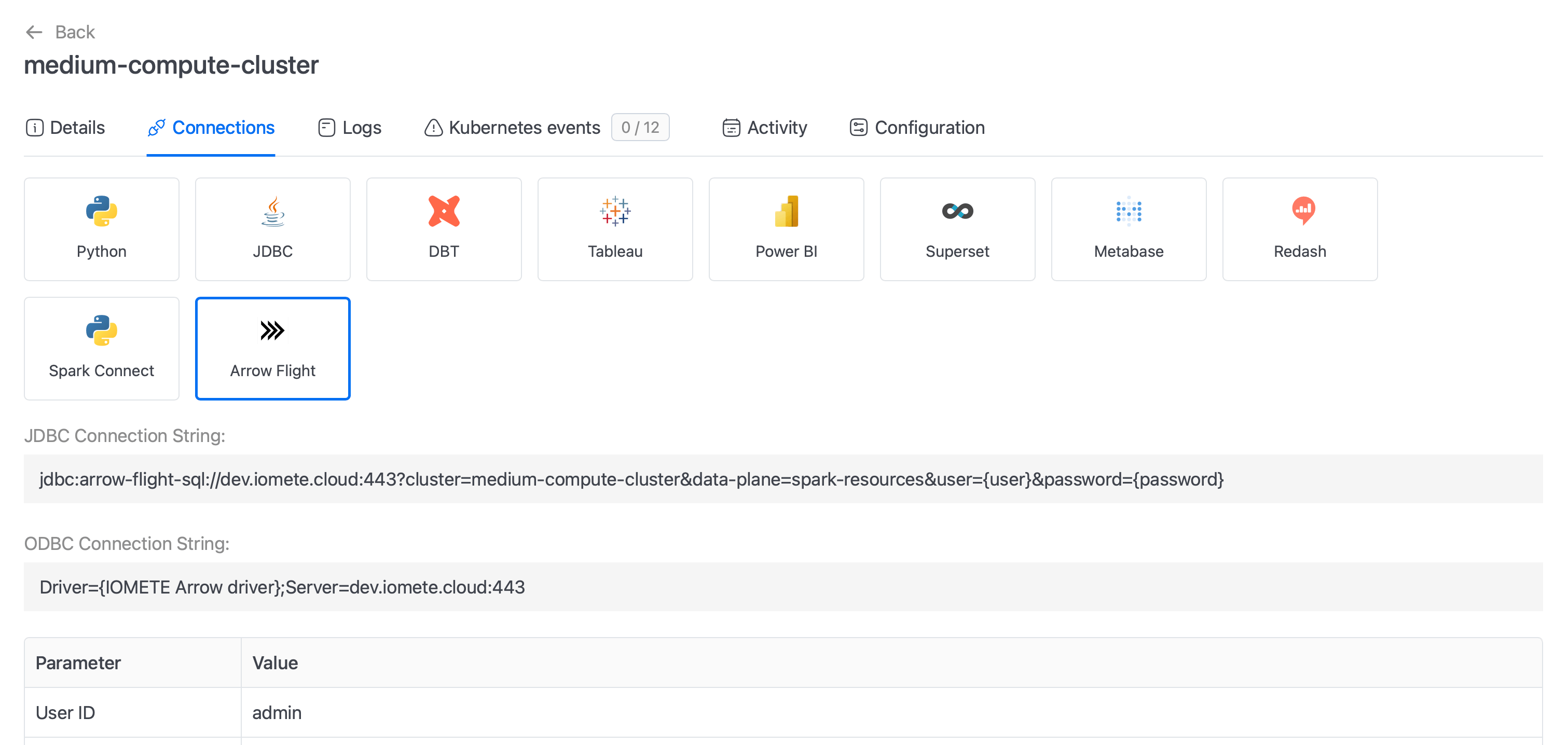

-
GitLab Integration: Domain owners can now seamlessly integrate and manage GitLab repositories within their domains.
- Adding repositories for collaborative development within the domain.
- Viewing repository content and switching branches directly from the platform.
- Commit and push functionality is planned for future releases.
-
Experimental Launch: Data Products: The Data Products section has been introduced as an experimental feature, providing a structured way to package, manage, and share curated datasets across teams. This feature enables:
- Domain-driven data product creation, ensuring governance and ownership.
- Enhanced discoverability, allowing users to find and reuse high-quality data assets.
This marks the first step towards self-service data sharing, with more enhancements planned in future releases.
-
New Monitoring System:
- A new Monitoring Chart has been introduced, powered by IOMETE-supported Prometheus/Grafana integration.
- Pre-configured Grafana Dashboards for built-in monitoring and alerting.
⚡ Improvements
- SQL Workspace Redesign: The SQL Editor has been redesigned for improved usability and organization:
- Vertical tabs for seamless navigation between:
- Worksheets
- Database Explorer
- Query History
- Sub-folder support in SQL Workspace for better file organization.
- Shared Folders and Git Repositories integration, enabling enhanced collaboration and version control.
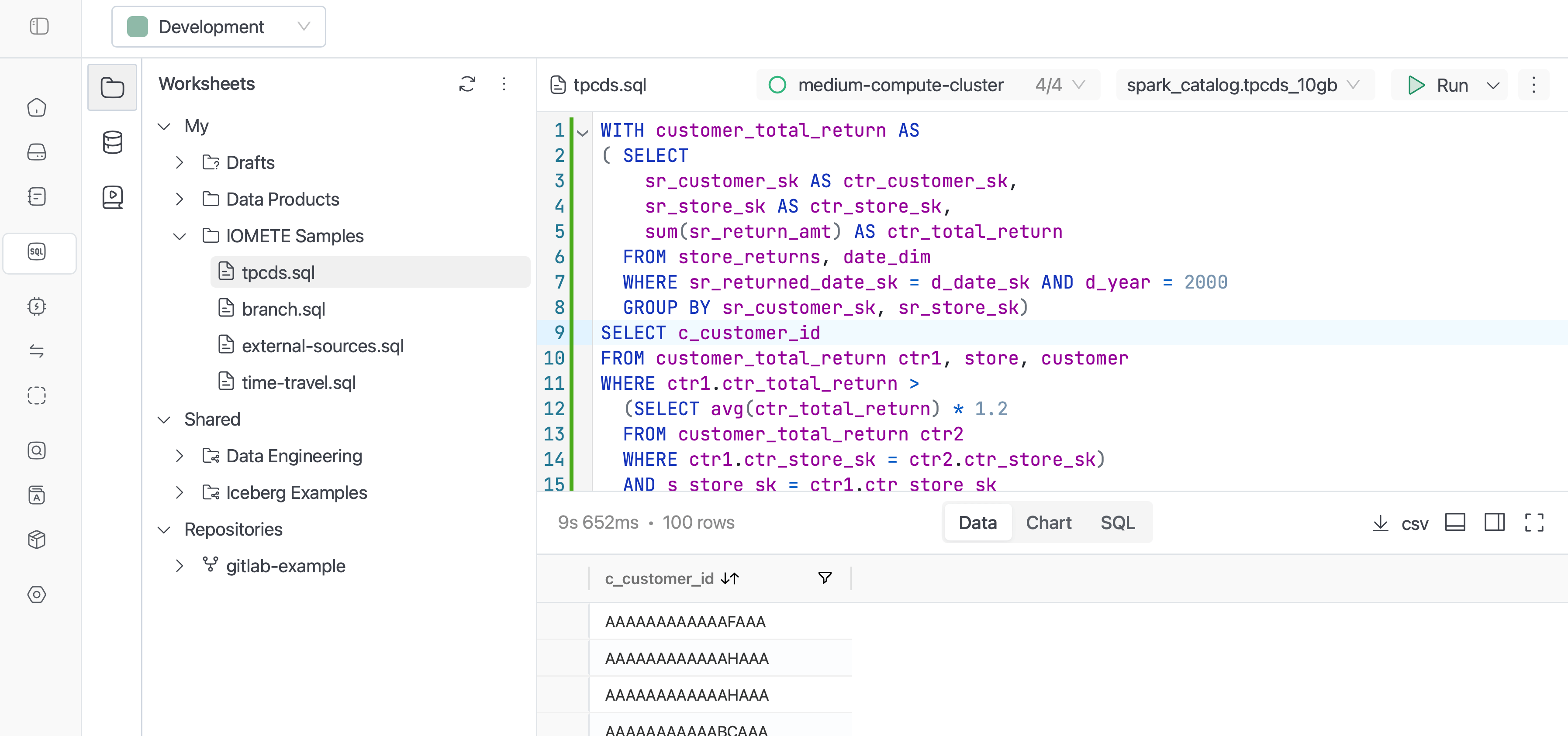

- Vertical tabs for seamless navigation between:
- Data Catalog Improvements: The Data Catalog details page has been redesigned, now providing more comprehensive insights.
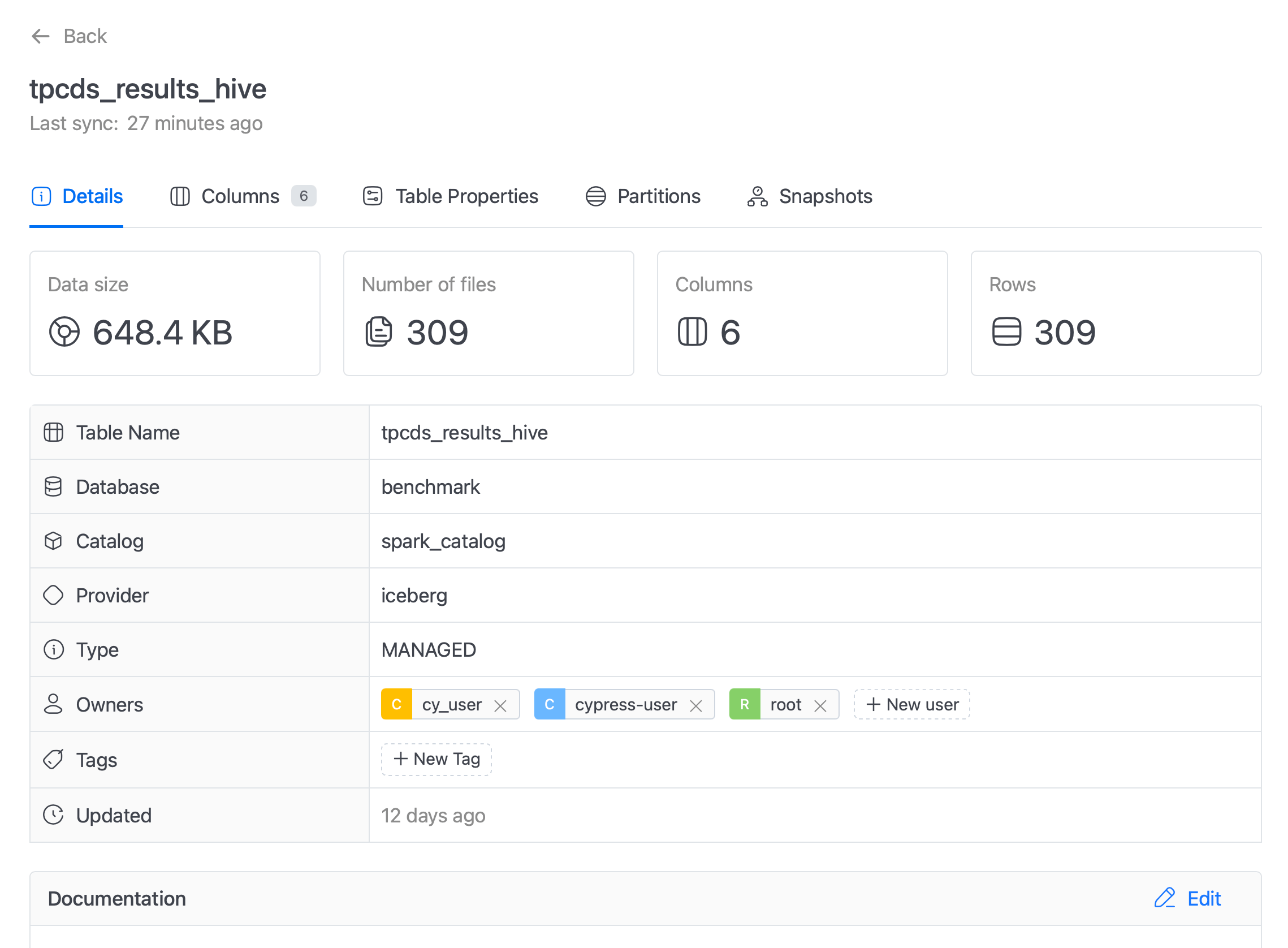

- Centralized Security & Catalog Management: Data Security and Spark Catalog Management are now fully centralized in the Admin Portal, streamlining governance and access control.
- Service Account Improvements:
- Restricted login access, preventing unauthorized usage.
- Granular token visibility, ensuring that Service Account tokens can only be accessed and managed by members within the same group who hold appropriate roles.
v2.2.0
🚀 New Features
- File and Artifact Upload in Spark Jobs: You can now directly upload files and artifacts to Spark Jobs within the IOMETE Console.
- Single-Node Spark Instance: Introduced a Single-Node Spark instance ideal for development and running small-scale jobs, offering a resource-efficient option.
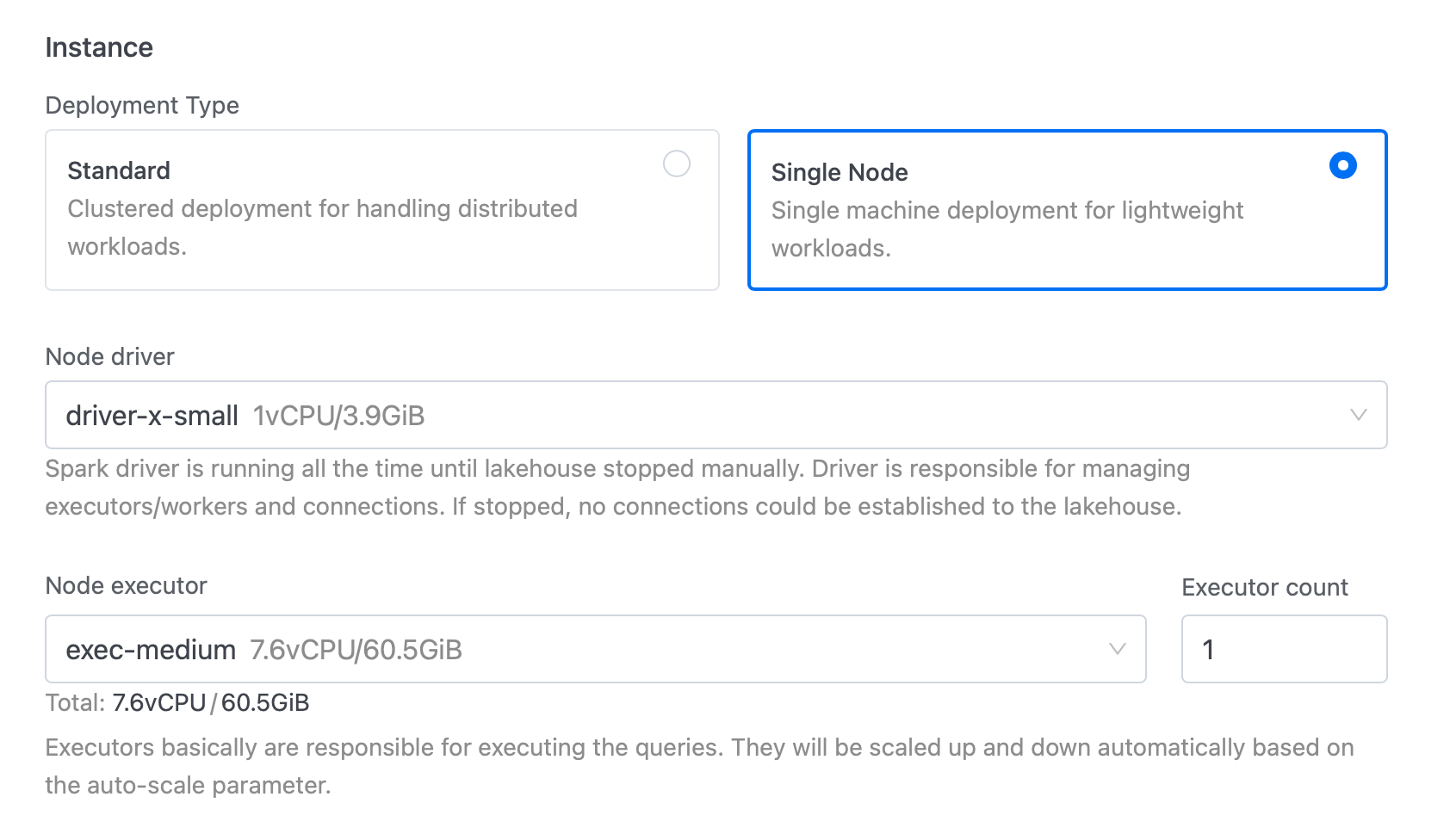

- Streaming Jobs Management: Added a dedicated page for managing Streaming Jobs, providing better oversight and control over streaming operations.
- Health Monitoring: Introduced a Health page to overview the state of system components, enhancing system monitoring capabilities.
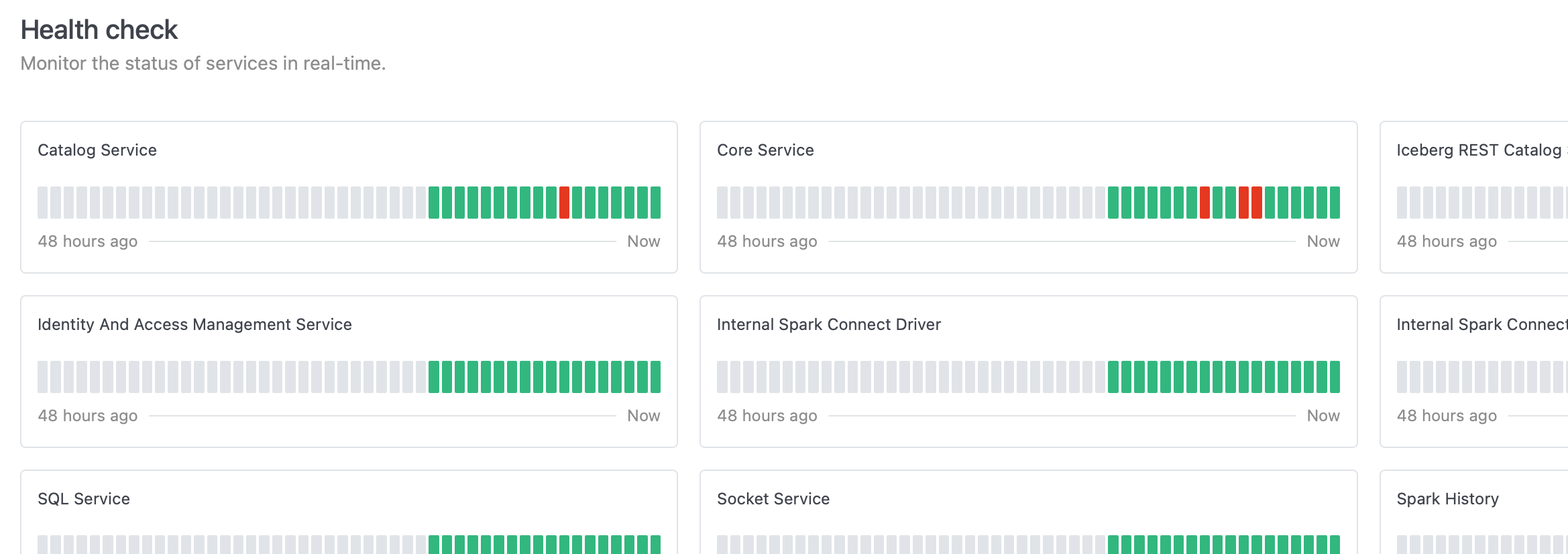

- Service Accounts Support: Introduced support for service accounts. Users can mark accounts as service accounts and create tokens for them, which can be used in Spark Jobs and other integrations.
⚡ Improvements
- Major Spark Operator Upgrade: Upgraded the Spark Operator to version 2.0.2, enabling control over multiple data-plane namespaces. The Spark Operator and webhook can now be deployed exclusively to the controller namespace for improved management.
- Automatic Catalog Updates: Any changes to Spark Catalogs are now fetched automatically within 10 seconds, eliminating the need to restart the lakehouse and Spark resources.
- Spark Catalog Documentation: Added a description field to Spark Catalogs for better documentation.
- ClickHouse Catalog Support: Included necessary libraries to support the ClickHouse Catalog, expanding data source compatibility.
- Enhanced Data Security: Implemented more granular data security controls with separated database permissions.
- SSO Improvements: Relaxed mandatory validations for the SSO protocol to enhance compatibility and user experience.
- User Management: Admins can now change or reset users password directly within the platform.
- Log Management: Cleaned up logs by removing unnecessary messages, improving log readability.
v2.1.0
🚀 New Features
- Job Marketplace: Introduced a new Job Marketplace in the IOMETE Console, empowering users to share and explore Spark job templates. Admins can manage, curate, and publish templates directly to the marketplace for streamlined collaboration.
- LOG_LEVEL Environment Variable: Introduced the LOG_LEVEL environment variable, allowing users to independently set log levels for both Spark Jobs and Lakehouses.
- SCIM API: Implemented the System for Cross-domain Identity Management (SCIM) API, facilitating simplified user provisioning and management.
- Configurable SQL Query Limits: Added a configurable Limit property (default value: 100) to the SQL Editor, giving users control over query results.
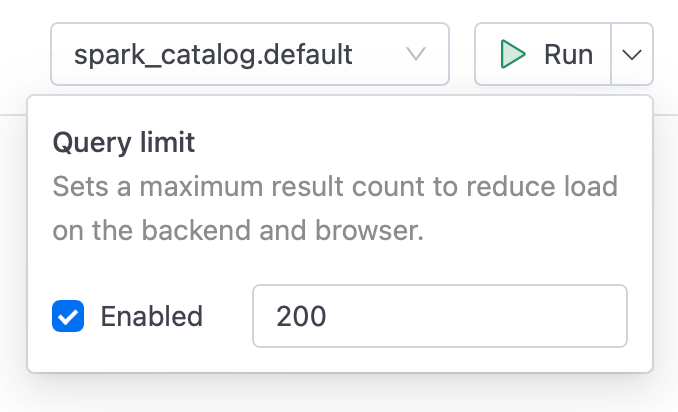

⚡ Improvements
- Spark History Server Performance: Improved performance of the Spark History Server, optimizing responsiveness and handling of large workloads.
- FAIR Scheduler Configuration: Added a new global Spark configuration, spark.sql.thriftserver.scheduler.pool, to resolve issues related to the FAIR Scheduler.
- Access Token Management Enhancements:
- New System Config for Access Token expiration policy
access-token.lifetimeto set global expiration limits. - Users can now set custom expiration times for Access Tokens directly in the UI Console.
- Added
lastUsedfield for Access Tokens to enhance tracking and security.
- New System Config for Access Token expiration policy
- Spark Policy Optimization: Substantial optimizations to the Spark policy download process, ensuring smooth performance in large-scale deployments.
- Data Compaction Enhancements:
- Updated the Data-Compaction job to support catalog, database, and table filters, giving users greater control over data organization.
- Updated Data-Compaction job to support catalog, database, table include/exclude filters.
- Query Scheduler Logging: The Query Scheduler job now logs SQL query results, enabling easier debugging and tracking of job outcomes.
- Data Security for Views: Added support for VIEWs, enhancing data access control options.
🐛 Bug Fixes
- Resolved an issue where the Spark UI link was unresponsive from the SQL Editor page.
- Data Security: Fixed INSERT and DELETE permissions (also covering TRUNCATE operations).
v2.0.1
⚡ Improvements
- Database Driver Support: Added out-of-the-box support for Oracle and Microsoft SQL Server JDBC drivers.
- User Impersonation: Introduced the "Run as User" property in Spark job configuration, allowing user impersonation for special accounts (e.g., service accounts) when running Spark jobs.
🐛 Bug Fixes
- Resolved an issue with LDAP sync that caused User, Group, and Role Mappings to be removed after synchronization.
- Fixed an issue in Jupyter Notebook where database queries returned no results.
- Resolved a failure when querying Iceberg metadata tables due to row-level filtering policies.
- Fixed LDAP login issue that occurred with case-sensitive usernames.
v2.0.0
This release introduces major architectural, functional, and user experience improvements to IOMETE, including significant changes to user and security management, data access and governance, and catalog performance.
This is a major release with significant changes to the architecture and user experience. IOMETE 2.0.0 is not backward compatible with IOMETE 1.22.0 or earlier versions. We recommend reviewing the upgrade documentation carefully before proceeding.
⚠️ Breaking Changes
-
Keycloak Removal: We have removed
Keycloakand transitioned all its functionality—user,group, androlemanagement, as well asLDAPandSAML/OIDC Connectsupport—directly into IOMETE. This shift centralizes control within IOMETE, enhancing security and simplifying management for large-scale deployments.Key Improvements:
- Optimized LDAP support for large-scale user integrations, addressing performance issues experienced with Keycloak.
- Support for both user-based and group-based synchronization.
- Service accounts support (users without standard identifiers such as email or first name).
This change improves performance and simplifies maintenance by reducing external dependencies.
-
Ranger Removal: We have removed Apache Ranger, fully integrating its data access policy management functionality within IOMETE. This offers better control, performance, and security while reducing the complexity of managing separate systems.
Key Benefits:
- Improved performance and streamlined management of data access policies.
- Reduced security concerns by eliminating the dependency on open-source Ranger.
🚀 New Features
-
Tag-Based Access Control & Masking: We are introducing Tag-Based Access Control and Tag-Based Masking, simplifying data governance within IOMETE by allowing policies to be triggered automatically based on tags.
Key Features:
- Dynamic Policy Activation: Automatically apply access or masking policies based on tags assigned to tables or columns.
- Tag-Based Access Control: Define user or group access based on tags.
- Tag-Based Masking: Dynamically apply data masking policies for sensitive data based on tags.
This feature streamlines governance processes and provides a more efficient solution for large datasets.
-
Integrated Iceberg REST Catalog: IOMETE now includes a fully integrated Iceberg REST Catalog, replacing the previous Iceberg JDBC catalog. This upgrade delivers enhanced performance, scalability, and security for Spark jobs, Lakehouse clusters, and SparkConnect clusters.
Key Benefits:
- Centralized Caching: Shared metadata cache across all Spark jobs and clusters, improving query resolution times and overall system performance.
- Reduced Database Load: Pooled connections significantly reduce strain on the Postgres metadata database.
- Integrated Authentication and Authorization: Supports token-based authentication, OpenConnect, OAuth, and ensures data access policies are enforced across REST catalog interactions.
- Multi-Catalog Support: Manage multiple catalogs simultaneously for greater flexibility.
- Openness and Interoperability: Aligns with IOMETE's vision of openness, supporting external platforms like Dremio, Databricks, and Snowflake via standard Iceberg REST protocol.
v1.22.0
⚠️ Breaking Changes
- Deployment Process Changes:
- The
data-plane-baseHelm chart has been deprecated and is no longer required for installation. ClusterRole, previously added for multi-namespace support, has been removed, and the system now uses only namespaced Roles.- Spark-Operator is now deployed separately to each connected namespace.
- The process for connecting a new namespace has been updated. Please refer to the Advanced Deployment Guides for more information.
- The
⚡ Improvements
- UI Console Pagination: Added pagination to user related components on UI Console.
v1.20.2
🚀 New Features
- Scheduled Job Suspension: Added possibility to suspend Scheduled Spark applications.
🐛 Bug Fixes
- Fixed issue with private docker repos not being visible on UI.
v1.20.0
🚀 New Features
- Centralized Secret Management: Users can now create and manage secrets centrally from the settings page and inject them into Spark applications. Supports integration with Kubernetes and HashiCorp Vault for storing secrets. Learn more here.
- Multi-Namespace Support: Spark resources can now be deployed across different namespaces, enhancing multi-tenant and organizational capabilities.
- Iceberg REST Catalog Support: Added support for the Iceberg REST Catalog, expanding the range of catalog integrations.
- JDBC Catalog Support: Introduced support for JDBC Catalog, allowing connections to a wider array of databases.
- Catalog-Level Access Control: Security improvements now allow access control to be managed at the catalog level for more granular permissions management.
⚡ Improvements
- Spark Connect Logging: Added Logs Panel for Spark Connect.
- Spark Job API Enhancement: Added the ability to override
instanceConfigin the Spark job API.
🐛 Bug Fixes
- Resolved an issue related to
tmpfsstorage.
v1.19.2
⚡ Improvements
- Spark Operator Performance: Optimized performance of spark-operator for handling large numbers of Spark job submissions.
v1.19.0
🚀 New Features
- Spark Applications: Introduced a new Spark Applications page featuring a zoomable timeline chart. This enhancement allows for easy tracking and visualization of applications across all Spark jobs.
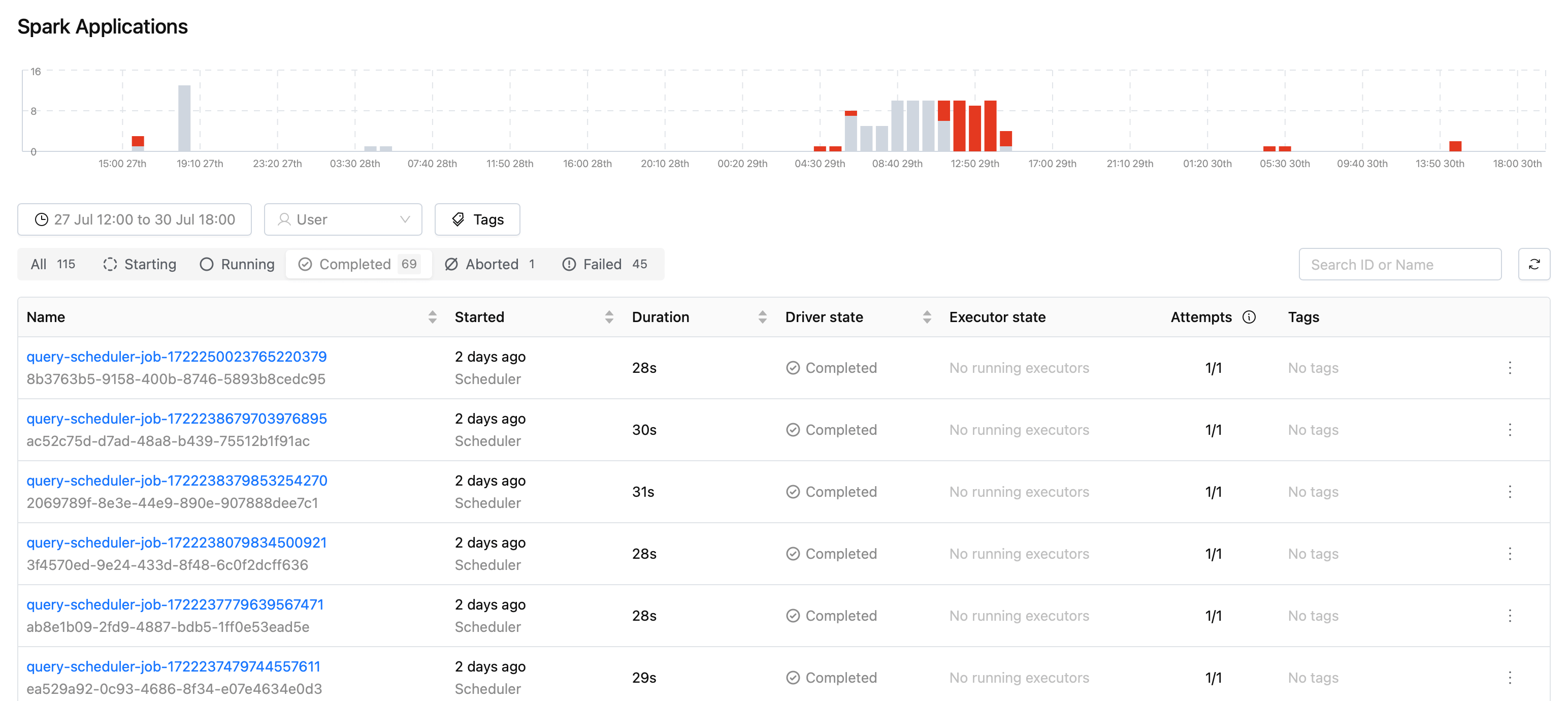

- Persistent Volume Claim (PVC) Options: When creating a Volume, you can now choose the "Reuse Persistent Volume Claim" and "Wait to Reuse Persistent Volume Claim" options on a per-PVC basis. This feature allows for customized volume configurations for different lakehouse and Spark resources, providing greater flexibility and control over resource management.
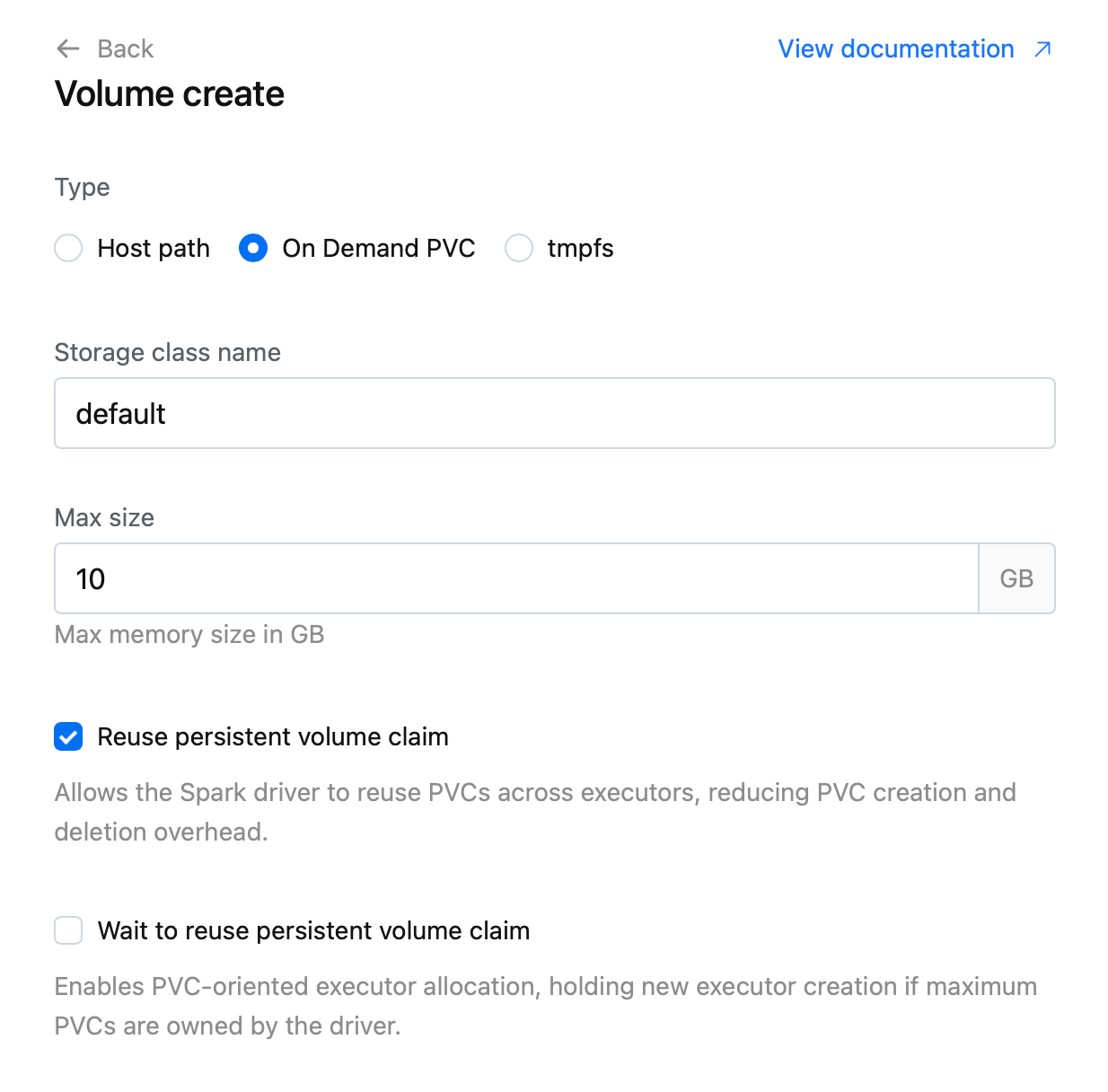

⚡ Improvements
- UI Restructuring: Restructured sidebar menu in the IOMETE Console.
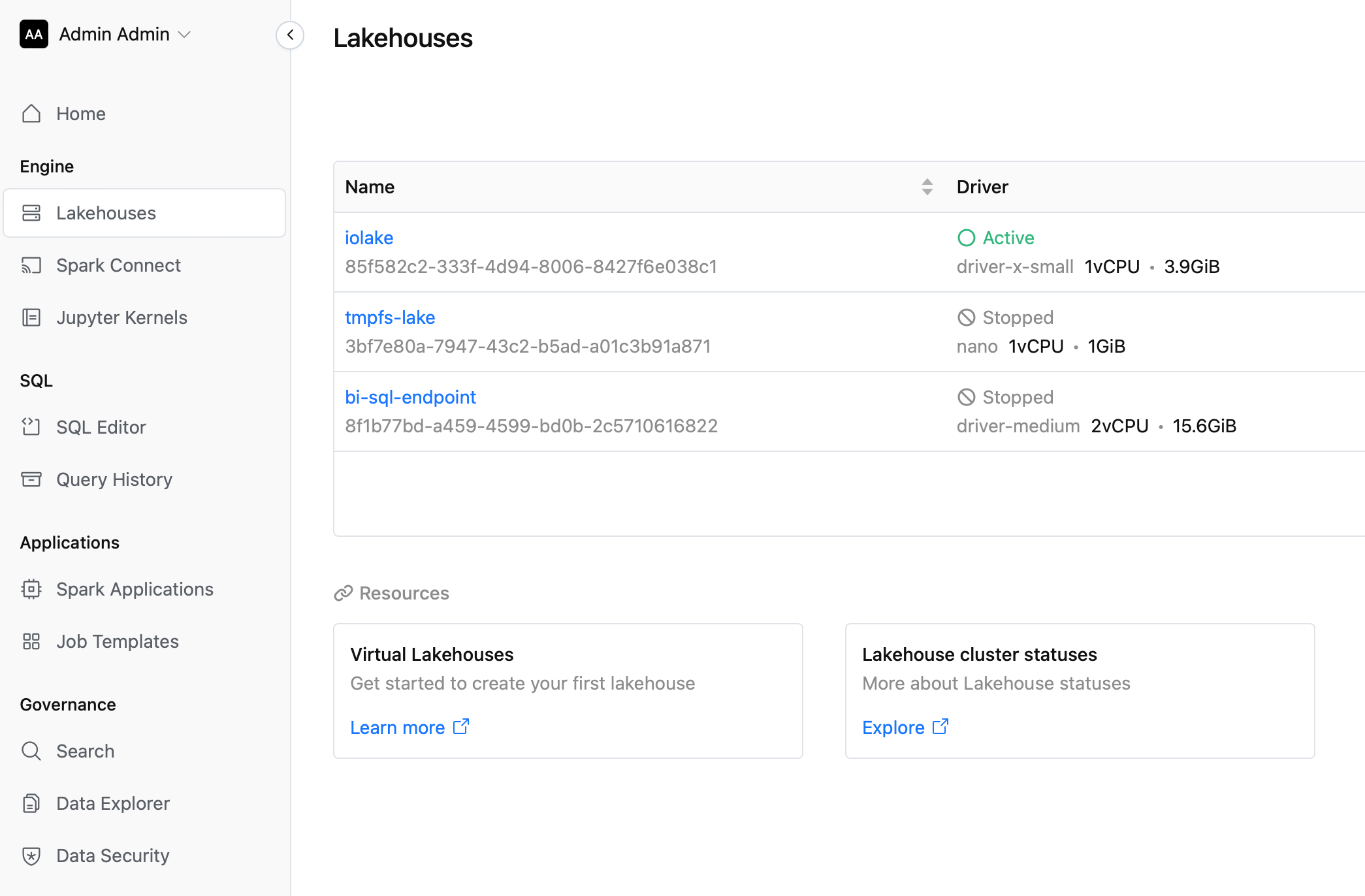

v1.18.0
⚡ Improvements
- SQL Editor Enhancements:
- Added cell expand to the SQL Editor result grid. You can double click on the cell with multi-line value to expand it.
- Added import/download functionality to the worksheets.
- UI / Design improvements in SQL Editor.
🐛 Bug Fixes
- Fixed issue with
explain ...sql statement. - Fixed issue with DBeaver and Power BI integrations.
v1.17.0
🚀 New Features
- Data-Catalog Explorer: Launched beta version of Data-Catalog Explorer (Available in the Data-Catalog menu: from right-top side choose Explorer)
⚡ Improvements
- SQL Editor Database Explorer:
- Added partitions folder, you can view table partition columns.
- Added Iceberg View support.
viewfolder now available for iceberg catalogs - Improved error messaging in SQL Editor
- Added item "Open in explorer" to the right-context menu. You can open the selected table in the Data-Catalog Explorer to view detailed information and snapshots
- Redesigned result charts
- System Information: Added Spark / Iceberg / Scala version information to the Data-Plane Information page in the Settings menu
- Spark Job: Improved Cron editor in Spark Job configuration
- Design Improvements: Overall design improvements: slowly moving to a more compact design
🐛 Bug Fixes
- Fixed issue where nessie catalog displayed wrong list of databases/tables in the SQL Explorer
- Fixed "Invalid YearOfEra" issue during Registration of Iceberg Tables.
v1.16.0
🚀 New Features
- Nessie Catalog Support: Added Nessie catalog support
Beta
⚡ Improvements
- Spark Operator Updates: Updated spark-operator with performance optimizations and bug fixes
- Enhances overall system stability and efficiency
- Node Type Validation: Implemented stricter validation for Node Types
- CPU: Minimum 300 milli-cores
- Memory: Minimum 900 MiB
- Ensures compliance with Spark requirements for optimal performance
- UI Enhancements: Various UI improvements for better user experience
🐛 Bug Fixes
- Resolved issue with "STARTING" status in Spark Jobs
- Improves job status accuracy and monitoring
v1.15.0
⚡ Improvements
- Spark Operator Enhancements:
- Improved performance to handle ~1000 Spark Job submissions per minute
- Fixed conflict issues when submitting Spark jobs via API
- Added comprehensive metrics to Spark run details view
- Implemented Timeline (beta) feature for tracking status changes
- Integrated Kubernetes events for Spark Resources (Run, Lakehouse)
- Job Management:
- Introduced Job retry policy
- Spark run metrics now available during "running" state
- Implemented periodic garbage collection for failed jobs in Kubernetes
- Added support for job run tags and filtering by tag
- Introduced option to re-trigger runs with the same configuration
- Monitoring and Logging:
- Added support for Splunk logging
- Implemented new System Config in UI Console
- Added "Spark Jobs alive time" to new "System Config" page
- Separated Driver and Executor task durations
- Display summary of total running/complete/pending runs on Spark job page
- Spark job log view now auto-scrolls to bottom when new logs are added
- Implemented "Spark Jobs alive time" configuration
- UI/UX Enhancements:
- Added time filter to Job Runs
- Displaying Scheduler Next Run information on UI
- Added ID to Spark Run Details page
- Performance Optimizations: Fixed long job names causing Spark driver service name conflicts
🐛 Bug Fixes
- Fixed issue where Spark UI occasionally failed to update
- Resolved Spark History redirection issue (now opens correct page on first load)
- Addressed Spark driver service name conflicts caused by long job names
v1.14.0
🐛 Bug Fixes
- Ranger Audit: Ranger Audit now working as expected. Page added to Data Security section in IOMETE Console.
- Fixed issue with PowerBI integration.